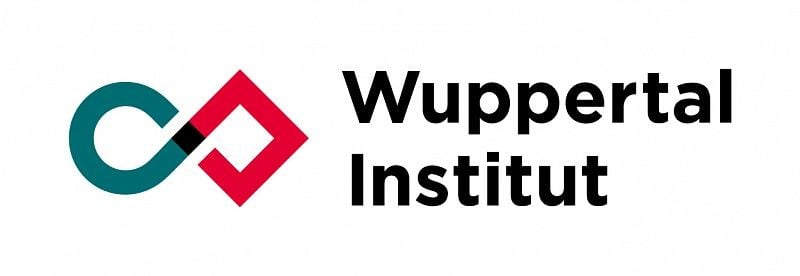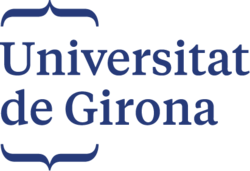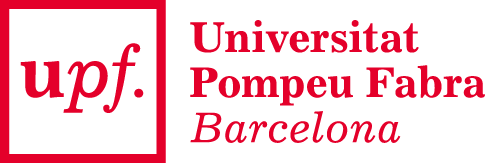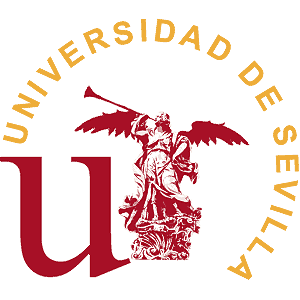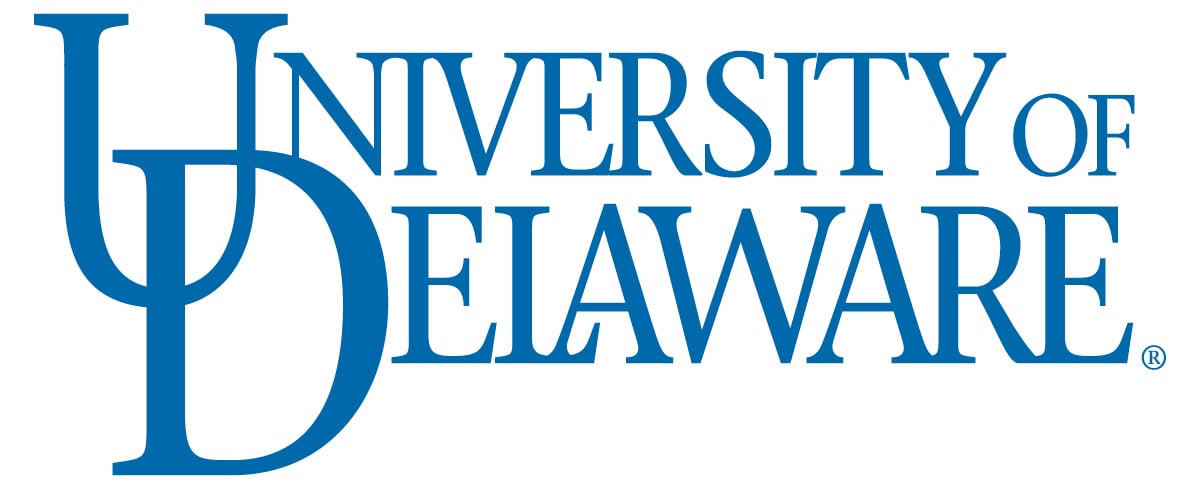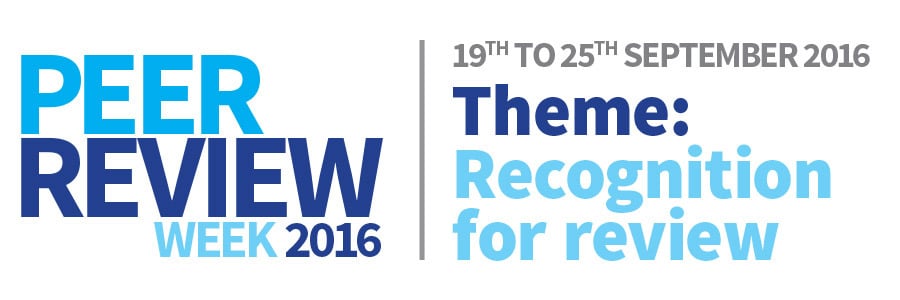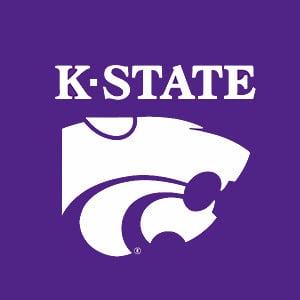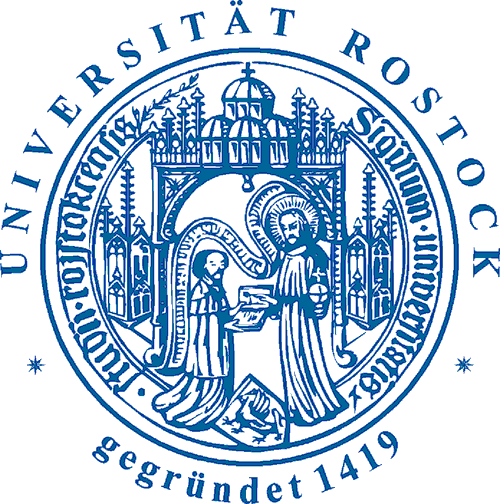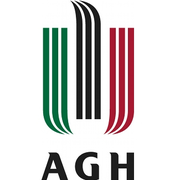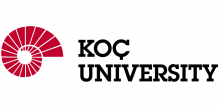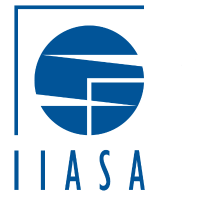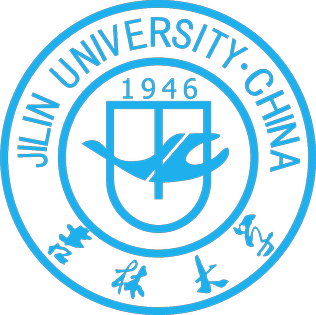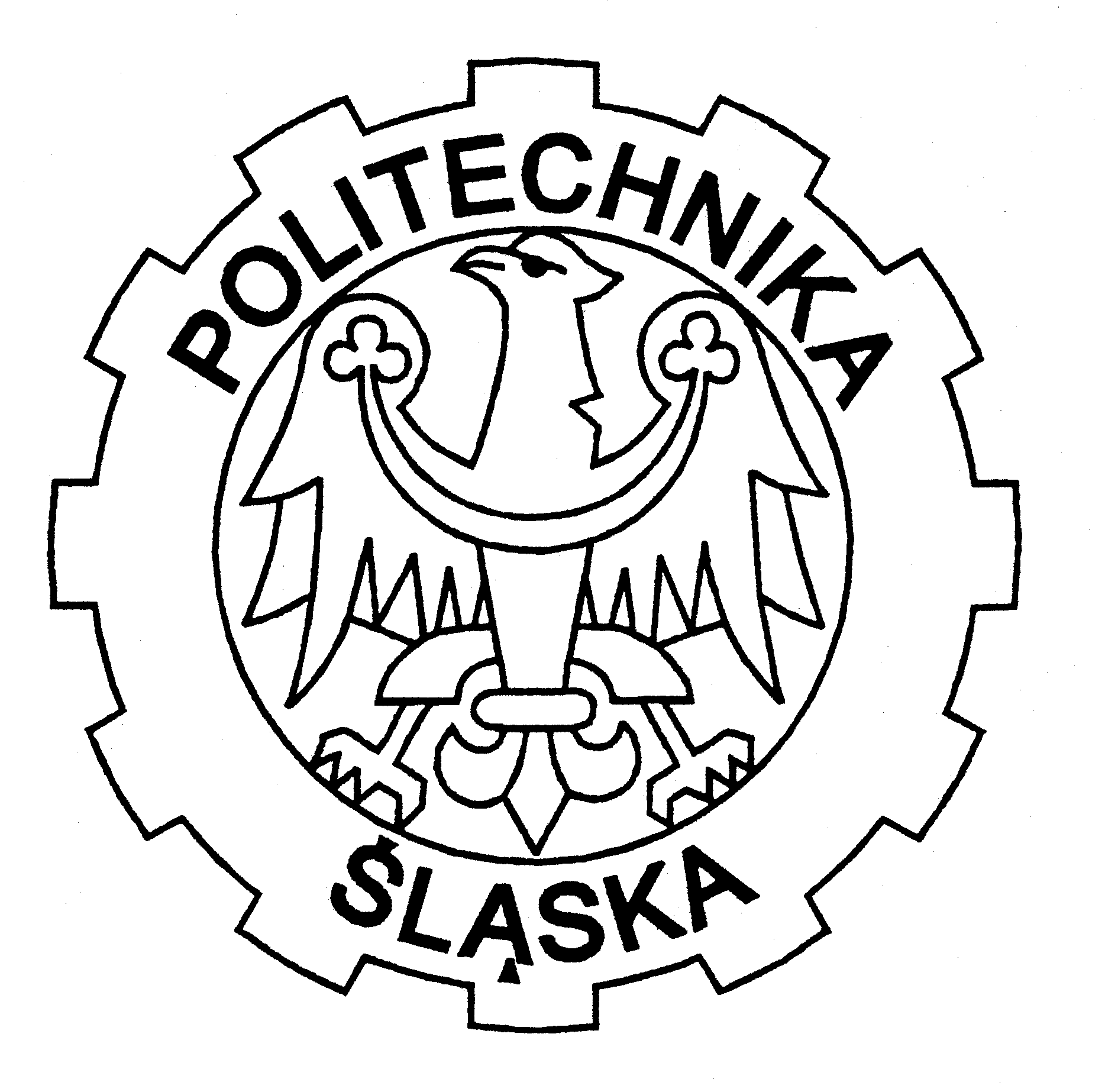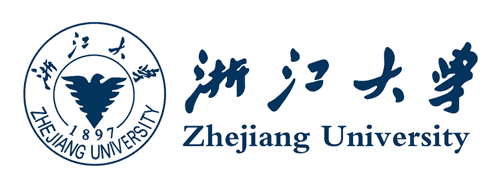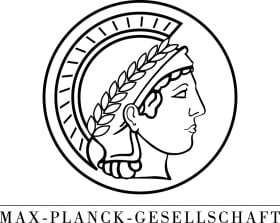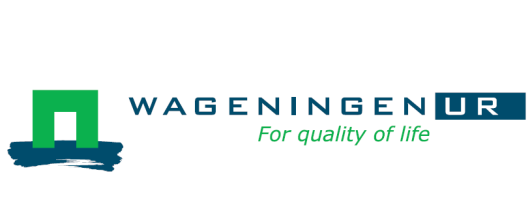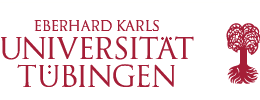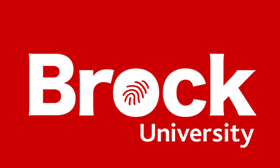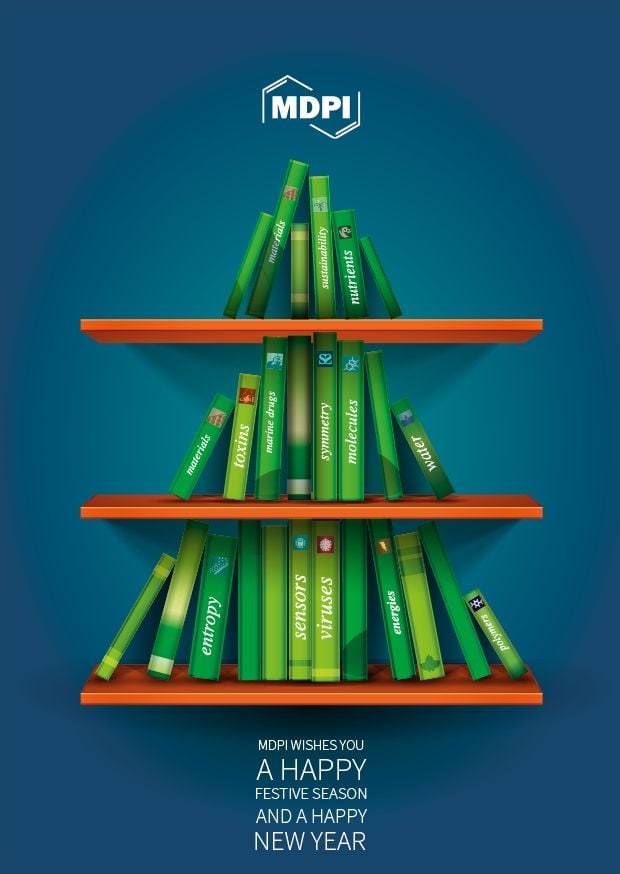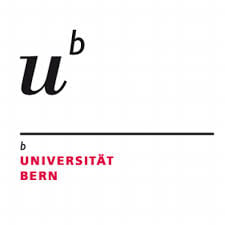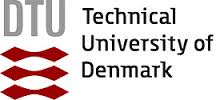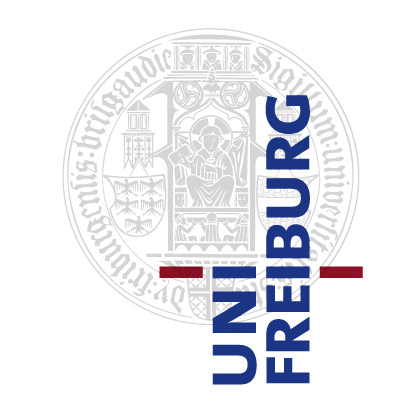
Journal Menu
► ▼ Journal Menu-
- Biology Home
- Aims & Scope
- Editorial Board
- Reviewer Board
- Topical Advisory Panel
- Instructions for Authors
- Special Issues
- Topics
- Sections & Collections
- Article Processing Charge
- Indexing & Archiving
- Editor’s Choice Articles
- Most Cited & Viewed
- Journal Statistics
- Journal History
- Journal Awards
- Society Collaborations
- Conferences
- Editorial Office
Journal Browser
► ▼ Journal BrowserNeed Help?
Announcements
10 April 2024
Meet Us at the 48th FEBS Congress, 29 June–3 July 2024, Milan, Italy

Conference: The 48th FEBS Congress
Date: 29 June–3 July 2024
Location: Milan, Italy
MDPI will be attending the 48th FEBS Congress at Booth #30, and we welcome researchers from different backgrounds to visit us and share their latest ideas.
The Italian Society of Biochemistry and Molecular Biology (SIB), founded in 1951, will host the event. The 48th FEBS Congress—“Mining biochemistry for human health and well-being”—welcomes scientists from Europe and other parts of the world.
The 48th FEBS Congress will present a broad-spectrum and ground-breaking scientific program in a fruitful collaboration with FEBS journals and representatives from FEBS Constituent Societies. The SIB and biochemical community are focusing on human health and well-being through molecular and cellular science approaches; this is a key social issue amid ongoing global transitions. Besides presenting the latest and emerging developments in biochemical sciences, the Congress will include dedicated education-oriented sessions, symposia organized by young biochemists, and biochemistry-related economic discussions. Industry representatives will also give presentations on the latest advances in commercial instrumentation.
The following MDPI journals will be represented:
- Biomedicines;
- IJMS;
- JMP;
- Antioxidants;
- Applied Biosciences;
- BioMedInformatics;
- Biomolecules;
- Dietetics;
- Life;
- Medical Sciences;
- Molecules;
- Biology;
- Cancers;
- CIMB;
- Pharmaceutics.
If you plan to attend this conference, please start an online conversation with us. Our delegates look forward to meeting you in person and answering your questions. For more information about the conference, please visit the following website: https://2024.febscongress.org/.
2 April 2024
MDPI Insights: The CEO's Letter #10 - South Korea, IWD, U2A, Japan

Welcome to the MDPI Insights: The CEO's Letter.
In these monthly letters, I will showcase two key aspects of our work at MDPI: our commitment to empowering researchers and our determination to facilitating open scientific exchange.
Opening Thoughts

Left to right: Dr. Jisuk Kang (Scientific Officer, MDPI), Stefan Tochev (CEO, MDPI), and Dr. Giulia Stefenelli (Chair of Scientific Office Board, MDPI), during media meetings at Prain Agency office in Seoul, South Korea.
Visit to Seoul, South Korea
During my recent visit to South Korea, I had the privilege of meeting various stakeholders, including representatives of government, research institutions, and academia, to understand their needs and communicate MDPI’s commitment to accessible science. Accompanied by my colleagues Dr. Giulia Stefenelli and Dr. Jisuk Kang, I engaged with the Korean scientific community, which is increasingly embracing open access (OA).
As the leading OA publisher in South Korea, MDPI is trusted by local authors and in 2023 enjoyed an approximately 30% share of the OA market. South Korea ranks sixth globally for MDPI in terms of research papers submitted and published.
MDPI and South Korea by Numbers
As at 30 March, over 76,000 MDPI articles have been authored by individuals affiliated with Korean institutions. We have over 1,800 active editorial board members (EBMs) from South Korea, with more than 880 EBMs having an H-index between 26 and 50, including 10 serving as Chief Editors.
“South Korea is the sixth-largest contributor to our total publications”
Over the past five years (2019–2023), nearly 120,000 authors affiliated with South Korean institutes have published with MDPI. Specifically in 2023, we received approximately 25,000 submissions from South Korean authors, publishing close to 13,000 articles, resulting in a rejection rate of 47.4%, which is not far below MDPI’s overall rejection rate of 56.4% in 2023.
Institutional Partnerships with South Korea
I am pleased to share that MDPI has more than 825 institutional partnerships worldwide, with 12 in South Korea, including Kyunghee University, Chung-Ang University, and Inha University, among others.

Left to right: Dr. Jisuk Kang (Scientific Officer, MDPI), Dr. Giulia Stefenelli (Chair of Scientific Office Board, MDPI), and Stefan Tochev (CEO, MDPI) fielding media questions at Prain PR Agency office in Seoul, South Korea.
Over the past three years (2021–2023), we have had some of the most prestigious academic universities ranked among the top 10 Korean institutions publishing with MDPI. Seoul National University had the highest number of publications with MDPI during those three years, publishing nearly 6,000 papers. Universities such as Korea University and Yonsei University also rank among the top 10 Korean institutions publishing with MDPI.
MDPI Hosts Seminar for Academia and Media
As the world’s leading OA publisher, MDPI is actively democratizing science. This is reflected in the seminars we hosted on 21 March to address questions about our editorial processes and ethical standards. The visit garnered media coverage, reflecting our mission to providing high-quality services and fostering open dialogue in the community.
“MDPI is actively democratizing science”
MDPI in the News

Stefan Tochev (CEO, MDPI) leading a seminar on OA and MDPI at Prain PR Agency office in Seoul, South Korea.
Media coverage generated by our visit to Seoul included the following stories:
“Open access is an unstoppable trend…it will lead the development of the knowledge ecosystem.”
I greatly appreciate the contributions of everyone who took the time to meet with us, share their stories, and hold us accountable for continuing to provide high-quality publishing services while identifying areas for improvement. I am also excited to announce that we have opened an MDPI office in Seoul and will release a press release on MDPI.com, with details, by the end April 2024. The purpose of the office is to establish a local presence to connect with and support the South Korean academic community through institutional partnerships, conferences, author workshops, stakeholder communications, and more.
Impactful Research

Featured Articles on Women’s Leadership and Healthcare
In celebration of International Women’s Day (8 March 2024), MDPI curated a collection of research articles on various topics, including women’s leadership, reproductive health, preventive healthcare, and a selection of articles from our journal Women.
Women’s Leadership
- Women Entrepreneurship and Sustainable Development: Bibliometric Analysis and Emerging Research Trends
Sustainability 2022, 14, 9160. https://doi.org/10.3390/su14159160 - Refugee Women Business Mentors: New Evidence for Women’s Empowerment
Sustainability 2022, 14, 9154. https://doi.org/10.3390/su14159154 - Women and Leadership in Higher Education: A Systematic Review
Soc. Sci. 2023, 12, 555. https://doi.org/10.3390/socsci12100555 - Understanding Needs and Potentials for Gender-Balanced Empowerment and Leadership in Climate Change Adaptation and Mitigation in Africa
Sustainability 2022, 14, 9410. https://doi.org/10.3390/su14159410 - Challenges Women Experience in Leadership Careers: An Integrative Review
Merits 2023, 3, 366-389. https://doi.org/10.3390/merits3020021
Women’s Reproductive Health
- Recreational Female Athletes’ Understanding of and Perceived Impact of the Menstrual Cycle on Physical Performance, Mood, and Sleeping Behaviour
Women 2023, 3, 445-456. https://doi.org/10.3390/women3030034 - Difficulties in Adaptation of the Mother and Newborn via Cesarean Section versus Natural Birth—A Narrative Review
Life 2023, 13, 300. https://doi.org/10.3390/life13020300 - The Main Theories on the Pathogenesis of Endometriosis
Int. J. Mol. Sci. 2023, 24, 4254. https://doi.org/10.3390/ijms24054254
Women’s Preventive Healthcare
- Insulin Metabolism in Polycystic Ovary Syndrome: Secretion, Signaling, and Clearance
Int. J. Mol. Sci. 2023, 24, 3140. https://doi.org/10.3390/ijms24043140 - Assessing Barriers Encountered by Women in Cervical Cancer Screening and Follow-Up Care in Urban Bolivia, Cochabamba
Healthcare 2022, 10, 1604. https://doi.org/10.3390/healthcare10091604 - Updates on HPV Vaccination
Diagnostics 2023, 13, 243. https://doi.org/10.3390/diagnostics13020243
Featured Articles in MDPI Journal Women
Below are a few articles from Women, our journal focused on women’s health, the social determinants of health, and the healthcare system that serves women. The aim of Women is to encourage academics to publish their experimental and theoretical results in detail, to aid reproducibility, and in an engaging style, to aid comprehensibility.
- Premenstrual Syndrome and Exercise: A Narrative Review
Women 2023, 3, 348-364. https://doi.org/10.3390/women3020026 - Increasing Awareness of the Human Papillomavirus (HPV) Vaccine for Women 18–45 Years of Age
Women 2023, 3, 365-373. https://doi.org/10.3390/women3030027 - Addressing Women’s Needs with Human Immunodeficiency Virus (HIV) and Enhancing the Visibility of Pharmacists in the Public Health Arena
Women 2022, 2, 346-352. https://doi.org/10.3390/women2040032
Inside MDPI

Championing Women’s Healthcare and Access to Healthcare Information
MDPI colleagues from our offices joined in celebrating #IWD2024. In doing so, we emphasized key missions that encompass:
- Empowering women to assume leadership and decision-making roles in both business and science.
- Helping women and girls make informed decisions about their health.
- Recruiting and developing female talent and fostering inclusive workplace environments.
“We are thrilled to recognize the accomplishments of women scientists”
I am proud to see our colleagues enthusiastically supporting the International Women’s Day call to ‘Inspire Inclusion!’ The heart-hands in the collage below symbolize our appreciation of the achievements of women researchers and the recognition of the trailblazers who have courageously made a mark on societies past and present.

We are thrilled to recognize the accomplishments of women scientists through our many MDPI awards and by highlighting success stories. As inspirational figures, female scientists are paving the way for the next generation of women aspiring to pursue careers in engineering, life sciences, computing, and various other STEM fields.
“I consider myself lucky because I work with incredibly talented women who inspire me every day.”
– Dr. Alessandra Pasut, Winner of MDPI's ‘Biology 2023 Young Investigator Award’
“It’s really important to find a supportive and enabling environment in which to do your science; it would have a big impact on you as a person and on your scientific outputs.”
– Dr. Rhea Longley, Winner of the ‘Pathogens 2023 Young Investigator Award’
Open-access publishing, in particular, allows early-career women researchers to share their work more widely, potentially attracting mentorship opportunities and collaborations. This support is crucial for career development and advancement.
Coming Together for Science

MDPI Joins United2Act in Collective Fight to Stop Paper Mills
In my February 2024 CEO Letter, I highlighted some of our recent initiatives aimed at bolstering our commitment to research integrity, including joining the STM Integrity Hub and expanding our Research Integrity and Publication Ethics team (RIPE). Continuing our efforts in coming together for science, I am pleased to share our participation in the United2Act initiative.
The text below is taken from our official announcement:
United2Act represents an international group of stakeholders in the publishing industry committed to addressing the collective challenge posed to research integrity by paper mills.
Scientists and academic publishers have increasingly noted the alarming proliferation of paper mills, recognized as fraudulent entities seeking to manipulate the publication process for financial profit. These entities engage in fraudulent practices such as falsifying or fabricating data, selling co-authorship of fake papers, manipulating peer review, and including inappropriate citations. These actions pose a significant threat to the integrity of the scholarly record, prompting widespread concern among those involved in the academic community.
MDPI has been actively contributing to combat the undermining of the scientific record. Our editors employ a set of tools to detect potential ethical breaches within a manuscript and to tackle the issue of fake papers.
United2Act’s consensus statement is the outcome of a virtual summit held in May 2023. It involved the participation of research bodies, publishers, researchers/sleuths, universities, and publishing infrastructure from 15 countries and resulted in a Consensus Statement outlining five key areas of action for all stakeholders:
- Education and awareness
- Improve post-publication corrections
- Facilitate and organise research on paper mills
- Enable the development of trust markers
- Facilitate dialogue between stakeholders
MDPI is committed to promoting transparency and integrity in scholarly publishing and is continuing to work closely with the scientific community toward this goal.
Closing Thoughts

Left to right: Ryo Hirayama (Marketing Specialist, MDPI), Takashi Sasabe (Marketing Specialist, MDPI), Dr. Giulia Stefenelli (Chair of Scientific Office Board, MDPI), Dr. Izumi Yamamoto (Marketing Manager, MDPI), and Stefan Tochev (CEO, MDPI), at MDPI’s office in Tokyo, Japan.
Visit to Tokyo and Kyoto, Japan
In March, I had the opportunity to visit our Tokyo office and engage with stakeholders in Tokyo and Kyoto. During the visit, I also recorded a video message to welcome Japanese scholars working with MDPI and to highlight our operations in Japan.
We held meetings with Editors-in-Chief, librarians, scholars, and external consultants to gather feedback on our efforts to enhance our reputation and explore additional steps we can take in that direction. Japan's rich cultural heritage, characterized by tradition, respect, and formality, provided valuable insights into meeting the publishing needs specific to Japan.
Japan’s Open Access statistics
Over the years, we have seen a shift from subscription-only to gold OA publishing in Japan, despite the lack of an official mandate. Here are some statistics:
- 2012: 68% of articles were subscription-only, 6% were green Open Access, and 8% were gold Open Access.
- 2016: 55% of articles were subscription-only, 6% were green Open Access, and 20% were gold Open Access.
- 2022: 43% of articles were subscription-only, 7% were green Open Access, and 39% were gold Open Access.
To learn more about the history of OA in Japan as well as about future trends, please read this blog post.
“Japan is the ninth-largest contributor to our total publications”

Left to right: Stefan Tochev (CEO, MDPI), Dr. Izumi Yamamoto (Marketing Manager, MDPI), and Dr. Giulia Stefenelli (Chair of Scientific Office Board, MDPI) visiting Kyoto University in Kyoto, Japan.
MDPI and Japan by Numbers
As at 1 April, over 50,000 MDPI articles have been authored by scholars affiliated with Japanese institutions, making the country the ninth-largest contributor to our total publications. Over the past three years (2020–2023), nearly 90,000 authors affiliated with Japanese institutes have published with MDPI, and we have collaborated with over 4,600 Guest Editors from Japan.
In 2023, we published over 8,200 papers from authors associated with Japanese institutions. MDPI collaborates with 41 institutional partnerships in Japan, including the University of Tokyo, Hokkaido University, and Nagoya University. We have over 2,100 active EBMs from Japan, more than 1,050 EBMs having an H-index between 26 and 50, including 13 serving as Editors-in-Chief.
General Feedback – a side note
A general takeaway from our discussions with stakeholders from around the world is that negative perceptions of MDPI often stem from misinformation, misconceptions, or misunderstandings about MDPI and our practices. While we acknowledge our mistakes and work diligently to address them, maintaining a strong editorial procedure and robust peer-review process, I find that educating stakeholders about our how we do what we do and our ongoing improvements tends to help shift opinions.
That said, we recognize the importance of addressing individual concerns. We take feedback seriously and are continuously working to get better while not compromising the core principles that millions of authors appreciate about MDPI.
Chief Executive Officer
MDPI AG
4 March 2024
MDPI Insights: The CEO's Letter #9 - Romania, Research Integrity, Viruses

Welcome to the MDPI Insights: The CEO's Letter.
In these monthly letters, I will showcase two key aspects of our work at MDPI: our commitment to empowering researchers and our determination to facilitating open scientific exchange.
Opening Thoughts

Reka Kovacs (Deputy Office Manager, MDPI), Stefan Tochev (CEO, MDPI), and Sandra Ana Spatariu (Office Manager, MDPI) at the MDPI office in Cluj, Romania.
MDPI’s Impact on Romania
In February, I visited our office in Cluj, Romania. I worked closely with our senior office managers and various teams, including the departments of training, marketing and conferences, as well as our journal relationship specialists, reviewing our service to the local scholarly community. During the visit, I also met with representatives from Babes-Bolyai University and the Technical University of Cluj-Napoca. Our multifunctional Romanian office plays an important role in supporting our collaborations with the local market as well as helping to meet MDPI’s overall business needs.

Feedback and strategy meeting with a group of MDPI’s Journal Relationship Specialists at the MDPI office in Cluj, Romania.
With 22,436 articles, Romania ranks as a top 20 contributing country to MDPI’s total number of papers published as at 28 February 2024. This highlights the importance of our collaboration with Romanian-affiliated authors and the growing opportunity to support their publishing needs. MDPI is one of the few academic publishers with a significant presence in Romania, boasting over 360 colleagues across our offices in Bucharest and Cluj. We are also proud to hire colleagues from local institutions to launch their careers within publishing.
Romania ranks as a top 20 contributing country.
The Numbers: 2019–2023
MDPI has seen a healthy increase in submissions from Romanian authors over the past three years, from 8,439 in 2021 to 11,866 by end of 2023, with most submissions going to journals such as Sustainability, Medicina, Diagnostics, IJMS, Applied Sciences, and JCM. From 2019 to 2023, MDPI published articles from 32,145 authors affiliated with Romanian institutions. Over those years, we have worked with Romanian Guest Editors on nearly 3,000 occasions to support their Special Issue and Topical collections.
With more than 300 Editorial Board Members from Romania, 34 appear on the board of Mathematics, 27 on Materials, 19 on Polymers, 18 on Coatings, and 16 on Molecules, while three serve as Section Editors-in-Chief (SEiC) on our journals Coatings (3.4 IF, 4.6 Citescore), Magnetochemistry (2.7 IF, 3.5 Citescore), and Chemosensors (4.2 IF, 3.9 Citescore).
Institutional Open Access Programs
Our commitment to working with institutions is evident in Romania, where we have established eight Institutional Open Access Programs (IOAP) with esteemed institutions such as the University of Bucharest, the University of Medicine and Pharmacy Cluj-Napoca, and most recently the National Institute for Laser, Plasma and Radiation Physics.
Our growth and presence in Romania are a true testament.
We also have IOAP agreements with Babes-Bolyai University and the Technical University of Cluj-Napoca, where I had the opportunity to meet senior stakeholders during my visit. Below are a few photos capturing our meeting with Prof. Radu Silaghi-Dumitrescu (Head of Faculty of Chemistry, Babes-Bolyai University) at the MDPI office in Cluj, Romania, along with a photo from our meeting with Vice Deans Nicoleta Cobarzan, Nicoleta Ilies, and Hoda Gavril, from the faculty of Civil Engineering at the Technical University of Cluj, Romania.


Our growth and presence in Romania are a true testament to the service we provide to the scholarly community and the relationships we foster in that region. We look forward to continuing to support Romanian scholars and institutions by providing a valuable and trusted experience with MDPI, the leader in open access publishing.
Impactful Research

MDPI Joins the STM Integrity Hub
MDPI has long been a supporter and partner of STM, with our involvement ranging from sponsoring and attending events to helping organize event programs. By joining the STM Integrity Hub, we aim to further our commitment to STM initiatives aimed at safeguarding the integrity of science.
“We are pleased to welcome MDPI as the 35th organisation participating in the Hub. This expansion is critical, as every new member enhances our capacity to prevent fraudulent submissions from entering the academic record.”
Joris van Rossum, Director of Research Integrity, STM
MDPI operates in full alignment with STM Integrity Hub's values of shared data and experiences. We strongly believe in collaboration and open exchange for the purposes of creating a holistic approach to support research integrity at MDPI itself and across the entire academic publishing industry. The Integrity Hub is an excellent example of how publishers can come together to jointly address industry-wide challenges related to research integrity, such as manuscripts that breach research integrity standards and paper-mills.
I look forward to our Research Integrity and Publication Ethics Team (RIPE) team immersing themselves in this initiative, exchanging information, best practices, and tools for the benefit of the entire scholarly ecosystem. We believe that ethical publishing standards should be implemented across the board, and we aim to be rigorous in our approach, addressing research integrity issues and improving the impact of published research.
Inside MDPI

MDPI Expands Research Integrity and Publication Ethics Team (RIPE)
In addition to external collaborations and joint initiatives aimed at further strengthening our commitment to research integrity, we are also enhancing our internal efforts. This includes improving our processes and guidelines and expanding our teams and departments to ensure quality assurance throughout our publishing process.
We are pleased to announce the expansion of our Research Integrity and Publication Ethics Team (RIPE) at MDPI. The RIPE team has recently welcomed new colleagues, each bringing unique skills and a personal commitment to prioritize ethical considerations in all our work.
The demand for research integrity and high ethical standards in academic publishing is steadily rising across our industry. Our expanded RIPE team will work to enhance and align our practices with industry best practices, ensuring excellence in research integrity and publication ethics.

Stefan Tochev (CEO, MDPI) introduces Dr. Tim Tait-Jamieson (Research Integrity Lead, MDPI) for his presentation on MDPI’s Retraction and Approval Process to a group of Journal Relationship Specialists at the MDPI office in Cluj, Romania: “The demand for research integrity and publication ethics is steadily rising across our industry.”
Introducing our Research Integrity and Publication Ethics Team
Led by Dr. Tim Tait-Jamieson (Research Integrity Lead), the RIPE team comprises Dr. Ivana Resanovic (Research Integrity Manager), Dr. Lavinia Rogojina (Research Integrity Manager), Ms. Diana Apodaritei (Research Integrity Specialist), Dr. Zoltan Mihaly (Research Integrity Specialist), Mr. Aleksandar Đukić (Research Integrity Specialist), Ms. Ana Stankovic (Research Integrity Specialist), and Ms. Anna Pena (Publication Ethics Assistant).
Please click here to access everything that you need to know about MDPI’s Research and Publication Ethics.
With this span of complementary roles, the RIPE team collaborates directly with journal editorial teams and works closely with various departments, including our Scientific Office Board and our Journal Relationship Specialists. The team’s primary objectives are to help prevent issues regarding research integrity and publication ethics during peer review, uphold MDPI’s ethics policies, adhere to industry standards, and resolve publication ethics and research integrity issues and complaints.
Quality Updates to Special Issues Oversight
At MDPI, we are committed to reviewing policies pertaining to the quality of research. In this blog post, Shaheena Patel (Communications Associate, MDPI), outlines two recent updates to MDPI journal processes. These updates pertain to Special Issue (SI) quality guidelines, in line with criteria provided by COPE and DOAJ. Alongside the SI updates, details regarding the new minor corrections policy introduced in 2024 are provided in the blog.
The two updates we implemented include greater oversight and the verification of Guest Editor credentials. These guidelines require that Editors-in-Chief (EiCs) and Editorial Board Members (EBMs) take responsibility for overseeing SIs.
PS. Thank you, James Butcher, for featuring this up in your 67th issue of the Journalogy newsletter.
Read more:
Coming Together for Science

Viruses 2024 – A World of Viruses
I am pleased to share the success of our MDPI conference Viruses 2024 – A World of Viruses, held 14-16 February, in Barcelona. With 240 registrations, this event brought together top scientists, researchers, and industry experts from 40 countries to share their findings on the latest developments in viral pathogenesis and immune responses.
Attendees gathered for the 5th edition of the Viruses’ conference, where we hosted influential keynote speeches from Nobel Prize laureate Dr. Charles M. Rice and ‘Distinguished Senior Virologist’ Prof. Luis Enjuanes, along with 14 invited speakers, 47 selected speakers, and nine flash poster presenters, to discuss the most significant issues in virology today.
Recap on the #Viruses2024 Conference
Take a look at the key moments from MDPI’s Viruses event and please join us in commemorating a gathering for global knowledge and cooperation. A heartfelt thank-you to all attendees; their passion and engagement played a crucial role in making this event an engaging success!
Below are calls to action from the keynote speakers encouraging collaboration and communication:
“There’s never been a better time than now to really take the power that we have both in terms of basic research and also in biotech and pharma to develop antiviral agents.” - Dr. Charles M. Rice, The Rockefeller University, New York, USA
“The collaboration between labs is absolutely essential. Improving initial detection and improving communication is a must for all of us working in science.” - Prof. Dr. Luis Enjuanes, National Center of Biotechnology (CNB-CSIC), Madrid, Spain

Our thanks go to our sponsors and partnering societies, our Viruses journal and editorial team, our Barcelona colleagues, and the social media, conference and other MDPI teams for making this event a memorable occasion. View the event gallery here.
Upcoming In-Person Event

24–26 April, 2024
4th MMCS – Harnessing the Power of New Drug Modalities
Location: Barcelona, Spain
Esteemed speakers at MMCS 2024 include Prof. Arun K. Ghosh, the mind behind the Darunavir molecule, and Prof. Paul Brennan, CSO of Alzheimer's Research UK Oxford Drug Discovery Institute.
Find more upcoming MDPI events here.
Organize Your Event with MDPI’s Sciforum
Sciforum is MDPI’s platform dedicated to the organization of scientific events. In line with our mission to promote science, Sciforum supports scholars, societies, research networks, and universities at all stages of organizing in-person events, virtual events and webinars. Our platforms are efficient, user-friendly, and cost-effective. We handle all steps related to event management. Contact us for details.
Closing Thoughts

Researcher to Reader (R2R) Conference
From 20–21 February 2024, I had the pleasure of attending the Researcher to Reader (R2R) conference in London, which MDPI has proudly sponsored over the years. The conference programme offered a variety of session formats, including workshops, panel discussions, debates, interviews, presentations, and lightning talks, with opportunities to discuss relevant topics.
We take pride in supporting the scientific community, bringing researchers across the world together to network, exchange ideas and share the latest in science and publishing. In 2023, MDPI invested close to 2 million CHF in sponsoring over 2,000 scientific and publishing-related conferences worldwide.
R2R Peer Review Innovations Workshop
I found the R2R conference to be engaging, with the workshops being particularly enjoyable. My colleague Giulia Stefenelli (Chair of Scientific Office Board) and I participated in the “Peer Review Innovations” workshop, which spanned four sessions over the two days. These sessions explored the future of peer review and how we can improve the peer review process for everyone involved. Notably, the large majority of attendees expressed their opinion that peer review, as currently practiced, requires significant improvement. Together, we collaborated on potential immediate and long-term improvements and innovative processes, aiming to create an ecosystem beneficial to all stakeholders by strengthening submission systems with the aim of reducing threats and making authors more responsible for their work. We also discussed the opportunity for academic institutions to better scrutinize the quality of the work produced and submitted to journals.
Our group comprised publishers, software providers, librarians, and more, bringing diverse perspectives to the discussions. These interactions were relevant to MDPI’s ongoing conversations, providing insights to our efforts. The session also made me appreciate that MDPI is doing well, as the group discussions included the subject of various quality checks that we have already embedded in our processes, ensuring that we keep abreast of industry standards.
The need for an optimized system to incentivize the activities of editors and reviewers was also a focus of discussion, as well as the support that reviewers need from publishers via the provision of strong reports through fixed forms, questionnaires and training.
At MDPI, we are currently auditing our reviewer program to improve reviewer recognition, guidelines, and methods for identifying suitable reviewers, while maintaining our commitment to quality and timeliness.
Congratulations to Mark Carden, Conference Director, and the R2R team for organizing a productive and successful event. PS: The break times were greatly appreciated as well!
Chief Executive Officer
MDPI AG
7 February 2024
Biology | Top 10 Most Cited Papers in 2023
1. “Targets of Immune Escape Mechanisms in Cancer: Basis for Development and Evolution of Cancer Immune Checkpoint Inhibitors”
by Shovan Dutta, Anirban Ganguly, Kaushiki Chatterjee, Sheila Spada and Sumit Mukherjee
Biology 2023, 12(2), 218; https://doi.org/10.3390/biology12020218
Available online: https://www.mdpi.com/2079-7737/12/2/218
2. “Unsaturated Fatty Acids and Their Immunomodulatory Properties”
by Salvatore Coniglio, Maria Shumskaya and Evros Vassiliou
Biology 2023, 12(2), 279; https://doi.org/10.3390/biology12020279
Available online: https://www.mdpi.com/2079-7737/12/2/279
3. “The Strigolactone Pathway Is a Target for Modifying Crop Shoot Architecture and Yield”
by Jack H. Kelly, Matthew R. Tucker and Philip B. Brewer
Biology 2023, 12(1), 95; https://doi.org/10.3390/biology12010095
Available online: https://www.mdpi.com/2079-7737/12/1/95
4. “Olfactory Impairment Correlates with Executive Functions Disorders and Other Specific Cognitive Dysfunctions in Parkinson’s Disease”
by Paolo Solla, Carla Masala, Tommaso Ercoli, Claudia Frau, Caterina Bagella, Ilenia Pinna, Francesco Loy and Giovanni Defazio
Biology 2023, 12(1), 112; https://doi.org/10.3390/biology12010112
Available online: https://www.mdpi.com/2079-7737/12/1/112
5. “Moss Bags as Biomonitors of Atmospheric Microplastic Deposition in Urban Environments”
by Carter Bertrim and Julian Aherne
Biology 2023, 12(2), 149; https://doi.org/10.3390/biology12020149
Available online: https://www.mdpi.com/2079-7737/12/2/149
6. “Mitochondria Quality Control and Male Fertility”
by José Costa, Patrícia C. Braga, Irene Rebelo, Pedro F. Oliveira and Marco G. Alves
Biology 2023, 12(6), 827; https://doi.org/10.3390/biology12060827
Available online: https://www.mdpi.com/2079-7737/12/6/827
7. “Circle(s) of Life: The Circadian Clock from Birth to Death”
by Iwona Olejniczak, Violetta Pilorz and Henrik Oster
Biology 2023, 12(3), 383; https://doi.org/10.3390/biology12030383
Available online: https://www.mdpi.com/2079-7737/12/3/383
8. “Melatonin: Both a Messenger of Darkness and a Participant in the Cellular Actions of Non-Visible Solar Radiation of Near Infrared Light”
by Dun-Xian Tan, Russel J. Reiter, Scott Zimmerman and Ruediger Hardeland
Biology 2023, 12(1), 89; https://doi.org/10.3390/biology12010089
Available online: https://www.mdpi.com/2079-7737/12/1/89
9. “Gesneriads, a Source of Resurrection and Double-Tolerant Species: Proposal of New Desiccation- and Freezing-Tolerant Plants and Their Physiological Adaptations”
by Ane Legardón and José Ignacio García-Plazaola
Biology 2023, 12(1), 107; https://doi.org/10.3390/biology12010107
Available online: https://www.mdpi.com/2079-7737/12/1/107
10. “Compatible Consortium of Endophytic Bacillus halotolerans Strains Cal.l.30 and Cal.f.4 Promotes Plant Growth and Induces Systemic Resistance against Botrytis cinerea”
by Polina C. Tsalgatidou, Eirini-Evangelia Thomloudi, Costas Delis, Kallimachos Nifakos, Antonios Zambounis, Anastasia Venieraki and Panagiotis Katinakis
Biology 2023, 12(6), 779; https://doi.org/10.3390/biology12060779
Available online: https://www.mdpi.com/2079-7737/12/6/779
1 February 2024
Acknowledgment of the Reviewers of Biology in 2023
In recognizing the exceptional efforts of our reviewers in 2023, we express our sincere gratitude for upholding the high standards of Biology. Their commitment ensured the rigorous peer review that is integral to quality academic publishing.
In 2023, Biology received 5215 review reports, from 4527 reviewers. This past year, we worked with reviewers from 90 countries and regions, reflecting the diversity in our collaboration with research communities. Their dedication shapes scholarly discourse and advances global research. The editorial team expresses gratitude for the vital role played by each reviewer in the Biology family throughout 2023, and we look forward to their continued support in 2024.
The following are the reviewers who have consented to show their names:
| A. Abdul Kader Jailani | Laura Teresa Hernández Salazar |
| A. N. M. Mamun-Or-Rashid | Laurentius Josephus Gerardus Van Der Maesen |
| Aarif K.M | Lei Wang (China) |
| Abbas Malandish | Lei Wang (USA) |
| Abbirami Elangovan | Lei Zhang |
| Abd El-Aziz Abd El-Aziz | Lei Zhao |
| Abdallah Tageldein Mansour | Leon Higley |
| Abdolrahman Khezri | Leon Kroczek |
| Abouzar Najafi | Leonard Bonilha Piveta |
| Abraham Escobedo-Moratilla | Leonardo Velasco |
| Abraham Finny | Leonel Pereira |
| Adam Rajsz | Leonid Bystrykh |
| Adán Jordán | Levan Mumladze |
| Adérito Seixas | Levent Ceylan |
| Adília Pires | Li Fu |
| Adina Marza | Li Wang |
| Adonis Yiannakas | Lia Méndez-Rodríguez |
| Adrian Macri | Libei Li |
| Afrooz Rashnonejad | Lifang Yang |
| Afshan Fathima Nawas | Lihua Wang |
| Agata Znamirowska-Piotrowska | Lin Huang |
| Agnieszka Potęga | Lin Li |
| Ahmed Ateya | Lingxu Li |
| Ahmed Shaaban | Liping Gu |
| Ahmed Zaeen | Lira Gaysina |
| Aitor Fernandez-Novo | Lokesh Kumar |
| Ajinkya Pawar | Lorena Beatriz Quiroga |
| Ajit Kumar Navin | Lorena María Durán-Riveroll |
| Alaa El-Dein Omara | Lori Young |
| Alberta Mandich | Louie Slocombe |
| Alberto Arias-Pérez | Lu Xiao |
| Alberto Collareta | Luca Poli |
| Alberto Gianinetti | Lucía Couceiro |
| Alberto Ochoa | Luciana-Catalina Panait |
| Aldo Ferreira-Hermosillo | Luciano Bosso |
| Alejandro Silva-Palacios | Luigi Menghini |
| Aleksandar Stojsavljević | Luigi Vimercati |
| Aleksandra Jovanović Galović | Luis Leitão |
| Aleksandra Milovancev | Luis Viteri |
| Aleksey Troitsky | Luisa Sartori |
| Alessandra Maria Vitale | Łukasz Szeleszczuk |
| Alessandra Varalli | Luminita Bejenaru |
| Alessandro Ferrarini | Lunda Shen |
| Alessandro Marroni | Lusi Zhang |
| Alessandro Medoro | Lyudmila Bel'Skaya |
| Alessia Mariano | Lyudmila Kamburska |
| Alessio Iannucci | Lyudmila Kokaeva |
| Alessio Mengoni | Maciej Socha |
| Alexander Bertuccioli | Madhuja Samaddar |
| Alexander Dvoretsky | Magdalena Karaś |
| Alexander H. Maass | Magdalena Knežević |
| Alexander Kuprin | Mahdi Hosseinzadeh |
| Alexander Otahal | Mahesh Gupta |
| Alexandros Sykaras | Mahesh Kandasamy |
| Alexandru Gudea | Mahfouz Abd-Elgawad |
| Alexey Golikov | Mahmoud F. Seleiman |
| Alexey Maximov | Mahmoud Madkour |
| Alexey Mittenberg | Mahmoud W. Yaish |
| Alexey Panov | Mai Mostafa |
| Alexey Safonov | Maike Busch |
| Alexios Alexopoulos | Maja Cavic |
| Alexis Murillo Carrasco | Maksim Aksenov |
| Alfredo Franco-Obregón | Małgorzata Buksińska-Lisik |
| Ali El-Raghi | Mamdouh Y. Elgendy |
| Ali Reza Yousefi | Mamta Bhat |
| Ali Zarrabi | Man Qu |
| Alica Pizent | Mana Mukherjee |
| Alina Zorina Stuparu Stroe | Manish Kumar |
| Alireza Tarinejad | Manohar Kodavati |
| Alison Anderson | Manohar Radhakrishnan |
| Allai Larbi | Manoj Garg |
| Alvin Kah Wei Hee | Manuel De La Sen |
| Alzahraa Ahmad | Manuel J. Díaz Villanueva |
| Am Azbas Taurusman | Manuel Rodríguez-Ortega |
| Amany Abdel-Rahman | Mara Carsote |
| Amir Sasan Mozaffari Nejad | Marcelo Moura |
| Amira Ibrahim | Marcia Bastos Convento |
| Amit Kumar | Marcin Jakubowski |
| Ana A. Feregrino-Perez | Marcin Kalarus |
| Ana Luísa De Sousa-Coelho | Marcin Kozuch |
| Ana Maria Silva | Marcin Różewicz |
| Ana Podolski-Renić | Marco Centanni |
| Ana Sofia Vallés | Marco Mouanness |
| Ana Vujic | Marcos Brioschi |
| Anamarija Zore Zore | Margaret Saha |
| Anand Desai | Margherita Eufemi |
| Anant Jaiswal | María Antonia Sánchez-Romero |
| Anastasiia Shcherbitskaia | Maria Coimbra |
| Anastasiya Kazantseva | Maria Concetta Geloso |
| András Molnár | Maria De Falco |
| Andre Aptroot | Maria Elena Martín |
| Andrea A. Cabrera | Maria Francesca Armentano |
| Andrea Ciricugno | Maria Jesus Herrero |
| Andrea Citarella | María Leyre Lavilla-Lerma |
| Andrea Giannini | Maria Meringolo |
| Andrea Mastinu | Maria Notara |
| Andrea Polo | Maria Protopapa |
| Andrea Telatin | Maria Rosaria Varì |
| Andreas Brodehl | María Teresa Llinas Más |
| Andrei Vasile Nastuta | María Teresa Soto-Navarrete |
| Andrew Macrae | Mariana Hristova |
| Andrey Aksenov | Mariann Harangi |
| Andrey Gorshenin | Marianna Flora Tomasello |
| Andrey Letarov | Mariella Baratti |
| Andrey Zamyatnin | Marija Burek Kamenaric |
| Andrzej Kapusta | Marina Fiori |
| Andrzej Zolnowski | Marina Holyavka |
| Andy Lane | Marina Zelenskaya |
| Anestis Karkanis | Mário André Rodrigues Ferreira |
| Angel Llamas | Mariya Smetanina |
| Angela Marino | Mark Wiser |
| Anh Quynh Le | Marko Anđelković |
| Anil Rai | Marquez-Rocha Facundo-Joaquin |
| Anindya Ganguly | Marta Fiołka |
| Anirban Bhar | Marta Letizia Hribal |
| Aniruddha Das | Marta Llansola |
| Anirudha Chattopadhyay | Martin Kello |
| Ankit Shroff | Martin Müller |
| Anna Kabłak-Ziembicka | Martina Gabrielli |
| Anna Kitaeva | Martina Johnson Pokorná |
| Anna Palermo | Marvin Soriano-Ursua |
| Anthony Michael Carter | Marwan El Ghoch |
| Anthony Rowe | Maryam Keshavarzi |
| Antonela Paladin | Masahiko Kitahara |
| Antonio Santagostini | Masaki Ueno |
| Antonio Zandona | Masaru Tanaka |
| Anurag Malik | Masashi Mizuguchi |
| Anurag Shukla | Matheus Camargo Silva Mancini |
| Apoorv Tiwari | Matheus Cruz |
| Arafat Abdel Latef | Mati Pääsuke |
| Archontia Chatzispyrou | Matija Rijavec |
| Arda Özen | Matthew Gage |
| Arianna De Mori | Matthias Futschik |
| Arinze Okoli | Mauro Marengo |
| Arkadiusz Artyszak | Mauro Vilar |
| Armando Caseiro | Maxim V. Vinarski |
| Artur Słomka | Maya Dymova |
| Arulselvan Palanisamy | Mayank Choubey |
| Arun Sridhar | Mayukh Guha |
| Asahi Ogi | Md Kabir |
| Ashaimaa Moussa | Md. Saiful Islam |
| Ashish Mohite | Mehdi Moghanibashi |
| Ashok Vaseashta | Melvin Ambele |
| Asker Khapchaev | Meng Gou |
| Astrida Velena | Meng Luo |
| Athikhun Suwannakhan | Meng Wu |
| Atukuri Dorababu | Meng-Jia Lau |
| Atul Pandey | Menta Ballesteros |
| Auriel A. Willette | Mercedes Fernandez |
| Aurora Grandal-d'Anglade | Mershen Govender |
| Avinash Kundadka Kudva | Mi Kyung Park |
| Avinash Premraj | Micah Brush |
| Axel Mithöfer | Michael Bette |
| Ayesha Fahim | Michael Joachim |
| Azubuike Chukwuka | Michael Schalli |
| Baba-Moussa Lamine | Michał Wróbel |
| Babhrubahan Roy | Michał Zarobkiewicz |
| Bacem Khalele | Miguel Angel Alcántara Ortigoza |
| Barbara Bertoglio | Miguel Ángel Rodríguez-Milla |
| Barbara Spolaore | Miguel Arenas |
| Barry Bradford | Miguel Pereira |
| Barry Cooperman | Mihaela Ionescu |
| Bartłomiej Barczyński | Mikhail Dubinin |
| Bartosz Borczyk | Milica Manojlović-Stojanoski |
| Bartosz Jan Płachno | Milica Pešić |
| Bartosz Kruszewski | Milorad Dragic |
| Basavaraj Balapal | Mingxing Ouyang |
| Bassam Elgamoudi | Mira Aničić Urošević |
| Beatrice Ferrari | Mirela Petrić |
| Behrooz Heidari | Miriam Belmaker |
| Behzad Kaviani | Mirjana Šipek |
| Bekir Kabasakal | Mithil Soni |
| Benjamín Cartes-Saavedra | Mohamed Achaaban |
| Benjamín Quiroz-Martínez | Mohamed Khalifa |
| Benjamin Voellger | Mohamed Nasser |
| Beppe Benedetto Consentino | Mohammad Attaullah |
| Bernat Soria | Mohammad Mehdizadeh |
| Bernd Feige | Mohammad Sadat-Hosseini |
| Bernhard Zdársky | Mohammed Al Abri |
| Bert Hoeksema | Mohammed Aourach |
| Betül Yilmaz Öztürk | Mohammed Ibrahim |
| Bhim Sen Thapa | Mohd Zulkifli Salleh |
| Bhupendra Singh | Mohsen Niazian |
| Biane Philadelpho | Mohsen Ramadan |
| Bianka Grunow | Monika Höfer |
| Bin Wu | Monika Jach |
| Bing Liu | Monika Kosmala |
| Biswajit Padhy | Mortaza Khodaeiaminjan |
| Blanca R. Lopez | Mostafa Hegazy |
| Blandine Davail | Mo'Tassem Al-Arydah |
| Bohao Fang | Mouna Ghorbel |
| Bojarska Joanna | Muhammad Azeem |
| Bongkotrat Suyamud | Muhammad Farooq |
| Boris Krasnikov | Muhammad Sajid Hamid Akash |
| Božena Ćurko-Cofek | Muhammad Waheed |
| Brigitte Hantusch | Munawar Khalil |
| Brijesh Singh S. | Mustafa Jibrin |
| Brittany S. Barker | Mustafa Kadihasanoglu |
| Bruno Mattos | Mustapha Imam |
| Bryan Crawford | Nadia Ali |
| Buli Su | Nadia Lampiasi |
| Cahide Yığın | Nanako Kawaguchi |
| Caio Carlos | Nan-Jay Su |
| Camila Frade | Naresh Poondla |
| Cankut Cubuk | Natali Delorme |
| Carlo Campobasso | Natalia Belosludtseva |
| Carlos Alberto-Silva | Natalia Ferreira Mendes |
| Carlos Brandão | Natalia Koubassova |
| Carlos Hernando Gómez Quintero | Natalia Kryukova |
| Carlos Rocha-De-Lossada | Natalia V. Chernova |
| Carlos Yure B. Oliveira | Nataly Gruntenko |
| Carolina Francelin Rovarotto | Nathalie Scheers |
| Carolina Otero | Nedim Durmus |
| Caroline Frey | Neeraj Chauhan |
| Cecília Castro | Neetika Jaisinghani |
| Cengiz Toker | Nejc Kozar |
| Cesar Augusto Ruiz Agudelo | Nejc Umek |
| Chaiyaboot Ariyachet | Nesrein Hashem |
| Chandan Sona | Newton Verbisck |
| Chandrappa Anilkumar | Nicholas Bacci |
| Chang Guo | Nicholas Romano |
| Chang'an Wang | Nicla Romano |
| Chang-Ming Bai | Nico Alioravainen |
| Changshan Niu | Nicolas Casadei |
| Charles Harrington | Nicole Du |
| Charlie Rice | Nicolò Columbano |
| Chatsirin Nakharuthai | Nikita Mitkin |
| Chelsea Lin | Nikola Jovanović |
| Chen Dong | Nikolaos Remmas |
| Chen Wang | Nikolina Mihaylova |
| Chenghao Chen | Nilanjan Lodh |
| Chennaiah Ande | Nina Edin |
| Chia Shan Wu | Nina Tikunova |
| Chiara Agostinis | Nithya N. Kutty |
| Chih-Li Lin | Noelia Carmona-Vicente |
| Choo Hock Tan | Noha Hammad |
| Christian Barbato | Nourolah Soltani |
| Christian Ernest Vincenot | Nuri Başusta |
| Christian Hanzen | Oberdan Ferreira |
| Christine Didier | Octavian Vasiliu |
| Christoph Hudemann | Oksana Tkachenko |
| Christos Chatzidoukas | Oldřich Nedvěd |
| Chryssanthi Antoniadou | Ole Christian Hagestad |
| Cino Pertoldi | Oleg Ogarkov |
| Cinta Zapater | Olena Stabnikova |
| Ciria C. Hernandez | Olesya Sazonova |
| Claire Jean-Quartier | Olga Anatskaya |
| Clarissa Naidoo | Olga Boldina |
| Claudia Kusmic | Olga Panfilova |
| Claudia Pinelli | Olivia Rodríguez-Morales |
| Claudio Tirelli | Omid Akhavan |
| Claudiu Popescu | Osama Kishta |
| Constantin Munteanu | Othmane Merah |
| Constantino López-Macías | Ovidiu Pop |
| Creed Jones | Oyuna Kozhevnikova |
| Cristian Moreno García | Pablo Elías Morande |
| Cristiano De Pitta | Pablo Luna-Nevarez |
| Cristina González-Montelongo | Pablo Sanchez-Quinteiro |
| Cristina Sobacchi | Paola Maycotte |
| Cristina Xavier | Paolo Bagnaresi |
| Csaba Hancz | Paolo Trucillo |
| Cyril Bontemps | Parviz Tavakoli-Kolour |
| Damir Đermić | Patric Delhanty |
| Dan-Alexandru Szabo | Patricia Acosta-Vargas |
| Dani Sarsekova | Patrick Di Martino |
| Daniel Arcanjo | Patrizia Pagliara |
| Daniel Kirschbaum | Patrycja Matusik |
| Daniel Meier | Paul Hyslop |
| Daniel Potaczek | Paul R Sheppard |
| Daniel Zielinski | Paul-Emmanuel Vanderriele |
| Daniela Buchaim | Paulina Carriba |
| Daniela Gabbia | Paulina Przyborowska-Zhalniarovich |
| Danny Ionescu | Paulo Zaini |
| Danuta Januszkiewicz-Lewandowska | Paweł Wańkowicz |
| Daria Balycheva | Payal Ganguly |
| Daria Chudakova | Pedro Lei |
| Daria Dibrova | Pedro Paulo Scariot |
| David Buckley | Pedro Tauler |
| David Cordie | Pei Li |
| David Emanuel Reyes-Guerrero | Pengyu Zong |
| David Gewirtz | Perveen Summia |
| David Greenhalgh | (Peter) Kwan Ngok Yu |
| David Komatsu | Péter Szentesi |
| David Leavesley | Petr Pyszko |
| David Lopes | Petr Stastny |
| David Studholme | Philippe Barberet |
| Davide Borroni | Phong Nguyen |
| Dawei Sun | Pietro Minissale |
| Debashis Dutta | Ping K. Yip |
| Débora Meira | Pin-Jun Wan |
| Deborah Novelli | Piñón-Gimate Alejandra |
| Dede Aulia Rahman | Pranaya Parida |
| Deepa Patil | Prathyusha Bagam |
| De-Li Shi | Praveen Pandey |
| Deming Wang | Prema Velusamy |
| Denis Baurain | Przemysław Borys |
| Denis Köhler | Pushpa Joshi |
| Desislava Tomova | Puwen Tan |
| Devashish Dwivedi | Qiantang Fu |
| Dhananjay Yadav | Qibin Geng |
| Diana Rabadjieva | Qibin Yu |
| Diana Toneva | Qijie Guan |
| Dianbao Zhang | Qin Xiang Ng |
| Diego A. Esquivel-Hernandez | Qin Zhou |
| Dilek Odaci | Qingxiang Guo |
| Dimitrios Tzachanis | Qiwen Deng |
| Dinoop Ravindran Menon | Qixiang Lin |
| Dmitri Kramerov | Rabindra Roy |
| Dmitry Budnikov | Rachele Venanzi |
| Doaa Zineldeen | Rachmat Hidayat |
| Dobromira Shopova | Rade Stanisavljević |
| Domenico Russo | Rafael Bargiela |
| Donatella Ponti | Rafael Fernandez Castillo |
| Donatella Serio | Rafael Guerra Lund |
| Dong-Po Xia | Rafael Martínez-García |
| Dorin Dragoş | Rafael Mora Medina |
| Douglas Fenner | Rafael Nóbrega |
| Douglas J. H. Shyu | Rafael Salto |
| Dragan V. Vinterhalter | Raffaele Serra |
| Dragana Marković | Raffaele Zarrilli |
| Dragica Selakovic | Ragaa A. Hamouda |
| Duarte Barral | Ragab Fereig |
| Dunja Karanovic | Ragionieri Lapo |
| Ebubekir Yüksel | Raj Luxmi |
| Ediane Zanin | Rajasri Yadavalli |
| Edmund Yamba | Rakesh Srivastava |
| Edo D’Agaro | Rama Krishna Alla |
| Eduardo Faúndez | Ramachandran Srinivasan |
| Eduardo Maurício Mendes De Lima | Rami Najjar |
| Edward Laws | Ramkumar Kunka Mohanram |
| Edward Muntean | Ramzi Mahmoudi |
| Edwin Barrios-Villa | Rany Vorn |
| Egidio Trainito | Raphael Martins De Abreu |
| Ehab S. El Desoky | Raquel Benedé Ubieto |
| Ekaterina Chebykina | Rasa Nainiene |
| Ekaterina Sakharova | Rashmi Madda |
| Ekaterina V. Zubareva | Raúl Quevedo-Blasco |
| Ekaterina Vodeneeva | Ravindra Thakkar |
| Elena Ambros | Ravish Choudhary |
| Elena Antonova | Renalison Farias-Pereira |
| Elena Interesova | Renata Ciccarelli |
| Elena Kupriyanova | Renata Szydlak |
| Elias Kouroumalis | Rendi Jiang |
| Elisabetta Casalino | René Marsano |
| Elisabetta Pilotto | Retno Hartati |
| Elizeu Carvalho | Reuven Yosef |
| Ellen Schagerström | Reza Heidari |
| Elrashdy Redwan | Ricardo Alcántara-De La Cruz |
| Elsayed Mehana | Riccardo Cristofani |
| Emanuele Bernardinelli | Riccardo Motti |
| Emily Kieson | Rifat Ullah Khan |
| Emina Sudar-Milovanovic | Riffat Iqbal |
| Emma Borrelli | Rita Payan-Carreira |
| Emmanuel Moyse | Robert Eibl |
| Enrico Capobianco | Robert Gaspar |
| Enrique Domínguez-Álvarez | Robert Kleszcz |
| Enrique Torres | Robert W. Elwood |
| Erdem Tüzün | Robert Weinzierl |
| Eric Auclair | Roberta Moschini |
| Eric Goulet | Roberto Bizzarri |
| Eric Huet | Roberto Lazzarini |
| Ernő Zádor | Roberto Ordoñez-Araque |
| Esmaeil Miraeiz | Roberto Romani |
| Esmat Ali | Roberto Temporao |
| Esra Akat Çömden | Robin Cooper |
| Ettore Randi | Rocío A. Baquero |
| Eugene Permyakov | Rocío Checa |
| Eugénia Andrade | Rodolfo Garcia |
| Eugenio Aragón-Noriega | Rodolfo Gozalo |
| Eun-Sil Park | Roger Chammas |
| Éva Salamon-Albert | Rogerio Buchaim |
| Evgeniy Balakirev | Rohit Kumar |
| Evgeniya Oshchepkova | Roman Kostyuchenko |
| Fabian Kanz | Romil Parikh |
| Fabian Stöcker | Ronghai Cheng |
| Fabio Di Mola | Rong-Hong Hua |
| Fábio Lanferdini | Roopa Biswas |
| Fabrizio Martora | Rosa Bonaventura |
| Fanju Meng | Rosa Peracaula |
| Farman Ullah | Rosa Suades |
| Farzad Kianersi | Rosaria Scudiero |
| Farzana Ferdous | Roshni Kharadi |
| Feng Xue | Rui Milton Da Silva-Jr |
| Fernando Baquero | Rungtip Wonglersak |
| Fernando Ferreira | Runhui Zhang |
| Fernando Lopitz Otsoa | Rupert Ormond |
| Fernando Muñoz-Hernández | Rupert Palme |
| Fernando Vargas Junior | Russolina Zingali |
| Ferran Martínez-García | Rustem Ilyasov |
| Filip Milanovic | Ruzsa Ferenc |
| Filip Stević | Ryan Marquardt |
| Flora De Conto | Ryo Saga |
| Florin-Andrei Taran | Ryohei Sasaki |
| Francisco Curate | Saad Farouk |
| Francisco Javier Zamora-Camacho | Sabina De Innocentiis |
| Francisco Robles Aguirre | Sabine Matou-Nasri |
| Francisco Sandro Menezes-Rodrigues | Sabzali Javadov |
| François Lefort | Sadaf Dabeer |
| Frank Schubert | Saeed Ahmed |
| Franziska Ersoy | Sagarika Mishra |
| Frédéric Huppé-Gourgues | Sahiti Chukkapalli |
| Friederike Pfeiffer | Sai Shilpa Kommaraju |
| Fujiang Tang | Saivageethi Nuthikattu |
| Fumin Wang | Salvador Ruiz |
| Gabor Halmos | Salvatore Saccone |
| Gabriel Gutiérrez-Ospina | Samantha Hens |
| Gabriela N. Tenea | Samia Mohsen El-Mahdy |
| Gabriella Caruso | Samrita Dogra |
| Gabriella Sarmay | Samy Sayed |
| Gabriella Silvestri | Sandra Cabo Verde |
| Gajendra Singh | Sandra Torres Núñez |
| Galit Sharon | Santosh Jadhav |
| Gana Gecheva | Santosh Kumar Upadhyay |
| Gaurav Mudgal | Sara Moscovita Falzarano |
| Gaya Yadav | Sarah Abdul Razak |
| Geoffrey Levin | Sarah Di Giglio |
| Georg Hildenbrand | Sarah Smith |
| George Hotos | Sasivimon Swangpol |
| George Kapellos | Satoshi Tanaka |
| George Katselis | Satyabrata Nanda |
| Georgescu Emil | Saurabh Jain |
| Georgios Karris | Scarlette Hernández-Vigueras |
| Gerald Lushington | Seong-Hoon Kim |
| Ghassan Ghssein | Sergei Grishin |
| Gheorghe-Emilian Olteanu | Sergei Khruschev |
| Giada Bianchetti | Sergei Tshernyshev |
| Gian Mario Migliaccio | Sergei Turanov |
| Gianantonio Saviola | Sergei V. Kruskop |
| Gianella Facchin | Sergey Chetverikov |
| Gianluca Rizzo | Sergey Kivalov |
| Gianmarco Tavilla | Sergey Okovityi |
| Gina Maria Caetano | Sergey Sedykh |
| Giorgio Malpeli | Sergey Stasenko |
| Giorgio Mangino | Serkan Bakirci |
| Giuliana Muzio | Seung Kyu Lee |
| Giuseppe Aprea | Seyed Abbas Rafat |
| Giuseppe Lanzarone | Seyed Pezhman Hosseini Shekarabi |
| Gizem Emre | Shabana Naz |
| Gleb Zaitsev | Shahzad Ahmad Qureshi |
| Goran Krstačić | Shailesh Kumar |
| Gowtham Subramanian | Shaimaa Selim |
| Gregg Roman | Shang-Tiang Yang |
| Gregor Jezernik | Shaobin Wang |
| Gregory A. Pozhvanov | Shareena Fairuz Abdul Manaf |
| Grigory Potapov | Shawky Aboelhadid |
| Guadalupe Rojas-Sanchez | Shichang Liu |
| Guangyan Wu | Shiek Ahmed |
| Guanying Xu | Shi-Jian Fu |
| Guido Gembillo | Shilpa Sonti |
| Guido Pietroluongo | Shima Javanamrdi |
| Guilhermina Marques | Shimaa Amer |
| Guillaume St-Jean | Shingjye Chen |
| Guillermo Woolrich-Piña | Shohei Hayashi |
| Guo Hu | Shoib Siddiqui |
| Guo-Hua Ding | Shreya Nagar |
| Guru-Pirasanna-Pandi Govindharaj | Shu-Feng Zhang |
| Gustavo Santos | Shuguang Wang |
| Guy R. Adami | Shuhei Yoshida |
| Guy-Armel Bounda | Shuqi Wang |
| Hafiz Ahmad | Shuren Li |
| Haitham Abo-Al-Ela | Shweta Saran |
| Haixia Yang | Shyam Kumar Gudey |
| Haiyu Ji | Sıddika Songül Yalçın |
| Hamdy Abdel-Shafy | Sigit Prastowo |
| Hamed Kioumarsi | Sílvia Catarino |
| Han Hou | Silvica Padureanu |
| Han Yang Yeh | Simone Perazzolo |
| Hanan Khairy | Simons Svirskis |
| Hanna Romanska | Sirasit Srinuanpan |
| Hantai Kim | Siva Merugu |
| Hany Abdel-Latif | Slađana Popović |
| Hanying Chen | Sławomir Nowak |
| Hao Peng | Sneha Pillai |
| Hao Wu | Snehalata Pawar |
| Hao Zhang | Snjezana Dotlic |
| Hasan Önder | Sofie Lautrup |
| Hassan Abolhassani | Sohail Mumtaz |
| Heba Sahyon | Songli Zhu |
| Helder Marques | Sónia Andrade |
| Hemant Giri | Soumya Panda |
| Henrique Silva | Soundararajan Prabhakaran |
| Herbert Löllgen | Sowmyalakshmi Subramanian |
| Hideo Wada | Spiros Vlahopoulos |
| Hiroya Abe | Srijit Das |
| Hiroyuki Wakiguchi | Stan Kailis |
| Hongdou Li | Stefano Martellos |
| Honghe Liu | Stéphane Vignes |
| Hong-Yu Ren | Stephen Cornish |
| Hossam R. El-Sherbiny | Stephen Inbaraj |
| Hossam Rushdi | Stylianos Daios |
| Hsiao-Hsuan Wang | Sudhir Morla |
| Hsiuying Wang | Sueli Fumie Yamada-Ogatta |
| Huaming Shang | Sujata Jana |
| Hui-Ting Wu | Suman Lama |
| Humberto Prieto | Sumeet Nayak |
| Hung King Tiong | Sun Wenli |
| Hüseyin Ambarli | Sunayana Dagar |
| Hyunmin Jung | Suraiya Ansari |
| Iain Wilkie | Suranga Kodithuwakku |
| Íbis Moraes | Surbhi Sharma |
| Ibrahim Sayed | Sutherland K. Maciver |
| Ida Miklos | Svetoslav Dimov |
| Ignazio Gaspare Vetrano | Svetoslav Todorov |
| Igor Iuco Castro-Silva | Svjetlana Raus |
| Ihsan Hamawand | Syed Ali Raza Naqvi |
| Ileana Constantinescu | Szemethy László |
| Ilya Klabukov | Tadayoshi Kagiya |
| Ilze Strumfa | Tae-Sung Kwon |
| In Cho | Tahir Farooq |
| In Koo Hwang | Tajana Trbojevic Vukicevic |
| Indranath Ghosal | Takayuki Nakagomi |
| Indranil Basak | Takayuki Nitta |
| Ioana Grozea | Takeharu Tsuge |
| Ioannis Kanakis | Tamara Leskovar |
| Ioannis Voutsadakis | Tamas Nagy |
| Irena Ilic | Taner Özcan |
| Irene Guarneri | Tanja Hess |
| Irfan Idris | Tanmoy Roy Tusher |
| Irina Neta Gostin | Tao Li |
| Irina Pronina | Tao Zhu |
| Isain Zapata | Tatiana Ilchibaeva |
| Isao Yumoto | Tatiane Rodrigues |
| Iuliia Taskaeva | Tatjana Vujović |
| Ivan Budnik | Tatsuji Mizukami |
| Ivan Cuk | Teodoro Coba De La Peña |
| Ivan Petrushin | Teresa Femenía |
| Ivana Lazarevic | Teresa Rubio-Tomás |
| Ivana Puglisi | Teresa Vasconcelos |
| Ivelin Mollov | Tetsuro Tamaki |
| Ivo Horn | Tetyana Chumachenko |
| Iwona Beata Paśmionka | Thadiyan Parambil Ijinu |
| Iwona Olejniczak | Thiago Murari |
| Jacek Rybka | Thomas Heinbockel |
| Jacielle Carolina Ferreira | Thomas Lei |
| Jackwee Lim | Thomas Melendy |
| Jaco Bakker | Thomas Wassmer |
| Jacopo Junio Valerio Branca | Tiago Carvalheiro |
| Jacquelina Woods | Tiago F. Lourenço |
| Jacques Robert | Tiago Grilo |
| Jacques Zimmer | Tian Liang |
| Jader De Oliveira | Tianming Wang |
| Jadwiga Wyszkowska | Timothy Hasenoehrl |
| Jai Chand Patel | Tobias Kretschmer |
| Jai P. Rai | Tomas Perez Contreras |
| Jaime Bustos-Martinez | Tomás Vega Fernández |
| Jaime Sancho | Tomislav Cigula |
| Jakkrawut Maitip | Tomohisa Fujii |
| Jalal Al-Tabbal | Tong Guo |
| James Koh | Torbjörn Ledin |
| Jamir Pitton Rissardo | Torcuato Pulido Mantas |
| Jan Bocianowski | Toru Togawa |
| Janina Gospodarek | Truong Nguyen |
| Janine-Denise Kopicki | Tuija Aronen |
| Janosch P. Heller | Ujjwal Layek |
| Jaroslav Pejchal | Ulrich Eisel |
| Jasminka Peršec | Ulrich Vasconcelos |
| Javier Gonzalo Ocejo-Vinyals | Ulrike Obertegger |
| Jean Bettoni | Ulrike Scherer |
| Jean-François Mangot | Urna Kansakar |
| Jean-Marie Exbrayat | Usein M. Dzhemilev |
| Jean-Pierre Gagner | Uwe Rudolph |
| Jelena Ban | Vaibhav Deshmukh |
| Jelena Ivanović | Valdeir Pereira Lima |
| Jeong Min Han | Valentin De Mazancourt |
| Jeremy W. Chopek | Valentin Năstasă |
| Jerónimo Pan | Valentin Pavlov |
| Jerzy Romanowski | Valentyna Meshkova |
| Jesse Poganik | Valerie Pence |
| Jessica Zampolli | Valerio Giustino |
| Jesús Palomero | Vanesa Lukinsone |
| Jevrosima Stevanovic | Vanessa Dartora |
| Jian Zhang | Vanessa Dubois |
| Jianchao Zhang | Vanja Čikeš Keč |
| Jianfeng Xiang | Vasco Menconi |
| Jianhai Chen | Vasiliki Karava |
| Jianqiang Li | Vasilios Liordos |
| Jianqing Lin | Vasily Radashevsky |
| Jiaomei Yang | Venetia Koidou |
| Jiekai Yin | Veronica Rivi |
| Jienyu Ding | Veronika Vodopianova |
| Jieqiang Zhong | Veronique Billat |
| Jihwi Jang | Vibhav Gautam |
| Jimma Lenjisa | Vicente Eliezer Vega-Murillo |
| Jinchuan Xing | Victor Martin |
| Jing Yu | Viera Karaffová |
| Jing Zheng | Vikas Malik |
| Jitendra Kumar | Viktor V. Brygadyrenko |
| Jithine Jayakumar Rajeswari | Ville Pimenoff |
| Joana Barbosa | Vinaya Shetty |
| Joana Santos | Vincent L. Bels |
| João Machado | Violeta Mandić |
| Joao Silva | Virginijus Sruoga |
| Joaquim Carreras | Vitalii Timofeev |
| Joaquin Giner Lamia | Vivek Chavda |
| Joerg Fitter | Vivek Krishnan |
| Johan Gielis | Vladimir Bilim |
| John Corkery | Vladimir Dvoretsky |
| John DeSesso | Vladimir Kalinin |
| John Hildyard | Vladimir Pisarev |
| John Raven | Vladimir Strelnikov |
| Jonay Cubas | Vladimir Sukhov |
| Jörg Stehle | Vlasta Bari |
| Jorge Ari Noriega | Volkhard Helms |
| Jorge Azevedo | Wael Mohamed |
| Jorge Manzo | Wan-Chi Tsai |
| José A. Carrión | Wanchun Guan |
| Jose A. Tapia | Wang Caiyun |
| José González | Wankui Gong |
| José Juan Flores Martínez | Wasan Katip |
| José Luis Subiza | Wei Su |
| Jose Malaquias | Wei Zhang |
| José Pires | Wei-Chih Chen |
| Joseph Westrich | Weiren Luo |
| Joseph Wong | Weirong Xing |
| Josko Bozic | Weita Chen |
| Josko Osredkar | Wengang Xu |
| Juan Carlos Gomora | Wenhao Chen |
| Juan F. Beltrán | Wenlong Zhao |
| Juan García-Roca | Wensheng Fang |
| Juan Guillen-Muñoz | William Carneiro |
| Juan Guzman-Flores | Wittaya Tawong |
| Juan Ignacio Vilchez | Wojciech Plazinski |
| Juan Miguel Diaz-Tocados | Won Kyong Cho |
| Juan R. de los Toyos | Xavier Xifró |
| Juan Soria | Xia Hao |
| Judith Klein-Seetharaman | Xiang Ma |
| Judith Kreutzmann | Xianling Xiang |
| Julianna Thuróczy | Xiao Lin |
| Juliusz Huber | Xiaoan Wu |
| Jun Wei | Xiaogen Zhou |
| Jun Zhou | Xiaorong Fu |
| Jung-Taek Kwon | Xiaoyong Chen |
| Kailing Yu | Xiaoyun Wang |
| Kamalakannan Radhakrishnan | Xiguang Xu |
| Kanve N. Suvilesh | Xinggui Shen |
| Karen Mccloskey | Xinghua Sui |
| Kar-Hoe Loh | Xingkang Wu |
| Karin J. van der Reijden | Xinxiang Yang |
| Karolina Stepien | Xinxu Yuan |
| Karthik Kesiraju | Xiuguang Mao |
| Karun Thongprajukaew | Xuan Li |
| Karuna Dixit | Xuelin Zhou |
| Kashif Shamim | Yael Lubin |
| Katarina Baralić | Yan Chen |
| Katarzyna Domaszewska | Yan Lin |
| Katarzyna Nowakowska-Domagała | Yanfei Wang |
| Katarzyna Otulak | Yang Jiang |
| Katy Díaz | Yanpeng Zhao |
| Kaustav Gangopadhyay | Yanping Wang |
| Kayode Oshinubi | Yaser Gamallat |
| Kazuo Katoh | Yaya Chu |
| Kazuomi Sato | Ye Gao |
| Keitaro Kanie | Yekaterina Bedoshvili |
| Kelli Johnson | Yi Wang |
| Kemal Tuna Olğaç | Yilu Zhou |
| Kenji Ikehara | Ying Qing |
| Kenji Ono | Ying-Bin Yan |
| Kenji Saitoh | Yin-Xin Zeng |
| Kenneth N. White | Yitayal Addis Alemayehu |
| Kerry Bartie | Yi-Ywan Chen |
| Kevin Karbstein | Youran Li |
| Kewei Cai | Youssra Al-Hilaly |
| Kexin Gai | Yu Pi |
| Khaled Itani | Yuan-Chuan Chen |
| Kharleezelle J. Moendeg | Yuanlong Wu |
| Kihwan Choi | Yue Wang |
| Kiki Varikou | Yufeng Xin |
| Kimihiro Yamashita | Yulia Frank |
| Kiran Liversage | Yulia Sidorova |
| Kiril Bahcevandziev | Yuliang Wei |
| Kishwar Ali | Yunfeng Zhao |
| Komuraiah Myakala | Yung-Hsiang Chen |
| Konosuke Nakaji | Yunxiang Zang |
| Konstantinos Bertsouklis | Yuriy Vasil'ev |
| Kotha Peddanna | Yusen Zhou |
| Kottarathil Rajendran Abhilash | Yutian Zou |
| Koushik Ghosh | Yuvraj Khamare |
| Koyeli Girigoswami | Yuxiang Li |
| Krap Tristan | Yves Dupertuis |
| Krešimir Krapinec | Zdenek Tuma |
| Krishan Jain | Zehu Yuan |
| Krishnamoorthy Srikanth | Zehui Zhang |
| Krista Delviks-Frankenberry | Zeki Akyıldız |
| Kristina Zhukova | Zheng Wei |
| Krzysztof Treder | Zhengwei Huang |
| Ksenia Szymanek-Majchrzak | Zhenhua Ma |
| Kyojiro Ikeda | Zhenyu Zhang |
| Kyung In Baek | Zhifei Zhang |
| Ladislav Čepelka | Zhihao Shang |
| Laia Borràs | Ziyan Liao |
| Laikang Yu | Zoltán Jákói |
| Laila Naher | Zorana Dobrijević |
| Laima Česonienė | Zorica Cvetković |
| Laís Soares Rodrigues | Zubia Masood |
| Laszlo Radocz |
31 January 2024
MDPI Insights: The CEO's Letter #8 - Altmetric and Flat Fee Agreement

Welcome to the MDPI Insights: The CEO's Letter.
In these monthly letters, I will showcase two key aspects of our work at MDPI: our commitment to empowering researchers and our determination to facilitating open scientific exchange.
Opening Thoughts

MDPI and Digital Science Meeting
At MDPI, we are committed to providing our authors with the essential tools to publish, promote, and track their research. In line with this commitment, we have established a longstanding collaboration with Digital Science, a company specializing in research data and analytical insights for the research community. Our collaboration integrates their Altmetric tool, offering us and our authors the ability to track a variety of sources that monitor and report attention surrounding publications.
As part of our collaboration, we recently hosted Cathy Holland, Director of Global Publisher Business Development, and Helen Cooke, Managing Director of Publisher Sales, from Digital Science, at our MDPI headquarters in Basel, Switzerland.
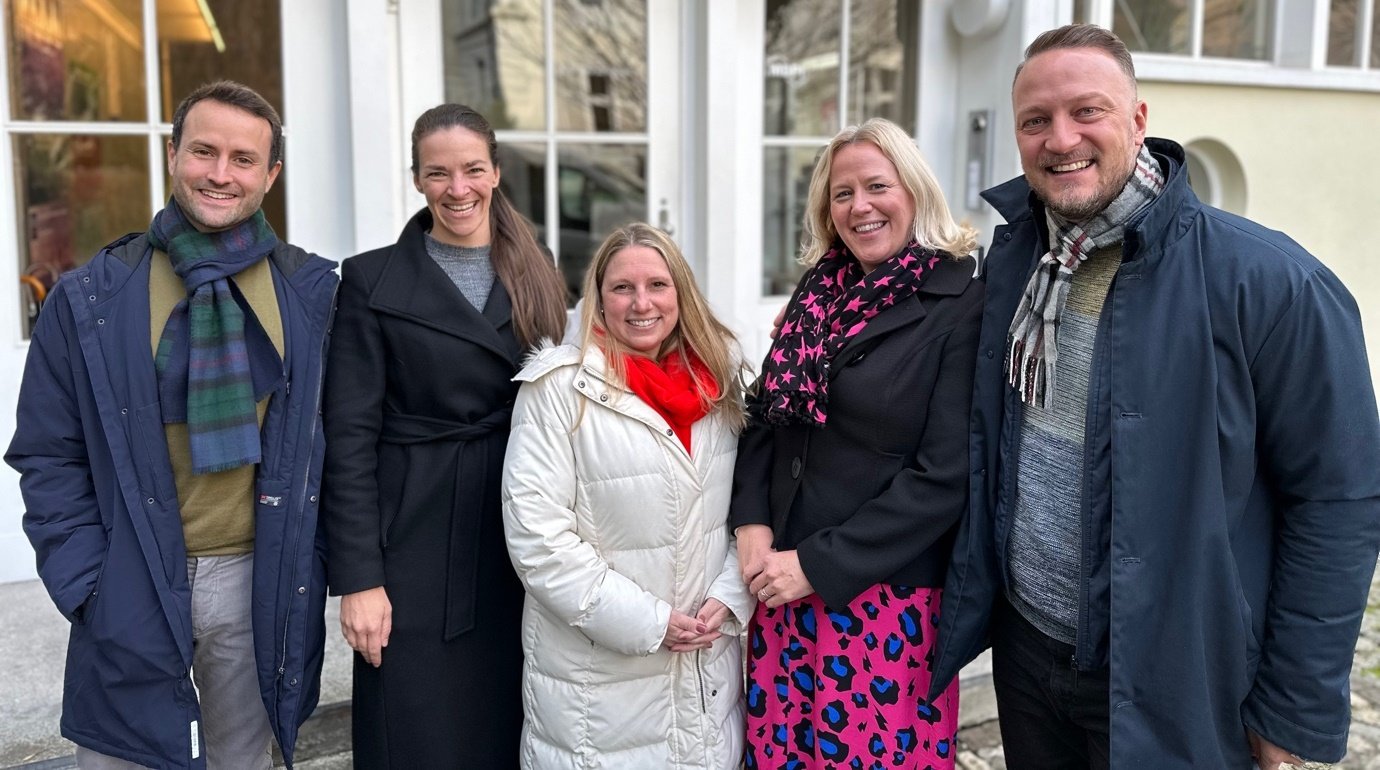
Left to right: Facundo Santomé (Senior Marketing Manager, MDPI), Constanze Shelhorn (Indexing Manager, MDPI), Cathy Holland (Director of Global Publisher Business Development, Digital Science), Helen Cooke (Managing Director of Publisher Sales, Digital Science), and Stefan Tochev (CEO, MDPI) in front of MDPI headquarters in Basel, Switzerland.
During our meeting, we discussed MDPI’s publishing philosophy and explored further avenues for collaboration. We look forward to continuing our partnership with Digital Science, aiming to improve our services yet further and meet the needs of our authors more closely than ever.
What is Altmetric?
You will notice that MDPI articles feature an Altmetric score, a colourful doughnut capturing the score in the upper right corner of the article page. This score represents ‘alternative metrics,’ as distinct from traditional metrics such as Impact Factor, CiteScore, and Scimago Journal Rank.
Altmetrics complement traditional citation-based metrics by capturing online discussions related to a specific research topic. By analyzing both sets of data, we can obtain a comprehensive understanding of the attention a particular research output receives and the sources in which it is mentioned.
“Almetric provides visual insights into where research is being discussed”
Sources Tracked by Altmetric
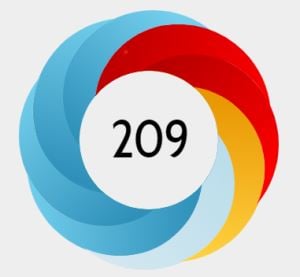
Altmetric badge showing the Altmetric score and colour-coded mention sources.
Altmetric monitors various sources, categorizing them into segments such as policy documents, peer reviews, Wikipedia, news and blogs, and social media, among other sources. Each category is identifiable by a specific colour.
The Altmetric badge provides visual insights into where the research is being discussed. A more colourful badge indicates broader mentions across multiple platforms. Such tracking enables us to gauge the extent of an article’s online dissemination, noting that increased visibility may correlate with higher citation rates.
Read more:
Impactful Research

Ten High-Altmetric Articles Published by MDPI
As at 30 January 2024, Altmetric has tracked 670,500 MDPI research outputs from MDPI, resulting in over 4.3 million mentions. This includes over 71,894 mentions in policy and patents and 294,714 mentions in news and blogs, with some achieving an Altmetric score as high as 28,754.
So, what is a good Altmetric score? There are various ways to put this score into context. You can find out more about the score in context and how to evaluate your work by this means.
Here are ten MDPI papers ranking in the top 5% of all research outputs scored by Altmetric.
|
|
“Accuracy in Wrist-Worn, Sensor-Based Measurements of Heart Rate and Energy Expenditure in a Diverse Cohort” J. Pers. Med. 2017, 7(2), 3; https://doi.org/10.3390/jpm7020003 Altmetric page: https://mdpi.altmetric.com/details/20477344 Altmetric shows that this article appeared in 253 news stories from 209 outlets including Forbes, BBC, and Fox News. |
|
|
“Daylight Saving Time and Acute Myocardial Infarction: A Meta-Analysis” J. Clin. Med. 2019, 8(3), 404; https://doi.org/10.3390/jcm8030404 Altmetric page: https://mdpi.altmetric.com/details/57654628 Altmetric shows that this article appeared in 295 news stories from 207 outlets including Forbes, The Atlantic, and New York Times. |
|
|
“The Preliminary Analysis of Cave Lion Cubs Panthera spelaea (Goldfuss, 1810) from the Permafrost of Siberia” Quaternary 2021, 4(3), 24; https://doi.org/10.3390/quat4030024 Altmetric page: https://mdpi.altmetric.com/details/111086701 Altmetric shows that this article appeared in 182 news stories from 134 outlets including CBC News, CNN, and National Geographic. |
|
|
“Not the Cat’s Meow? The Impact of Posing with Cats on Female Perceptions of Male Dateability” Animals 2020, 10(6), 1007; https://doi.org/10.3390/ani10061007 Altmetric page: https://mdpi.altmetric.com/details/83796184 Altmetric shows that this article appeared in 124 news stories from 98 outlets including VICE, CNN and The Guardian. |
|
|
“Behaviour and Welfare Impacts of Releasing Elephants from Overnight Tethers: A Zimbabwean Case Study” Animals 2022, 12(15), 1933; https://doi.org/10.3390/ani12151933 Altmetric page: https://mdpi.altmetric.com/details/133463915 Altmetric shows that this article appeared in 192 news stories from 186 outlets. |
How do I use altmetrics?
Altmetric Explorer provides a detailed step-by-step guide and instruction video for first-time users of the tool. The guide includes useful diagrams that make it easy to get started.
Sharing Research Online
For research to be tracked across different sources, Altmetric needs a research output with a persistent identifier: a DOI, ISBN, PubMed ID, handle ID, etc. When sharing research, it is important to include a link to the original research output.
|
|
“An Update on Eukaryotic Viruses Revived from Ancient Permafrost” Viruses 2023, 15(2), 564; https://doi.org/10.3390/v15020564 Altmetric page: https://mdpi.altmetric.com/details/142929875 Altmetric shows that this article appeared in 250 news stories from 180 outlets including CTV, Fox News, and CNN. |
|
|
“The Global Problem of Insufficient Sleep and Its Serious Public Health Implications” Healthcare 2019, 7(1), 1; https://doi.org/10.3390/healthcare7010001 Altmetric page: https://mdpi.altmetric.com/details/53406248 Altmetric shows that this article appeared in 252 news stories from 168 outlets including BBC, Harvard Business Review, and Forbes. |
|
|
“A Detailed Review Study on Potential Effects of Microplastics and Additives of Concern on Human Health” Int. J. Environ. Res. Public Health 2020, 17(4), 1212; https://doi.org/10.3390/ijerph17041212 Altmetric page: https://mdpi.altmetric.com/details/86529137 Altmetric shows that this article appeared in 197 news stories from 150 outlets including BBC, The Tribune, and World Economic Forum. |
|
|
“An Empirical Study of Chronic Diseases in the United States: A Visual Analytics Approach to Public Health” Int. J. Environ. Res. Public Health 2018, 15(3), 431; https://doi.org/10.3390/ijerph15030431 Altmetric page: https://mdpi.altmetric.com/details/34714141 Altmetric shows that this article appeared in 232 news stories from 149 outlets including Forbes, New York Times, and Harvard Business Review. |
|
|
“Garden Scraps: Agonistic Interactions between Hedgehogs and Sympatric Mammals in Urban Gardens” Animals 2023, 13(4), 590; https://doi.org/10.3390/ani13040590 Altmetric page: https://mdpi.altmetric.com/details/142934305 Altmetric shows that this article appeared in 172 news stories from 168 outlets including BBC. |
Inside MDPI

MDPI Annual Meeting Celebrations in China
On Thursday 25 January, over 1,300 MDPI colleagues from our two offices in Beijing gathered to kick off MDPI’s traditional ‘Annual Meetings.’ These celebrations take place in MDPI’s offices across China, including Dalian, Tianjin, Wuhan, and Nanjing.
The evenings include performances, informative talks and presentations, awards, and entertainment, providing an ideal platform to recognize our colleagues, celebrate their achievements, and set our sights on the future.
“It is essential that we stay connected and share best practices”

I sent a video congratulating everyone on their work and sharing our vision of building MDPI into the most trusted OA publisher, highlighting the roles each of us has to play in achieving that goal.
Unfortunately I could not join in person, but you may recall my recent trip, when I visited our offices in Beijing and Wuhan, which I look forward to visiting again this year.
Although our headquarters are in Basel, Switzerland, and we are expanding throughout Europe and North America, the majority of MDPI’s workforce is in China and throughout the Asia-Pacific region, including offices in Singapore, Thailand, Japan, and newly opened office in South Korea. It is essential that as a global organization, we stay connected and share best practices in order to grow collectively and continue providing the exceptional service to our authors.
The Annual Meeting is a moment to reflect and enjoy the year’s hard work and dedication.

I extend our best wishes to all for the Chinese New Year (Xīnnián kuàilè)!
Coming Together for Science
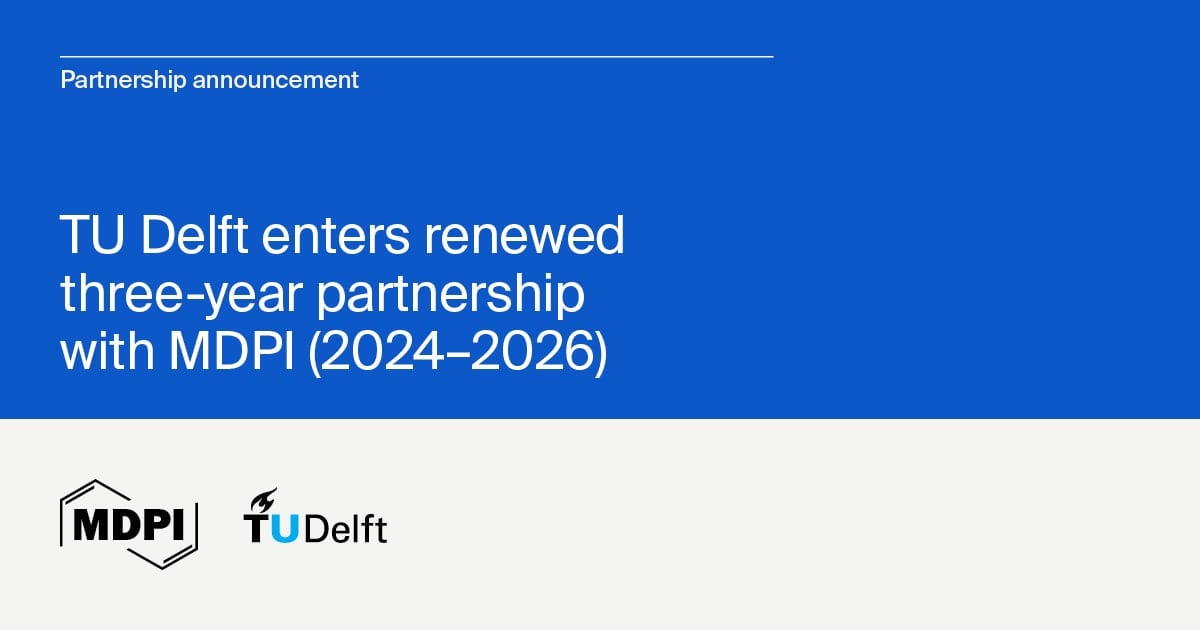
MDPI and TU Delft Adopt Flat Fee Model in Extended Partnership
We are excited to announce a renewed three-year partnership with Delft University of Technology (TU Delft) in the Netherlands. This collaboration introduces a fixed lump-sum fee, covering publishing costs from 2024 to 2026.
“This initiative reflects our dedication to transparent and inclusive publishing”
TU Delft-affiliated authors will enjoy cost-free publishing in any MDPI journal during this period, aligning with our commitment to removing barriers for open access publishing. The agreement supports Plan S compliance and facilitates a seamless publishing process for TU Delft corresponding authors. This initiative reflects our dedication to transparent and inclusive publishing, providing stability and predictability both for authors and for institutions.
For further details on our Institutional Open Access Program (IOAP), please contact us.
Benefits to MDPI’s IOAP
At MDPI we have a long tradition of partnerships, including our Institutional Open Access Program (IOAP). IOAP supports institutions through simplification, access, transparency, APC discounts, and institutional repository deposits. The program simplifies administrative processes, offers central payment, and allows easy opting in and out. Participants gain free access to Susy, MDPI’s online submission system, with extensive article metadata and exportable data. APC discounts and Book Processing Charge discounts are available for affiliated authors. Automated deposits to institutional repositories and streamlined matching of papers to IOAP participants enhance the overall experience.
For further information, see our IOAP FAQ.
Closing Thoughts

Reflections on the 2024 APE Conference
MDPI was proud to co-sponsor the Academic Publishing in Europe (APE) 2024 Conference that took place in Berlin, Germany, from 9–10 January 2024.
The conference theme, ‘Keep the Conversation Going!’, explored the evolving landscape of scholarly communication. APE is one of the key conferences I make a point to attend each year. January offers a valuable opportunity to engage with new contacts, reconnect with familiar faces, and participate in impactful discussions and presentations among professionals, scholars, and practitioners in the field.
“It's fascinating to see how other publishers are leveraging AI”
Highlights
Some of the standout panels for me include: the role of the UN Sustainable Development Goals (SDGs) within the publishing industry. It was encouraging to hear the current status quo, though I was eager also to learn about the exciting projects planned for 2024 and beyond. These will allow us to track progress in subsequent years. At MDPI, we remain committed to promoting Open–Access (OA) content on SDGs through scientific articles and books. Furthermore, we extend our commitment to sustainability by financially supporting researchers through initiatives such as the World Sustainability Award and the Emerging Sustainability Leader Award, as well as waiving the APC for feature papers on each SDG.
In recent years, discussions on AI have become increasingly prominent at such conferences. It’s fascinating to see how other publishers are leveraging AI to meet the evolving needs of their audiences while at the same time using it to safeguard the scientific process. Other engaging panels that I enjoyed included updates on transformation beyond transformative agreements, the principles of lean change, incentive structures related to research integrity, and the panel on reviewer incentives.
“We can share best practices and lessons learned”
Incorporating MDPI’s Insights into Conferences
I must confess that I sometimes feel overlooked when MDPI is not invited to participate in crucial industry discussions. As the leading open access publisher and the third-largest publisher overall, we possess extensive experience in many of these areas and can offer valuable contributions to these discussions. We can share best practices, lessons learned, and our thinking about future trajectories. For instance, in panels discussing reviewer incentives, at MDPI we offer a discount voucher to reviewers for future submissions, reflecting our commitment to fostering a robust peer review process. In 2022 alone, MDPI collected over 1.4 million peer review reports, informing the decision-making processes of our editors. Given our expertise in these areas, it would be natural to include MDPI in such discussions. I therefore extend an invitation to future conference organizers to consider MDPI for speaking engagements and collaborative opportunities.
Chief Executive Officer
MDPI AG
2 January 2024
MDPI Insights: The CEO’s Letter #7 - Nobel Laureates Entrust MDPI with Their Research

Welcome to the MDPI Insights: The CEO's Letter.
In these monthly letters, I will showcase two key aspects of our work at MDPI: our commitment to empowering researchers and our determination to facilitating open scientific exchange.
Opening Thoughts

Nobel Prize Laureates Entrust MDPI with Their Research
The Nobel Prize stands as a hallmark of distinction, honouring ground-breaking research across disciplines. Annually, the Nobel Prizes are awarded in six categories: Physics, Chemistry, Medicine or Physiology, Literature, Peace, and Economic Sciences.
Through the years, renowned scholars have entrusted MDPI with their work. As at December 2023, 26 Nobel laureates have contributed to more than 75 articles across 25 MDPI journals, including: Antibiotics, Applied Sciences, Biology, Biomedicines, Cancers, Catalysts, Cells, Crystals, Entropy, Games, IJMS, Life, Materials, Micromachines, Molecules, Pharmaceuticals, Pharmaceutics, Photonics, Quantum Beam Science, Remote Sensing, Sensors, Solids, Universe, Vaccines, and Viruses.
The best of the best trust us with their work.
Nobel Prize Laureates Who Have Published with MDPI
We are proud to list the names of Pierre Agostini, Hiroshi Amano, Werner Arber, Aaron Ciechanover, Robert H. Grubbs, Oliver Hart, Gerard ‘t Hooft, Michael Houghton, Harald zur Hausen, Katalin Karikó, Jean-Marie Lehn, Gérard Mourou, Ferid Murad, Shuji Nakamura, William Nordhaus, Kostya S. Novoselov, Giorgio Parisi, Charles M. Rice, Alvin E. Roth, Donna Strickland, K. Barry Sharpless, George F. Smoot, Anne L’Huillier, Drew Weissman, Kurt Wüthrich, Ada Yonath.
The privilege of hosting such contributors resonates deeply with our editorial teams. For instance, in this interview, the Editor-in-Chief (EiC) of Universe speaks on the significance of publishing a paper by Nobel laureate Gerard ’t Hooft within the journal.
2023 Nobel Prize Winners Published by MDPI

Nobel Prize Winners, 2023: Katalin Karikó, Drew Weissman, Anne L’Huillier (Ill. Niklas Elmehed © Nobel Prize Outreach)
Three laureates from the 2023 Nobel Prize cohort have trusted MDPI as their publishing platform. Notably, in a 2022 Pharmaceutics paper, molecular biologist Katalin Karikó and her team presented a methodology for evaluating mRNA capping efficiency, pivotal for therapeutic applications. Pharmaceutics had previously dedicated a Special Issue to “mRNA Therapeutics: A Themed Issue in Honor of Professor Katalin Karikó”, spotlighting ten articles from August 2021 to February 2022.
In the journal Vaccines, Professor Drew Weissman, collaborating with scholars from Pennsylvania University and George Mason University, contributed an influential review titled “Nanomaterial Delivery Systems for mRNA Vaccines”. His collaborative efforts spanned five papers across MDPI journals between 2021 and 2023.
Furthermore, Anne L'Huillier of Lund University, only the fifth female recipient of the Physics Prize, co-authored an article in Applied Sciences focusing on "Advanced EUV and X-Ray Optics". Similarly, Pierre Agostini, an Emeritus Professor from Ohio State University, co-authored an article featured in the special issue "Attosecond Science and Technology: Principles and Applications".
We extend heartfelt congratulations to all Nobel Prize laureates and express sincere gratitude for their confidence in MDPI as a platform for their scholarly contributions.
Read more:
Impactful Research

MDPI Journals Newly Indexed in 2023
The aim of indexing is to enhance the quality and credibility of published research, ensuring that researchers access the most credible resources available. While the principle behind citation indexing is straightforward, it remains one of the most dependable methods for tracking an idea's evolution across various scientific disciplines.
Throughout the year, MDPI works to expand the reach of our publications across premier multidisciplinary databases like Web of Science, Scopus, EBSCO, and ProQuest. This initiative is spearheaded by MDPI's Indexing team, under the leadership of Dr. Constanze Schelhorn.
In 2023, MDPI achieved 54 new acceptances in Scopus, 29 in Web of Science, 52 in EBSCO, and 83 in DOAJ: Directory of Open Access Journals.
The team prioritizes ensuring that our journals feature in numerous specialized databases, including PMC, PubMed, MEDLINE, Inspec, CAS, and FSTA, among others. Currently, MDPI collaborates with over 65 renowned international databases, consistently enhancing our database affiliations annually.
MDPI’s journals are indexed in all major global databases.
Furthermore, we collaborate with universities and government organizations to list our journals in country-specific ranking lists and relevant institutional repositories. This ensures compliance with requirements often set by funders or institutions for authors to publish in specific journals.
Web of Science Adds 24 MDPI Journals to Emerging Sources Citation Index (ESCI)
Clarivate recently analysed MDPI’s new journals, resulting in 24 journals, mainly established in 2020, being added to the ESCI in November and December 2023. Additionally, five journals passed this assessment earlier in the year. For a complete list of our journals in Web of Science, refer here. Journals in the ESCI meet 24 quality criteria, ensuring editorial rigor. They may be considered for inclusion in broader indices like the Science Citation Index Expanded (SCIE), the Social Sciences Citation Index (SSCI), or the Arts and Humanities Citation Index (AHCI), based on four impact criteria.
Read more:
Inside MDPI

MDPI Appoints New Chief Operating Officer (COO)

Alistair Freeland returned to MDPI and assumed the role of Chief Operating Officer in November 2023, a position he previously held from 2013 to 2019. He succeeds Dr. Yu Lin, who will remain a member of MDPI’s Board of Directors, overseeing significant financial decisions for the company. I would like to express my sincere thanks to Dr. Yu Lin for his service as COO.
Alistair brings extensive experience not only in scholarly publishing but also in technology and business management. Prior to rejoining MDPI, he was associated with SIX Group, the entity responsible for Switzerland's financial market infrastructure. There, he played a pivotal role in developing the blockchain-based platform SDX (SIX Digital Exchange), which has gained traction among major Swiss banks and the Swiss National Bank.
As COO, Alistair will collaborate with the MDPI management team to improve the practices and services we offer to scholarly communities. I am pleased to welcome Alistair back to MDPI and look forward to his contributions going forward.
Coming Together for Science

MDPI’s 2024 In-Person Academic Events Schedule
MDPI's Conference Team is dedicated to organizing and hosting in-person academic events across Europe, Asia-Pacific, and North America. We recognize conferences as invaluable platforms for scientific collaboration, scholarly exchange, discussions on contemporary topics, networking, and forging collaborations.
Here's a glimpse of the notable events we currently have scheduled for 2024:
|
|
14–16 February, 2024 |
|
|
24–26 April, 2024 |
|
|
28–31 May, 2024 |
|
|
1–4 August, 2024 |
Upcoming events with details to be announced:
- September 2024, Materials 2024 – Basel, Switzerland
- 19–21 September 2024, International Conference on Nanomaterials Sciences 2024 – Beijing, China
- October 2024, ncRNA 2024 – Basel, Switzerland
- November 2024, Pharmaceuticals 2024 – Barcelona, Spain
- 22–26 November 2024, International Conference on Science of Electronics – Wuhan, China
- Stay tuned for more details on the Sustainable Publishing Forum 2024.
Click here for all upcoming MDPI events.
Organize Your Event with MDPI’s Sciforum
Sciforum is MDPI’s platform dedicated to the organization of scientific events. In line with our mission to promote science, Sciforum supports scholars, societies, research networks, and universities at all stages of organizing in-person events, virtual events and webinars. Our platforms are efficient, user-friendly, and cost-effective. We handle all steps related to event management. Contact us for details.
Closing Thoughts

Reflecting on 2023 and Looking Ahead to 2024
As we approach 2024, I reflect on the incredible journey we’ve had together at MDPI this year. The past 12 months have been marked by ambitious projects and initiatives to improve our internal processes, and a commitment to continue delivering top-notch services to our stakeholders. I’d like to thank each and every one of our staff members for contributing to the positive experiences our stakeholders have reported in our surveys. Your dedication to speed, efficiency, and effective communication with our stakeholders is very much recognized and appreciated.
Becoming a stronger organisation
While we have encountered challenges in 2023, it’s important to understand that these are a part of our growth process. Difficulties provide us with opportunities to reflect, address problems at their roots, and ultimately evolve into a stronger organization. Our stakeholders expect us to overcome tough times, and it’s an expectation that we have for ourselves.
I extend my sincere appreciation to every MDPI employee, from our editorial office and IT department to marketing, indexing, IOAP, societies, Scientific Office board, products, production, conferences, finance, operations, admin, and beyond. To our newest team members, a warm welcome; to our longstanding colleagues, your dedication is invaluable.
“I am committed to taking MDPI to a new level of excellence.”
Interacting with many of you during my visits to our offices and representing MDPI at external events has been a personal highlight. I am deeply grateful to Dr. Lin for entrusting me with the role of CEO of MDPI. Looking forward, I am committed to working closely with our management team to lead MDPI and take it to a new level of excellence, aiming to establish it as the most trusted publisher in open access worldwide. This is a collective endeavour, with each of us shaping MDPI’s reputation. I therefore encourage us to take pride in our work, as it represents not only our craft but also MDPI as a whole.
Accountability and communication
As we look forward to 2024, there’s a lot to be excited about. Together, we’ll navigate challenges, seize growth opportunities, and refine our practices. To solidify MDPI’s position as the premier open access publisher globally, we must bolster accountability, improve stakeholder communication, share MDPI’s best practices, champion the open access philosophy, and educate stakeholders about our mission, methodologies, and motivations.
Thank you for engaging with the CEO Letter over the past six months of 2023. I will continue to release this newsletter as a method of sharing the great work being done at MDPI. Please feel free to connect directly with any insights or questions.
Here’s to a joyous and prosperous 2024!
Chief Executive Officer
MDPI AG
25 December 2023
Prof. Dr. Carol C. Shoulders Appointed Section Editor-in-Chief of Section “Genetics and Genomics” in Biology
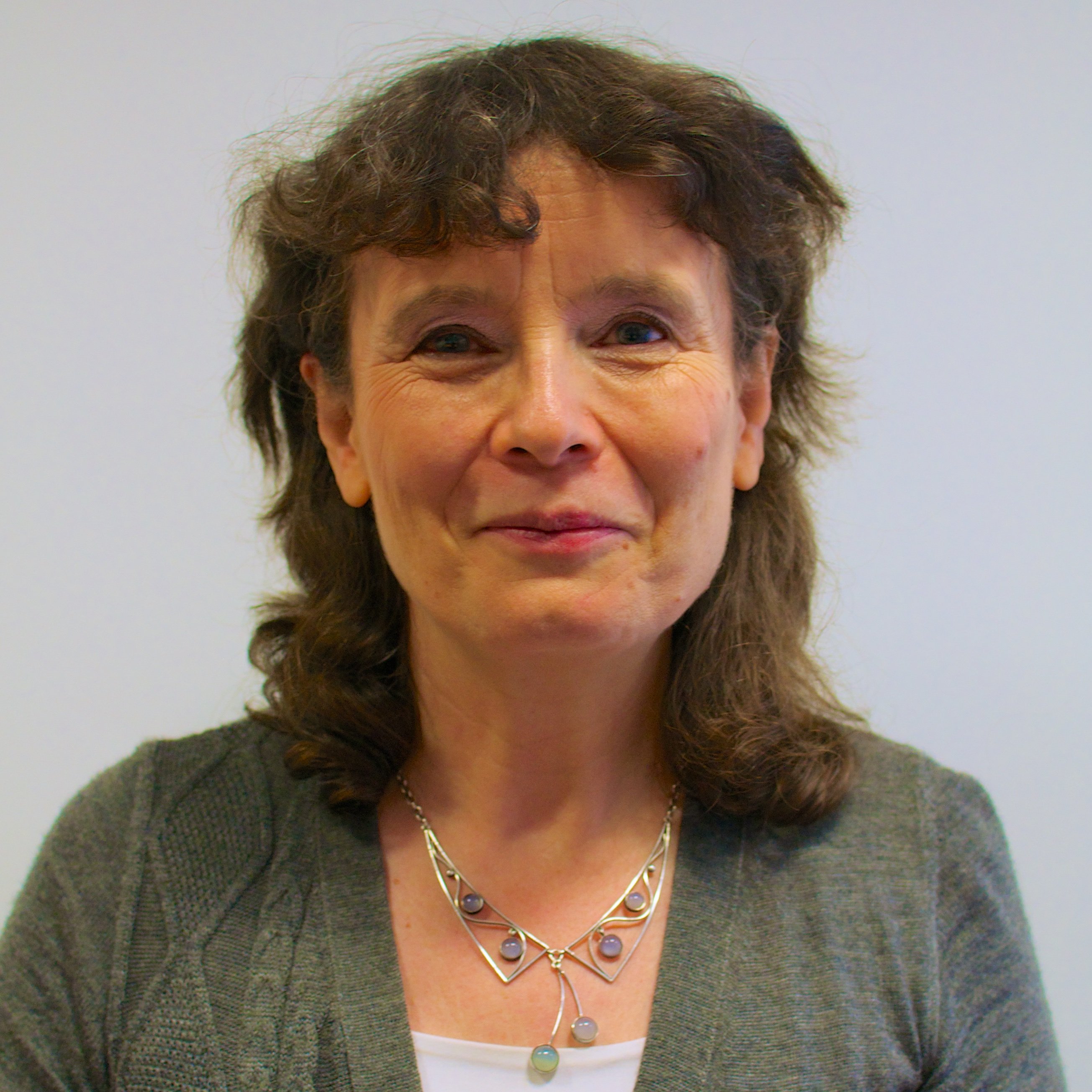
We are pleased to announce that Prof. Dr. Carol C. Shoulders has been appointed Section Editor-in-Chief of the Section “Genetics and Genomics” in Biology (ISSN: 2079-7737). Prof. Dr. Shoulders is a professor at William Harvey Research Institute and the Scientific Lead for the TRIBBLES Research and Innovation Network (TRAIN). She is also the Lead for the B.Sc. Pharmacology and Innovative Therapeutics Module (BMD377) “Classic Papers and Current Topics in Pharmacology”, as well as a committee member of the Heart-UK Research Board.
The following is a short Q&A with Prof. Dr. Carol C. Shoulders, who has shared her vision for the development of this Section with us, as well as her views on the importance of facilitating the publication of high-impact research in open access format:
1. What appealed to you about the journal that made you accept the position of Section Editor-in-Chief?
It is the sheer breadth and depth of the genetic and genomic research published in the journal that has helped advance our knowledge and understanding of the evolutionary and cellular processes regulating an organism’s capacity to reproduce, grow, and respond to stimuli. It is also an exciting time to promote genetic and genomic research that informs us of the biological responses to endogenous, genetically programmed cellular states and exogenous environmental stresses.
2. What is your vision for this Section?
The aim of the Section is to provide a timely forum for basic biologists, biotechnologists, pharmacologists, and clinicians to publish and review genetic and genomic research, in addition to novel computational methodologies focused on enabling a better mechanistic understanding of the cellular and physiological processes regulating the well-being of organisms in current and evolving environments.
3. What does the future of this field of research look like?
It is exciting and fast-moving, with an exponential rise in the use of analytical and diagnostic tools that promote the development of products and conditions that improve the specificities of therapeutic medical, veterinary, and botanical interventions.
4. Do you have any suggestions for young researchers in this field?
Follow your passion. Work with the best people and in the best places available. Both focus and continually scan your horizon. Listen and question accepted knowledge by checking primary sources of information. Invest in yourself by expanding both your computational skills and biological knowledge, but do not get addicted to serially attending courses. Do acquire a thorough knowledge of the literature, and articulate what is known and what is not known. Design your studies carefully. Ensure that all studies contain positive and negative experimental controls, and that statistical analyses are robust and address the question being asked. Do not ignore negative results as these can be the most informative. Complete, complete, complete.
We wish Prof. Dr. Carol C. Shoulders every success in her position as Section Editor-in-Chief, and we look forward to her future contributions to the journal.
30 November 2023
MDPI Insights: The CEO’s Letter #6 - MDPI Spain Summit and ResearchGate

Welcome to the MDPI Insights: The CEO's Letter.
In these monthly letters, I will showcase two key aspects of our work at MDPI: our commitment to empowering researchers and our determination to facilitating open scientific exchange.
Opening Thoughts

MDPI Spain Summit

Stefan Tochev (CEO, MDPI) gives the opening speech at the MDPI Spain Summit.
On Friday 10 November 2023 I was in Barcelona, Spain, to deliver the opening presentation and participate in a panel at MDPI’s Spain Summit, a two-day event, inspired by our salon events in China.
With 16 Editors-in-Chief (EiCs) and 20 Editorial Board Members (EBMs) in attendance, the event, organized by our conference team and Barcelona office, featured presentations on open access (OA), MDPI, and publishing market trends in Spain.
The event provided a great opportunity to engage with stakeholders from various MDPI journals, including Nutrients, Vaccines, Buildings, IJMS, and others. We were able to gather feedback and have open conversations around manuscript quality, the peer-review process, and journal development, as well as accreditation agencies.
The main objective of this Summit was to bring together Editors representing MDPI journals across various disciplines within Spanish universities and research centers, primarily from the Barcelona area. The aim was to facilitate an open and fruitful discussion regarding the development of their journals, the future of OA in Spain, and to provide meaningful interactions and networking opportunities.
Connecting with Editorial Board Members

Stefan Tochev in conversation with Summit participants: "Our EBMs are passionate about the journals they serve."
Interacting with our EBMs in person provides a valuable opportunity to show how important it is to us to connect with them, hear their perspectives on their journals and learn more about their own experience collaborating with MDPI.
From my conversations, it was clear that our EBMs are passionate about the journals they serve. I know the advice they provide may sometimes involve just small tweaks, but these can lead to important improvements. As the saying goes, small hinges swing open big doors.
As at November 2023, MDPI has over 6,300 EBMs affiliated with Spanish institutions, with more than 30 of them serving as EiCs or section EiCs. Furthermore, over 68,000 Spanish scholars have contributed as reviewers in MDPI journals.
Open Access in Spain
In 2023, Spain implemented legislation mandating immediate OA for all publicly funded research, aligning with the EU’s Plan S initiative to expedite the transition to OA. The Spanish government also approved a four-year, €23.8 million annual budget for the first national OA strategy, aiming to make publicly funded research freely accessible upon publication. This strategy aims to strengthen the quality and transparency of research in Spain, and to help promote movement towards a digital, low-carbon economy.
For further details of Spain's OA policy and the history of government mandates, click here.
Spain has already seen a notable decline in subscription-only articles, decreasing by 62% over a 10-year period, while gold OA increased by 42%. Green OA slightly decreased, suggesting a shift towards publishing in gold OA journals rather than traditional subscription-based ones. Here are some statistics from Scopus.
A big thank-you to the various MDPI teams, including our conference team and the Barcelona office, for organizing this very successful event!

MDPI colleagues from various offices gathered to host and support the first MDPI Spain Summit, in Barcelona, Spain.
I think this type of gathering has the potential to become an annual event in various locations. For example, Manchester could be an option, as we have over 30 EiCs and over 3,000 EBMs in the UK, a top market for MDPI that publishes high-quality research.
Impactful Research

769 Editorial Board Members of MDPI Journals Recognized as Highly Cited Researchers in 2023
Congratulations to our 769 Editorial Board Members from 40 countries/territories who have been awarded Highly Cited Researcher status for 2023 by Clarivate. This recognition is based on their outstanding scientific research contributions and significant influence in various fields, as evidenced by Web of Science data.
Click here to view the full list of 769 Editorial Board Members.
Clarivate's Highly Cited ResearchersTM list identifies individuals with exceptional impact in scientific and social science domains over the past decade. Their papers rank in the top 1% of citations in 21 fields analysed in ‘Essential Science Indicators,’ showcasing their substantial influence.
This year, 7,125 Highly Cited Researcher 2023 designations were issued to 6,849 individuals from 67 countries, representing just 1 in 1,000 researchers worldwide.
These researchers demonstrate exceptional influence, representing a small fraction of contributors pushing the boundaries of knowledge, contributing to global well-being, sustainability, and security.
Congratulations to these scholars for their remarkable achievement: we are honoured to have them on board with our journals!
Inside MDPI

Corporate Marketing and Communications Strategy Session

Members of MDPI’s Corporate Marketing & Communications team.
For the past few years, I have led the Corporate Marketing & Communications department in our annual strategy session.
This typically involves 2–3 days of focused sessions covering key topics including budgeting, hiring targets, campaign reviews, and planning for the upcoming year, department strategy, and structure.
We are constantly exploring ways to optimize the Corporate Marketing & Communications department to support MDPI’s primary objectives and better convey the MDPI story while serving the scholarly community.
The strategy session also serves as a team-building activity, during which the team voted on bowling!
Strategy Session
In this strategy session, we looked at how to align our teams in order to better streamline our content with our campaigns, build a dedicated marketing team to strategically support our core MDPI products, expand our communications teams and functionalities to focus on company-critical campaigns and press releases, align our new brand design system with our marketing initiatives, set up a community and engagement team to support various teams with their outreach and communication efforts, and increase our use of data in the evaluation of campaign performance.
To grow in these areas, we will be hiring for various positions, including those of Public Relations Manager, Communications Manager, Internal Communications Manager, Campaign Manager, Marketing Associate, and Editorial Engagement Manager.
I am grateful for the way our Corporate Marketing & Communications department has grown and gelled over the years, and I look forward to supporting the department teams and their ideas for the future.
Coming Together for Science

ResearchGate and MDPI Partner to Boost the Visibility of Open Access Content through Journal Home

Stefan Tochev (CEO, MDPI) and Sören Hofmayer (Co-Founder and Chief Strategy Officer, ResearchGate) meet in Berlin, Germany to take their ongoing discussion further.
When I assumed the role of CEO at MDPI, my primary focus was to initiate the building of essential partnerships and collaborations within our industry. After all, I am a firm believer in achieving our goals by helping others achieve theirs and focusing on co-opetition wherever there is an opportunity. I first touched on the notion of co-opetition in MDPI Insights: The CEO's Letter #3, particularly when discussing collaborations with Elsevier.
In light of this, Sören Hofmayer (Co-Founder and Chief Strategy Officer at ResearchGate) and I connected recently to continue a discussion that had been ongoing for months. I was quickly brought up to speed and felt there was an opportunity for MDPI journals to pilot the Journal Home service that ResearchGate had launched. This would provide a new way for MDPI to engage with authors and readers and amplify the visibility of our journals.
While I receive many offers and opportunities for discussions with vendors, I am a firm believer that timing is everything, and in this case, the time for us is now. Sören and I met in person during my recent visit to Berlin and decided to proceed with piloting ten MDPI journals with the Journal Home service.
The press release below provides further details.
Press Release: Berlin (Germany) and Basel (Switzerland), 15 November 2023
ResearchGate, the professional network for researchers, and MDPI, the largest open access publisher in the world and a pioneer in open access publishing, today announced a partnership that will see ten of MDPI’s open access journals benefit from an enhanced presence on ResearchGate through its innovative Journal Home offering.
This new partnership will expand the reach and visibility of MDPI’s participating flagship journals with ResearchGate’s highly relevant community of more than 25 million researchers globally.
Around 210,000 version-of-record articles from these 10 titles will be readily available on ResearchGate, including the full archive material and all new articles as they are published. These journals also benefit from enhanced brand visibility, with dedicated journal profiles, prominent representation on all associated article pages and all relevant touchpoints across the ResearchGate network – keeping the journals top-of-mind with their reader and author audiences. All articles covered by the new partnership will automatically be added to the authors’ publication records in ResearchGate. This not only reduces MDPI authors’ needs for direct management but also offers them valuable insights into the impact of their work, including data about readership and citations.
Closing Thoughts

November is Men’s Health Awareness Month

Stefan Tochev (CEO, MDPI) listening to music as he writes at a coffee shop in Basel, Switzerland.
November is dedicated to raising awareness of various men’s health issues. I have been fortunate to have positive male role models in my life, and I strive to share my experiences with others.
I used to take part in Movember, growing my moustache throughout November to raise awareness and funds and to help “change the face of men’s health.” With male family and friends impacted by physical and mental health issues, I have recently become more interested in men’s overall well-being.
Men often face stigma involving the perceived need always to be strong and have things figured out. Recently, I’ve had meaningful conversations with male friends and colleagues about issues we rarely discuss, and it was a positive experience.
Various factors impact men’s health and well-being, all too easily leading to risky health behaviours including a lack of health awareness, poor health education, and negative, culturally induced, behaviour patterns in our work and personal lives. I hope we can break down these barriers in our work environment.
Healthy men help build healthy families and a healthy society
Men are less likely than women to seek help with their physical and mental health struggles. This is a reminder to prioritize your overall well-being. I hope that as men, we will continue to open up to one another, becoming vulnerable in order to share what we are going through. By sharing and by supporting each other, we can learn and grow together. You are not alone, and when you fall, you can still get up and stand tall.
From one broski to another, you are loved and appreciated. I hope this mindset carries into December and beyond.
Mindfulness
Our content team recently released a handful of articles on mindfulness, a practice that I believe provides a good opportunity for stress release and self-reflection:
Chief Executive Officer
MDPI AG
21 November 2023
769 Editorial Board Members of MDPI Journals Achieve Highly Cited Researcher Recognition in 2023

We extend our sincere congratulations to the 769 Editorial Board Members of our journals – from 40 different countries/territories – who have been recognized as Highly Cited Researchers for the year 2023 by Clarivate. They are being recognized for their high-quality scientific research achievements and outstanding contributions to their professional fields, as indicated by Web of Science data.
Clarivate's annual list of Highly Cited ResearchersTM identifies the most highly cited scientists for the past decade who stand out for their significant and broad influence in various scientific and social science domains. Their impactful papers are among the top 1 per cent in the citation distribution of one or more of 21 fields analyzed in the "Essential Science Indicators", distinguishing them as hugely influential among their peers.
This year, 7,125 Highly Cited Researcher 2023 designations were issued to 6,849 individuals from 67 countries, representing just 1 in 1,000 researchers worldwide.
This means that these researchers have demonstrated an incredible level of significant and broad influence in their chosen field or fields over the last decade. They represent a small fraction of the researcher population whose contributions disproportionately push the boundaries of knowledge, enhancing global well-being, sustainability, and security.
Congratulations to the scholars for their noteworthy achievement – we are honored to have them on board with our journals!
|
Abate, Antonio |
Jaiswal, Amit K. |
Shen, Zexiang |
1 November 2023
MDPI Insights: The CEO’s Letter #5 - OA Week, UK, and Strategy

Welcome to the MDPI Insights: The CEO's Letter.
In these monthly letters, I will showcase two key aspects of our work at MDPI: our commitment to empowering researchers and our determination to facilitating open scientific exchange.
Opening Thoughts

Open Access Week 2023 – the Global Drive to Open Continues
As the world's largest open-access (OA) publisher, we believe that unrestricted access to research findings is the cornerstone of transparency, efficiency, and quality control across scientific disciplines. At MDPI, we provide free, immediate access to scientific papers, empowering scientists to examine, validate, replicate, and build upon existing results. This minimizes redundancy, optimizes resources, and fosters innovative approaches.
International OA Week, held from 23 to 29 October 2023, provided a unique opportunity to link the global movement toward open sharing and open science with the progress of policy changes at the local level. Our mission, during OA Week and all the year round, is to offer educational resources highlighting the benefits of open-access publishing. The MDPI Blog is a valuable resource for information on open access and open science.
Core principles of OA publishing
Accessibility, transparency, and collaboration are core principles of OA publishing. OA aims to break down barriers that have traditionally restricted research access, ensuring that knowledge is available to all, regardless of financial situation or institutional affiliations. Our commitment to diverse pathways for OA publishing worldwide includes discounts for researchers. You can learn more about how MDPI supports scientific communities here.
One of the key strengths of OA publishing is its ability to facilitate interdisciplinary research. By removing paywalls and promoting knowledge-sharing across disciplines, OA encourages collaboration and innovation. Researchers from various fields can access and build upon each others’ work, fostering a holistic approach to addressing complex global challenges.
OA holds the potential to democratize knowledge, advance science, and drive positive societal change.
Policy driving change
Governments, institutions, and funding agencies have recognized the transformative potential of OA and have implemented policies to promote it. These policies often require publicly funded research to be made openly accessible, accelerating the growth of OA repositories and journals. Check out our spotlights on OA policies in the US, EU and China.
OA publishing is continuously evolving, with community-driven models and technologies shaping its future. Initiatives such as “Plan S” and “cOAlition S” promote OA publishing from the perspective of national funders, requiring grantees to publish their research openly. A new policy announced by the US administration last year mandates that, with effect from January 2026, all US federally funded research should be freely and immediately available after publication.
Additionally, preprint servers such as MDPI's Preprints.org, which allow researchers to share their findings before formal peer review, have gained popularity, enhancing the speed at which new knowledge is disseminated. The rise of blockchain technology is also being explored to ensure transparency and authenticity in scholarly publishing.
For more than two decades, OA publishing has been revolutionizing academic publishing by promoting accessibility, transparency, and collaboration. Its support for interdisciplinary research, evolving policies, and innovative practices all contribute to its growing influence in the global research community. As OA continues to expand, it holds the potential to democratize knowledge, advance science, and drive positive societal change.
MDPI is proud to lead the transition to open access.
Read more:
Impactful Research

Spotlight on Smart Cities
Smart cities will serve as a cornerstone for future human development. Their implementation will help us tackle many of the significant challenges we are facing – climate change, ageing populations, waste management, public safety, travel, and so on. Recognising the importance of this multifaceted field, MDPI launched the inaugural issue of Smart Cities in 2018 to provide an advanced forum for research into smart technology and society. Here we take a look at how this journal has developed, and its impact in this exciting field.
As at 30 October, 2023, Smart Cities has published 421 papers and has an Impact Factor of 6.4. It also has a CiteScore of 8.5, and more than one quarter of its published papers – 124 – have been cited 10 times or more.
Highly cited papers in Smart Cities
Below are several highly cited papers recently published in Smart Cities. Citation metrics are current as at 31 October 2023.
1. “Introducing the “15-Minute City”: Sustainability, Resilience and Place Identity in Future Post-Pandemic Cities”
Authors: Carlos Moreno, Zaheer Allam, Didier Chabaud, Catherine Gall and Florent Pratlong
Smart Cities 2021, 4(1), 93-111; https://doi.org/10.3390/smartcities4010006
Citations: Crossref (338), Scopus (366), Web of Science (270), Google Scholar (710)
The paper discusses the socio-economic impacts of the COVID-19 on cities, including increasing inequalities and rising unemployment. It introduces the concept of the "15-Minute City," a form of "chrono-urbanism," as a response to the challenges posed by the pandemic.
2. “A Review on Electric Vehicles: Technologies and Challenges”
Authors: Julio A. Sanguesa, Vicente Torres-Sanz, Piedad Garrido, Francisco J. Martinez and Johann M. Marquez-Barja
Smart Cities 2021, 4(1), 372-404; https://doi.org/10.3390/smartcities4010022
Citations: Crossref (359), Scopus (363), Web of Science (268), Google Scholar (558)
This paper provides an overview of the progress in Electric Vehicles (EVs), focusing on battery technology, charging methods, and emerging research challenges. It also analyzes the global EV market and its future outlook.
3. “IoT in Smart Cities: A Survey of Technologies, Practices and Challenges”
Authors: Abbas Shah Syed, Daniel Sierra-Sosa, Anup Kumar and Adel Elmaghraby
Smart Cities 2021, 4(2), 429-475; https://doi.org/10.3390/smartcities4020024
Citations: Crossref (121), Scopus (151), Web of Science (91), Google Scholar (215)
This paper gives an overview of the Internet of Things (IoT) in the context of Smart Cities, discussing the fundamental components, technologies, architectures, networking technologies, and artificial algorithms that underpin IoT-based Smart City systems.
4. “Artificial Intelligence Techniques in Smart Grid: A Survey”
Authors: Olufemi A. Omitaomu and Haoran Niu
Smart Cities 2021, 4(2), 548-568; https://doi.org/10.3390/smartcities4020029
Citations: Crossref (76), Scopus (94), Web of Science (57), Google Scholar (120)
This survey paper reviews the utilization of artificial intelligence (AI) techniques in the context of the smart grid. It covers various applications of AI in load forecasting, power grid stability assessment, fault detection, and security issues in the smart grid and power systems.
5. “The Metaverse as a Virtual Form of Smart Cities: Opportunities and Challenges for Environmental, Economic, and Social Sustainability in Urban Futures”
Authors: Zaheer Allam, Ayyoob Sharifi, Simon Elias Bibri, David Sydney Jones and John Krogstie
Smart Cities 2022, 5(3), 771-801; https://doi.org/10.3390/smartcities5030040
Citations: Crossref (72), Scopus (75), Web of Science (43), Google Scholar (176)
This paper discusses the concept of the Metaverse, a virtual world introduced by Meta (formerly Facebook), and its potential impact on urban life. It explores how emerging technologies such as AI, Big Data, IoT, and Digital Twins could reshape urban design and services in the context of the Metaverse.
Testimonial
“It was indeed a great and pleasant experience with MDPI regarding our recent publication. The submission process was very straightforward and less time-consuming than the norm. The review process was very fast compared to many other open access journals, which is praiseworthy. The support from the Editorial Office during the revision process was highly useful as well. We look forward to publishing with MDPI in the future, and I will most definitely recommend MDPI to my colleagues and collaborators.” – Dr. Luís Rosa, University of Minho
Article in Smart Cities: Mobile Networks and Internet of Things Infrastructures to Characterize Smart Human Mobility
Inside MDPI

MDPI Manchester office, UK Visit

Allie Shi (Editorial Director, MDPI), Stefan Tochev (CEO, MDPI), Jamie Anderson (Manchester Office Manager, MDPI), Michael O’Sullivan (Senior Scientific Officer, MDPI), Hushneara Akhtar, and Becky Castellon (IOAP Team Lead, MDPI), dining out in Manchester, UK.
In October, I visited MDPI’s new office in Manchester. During the visit, I connected with our English Editing (EE) managers, Scientific Officer, members of the Editorial team, the Marketing team, and IOAP Team Lead.
Our Manchester office focuses primarily on EE services and provides local support for the UK market. Additionally, we regularly visit Editorial Board members and participate in local conferences.
I would like to thank Jamie Anderson, Manchester Office Manager, and her team, for their deep commitment to our Manchester staff and to MDPI’s impact on the UK market.
The UK by numbers
The UK is a hub for the world’s top universities, making it a key market for MDPI and the publishing world in general. It is home to two of the top-five-ranked universities globally, 11 in the top 100, and 15 in the top 200.
As a result, the UK plays a key role in MDPI’s global market. As at October 2023, it ranks as the seventh-largest contributor to the total number of papers published by MDPI. We have 3,500 Editorial Board members affiliated with UK institutions, including 34 serving as Editors-in-Chief (EiCs). Our commitment to collaboration with institutions is evident in the UK, where we have successfully established some 60 Institutional Open Access Program (IOAP) agreements with esteemed institutions, such as the University of Oxford, the University of Cambridge, Imperial College London, the University of Edinburgh, and more.
According to InCites Dataset + ESCI for the period 2018–2022, as at October 2023, nearly 65% of UK papers are now published as OA. Just over 10% of total OA publications are by UK authors. UK papers are known for their high quality, with an average of 11 citations per paper. Furthermore, 2.16% of UK papers are in the top 1% of cited papers, and 14.61% are in the top 10% of cited papers, showcasing their impact.
We are currently hiring EEs in various locations worldwide.
English Editing at MDPI
Our English Editing (EE) department consists of two main branches, Quality Control and Learning and Development, reflecting our priorities. We are continuously enhancing the quality of our English Editing services and have raised the relevant standards, which now extend to company-wide communications. English editors participate in international interviews, conduct English assessments, and provide colleagues with presentations on ways to improve their use of written and spoken English.
While expanding, the EE department has proactively refocused its efforts on the quality of our work and how the English Editing department can benefit the company more broadly. We currently have approximately 140 full-time English Editors based across five offices worldwide, supplemented by over 700 freelance English editors.
Our Manchester office serves as the hub for the EE Department, with EE Managers situated there, except for Kurtis Jackson, who serves as the Head of EE and is located in our Basel office. Manchester EEs play a critical role in establishing and developing EE teams in our other offices, overseeing management and recruitment. The EE department plays a vital role in MDPI’s operations, as it is the department that touches every published paper. If this work interests you, I encourage you to explore our available EE positions, whether you are seeking full-time or freelance opportunities.
Testimonials
“MDPI provides an excellent service compared to any other previously used services. It delivers fast and high-quality results but at an affordable price.” – Ardha Apriyanto, University of Potsdam
“In my role as a professor, I consider that MDPI Author Services offer an excellent quality in the editing of Western academic writing while maintaining the required standards of clarity, precision and rigor. Additionally, delivery times are fast compared to other available services.” – Jesus Insuasti, University of Nariño
Read more:
Coming Together for Science

STM and Frankfurt Book Fair
Attending STM
MDPI has been a proud sponsor of the STM Conference for several years. The STM Conference is a dynamic event featuring interactive sessions, expert panellists, idea-sharing, and ample networking opportunities. On 16 October, the event kicked off with arrival drinks, sponsored by MDPI, followed by a welcoming dinner, providing a great chance to connect and network with industry professionals. The following day was filled with speakers, sessions, and further opportunities to connect. STM exemplifies the collaborative spirit of the scientific community, with session topics including achieving open, visible, and impactful research at scale; maintaining research integrity in a rapidly changing world; and exploring the impact of ever-evolving technology in the scholarly community.
Meeting with Web of Science
On a personal note, one of the highlights of STM was a candid and productive conversation with Nandita Quaderi, Editor-in-Chief and SVP at Web of Science. During our discussion, we talked about MDPI, Web of Science, the IJERPH delisting, and ways of moving forward. This open conversation aimed at fostering better collaboration for the future.
“We discussed ways to improve our communication and collaboration.”
I appreciated our frank discussion and felt that Nandita wholeheartedly supports open access. She also expressed her appreciation for the monthly CEO Letter, which she sees as a way to add personality to the MDPI brand and provide insight into the great work we do at MDPI. While we highlighted the positives, we also discussed ways to improve our communication and collaboration moving forward. This meeting alone made the trip worthwhile, and I hope Nandita doesn’t mind my sharing that she found our chat to be “the most honest and constructive discussion” she’s had with someone from MDPI in recent years.
75th Frankfurt Book Fair

Jelena Milojevic (Book Editor, MDPI), Jovana Dubajic (Book Editor, MDPI), Evan Escamilla (Project Manager, MDPI), Laura Wagner (Head of Books, MDPI), and Jenny Knowles (Commissioning Editor, MDPI), at the Frankfurt Book Fair in Frankfurt am Main, Germany.
For the 75th time, the Frankfurter Buchmesse opened its doors in October to celebrate exciting stories and their authors. If you haven’t yet had the chance to visit the Frankfurt Book Fair, I highly recommend it. It’s the largest book fair in the world, attracting thousands of visitors from around the globe. This is the place to gain valuable industry insights from top-class publishing professionals, connect with publishers directly, and learn about the latest trends in publishing.
MDPI Books
Our Books team was also present at the Frankfurt Book Fair, networking and learning from various panels. Did you know that our MDPI Books department publishes OA Books?
The book publishing program includes monographs, book series, edited books and reprints of special issues and topical collections, among other book types.
If you have a book proposal you would like to discuss, please feel free to contact our Books team to understand the benefits and methods of publishing your next book with the OA model.
Closing Thoughts

MDPI Strategy Meeting
As the newly appointed CEO, this is my first year leading the MDPI Senior Management Strategy session. I saw it as an opportunity to explore what MDPI has the potential to become in the next five years. Guided by the vision of its founder and President, Dr. Shu-kun Lin, the company has accomplished remarkable feats over the past 27 years and currently holds the position as the world’s third-largest academic publisher, following Springer Nature and Elsevier.
Our primary objective is to build upon the milestones of the past decades and consolidate MDPI’s position as well-established publishing brand. The two-day meeting emphasized the importance of communicating MDPI’s values more actively via its brand and adopting a straightforward yet impactful approach to managing MDPI as a mature academic publisher.
“Our primary objective is to consolidate MDPI’s position as well-established publishing brand”
As the world’s number one open-access publisher, MDPI has long been a game-changer in the scholarly community, serving millions of authors. The challenge in being a trailblazer is the need to continuously improve and at the same time explore the next blue-ocean strategy, while also maintaining the smooth operation of the business. Our collection model, featuring guest-curated thematic topics in the form of Special Issues, has disrupted the industry. Other publishers closely study us and attempt to replicate our models. The future of this collection model is something we are actively addressing – while, of course, looking ahead to what comes next!
Chief Executive Officer
MDPI AG
19 October 2023
Open Access Week 2023 – the Global Drive to Open Continues

MDPI has been a strong proponent of the open access publishing model right from the beginning. As one of the pioneering fully open access publishers, we firmly believe that unrestricted access to research findings forms the foundation for better transparency, efficiency, and quality control across all scientific disciplines.
In December 2022, we reached a significant milestone by surpassing one million articles published. That is one million articles freely available to all, to circulate and build upon!
Offering free and immediate access to scientific papers empowers scientists to examine, validate, replicate, and expand upon existing results. This not only helps prevent redundancy and optimizes how resources are used but also paves the way for innovative new approaches.
The International Open Access Week takes place from 23 to 29 October 2023, providing a unique opportunity to connect the global movement towards open sharing and open science with the progress of policy transformations at the local level.
Our goal, during Open Access Week as well as throughout the year, is to offer resources for educating people about the benefits of open access publishing. The MDPI Blog offers a wealth of information around open access and open science.
Promoting the values of accessibility, transparency, and collaboration
Open access publishing embodies the fundamental values of democratizing knowledge and fostering global accessibility. It aims to break down barriers that have traditionally limited access to scholarly work, ensuring that knowledge is available to all, regardless of their financial or institutional affiliations.
Discounts are part of our commitment to ensuring there are diverse pathways to Open Access publishing for researchers worldwide. MDPI supports scientific communities in several different ways.
One of the key strengths of open access publishing lies in its ability to facilitate interdisciplinary research. By removing paywalls and promoting the sharing of knowledge across disciplines, OA encourages collaboration and innovation. Researchers from diverse fields can access and build upon each other's work, fostering a holistic approach to addressing complex global challenges.
Funders' policies are getting aligned with open science
Governments, institutions, and funding agencies have recognized the transformative potential of open access and have implemented policies to promote it. These policies often mandate that publicly funded research should be made openly accessible. Such initiatives have accelerated the growth of open access repositories and journals, reinforcing the commitment to open access principles. Check our spotlights on OA policies in the US, EU and China.
Open access publishing is continually evolving, with innovative and community-driven models and technologies shaping its future. Initiatives like "Plan S" and "cOAlition S" promote the adoption of OA publishing from the national funders’ perspective by requiring grantees to publish their research openly. A new policy announced by the US administration last year requires that, as of January 2026, all US federally funded research be made freely and immediately available after publication.
Additionally, preprint servers such as MDPI's Preprints.org, which allow researchers to share their findings before formal peer review, have gained popularity, enhancing the speed at which new knowledge is disseminated. The rise of blockchain technology is also being explored to ensure transparency and authenticity in scholarly publishing.
For more than twenty years, open access scholarly publishing has been revolutionizing academia by promoting the values of accessibility, transparency, and collaboration. Its support for interdisciplinary research, evolving policies, and innovative practices all contribute to its growing influence in the global research community. As open access continues to expand, it holds the potential to democratize knowledge, advance science, and drive positive societal change.
MDPI is proud to be a leader in the transition to open access.
2 October 2023
MDPI Insights: The CEO’s Letter #4 - MDPI Presence in China

Welcome to the MDPI Insights: The CEO's Letter.
In these monthly letters, I will showcase two key aspects of our work at MDPI: our commitment to empowering researchers and our determination to facilitating open scientific exchange.
Opening Thoughts

Open Access in China
It is Saturday, 23 September, and I have just returned from an unforgettable 12-day trip to China, visiting our main offices in Beijing and Wuhan. In the wake of a packed and very enjoyable agenda of internal and external meetings, I would like to use this edition of the CEO Letter to showcase how MDPI supports the scholarly community in China.
Coincidentally, Jack McKenna, Communications Associate from MDPI’s corporate content team, has just released a blog article discussing China’s open access (OA) policy. It is a timely read, providing a concise overview of the development of the OA movement in China and reflecting on its future. I shall draw some content from Jack’s piece and use this edition of the CEO Letter to highlight the various ways in which MDPI is involved in this market. And it would be remiss of me not to include some pictures and highlights from my travels!
Open Access Policy in China
As per Jack’s post, in 2020, China became the world’s leading producer of research articles. Today, China is experiencing a “substantial growth rate in OA [Open Access] publication”. This growth is supported by the State’s commitment to research & development and its policy “requiring the promotion of open science”.
Over the past two decades, there have been gradual developments in China’s OA framework, with repositories and platforms being developed in a consistent manner. Currently, key institutions across China – including the National Science Library, the National Science and Technology Library, and the Natural Science Foundation of China – support OA. The State aims to establish consistent policies across government agencies – a framework for a more encompassing embrace of OA across institutions.
In China, the number of subscription-only articles decreased by nearly 30% over the 10-year period of 2011–2021, while gold OA increased by 22%. Between 2017 and 2020 alone, China published 800,921 academic papers in an OA format.
In 2023, as the leading publisher of academic research, China is pursuing “self-reliance”. Therefore, the State will be establishing consistent policies across government agencies, including those related to OA. Additionally, it will want to ensure that Chinese people can access the research that is supported by Chinese funding and produced by Chinese academics. For this reason, “Open Access is a matter of priority in China”.
MDPI Offices in China
While the history of MDPI begins in Basel, Switzerland, the story of MDPI’s founder is very much rooted in China. Dr. Shu-kun Lin, Founder and President of MDPI, graduated with a BSc from Wuhan University in 1982. He also studied physical chemistry at the Lanzhou Institute of Chemical Physics, Chinese Academy of Sciences (1982–1986; MSc in 1985), and at the University of Louisville, USA (1987–1989). Dr. Lin completed his doctorate in organic chemistry at the Swiss Federal Institute of Technology (ETH-Zürich) in 1992.

Stefan Tochev (CEO, MDPI) at MDPI’s Wuhan office.
In 2002, MDPI’s Basel headquarters moved to Matthäusstrasse 11, 4052 Basel, and Dr. Lin opened an editorial office in Qingdao, China, which launched the journal Marine Drugs in the following year. Below is a list of MDPI’s current offices in China and their respective dates of inauguration:
- 2008: Beijing (Tongzhou, Haidian)
- 2013: Wuhan (Hankou, Guanggu)
- 2019: Tianjin
- 2021: Dalian
- 2021: Nanjing
Our Strength is in Our People
With over 6,000 MDPI staff, across 20 offices in 11 countries, MDPI is able to offer authors responsive and efficient round-the-clock support, enabling a rapid publication process.
In my experience, stakeholders are genuinely surprised when they realize the extent of our global operations. My response is to reiterate that our people are our strength. This is why we have fast and efficient processes and top-notch responsiveness. Our global presence ensures that your manuscript is constantly attended to, rather than sitting on someone’s desk. We prioritize our authors’ needs and act quickly to move things through the various stages of publication. MDPI is built on speed, convenience, and competence, which I believe are core pillars for success in any industry. We continually strive to improve our systems and processes on the basis of these core strengths. We literally have over 6,000 staff worldwide dedicated to serving your needs. It’s not magic: it’s people; it’s real.
Impactful Research

MDPI Awards
To support the academic community, and especially young researchers, and also to enhance communication among scientists, MDPI journals offer various awards in specific fields. We serve the scientific community by funding research to facilitate the development of sustainable global solutions through our annual World Sustainability Award and Emerging Sustainability Leader Award.
In 2022, MDPI made awards totalling over US$1 million in recognition and support of researchers worldwide.
Across our journal catalogue, we have granted over 2,000 awards to recognize and support researchers from all disciplines. Since 2016, these awards have served as a source of recognition, acknowledging the impact of research by heightening the influence of talented individuals. The award types mainly include the Young Investigator Award, the Best PhD Thesis Award, the Best Paper Award, and the Outstanding Reviewer Award.
To learn more about MDPI Awards and to find out which are currently available, please click here.
MDPI Awards to Scholars from China
Since 2021, there have been 23 Best Paper Awards granted to authors affiliated with Chinese institutions, identifying their papers as having high-quality scientific impact. A total of 45 Chinese scholars have received awards such as the Young Investigator Award, the Best PhD Thesis Award, the Outstanding Reviewer Award, and the Tu Youyou Award, among others. Prizes for these awards include MDPI grants for paid publications, totalling over CHF 70,000 for scholars affiliated with Chinese institutions.
MDPI’s Tu Youyou Award

Prof. Tu Youyou (left), Dr. Shu-Kun Lin (President, MDPI).
In 2015, Professor Tu Youyou was awarded the Nobel Prize in Physiology or Medicine “for her discoveries concerning a novel therapy against Malaria.” In order to commemorate Professor Tu’s contributions to human health and to promote the passion and spirit conveyed by her experiences, MDPI in 2016 established the ‘Tu Youyou Award’, which runs biennially to recognize outstanding scholars dedicated to the research of natural products and medicinal chemistry.
The 2022 Tu Youyou Award was granted to Prof. Dr. Xiaoguang Lei of Peking University. Click here to access the interview with the winner.
2015 Nobel Prize for Medicine Awarded to Professor Youyou Tu
Professor Tu’s work was celebrated in a Special Issue from Molecules on the occasion of her 80th birthday. The Special Issue: 'Artemisinin (Qinghaosu): Commemorative Issue in Honor of Professor Youyou Tu on the Occasion of her 80th Anniversary” was created five years before she won the Nobel Prize, highlighting the visibility MDPI provides researchers and their work.
Highly Cited Articles by Chinese Scholars Published in MDPI
Click here to access the most cited MDPI papers published by scholars affiliated with Chinese institutions. This list presents the most influential research from the more than 287,000 MDPI papers published by Chinese scholars. With over 9 million total citations, I encourage you to maximize your visibility and impact by publishing with MDPI, the number one most cited open access publisher.
Read more:
- Tu Youyou Award
- World Sustainability Awards
- Available Awards
Inside MDPI
 Stefan Tochev (CEO, MDPI) with the Beijing Marketing team.
Stefan Tochev (CEO, MDPI) with the Beijing Marketing team.
Marketing Department in China
During my visit to our offices in Beijing and Wuhan, I had the opportunity to meet with, and to present to, our local marketing teams. These teams are responsible for various journal-related and corporate promotional activities, including newsletters, conferences, seminars, author training, journal awards, content creation, digital marketing, and social media.
I was pleased by the ambition and curiosity of our marketing colleagues. They showed a strong desire to collaborate and acquire knowledge and tactics to effectively market and promote MDPI-journal-related activities. I presented some of the principles and objectives that we apply in the Corporate Marketing and Communications department, and used the opportunity to strengthen our collaborative communications across offices.
 Stefan Tochev (CEO, MDPI) with the Wuhan Marketing team.
Stefan Tochev (CEO, MDPI) with the Wuhan Marketing team.
Coming Together for Science

Collaborations, Scholarships and Meetings
MDPI maintains partnerships with nearly 190 learned societies and over 800 institutions and consortia, helping to facilitate the transition to OA publishing. Our commitment to working with institutions is evident in China, where we have successfully established over 35 Institutional Open Access Programs (IOAP) with esteemed institutions such as the Tsinghua University, Huazhong University of Science and Technology, and Shanghai Jiao Tong University.
Our institutional partnerships, waiver programs, and article processing cost discounts create diverse pathways to OA publishing for researchers worldwide.
Scholarships in China
Since 2021, several MDPI journals (Sensors, Photonics, Coatings, Materials, Energies, and Journal of Fungi) have funded full scholarships for four Master’s and five Ph.D. projects in China. These scholarships align with Tianjin University, Wuhan University of Technology, Central South University, the Chinese Academy of Sciences, and the China University of Petroleum (Beijing).
Meeting with the Society of Chinese University Journals (CUJS)

Prof. Tieming Zhang (President of CUJS, centre) and MDPI colleagues at CUJS office.
I am pleased to have participated in some highly productive meetings during my visit to China, including one with the Society of Chinese University Journals (CUJS). The meeting involved Prof. Tieming Zhang (President of CUJS), Assoc. Prof. Xin Zhang (Vice President and Secretary General), and Dr. Fei Gao (Executive Member of CUJS). Alongside my colleagues Dr. Guoshi Liu, Dr. Giulia Stefenelli, and Anita Sun, I represented MDPI and held an open discussion to address any questions regarding OA and MDPI.
We discussed several methods for collaboration, including a workshop on the future of peer review, MDPI sponsoring a funding grant for early-career researchers, and transitioning journals from diamond to gold OA. I am thankful for the opportunity to have met our colleagues at CUJS in person and feel very confident about our future collaborations in support of OA publishing in China.
MDPI hosts free academic seminars, author training sessions, and academic conferences as part of its commitment to enrich and support the scholarly community. CUJS often stages academic events (e.g., conferences, editor training, and editor competitions), and I believe there are great opportunities for CUJS and MDPI to collaborate accordingly.
Meeting with National Science Library, Chinese Academy of Sciences (NSLC)

Stefan Tochev (CEO, MDPI), Dr. Giulia Stefenelli (Chair of Scientific Officers, MDPI), Anita Sun (PR Manager, MDPI) and Dr. Guoshi Liu (Managing Director, MDPI) at the National Science Library, Chinese Academy of Sciences.
We also visited the NSLC Director, Xiwen Liu, and colleagues Ying Jin, Zhesi Shen, and Sichao Tong. Following our introductions, we gave a presentation on the history and editorial process at MDPI, discussing specific details related to MDPI’s business and data. We highlighted the status of our IOAP collaborations in China and the makeup of our author base, specifically in China, and drew attention to the fact that MDPI has published research by authors from every country in the world. We then discussed the design indicators, calculation methods and implementation purposes of the ‘Early Warning Journal List’ and how we can have open communication to provide any data regarding MDPI journals. I am pleased to report that we reached a consensus on future communications, and am grateful to NSLC for hosting us in their offices.
In-person meetings with stakeholders provide an invaluable opportunity to communicate what MDPI is about and the various ways in which we serve the scholarly community. While digital marketing and online communication are essential, they are no replacement for the understanding and trust that come about through in-person interactions.
The Numbers
As at September 2023, China holds the largest position in MDPI’s global market, ranking as the largest contributor to the total number of papers published by MDPI.
At this point in time, there were more than 847,000 China mainland scholars who have published with MDPI, 51 of whom are Section-Editors-in-Chief (SEiC) of MDPI journals, with seven serving as Editors-in-Chief (EiCs) for journals such as Air, Big Data and Cognitive Computing, Blockchains, Future, Nanoenergy Advances, and Targets.
Our growth and presence in China are a true testament to the service we provide to the scholarly community, and to the relationships we foster through collaborative activities. We look forward to continuing to support the growth of the scholarly community in China, providing a valuable and trusted experience with MDPI.
Closing Thoughts
Final Reflections on our MDPI Offices in Beijing and Wuhan

Stefan Tochev (CEO, MDPI), Dr. Constanze Schelhorn (Indexing Manager, MDPI), Jiale Shang (Admin, Tongzhou, MDPI) at Beijing Capital International Airport, Beijing.
I spent approximately two weeks visiting some of our offices in China, and the first word that comes to mind when describing my experience is ‘hospitality.’ My colleagues and I were met with enthusiasm and delight at the airport by the Tongzhou Admin team (thank you, Jiale Shang, and thank you, Eric Wang, for keeping us organized on this trip!) and were taken care of with great attention. From hotels to transportation, dinners, and meetings, our stay was catered for perfectly.
Perhaps this is where MDPI’s focus on customers and service originates. At our core, we are a service company that provides a publishing platform for its authors. It’s therefore no surprise that authors consistently rate their experience with MDPI very highly.
95% of submitting authors rate their overall experience with the MDPI publication process as Excellent or Good (Springer Nature report 90%).
91% of submitting authors rate their overall experience with the MDPI peer review process as Excellent or Good.
Speed/Efficiency and Editorial Relationship are two key reasons underlying this high satisfaction score. ‘Editorial Relationship’ can be further explored, but in the past month, the most commonly noted aspects were the professionalism, kindness, availability, communicativeness, and personalized assistance provided by our editorial staff throughout the process. These attributes are at the core of our work across all our offices and continents.
Hospitality and Service
Just as our Chinese colleagues strove to keep us engaged by showing us the city sights (thank you, Thea Pan, and Jason Wu from the Wuhan Marketing team!) and sharing a variety of wonderful meals, our editorial staff are committed to serving our authors throughout their publishing journey. Our aim is to place the author at the centre of everything we do, eager to welcome our ‘guests’ and provide them with a pleasant publishing experience.
I asked my colleague Francis Wu (Senior Publisher, Wuhan office) where this hospitality originates. He responded that it is part of Chinese culture. I reflected long and deep on this answer. China is a vast country, and when visitors arrive, hosts want to ensure they feel welcomed and taken care of in order to maximize their time and visit. I can’t think of a better analogy for how I would want our authors to feel when they visit MDPI for their publishing needs. A company culture that prioritizes service, something that goes beyond products and productivity, and focuses on the overall experience. Over 6,000 people, across all MDPI offices, are ready, willing and able to go the extra mile for their colleagues and their customers. This is something I am truly proud of.
Chief Executive Officer
MDPI AG
19 September 2023
Meet Us at the 13th Member Congress of the Chinese Society of Biochemistry and Molecular Biology and 2023 National Academic Congress, 19–22 October 2023, Hefei, China

MDPI will attend the 13th Member Congress of the Chinese Society of Biochemistry and Molecular Biology and 2023 National Academic Congress. This event will be held from 19 to 22 October 2023 in Hefei, China, and is hosted by the Chinese Society of Biochemistry and Molecular Biology.
This event includes invited reports of the conference, branch (special topic) reports, and posters. The theme of this conference is gene expression and regulation; RNA function and regulation; protein modification and function; metabolic homeostasis and networks; frontier technology and application, etc.
The following MDPI journals will be represented:
- Biomolecules (leading);
- Genes (leading);
- IJMS (leading);
- Cancers;
- Cells;
- Pharmaceutics;
- CIMB;
- Biology;
- Symmetry.
If you plan on attending this conference, please feel free to stop by our booth (#C07) and chat with us. Our delegates look forward to meeting you in person and answering any questions that you may have. For more information about the conference, please visit https://www.csbmb.org.cn/2023/.
13 September 2023
Biology | Top Cited Papers in 2022
1. “Association between Cervical Microbiota and HPV: Could This Be the Key to Complete Cervical Cancer Eradication?”
by Eliano Cascardi, Gerardo Cazzato, Antonella Daniele, Erica Silvestris, Gennaro Cormio, Giovanni Di Vagno, Antonio Malvasi, Vera Loizzi, Salvatore Scacco, Vincenzo Pinto et al.
Biology 2022, 11(8), 1114; https://doi.org/10.3390/biology11081114
Available online: https://www.mdpi.com/2079-7737/11/8/1114
2. “Collagen Extraction from Animal Skin”
by Andrea Marie E. Matinong, Yusuf Chisti, Kim L. Pickering and Richard G. Haverkamp
Biology 2022, 11(6), 905; https://doi.org/10.3390/biology11060905
Available online: https://www.mdpi.com/2079-7737/11/6/905
3. “Confocal Characterization of Intestinal Dendritic Cells from Myxines to Teleosts”
by Alessio Alesci, Gioele Capillo, Angelo Fumia, Emmanuele Messina, Marco Albano, Marialuisa Aragona, Patrizia Lo Cascio, Nunziacarla Spanò, Simona Pergolizzi and Eugenia Rita Lauriano
Biology 2022, 11(7), 1045; https://doi.org/10.3390/biology11071045
Available online: https://www.mdpi.com/2079-7737/11/7/1045
4. “Defense Strategies: The Role of Transcription Factors in Tomato–Pathogen Interaction”
by Maria Doroteia Campos, Maria do Rosário Félix, Mariana Patanita, Patrick Materatski, André Albuquerque, Joana A. Ribeiro and Carla Varanda
Biology 2022, 11(2), 235; https://doi.org/10.3390/biology11020235
Available online: https://www.mdpi.com/2079-7737/11/2/235
5. “The Role of Connexin Hemichannels in Inflammatory Diseases”
by Bo Peng, Chengping Xu, Shuaiwei Wang, Yijie Zhang and Wei Li
Biology 2022, 11(2), 237; https://doi.org/10.3390/biology11020237
Available online: https://www.mdpi.com/2079-7737/11/2/237
6. “The Role of TLR2 in Infectious Diseases Caused by Mycobacteria: From Cell Biology to Therapeutic Target”
by Wanbin Hu and Herman P. Spaink
Biology 2022, 11(2), 246; https://doi.org/10.3390/biology11020246
Available online: https://www.mdpi.com/2079-7737/11/2/246
7. “The Honey Bee Apis mellifera: An Insect at the Interface between Human and Ecosystem Health”
by Giulia Papa, Roberto Maier, Alessandra Durazzo, Massimo Lucarini, Ioannis K. Karabagias, Manuela Plutino, Elisa Bianchetto, Rita Aromolo, Giuseppe Pignatti, Andrea Ambrogio et al.
Biology 2022, 11(2), 233; https://doi.org/10.3390/biology11020233
Available online: https://www.mdpi.com/2079-7737/11/2/233
8. “Utilization of Legume-Nodule Bacterial Symbiosis in Phytoremediation of Heavy Metal-Contaminated Soils”
by Monika Elżbieta Jach, Ewa Sajnaga and Maria Ziaja
Biology 2022, 11(5), 676; https://doi.org/10.3390/biology11050676
Available online: https://www.mdpi.com/2079-7737/11/5/676
9. “The Seed and the Metabolism Regulation”
by Hayat El-Maarouf-Bouteau
Biology 2022, 11(2), 168; https://doi.org/10.3390/biology11020168
Available online: https://www.mdpi.com/2079-7737/11/2/168
10. “Small but Mighty—Exosomes, Novel Intercellular Messengers in Neurodegeneration”
by Meena Kumari and Antje Anji
Biology 2022, 11(3), 413; https://doi.org/10.3390/biology11030413
Available online: https://www.mdpi.com/2079-7737/11/3/413
6 September 2023
Recap of Awards Granted to Scholars in 2022
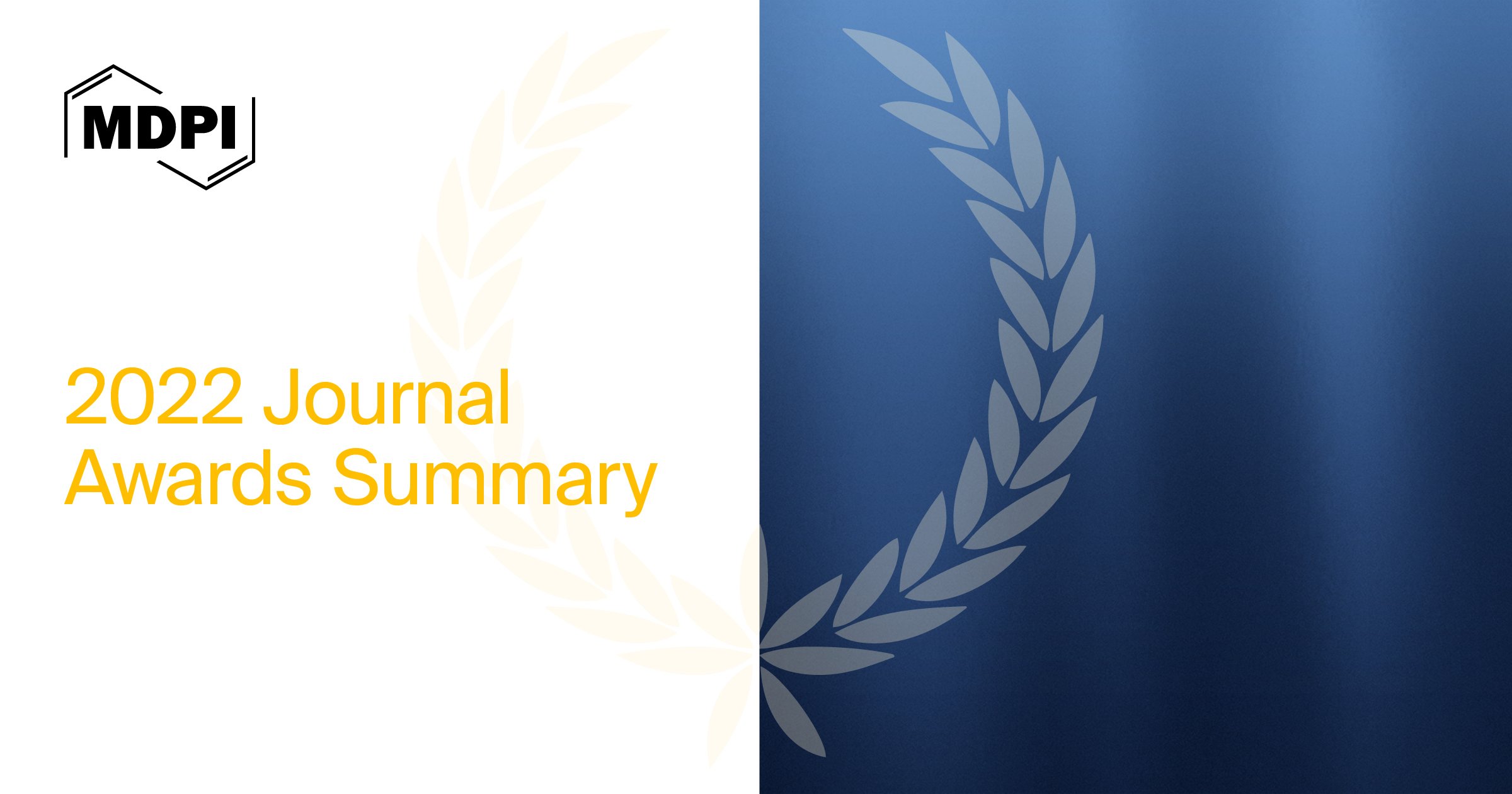
MDPI is committed to supporting the academic community, nurturing talent and advancing science. Awards are an important part of the research landscape and play a vital role in helping academics gain recognition, especially young researchers as they embark on new research avenues.
In 2022, our journals presented a total number of 394 Awards, including Travel Awards, Young Investigator Awards, Best PhD Thesis Awards, Best Paper Awards, and Outstanding Reviewer Awards, with several winners announced for some of the awards. The total prize sum amounted to just under 580,000 Swiss francs (CHF), or approximately 650,000 US dollars. Overall, more than 720 scholars were awarded.
The majority of the awards were dedicated to young researchers in relatively early stages of their careers. This encompassed 66 of the afore-mentioned Travel Awards, 60 Young Investigator Awards, supporting research projects and conference attendance, as well as 51 Best PhD Thesis Awards. Additionally, 113 Best Paper Awards were given by our journals. The selection committees were entrusted with identifying the most impactful and novel research and review articles published in their journal within a given year.
MDPI will continue its support and recognition for the academic community moving forward, sponsoring new awards across disciplines. To learn more about all the awardees and their research projects in your field of study, please visit the following pages:
To explore more MDPI awards, please click here.
30 August 2023
MDPI Insights: The CEO’s Letter #3 - Sustainability and Co-opetition

Welcome to the MDPI Insights: The CEO's Letter.
In these monthly letters, I will showcase two key aspects of our work at MDPI: our commitment to empowering researchers and our determination to facilitating open scientific exchange.
Opening Thoughts

Our Commitment to Sustainability
As a pioneer in academic open access publishing since 1996, MDPI has always been dedicated to facilitating scientific exchange across all disciplines. Our approach to open science is guided by principles such as Open Access (OA), Timeliness and Efficiency, Simplicity, High-Quality Service, Flexibility, and a commitment to Sustainability. This commitment involves preserving published papers for the long term and supporting the future of science through partnerships, sponsorships, and awards.
In this edition of the CEO Letter, I will delve into MDPI’s various sustainability initiatives. As a leader in OA publishing, we are able to provide the public with a significant amount of environment-related content at no cost.
MDPI and the Sustainable Development Goals (SDGs)
In 2020, the SDG Publishers Compact was launched to accelerate implementation of the SDGs by promoting content that informs, develops, and inspires action. MDPI joined this initiative in 2021 and subsequently launched the MDPI SDG Hub in 2022, offering free access to recent research within the scope of each of the 17 SDGs. We also support authors from underrepresented communities by waiving publication charges for selected SDG-related papers. Detailed sustainability practices and supported publications are available in the report under each Goal page.
“More than 80% of MDPI articles and reviews published in 2022 relate to the Sustainable Development Goals.” [source: InCites, Accessed on 21.08.2023]
As at August 2023, MDPI boasts 14 journals dedicated to sustainability-related topics. Our first journal in this area, Sustainability, has published over 29,000 articles on the SDGs, accumulating over 240,000 citations (source: InCites, as at 1 January 2023). These journals serve as vital platforms for researchers to share insights and address environmental challenges. In addition:
MDPI journals specializing in sustainability-related topics:
- 2009: Sustainability
- 2012: Resources
- 2013: Climate
- 2014: Environments
- 2016: Recycling
- 2019: Clean Technologies
- 2020: Sustainable Chemistry
- 2021: Wind, Biomass, Conservation, Pollutants, Solar
- 2022: Waste, Microplastics
Read more:
Impactful Research

Highly Cited Articles in Sustainability
In 2022, content published in Sustainability and indexed in Journal Citation Reports (JCR) received nearly 190,000 citations. This highlights the fact that Sustainability publishes highly cited research articles related to environmental sciences and SDG-related topics such as climate action.
We are pleased to share that Sustainability received a 2022 CiteScore of 5.8, marking a 16% increase from the 2021 metric. Specifically, the CiteScore positions Sustainability as follows: Q1 (27 out of 163) in the “Environmental Science (miscellaneous)” category, and Q1 (101 out of 779) in the “Geography Planning and Development” category. For additional journal statistics, please visit here.
“Sustainability received a 2022 CiteScore of 5.8”
While MDPI journals such as Climate and Atmosphere have a distinct focus on atmosphere pollution and its impact on climate processes, journals like Sustainability, Environments, Water, Remote Sensing, and IJERPH publish content related to climate change. These journals have published over 32,300 articles related to SDG 13: Climate Action.
Highly Cited Papers in Sustainability
Below are several highly cited papers published in Sustainability over the past three years. Citation metrics are current as at 15 August 2023.
1. “A Global Assessment: Can Renewable Energy Replace Fossil Fuels by 2050?”Authors: Jerry L. Holechek, Hatim M. E. Geli, Mohammed N. Sawalhah, and Raul Valdez
Sustainability 2022, 14(8), 4792; https://doi.org/10.3390/su14084792
Citations: Crossref (97), Scopus (91), Web of Science (82), Google Scholar (125)
This paper addresses one of the most significant challenges of climate change – achieving Net Zero Carbon by 2050. The meta-analysis suggests that while difficult, this transition is possible through the concerted application of pathways, lifestyle changes, and global cooperation.
2. “Anxiety and the Ecological Crisis: An Analysis of Eco-Anxiety and Climate Anxiety”Author: Panu Pihkala
Sustainability 2020, 12(19), 7836; https://doi.org/10.3390/su12197836
Citations: Crossref (144), Scopus (121), Web of Science (159), Google Scholar (382)
This paper has received substantial media attention, including coverage by The Guardian, BBC, Vice, and CNBC. An interview with Dr. Panu Pihkala, a leading interdisciplinary researcher on the topic, can be found on MDPI’s podcast: Insight Faster, Episode 1.
3. “Impact of Climate Change on Agriculture and Its Mitigation Strategies: A Review”Authors: Gurdeep Singh Malhi, Manpreet Kaur, and Prashant Kaushik
Sustainability 2021, 13(3), 1318; https://doi.org/10.3390/su13031318
Citations: Crossref (207), Scopus (221), Web of Science (186), Google Scholar (355)
This paper reviews literature on climate change, addressing its causes, future projections, impact on agriculture, including plant physiology, growth, productivity, pest infestation, and the economic implications of mitigation strategies.
4. “Impacts of Plastic Pollution on Ecosystem Services, Sustainable Development Goals, and Need to Focus on Circular Economy and Policy Interventions”Authors: Rakesh Kumar, Anurag Verma, Arkajyoti Shome, Rama Sinha, Srishti Sinha, Prakash Kumar Jha, Ritesh Kumar, Pawan Kumar, Shubham, Shreyas Das, Prabhakar Sharma, and P. V. Vara Prasad
Sustainability 2021, 13(17), 9963; https://doi.org/10.3390/su13179963
Citations: Crossref (134), Scopus (136), Web of Science (113), Google Scholar (184)
This review aims to assess the adverse effects of plastic pollution on ecosystems, link the management of plastic with the SDGs, and propose policy measures using transdisciplinary approaches. Empowering communities to reduce plastic use is crucial. Addressing global plastic pollution is a priority.
Sustainability is an international, cross-disciplinary, open access journal that explores environmental, cultural, economic, and social sustainability of human beings. It provides a forward-looking platform for research on sustainability and sustainable development, and is published semi-monthly online by MDPI. Sustainability is affiliated with The Canadian Urban Transit Research & Innovation Consortium (CUTRIC) and The International Council for Research and Innovation in Building and Construction (CIB).
Read more:
- Testimonials: See what our editors and authors say about Sustainability.
Inside MDPI

President of Ireland Authors Editorial in MDPI Journal Sustainability
It’s a very special occasion when the president of a country takes the initiative to write an editorial for a journal. Michael D. Higgins, President of the Republic of Ireland, has contributed his insights to a forthcoming Special Issue in Sustainability:

This Special Issue, focusing on “making sustainable development happen” at grassroots levels, allows for perspectives from, and on, the major world faiths, exploring how challenges have been conceptualised and addressed, in addition to case studies of faith-based sustainability initiatives in practice.
The experience of faith institutions and communities in translating theological and moral commitments to sustainable development into action is now a topic we must examine with urgency; one on which I am so glad this Special Issue focuses.
As President of Ireland, I very much support this Special Issue of Sustainability. It is my great hope that the contents of the papers contained herein will assist in making sustainable development happen at grassroots levels across the world so that we can cooperate together, people of faith and of none, to ensure a just, inclusive and sustainable future for all on our fragile planet.
Read the completed editorial here:
Special Issue “Faith and Sustainable Development: Exploring Practice, Progress and Challenges among Faith Communities and Institutions”: Foreword by the President of Ireland
Author: Michael D. Higgins
Sustainability 2023, 15(12), 9683; https://doi.org/10.3390/su15129683
Coming Together for Science

The World Sustainability Forum 2023
The World Sustainability Forum (WSF) is a biennial MDPI event focused on sustainability. WSF 2023 marks the tenth anniversary of the conference series, taking place on 14 September. For the first time, the event will be hosted as a 24-hour conference across three locations – Singapore, Basel in Switzerland, and Toronto in Canada – alongside virtual streaming.
This unique format allows us to span three time zones, providing live coverage of critical sustainability-related topics throughout the day:
- The Singapore Hub, chaired by Professor Horn Mun Cheah and Associate Professor Renee Tan, will explore “Sustainability for Social and Community Impact”.
- The Basel Hub, chaired by Prof. Dr. Anet Režek Jambrak and Dr. Lela Mélon, will delve into “Sustainability in the industry, and at university and corporate settings”.
- The Toronto Hub, led by Dr. Umberto Berardi, will discuss “The Sustainable Built Environment”.
MDPI Sustainability Foundation: Recognizing Excellence in Sustainability Research
The MDPI Sustainability Foundation supports researchers through two sustainability-focused awards:
- The World Sustainability Award, amounting to USD 100,000, is given to senior researchers.
- The Emerging Sustainability Leader Award, valued at USD 20,000, sponsored by the journal Sustainability, is presented to early-career researchers.
The winners of the Sustainability Foundation will be formally awarded during the WSF2023 on 14 September. Interviews with the award winners and finalists are available below.
2023 World Sustainability Award Winners
Interviews with 2023 Emerging Sustainability Leader Award Finalists
- Dr. Bahareh Kamranzad
- Dr. Youjin Kim
- Dr. Julia Lohmann
As a hybrid event, WSF23 provides scholars with the option to attend in person at one of the conference sites or, for a more sustainable approach, virtually. All sessions will be recorded and archived for future access. Registration is open until 3 September 2023, with in-person and virtual tickets available here.
Read more:
Closing Thoughts
“Co-opetition”: Collaboration Plus Healthy Competition – A Visit to Elsevier
I firmly believe in fostering collaboration and at the same time promoting healthy competition within the academic publishing industry. The market offers ample room for publishers and related companies to provide valuable services and products that enrich the academic community. While MDPI is recognized for its efficient and streamlined processes –thanks to our over 6,000 colleagues, in-house tools, and initiatives that support the author journey – our ethos has always involved learning from and collaborating with other organizations.
MDPI’s Interaction with Elsevier
In January 2023, I had a brief conversation with Judy Verses, President of Global Academic and Government Markets at Elsevier, following her participation in a panel discussion at the Academic Publishers Europe event in Berlin. One of the highlights for me was Judy’s insight into the impact of research, particularly her emphasis on the role of collaboration, including policy and showing the impact of research to influence on funding decisions.
“Such collaborations drive forward-looking strategies to elevate our support for the scholarly community”

Judy and I resumed our discussion in August, when I visited Elsevier's office to review current projects, such as our recent agreement with Science Direct and the continued indexing of MDPI journals in Scopus (indexing database owned by Elsevier). We also explored possible opportunities for the future, including a potential collaboration to expand MDPI’s Scilit data infrastructure. This endeavour aims to aggregate and provide access to scholarly metadata encompassing journal articles, conference papers, books, preprints, and more. While these discussions are ongoing, the underlying principle remains that such collaborations drive forward-looking strategies to elevate our services and support for the scholarly community.
It was great that Judy and I acknowledged the merits of 'co-opetition,' a concept based of the belief that fostering cooperation alongside healthy competition can lead to shared advancements for both individual companies and the industry at large.
‘Fully OA’ Organizations Dedicated to Open Access

MDPI proudly aligns with the ‘Fully OA’ group, a collaborative initiative comprising nine organizations dedicated to Open Access. Our monthly meetings, including an OASPA representative, serve as platforms to share non-confidential information, resources, and projects. These gatherings also facilitate discussions on topics relevant to fully OA organizations. Occasionally, joint actions spring from these interactions, such as collaborative blog posts on pertinent subjects and joint statements, such as a recent response to the House Appropriations Committee.
This display of cooperation among competing entities forms a strategic alliance focused on nurturing the best interests of the OA publishing model.
As I wrap up this third edition of the CEO Letter, I encourage you to seize opportunities for collaboration and contribute to advancing our shared academic culture. As the African proverb has it, “If you want to go fast, go alone; if you want to go far, go together.”
Chief Executive Officer
MDPI AG
28 August 2023
Meet Us at the 1st European Symposium on Animal Reproduction (ESAR), 21–23 September 2023, Nantes, France
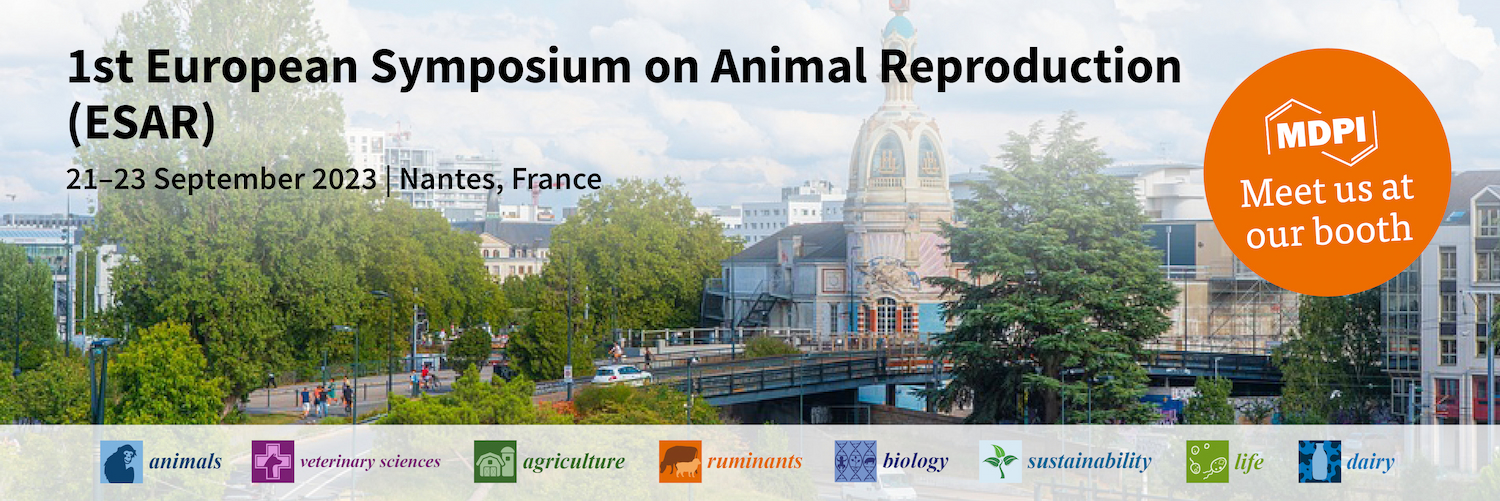
Conference: The 1st European Symposium on Animal Reproduction (ESAR)
Date: 21–23 September 2023
Location: Nantes, France
MDPI will be attending the 1st European Symposium on Animal Reproduction (ESAR) as an exhibitor; we welcome researchers from different backgrounds to visit and share their latest ideas with us.
This conference has been organized by the three European veterinary scientific societies specialized in animal reproduction: ESDAR, EVSSAR and ECAR. ESAR is a multi-disciplinary and international congress that focuses on animal reproduction. Together, we can build up a wider and better scientific program, one with cross-species talks and a wide panel of parallel sessions to satisfy all interests.
The following MDPI journals will be represented:
- Animals;
- Veterinary Sciences;
- Agriculture;
- Ruminants;
- Biology;
- Sustainability;
- Life;
- Dairy.
If you are planning to attend this conference, please do not hesitate to contact us online. Our delegates look forward to meeting you in person and answering any questions that you may have. For more information about the conference, please visit the following website: https://www.asconnect-evenement.fr/congres/1st-european-symposium-on-animal-reproduction-nantes-2023/.
24 August 2023
Meet Us at the ASHG Annual Meeting 2023, 1–5 November 2023, Washington D.C., USA
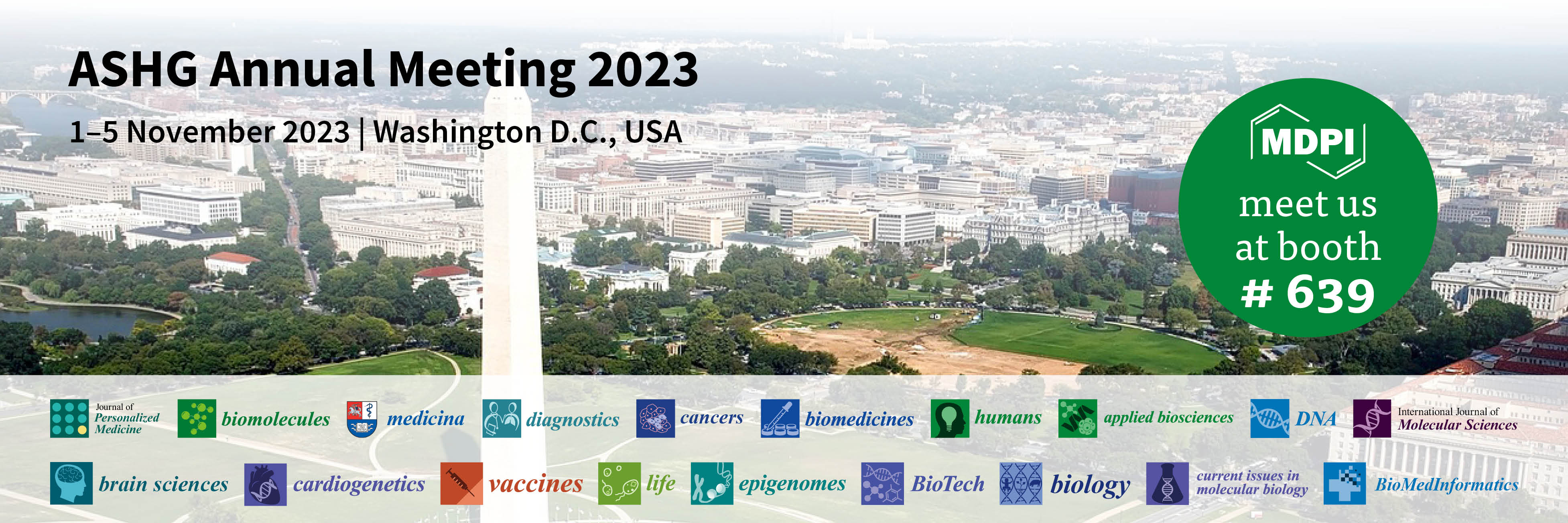
MDPI will attend the ASHG Annual Meeting 2023, held in Washington, D.C., USA, from 1 to 5 November 2023.
The ASHG Annual Meeting is the largest human genetics and genomics meeting and exposition in the world. Held in the fall, it provides a forum for the presentation and discussion of cutting-edge science in all areas of human genetics. Highlights include invited symposia; abstract-driven plenary, platform, and poster sessions; education/trainee workshops; and career opportunities and networking events.
The following MDPI journals will be represented:
- Genes;
- JPM;
- Biomolecules;
- Medicina;
- Diagnostics;
- Cancers;
- Biomedicines;
- Humans;
- Applied Biosciences;
- DNA;
- IJMS;
- Brain Sciences;
- Cardiogenetics;
- Vaccines;
- Life;
- Epigenomes;
- BioTech;
- Biology;
- CIMB;
- Biomedinformatics.
If you plan on attending this conference, please stop by our booth and speak with us. Our delegates look forward to meeting you in person and answering any questions that you may have.
For more information about the conference, please visit https://www.ashg.org/meetings/.
15 August 2023
Meet Us at the 14th National Conference on Biodiversity—1st International Conference on Mediterranean Biodiversity, 13–15 September 2023, Lecce, Italy
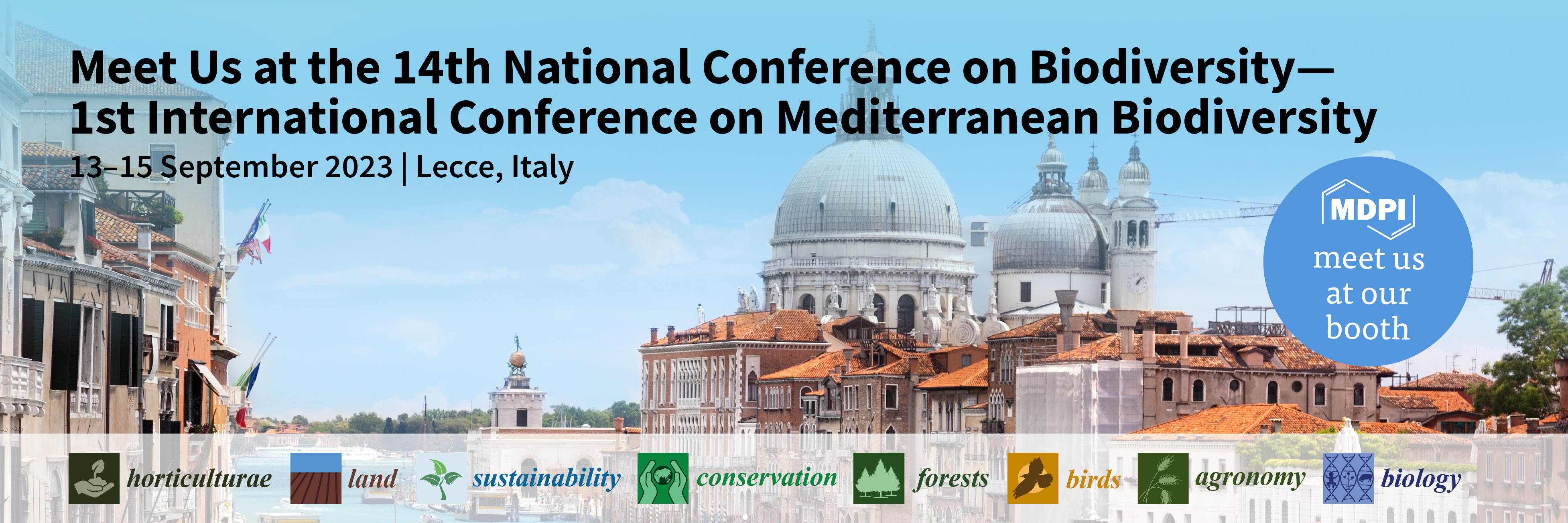
MDPI journals will be attending the 14th National Conference on Biodiversity 1st International Conference on Mediterranean Biodiversity as an exhibitor. This meeting will be held in Lecce, Italy from 13 to 15 September 2023.
The 14th National Conference on Biodiversity will be organized by the Department of Biological and Environmental Sciences and Technologies (DiSTeBA) of the University of Salento in collaboration with the Academy of Mediterranean Biodiversity Sciences (ASBM) in order to continue the discussion and dialogue initiated more than 25 years ago, among scientists, institutional and policymakers, on issues related to the mutually complementary domains of the biodiversity: biodiversity at the intraspecific level, at the interspecific level, and at the entire ecosystem level. The aim is to help promote the advancement of knowledge based on the rigor of the scientific method. In particular, the 14th National Biodiversity Conference will be a showcase for studies and research focusing on “Biodiversity, Resilience and Climate Change”.
The following MDPI journals will be represented:
If you are attending this conference, please feel free to start a conversation with us. Our delegates look forward to meeting you in person and answering any questions you may have. For more information about the conference and our booth, please visit https://leccebiodiversity2023.com/.
14 August 2023
MDPI’s 2022 Young Investigator Awards in Biology and Life Sciences—Winners Announced
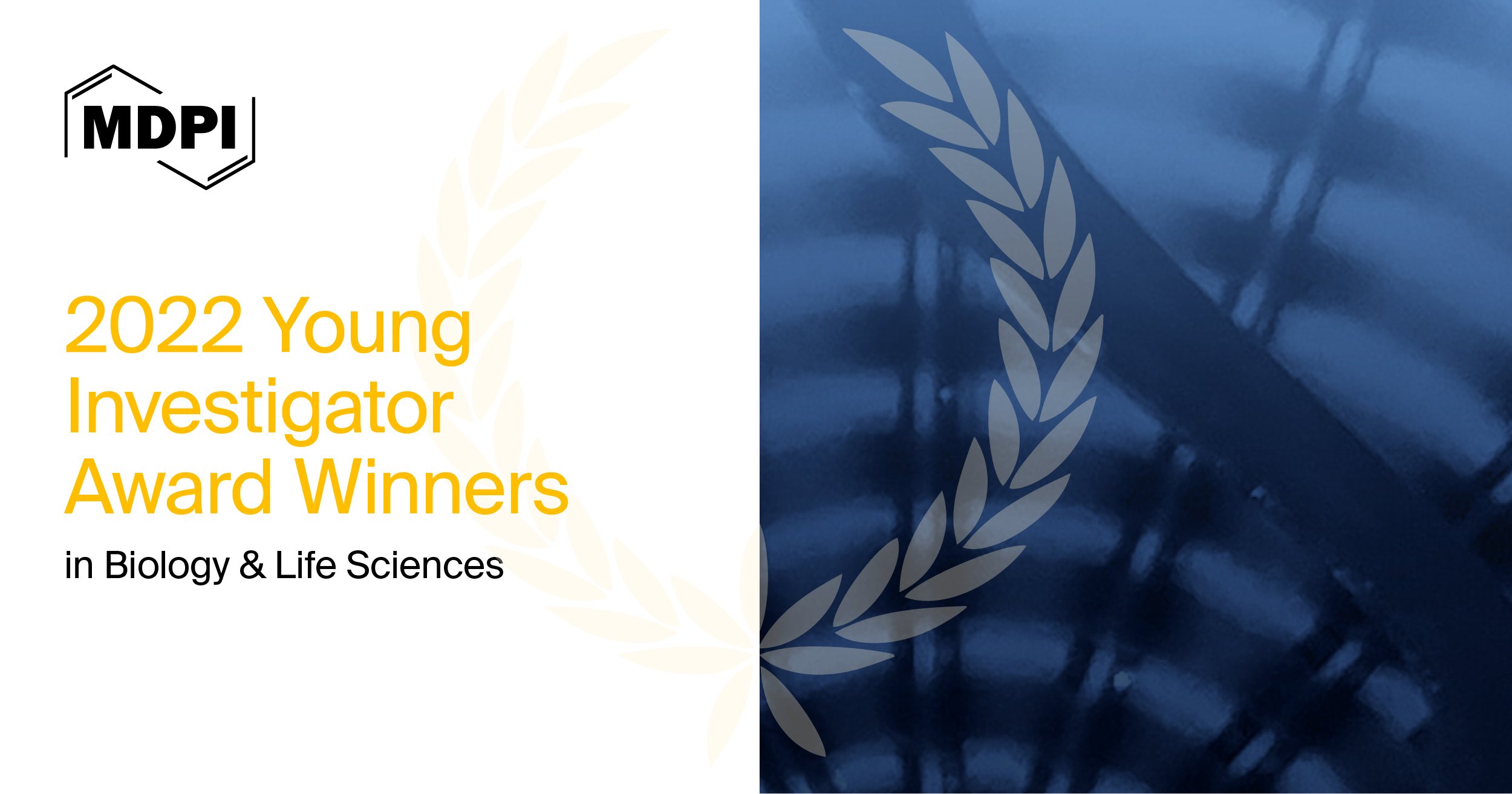
MDPI’s Young Investigator Awards recognize promising junior researchers, acknowledge their contributions, and enhance communication among scientists. We are proud to present the winners for the year 2022 in biology and life sciences. The winners were selected by the journals’ Award Evaluation Committee.
We warmly congratulate the awarded young investigators for their outstanding contributions. MDPI will continue to provide support and recognition to the academic community.
- Thomas Hartinger, University of Veterinary Medicine Vienna, Austria
- Leontina Lipan, Universidad Miguel Hernández, Spain
- Daniel Stec, Polish Academy of Sciences, Poland
- Dibyadeep Datta, Yale Medical School, USA
- Giacomo Valle, ETH Zurich, Switzerland
- Morgan H. James, Rutgers University, USA
- Xiaonan Lu, McGill University, Canada
- Alfredo Iacoangeli, King's College London, UK
- Elisa De Franco, University of Exeter, UK
- Riccardo Pecori, German Cancer Research Center, Germany
- Vanessa Silva, University of Trás-os-Montes and Alto Douro, Portugal
- Massimiliano Renna, University of Bari Aldo Moro at Bari, Italy
- Adam G. Dolezal, University of Illinois Urbana-Champaign, United States
- Carla Rodrigues, Institut Pasteur, France
- Lorena Rodriguez-Rubio, University of Barcelona, Spain
- Kevin Solomon, University of Delaware, USA
- Colleen Deane, University of Southampton, UK
- Paz Otero Fuertes, University of Vigo, Spain
- Marta Giovanetti, National Reference Laboratory of Flavivirus in the Oswaldo Cruz Foundation, Brazil
- Carrie M. Long, National Institute of Allergy and Infectious Diseases (NIAID), USA
- Carina Joe, University of Oxford, UK
About MDPI Awards:
In order to reward the academic community, especially young researchers and enhance communication among scientists, MDPI journals regularly offer various awards to researchers in specific fields. These awards, serving as a source of inspiration and recognition, help raise the influence of talented individuals who have been credited with outstanding achievements and are making a significant contribution to the advancement of their fields.
To explore more MDPI awards, please click here.
14 August 2023
MDPI’s 2022 Travel Awards in Biology and Life Sciences—Winners Announced
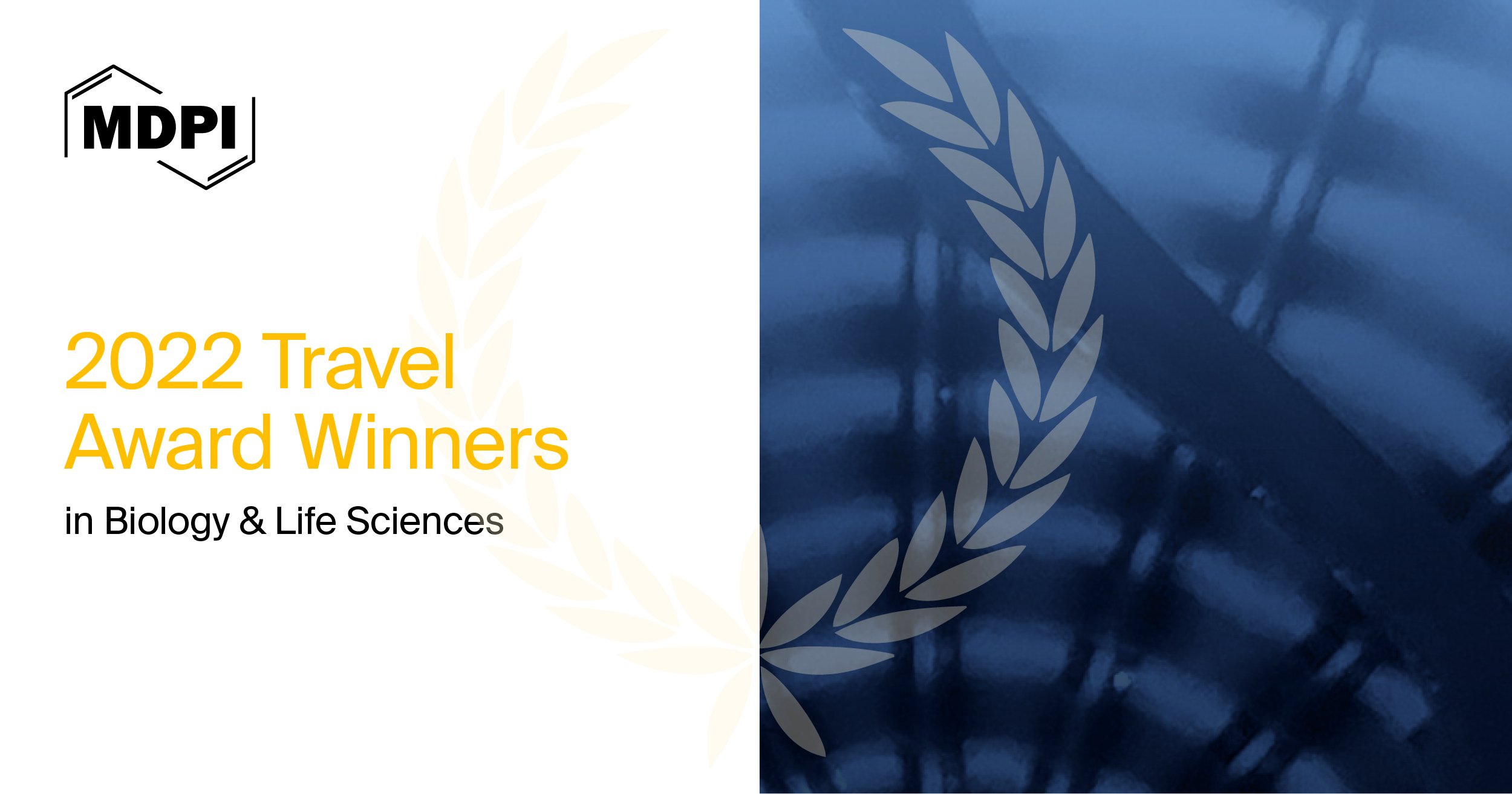
We are proud to recognize the winners of MDPI’s 2022 Travel Awards in biology and life sciences for their outstanding presentations.
MDPI journals regularly offer travel awards to encourage junior scientists to present their latest research at academic conferences in specific fields, which helps to increase their influence.
The winners mentioned below were carefully selected by the journal editors based on an outline of their research and the work to be presented at an academic conference.
We would like to warmly congratulate the winners of the 2022 Travel Awards and wish them the greatest success in their future research endeavors. MDPI will continue to enhance communication among scientists.
- Liloia Donato, University of Turin, Italy
- Roberta Bettoni, University of Milano Bicocca, Italy
- Vanessa Silva, University of Trás-os-Montes and Alto Douro, Portugal
- Carlo Matera, University of Milan, Italy
- Elisabetta Coppi, University of Florence, Italy
- Ilaria Tonazzini, Nanoscience Institute—National Research Council (CNR) @ NEST in Pisa, Italy
- Pere Catala, University Eye Clinic Maastricht, Maastricht University Medical Center, the Netherlands
- Angela Blasimann, University of Antwerp, Belgium
- Angelo Sabag, Western Sydney University, Australia
About MDPI Awards:
In order to reward the academic community, especially young researchers and enhance communication among scientists, MDPI journals regularly offer various awards to researchers in specific fields. These awards, serving as a source of inspiration and recognition, help raise the influence of talented individuals who have been credited with outstanding achievements and are making a significant contribution to the advancement of their fields.
To explore more MDPI awards, please click here.
14 August 2023
MDPI’s 2022 Outstanding Reviewer Awards in Biology and Life Sciences—Winners Announced
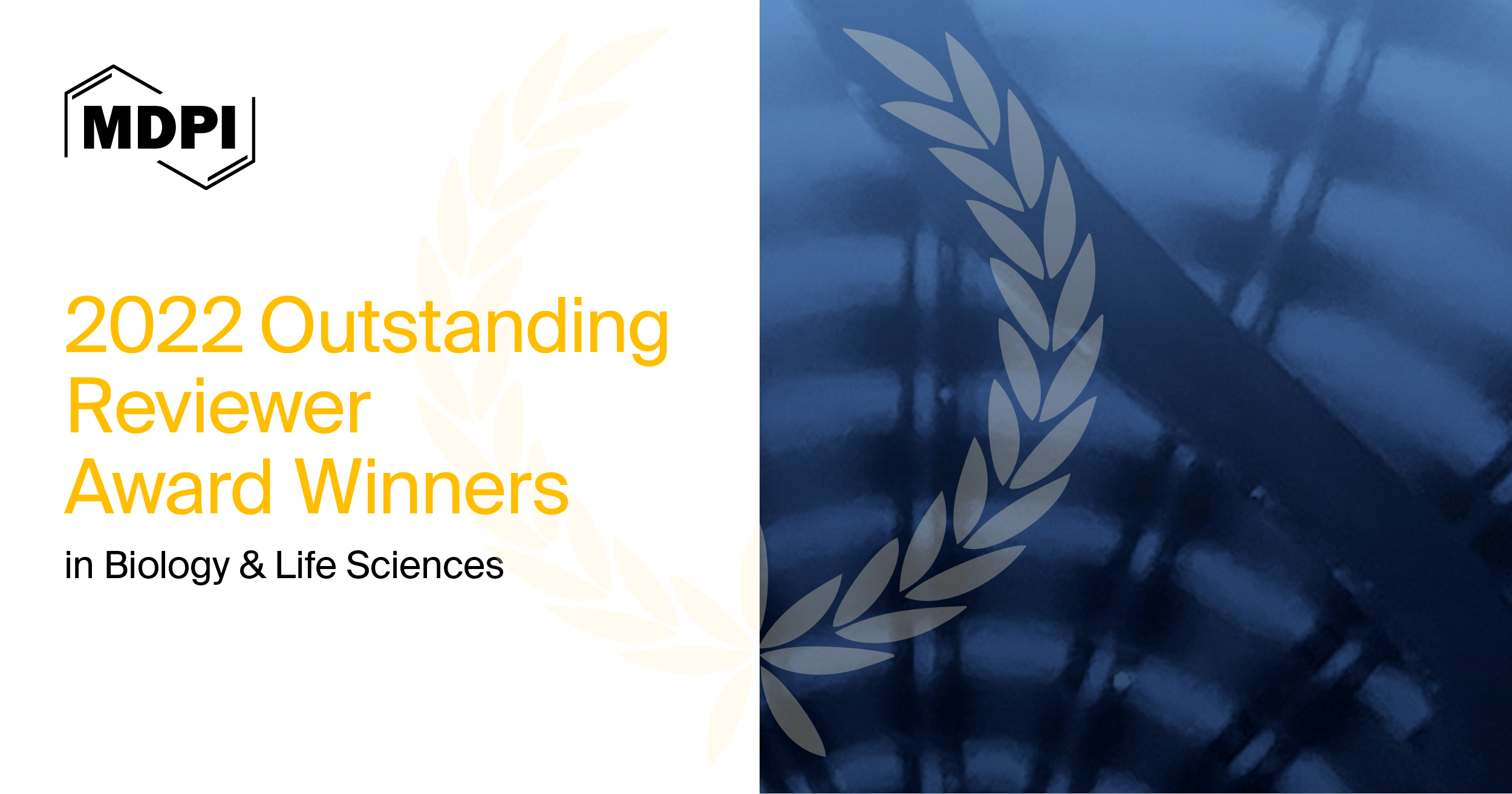
In order to acknowledge our reviewers, who demonstrate diligence, professionalism, and timeliness when generously dedicating their time to reviewing manuscripts, MDPI journals regularly offer outstanding reviewer awards to scholars who participate in the peer review process.
We are proud to recognize the winners for the year 2022 in biology and life sciences for their outstanding contributions, among extensive competition, by presenting them with an Outstanding Reviewer Award.
We would like to take this opportunity to congratulate all of the winners on their achievements. MDPI will continue to provide support and recognition to the academic community.
- Ewa Ropelewska, The National Institute of Horticultural Research, Poland
- Marek Rašovský, Slovak University of Agriculture in Nitra, Slovakia
- Prakash Jha, Kansas State University, USA
- Vasileios Greveniotis, Institute of Industrial and Forage Crops, Greece
- Alberto Collareta, University of Pisa, Italy
- Francisco Curate, University of Coimbra, Portugal
- Gianpiero Greco, University of Study of Bari, Italy
- Luca Poli, University of Study of Bari, Italy
- Shaohua Chen, South China Agricultural University, China
- Chong Chen, Yamaguchi University Graduate School of Medicine, Japan
- Marco Sapienza, University of Catania, Italy
- Sabina Barrios-Fernández, University of Extremadura, Spain
- Corrado Battisti, Torre Flavia LTER (Long Term Ecological Research) Station, Italy
- Daniel Stec, Institute of Systematics and Evolution of Animals of the Polish Academy of Sciences, Poland
- Emilia Grzędzicka, Institute of Systematics and Evolution of Animals of the Polish Academy of Sciences, Poland
- Igor Zelnik, University of Ljubljana, Slovenia
- Eva S. Liu, 1Harvard Medical School, USA 2Brigham and Women’s Hospital, USA
- Aleksandra Szydlowska, Warsaw University of Life Sciences (WULS), Poland
- Mohamed Ali Abdel-Rahman, Al-Azhar University, Egypt
- Andrew G. Jeffs, University of Auckland, New Zealand
- Mohamed Samy-Kamal, Universitat d'Alacant, Spain
- Baskaran Stephen Inbaraj, Fu Jen Catholic University, Taiwan
- Marzena Włodarczyk-Stasiak, University of Life Sciences in Lublin, Poland
- Minaxi Sharma, Haute Ecole Provinciale de Hainaut-Condorcet, Belgium
- Viviani Ruffo de Oliveira, Federal University of Rio Grande do Sul (UFRGS), Brazil
- Federico Manuel Giorgi, University of Bologna, Italy
- Jan Bocianowski, Poznań University of Life Sciences, Poland
- Magdalena Mroczek, Center for Cardiovascular Genetics and Gene Diagnostics, Switzerland
- Keigi Fujiwara, University of Texas MD Anderson Cancer Center, USA
- Tomasz W. Kaminski, University of Pittsburgh, USA
- Takujiro Homma, Yamagata University, Japan
- William Bryan Terzaghi, Wilkes University, United States
- Zong-jie Cui, Beijing Normal University, China
- Abraão Almeida Santos, University of Florida, USA
- Agata Kaczmarek, Polish Academy of Sciences, Poland
- Miguel A. García-Martínez, Universidad Veracruzana, Mexico
- Andrei S. Rodin, Diabetes and Metabolism Research Institute, USA
- Kazuhiko Kotani, Jichi Medical University, Japan
- Jianing Mi, King Abdullah University of Science and Technology, Saudi Arabia
- Nguyen Phuoc Long, Inje University College of Medicine, Republic of Korea
- Xian Luo, University of Alberta, Canada
- Guillaume Fiches, Ohio State University, USA
- Jianxuan Wu, Gilead Sciences, USA
- Tomasz M. Karpiński, Poznań University of Medical Sciences, Poland
- Alicia Ayerdi Gotor, Institut Polytechnique UniLaSalle, France
- Andrea Mastinu, University of Brescia, Italy
- Edyta Paczos-Grzeda, University of Life Sciences in Lublin, Poland
- Narayan Bhusal, Seoul National University, Republic of Korea
- Mohsen Hesami, University of Guelph, Canada
- Christian Müller, University of Greifswald, Germany
- Margarita Fernández-Tejedor, IRTA, Spain
- Christian Napoli, “Sapienza” University of Rome, Italy
- Federico Marchesi, University of Parma, Italy
- Roger E. Thomas, University of Calgary, Canada
- Fun-In Wang, National Taiwan University, Taiwan
- Valeria Grieco, University of Milan, Italy
About MDPI Awards:
In order to reward the academic community, especially young researchers and enhance communication among scientists, MDPI journals regularly offer various awards to researchers in specific fields. These awards, serving as a source of inspiration and recognition, help raise the influence of talented individuals who have been credited with outstanding achievements and are making a significant contribution to the advancement of their fields.
To explore more MDPI awards, please click here.
14 August 2023
MDPI’s 2022 Best PhD Thesis Awards in Biology and Life Sciences—Winners Announced
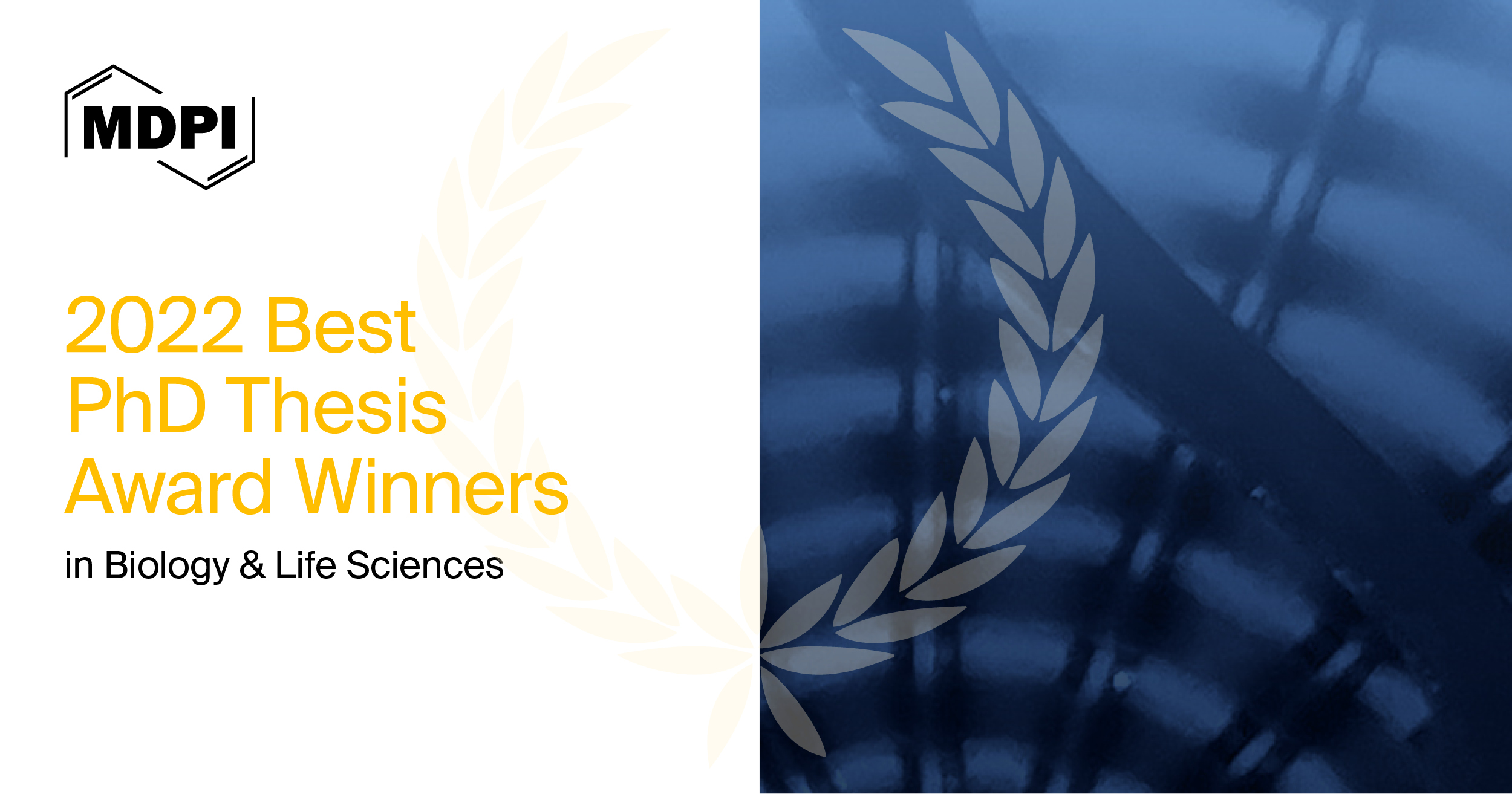
MDPI’s Best PhD Thesis Awards are presented to recognize the young scholars who are judged to have completed the most outstanding PhD thesis in their field of research and to encourage them to continue their outstanding work and further contributions to their field.
We would like to warmly congratulate the winners of the 2022 Best PhD Thesis Awards and wish them success in their future research endeavors. MDPI will continue to enhance communication among scientists.
- “CYP2D in the Brain Alters Response to Drugs and Neurotoxins”
by Marlaina R. Stocco, University of California, USA - “Neural Encoding of Prior Experience in Sensorimotor Behavior”
by Nicolas Meirhaeghe, Institut de Neurosciences de la Timone, France
- “Perinatal Stem Cell: Epigenetic, Biological and Differentiative Characteristics”
by Giulia Gaggi, University "G.D'Annunzio" of Chieti-Pescara, Italy
- “Uncovering the Genetic Variation Involved in Asthma Exacerbations through Multiple Genomic Approaches”
by Esther Herrera Luis, Universidad de La Laguna, Spain
- “Development of Novel Tools for Monitoring Antimicrobial Resistance in Complex Microbial Communities and Their Application to Improving Our Stewardship of Antimicrobials in Livestock”
by Ashenafi Feyisa Beyi, Iowa State University, United States
About MDPI Awards:
In order to reward the academic community, especially young researchers and enhance communication among scientists, MDPI journals regularly offer various awards to researchers in specific fields. These awards, serving as a source of inspiration and recognition, help raise the of talented individuals who have been credited with outstanding achievements and are making a significant contribution to the advancement of their fields.
To explore more MDPI awards, please click here.
14 August 2023
MDPI’s Best Paper Awards in Biology and Life Sciences—Winners Announced in 2022
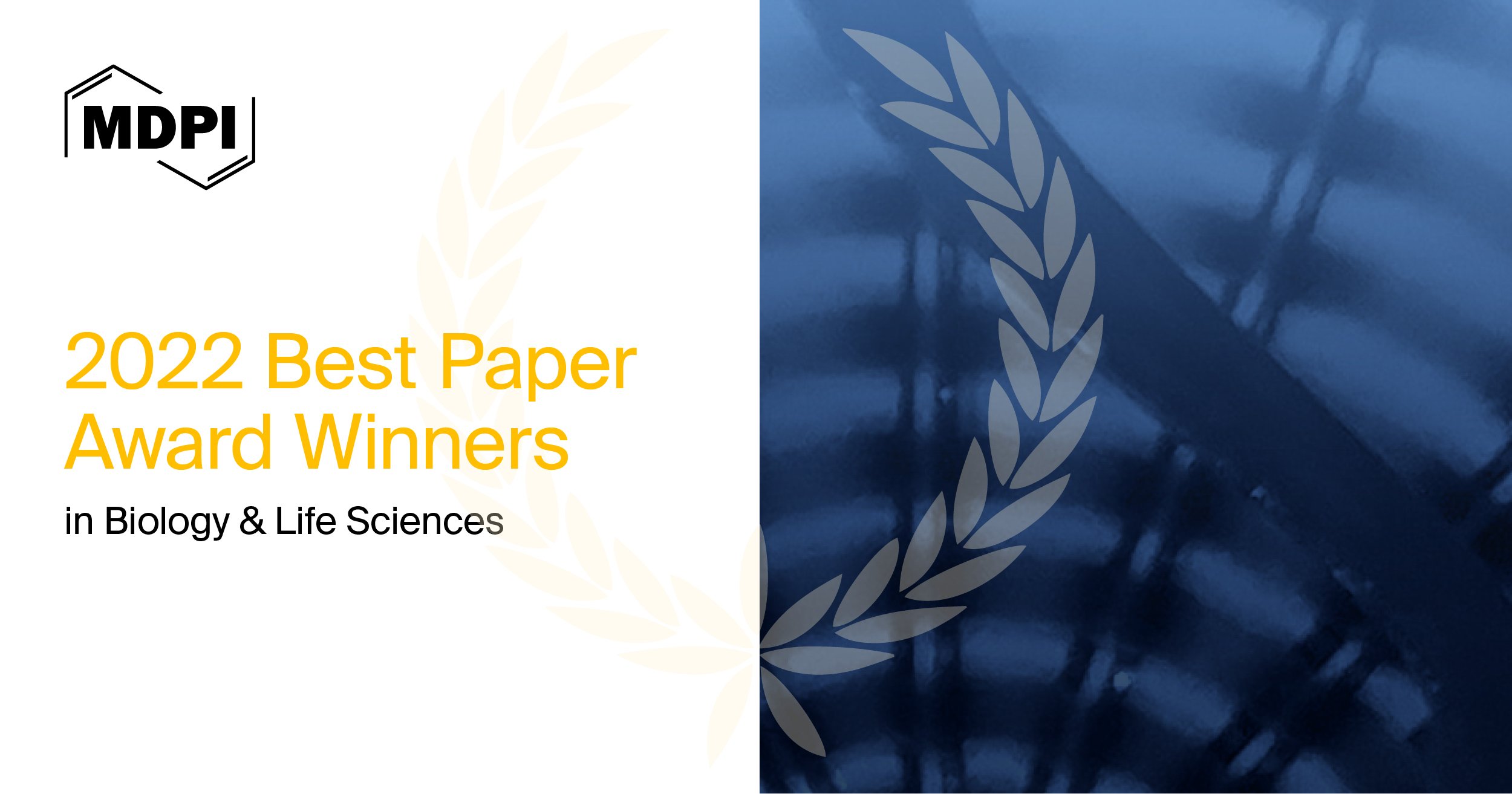
The purpose of our Best Paper Awards is to promote and recognize the most impactful contributions published within MDPI journals.
The editors of each journal carefully selected reviews and research papers through a rigorous judging process based on criteria such as scientific merit, overall impact, and the quality of presentation.
We are honored to present the winners for the year 2022 in biology and life sciences, who were selected amongst extensive competition, and congratulate the authors for their outstanding scientific publications. MDPI will continue to provide support and recognition to the academic community.
- “From Smart Farming towards Agriculture 5.0: A Review on Crop Data Management”
by Verónica Saiz-Rubio and Francisco Rovira-Más
Agronomy 2020, 10(2), 207; https://doi.org/10.3390/agronomy10020207
- “Comparison of Biochemical, Anatomical, Morphological, and Physiological Responses to Salinity Stress in Wheat and Barley Genotypes Deferring in Salinity Tolerance”
by Muhammad Zeeshan, Meiqin Lu, Shafaque Sehar, Paul Holford and Feibo Wu
Agronomy 2020, 10(1), 127; https://doi.org/10.3390/agronomy10010127
- “The Use of a Plant-Based Biostimulant Improves Plant Performances and Fruit Quality in Tomato Plants Grown at Elevated Temperatures”
by Silvana Francesca Carmen Arena, Bruno Hay Mele, Carlo Schettini, Patrizia Ambrosino, Amalia Barone and Maria Manuela Rigano
Agronomy 2020, 10(3), https://doi.org/10.3390/agronomy10030363
- “The Management of Agricultural Waste Biomass in the Framework of Circular Economy and Bioeconomy: An Opportunity for Greenhouse Agriculture in Southeast Spain”
by Mónica Duque-Acevedo, Luis J. Belmonte-Ureña, José A. Plaza-Úbeda and Francisco Camacho-Ferre
Agronomy 2020, 10(4), 489; https://doi.org/10.3390/agronomy10040489
- “Apoptotic Bodies: Particular Extracellular Vesicles Involved in Intercellular Communication”
by Michela Battistelli and Elisabetta Falcieri
Biology 2020, 9(1), 21; https://doi.org/10.3390/biology9010021
- “Vegetation and Environmental Changes on Non-Reclaimed Spoil Heaps in Southern Poland”
by Oimahmad Rahmonov, Robert Krzysztofik, Dorota Środek and Justyna Smolarek-Lach
Biology 2020, 9(7), 164; https://doi.org/10.3390/biology9070164
- “Formyl Peptide Receptor 1 Signaling in Acute Inflammation and Neural Differentiation Induced by Traumatic Brain Injury”
by Roberta Fusco, Enrico Gugliandolo, Rosalba Siracusa, Maria Scuto, Marika Cordaro, Ramona D’Amico, Maurizio Evangelista, Angelo Peli, Alessio Filippo Peritore, Daniela Impellizzeri et al.
Biology 2020, 9(9), 238; https://doi.org/10.3390/biology9090238
- “Cholesterol and Alzheimer’s Disease Risk: A Meta-Meta-Analysis”
by Olalla Sáiz-Vazquez, Alicia Puente-Martínez, Silvia Ubillos-Landa, Joaquín Pacheco-Bonrostro and Javier Santabárbara
Brain Sci. 2020, 10(6), 386; https://doi.org/10.3390/brainsci10060386
- “Psychosocial and Behavioral Impact of COVID-19 in Autism Spectrum Disorder: An Online Parent Survey”
by Marco Colizzi, Elena Sironi, Federico Antonini, Marco Luigi Ciceri, Chiara Bovo and Leonardo Zoccante
Brain Sci. 2020, 10(6), 341; https://doi.org/10.3390/brainsci10060341
- “More Than a Functional Group: Diversity within the Legume–Rhizobia Mutualism and Its Relationship with Ecosystem Function”
by Benton N. Taylor, Ellen L. Simms and Kimberly J. Komatsu
Diversity 2020, 12(2), 50; https://doi.org/10.3390/d12020050
- “A Common Approach to the Conservation of Threatened Island Vascular Plants: First Results in the Mediterranean Basin”
by Giuseppe Fenu, Gianluigi Bacchetta, Charalambos S. Christodoulou, Donatella Cogoni, Christini Fournaraki, Giusso del Galdo Gian Pietro, Panagiota Gotsiou, Angelos Kyratzis, Carole Piazza, Magdalena Vicens et al.
Diversity 2020, 12(4), 157; https://doi.org/10.3390/d12040157
- “Plant Diversity Patterns and Conservation Implications under Climate-Change Scenarios in the Mediterranean: The Case of Crete (Aegean, Greece)”
by Konstantinos Kougioumoutzis, Ioannis P. Kokkoris, Maria Panitsa, Panayiotis Trigas, Arne Strid and Panayotis Dimopoulos
Diversity 2020, 12(7), 270; https://doi.org/10.3390/d12070270
- “Conserving the Diversity of Ecological Interactions: The Role of Two Threatened Macaw Species as Legitimate Dispersers of ‘Megafaunal’ Fruits”
by José L. Tella, Fernando Hiraldo, Erica Pacífico, José A. Díaz-Luque, Francisco V. Dénes, Fernanda M. Fontoura, Neiva Guedes and Guillermo Blanco
Diversity 2020, 12(2), 45; https://doi.org/10.3390/d12020045
- “Genomics in Bacterial Taxonomy: Impact on the Genus Pseudomonas”
by Jorge Lalucat, Magdalena Mulet, Margarita Gomila and Elena García-Valdés
Genes 2020, 11(2), 139; https://doi.org/10.3390/genes11020139
- “Histone Deacetylases (HDACs): Evolution, Specificity, Role in Transcriptional Complexes, and Pharmacological Actionability”
by Giorgio Milazzo, Daniele Mercatelli, Giulia Di Muzio, Luca Triboli, Piergiuseppe De Rosa, Giovanni Perini and Federico M. Giorgi
Genes 2020, 11(5), 556; https://doi.org/10.3390/genes11050556
- “COVID-19 and Genetic Variants of Protein Involved in the SARS-CoV-2 Entry into the Host Cells”
by Andrea Latini, Emanuele Agolini, Antonio Novelli, Paola Borgiani, Rosalinda Giannini, Paolo Gravina, Andrea Smarrazzo, Mario Dauri, Massimo Andreoni, Paola Rogliani et al.
Genes 2020, 11(9), 1010; https://doi.org/10.3390/genes11091010
- “Clustered DNA Double-Strand Breaks: Biological Effects and Relevance to Cancer Radiotherapy”
by Jac A. Nickoloff, Neelam Sharma and Lynn Taylor
Genes 2020, 11(1), 99; https://doi.org/10.3390/genes11010099
- “Inhibition of Angiotensin-Converting Enzyme Ameliorates Renal Fibrosis by Mitigating DPP-4 Level and Restoring Antifibrotic MicroRNAs”
by Swayam Prakash Srivastava, Julie E. Goodwin, Keizo Kanasaki and Daisuke Koya
Genes 2020, 11(2), 211; https://doi.org/10.3390/genes11020211
- “Regulation of Ergosterol Biosynthesis in Saccharomyces cerevisiae”
by Tania Jordá and Sergi Puig
Genes 2020, 11(7), 795; https://doi.org/10.3390/genes11070795
- “Laccase Properties, Physiological Functions, and Evolution”
by Grzegorz Janusz, Anna Pawlik, Urszula Świderska-Burek, Jolanta Polak, Justyna Sulej, Anna Jarosz-Wilkołazka and Andrzej Paszczyński
Int. J. Mol. Sci. 2020, 21(3), 966; https://doi.org/10.3390/ijms21030966
- “Lysosomal Exocytosis, Exosome Release and Secretory Autophagy: The Autophagic- and Endo-Lysosomal Systems Go Extracellular”
by Sandra Buratta, Brunella Tancini, Krizia Sagini, Federica Delo, Elisabetta Chiaradia, Lorena Urbanelli and Carla Emiliani
Int. J. Mol. Sci. 2020, 21(7), 2576; https://doi.org/10.3390/ijms21072576
- “Recent Advances in Lipopolysaccharide Recognition Systems”
by Lalita Mazgaeen and Prajwal Gurung
Int. J. Mol. Sci. 2020, 21(2), 379; https://doi.org/10.3390/ijms21020379
- “Redox Interactions of Vitamin C and Iron: Inhibition of the Pro-Oxidant Activity by Deferiprone”
by Viktor A. Timoshnikov, Tatyana V. Kobzeva, Nikolay E. Polyakov and George J. Kontoghiorghes
Int. J. Mol. Sci. 2020, 21(11), 3967; https://doi.org/10.3390/ijms21113967
- “Modulation of Pro-Oxidant and Pro-Inflammatory Activities of M1 Macrophages by the Natural Dipeptide Carnosine”
by Claudia G. Fresta, Annamaria Fidilio, Giacomo Lazzarino, Nicolò Musso, Margherita Grasso, Sara Merlo, Angela M. Amorini, Claudio Bucolo, Barbara Tavazzi, Giuseppe Lazzarino et al.
Int. J. Mol. Sci. 2020, 21(3), 776; https://doi.org/10.3390/ijms21030776
- “SAAMBE-3D: Predicting Effect of Mutations on Protein–Protein Interactions”
by Swagata Pahari, Gen Li, Adithya Krishna Murthy, Siqi Liang, Robert Fragoza, Haiyuan Yu and Emil Alexov
Int. J. Mol. Sci. 2020, 21(7), 2563; https://doi.org/10.3390/ijms21072563
- “Diversity and Global Distribution of Viruses of the Western Honey Bee, Apis mellifera”
by Alexis Beaurepaire, Niels Piot, Vincent Doublet, Karina Antunez, Ewan Campbell, Panuwan Chantawannakul, Nor Chejanovsky, Anna Gajda, Matthew Heerman and Delphine Panziera
Insects 2020, 11(4), 239; https://doi.org/10.3390/insects11040239
- “Soil Health and Arthropods: From Complex System to Worthwhile Investigation”
by Cristina Menta and Sara Remelli
Insects 2020, 11(1), 54; https://doi.org/10.3390/insects11010054
- “Influence of Temperature on Age-Stage, Two-Sex Life Tables for a Minnesota-Acclimated Population of the Brown Marmorated Stink Bug (Halyomorpha halys)”
by Byju N. Govindan and William D. Hutchison
Insects 2020, 11(2), 108; https://doi.org/10.3390/insects11020108
- “Characterization of Resistance in Gram-Negative Urinary Isolates Using Existing and Novel Indicators of Clinical Relevance: A 10-Year Data Analysis”
by Márió Gajdács, Zoltán Bátori, Marianna Ábrók, Andrea Lázár and Katalin Burián
Life 2020, 10(2), 16; https://doi.org/10.3390/life10020016
- “Neuroprotection or Neurotoxicity of Illicit Drugs on Parkinson’s Disease”
by Carla Ferreira, Catarina Almeida, Sandra Tenreiro and Alexandre Quintas
Life 2020, 10(6), 86; https://doi.org/10.3390/life10060086
- “Carbonic Anhydrase Inhibitors Targeting Metabolism and Tumor Microenvironment”
by Andrea Angeli, Fabrizio Carta, Alessio Nocentini, Jean-Yves Winum, Raivis Zalubovskis, Atilla Akdemir, Valentina Onnis, Wagdy M. Eldehna, Clemente Capasso, Giuseppina De Simone et al.
Metabolites 2020, 10(10), 412; https://doi.org/10.3390/metabo10100412
- “MetaboAnalystR 3.0: Toward an Optimized Workflow for Global Metabolomics”
by Zhiqiang Pang, Jasmine Chong, Shuzhao Li and Jianguo Xia
Metabolites 2020, 10(5), 186; https://doi.org/10.3390/metabo10050186
- “Tryptophan Metabolism, Inflammation, and Oxidative Stress in Patients with Neurovascular Disease”
by Martin Hajsl, Alzbeta Hlavackova, Karolina Broulikova, Martin Sramek, Martin Maly, Jan E. Dyr and Jiri Suttnar
Metabolites 2020, 10(5), 208; https://doi.org/10.3390/metabo10050208
- “Production and Purification of Artificial Circular RNA Sponges for Application in Molecular Biology and Medicine”
by Janina Breuer and Oliver Rossbach
Methods Protoc. 2020, 3(2), 42; https://doi.org/10.3390/mps3020042
- “Effectiveness of Chemical Compounds Used against African Swine Fever Virus in Commercial Available Disinfectants”
by Małgorzata Juszkiewicz, Marek Walczak, Natalia Mazur-Panasiuk and Grzegorz Woźniakowski
Pathogens 2020, 9(11), 878; https://doi.org/10.3390/pathogens9110878
- “Betanodavirus and VER Disease: A 30-year Research Review”
by Isabel Bandín and Sandra Souto
Pathogens 2020, 9(2), 106; https://doi.org/10.3390/pathogens9020106
- “The Bradyzoite: A Key Developmental Stage for the Persistence and Pathogenesis of Toxoplasmosis”
by Aude Cerutti, Nicolas Blanchard and Sébastien Besteiro
Pathogens 2020, 9(3), 234; https://doi.org/10.3390/pathogens9030234
- “Understanding Flavivirus Capsid Protein Functions: The Tip of the Iceberg”
by Stephanea Sotcheff and Andrew Routh
Pathogens 2020, 9(1), 42; https://doi.org/10.3390/pathogens9010042
- “Photosynthetic Metabolism under Stressful Growth Conditions as a Bases for Crop Breeding and Yield Improvement”
by Fermín Morales, María Ancín, Dorra Fakhet, Jon González-Torralba, Angie L. Gámez, Amaia Seminario, David Soba, Sinda Ben Mariem, Miguel Garriga and Iker Aranjuelo
Plants 2020, 9(1), 88; https://doi.org/10.3390/plants9010088
- “Plant Roots Release Small Extracellular Vesicles with Antifungal Activity”
by Monica De Palma, Alfredo Ambrosone, Antonietta Leone, Pasquale Del Gaudio, Michelina Ruocco, Lilla Turiák, Ramesh Bokka, Immacolata Fiume, Marina Tucci and Gabriella Pocsfalvi
Plants 2020, 9(12), 1777; https://doi.org/10.3390/plants9121777
- “Feeding Behavior and Virus-transmission Ability of Insect Vectors Exposed to Systemic Insecticides”
by Elisa Garzo, Aránzazu Moreno, María Plaza and Alberto Fereres
Plants 2020, 9(7), 895; https://doi.org/10.3390/plants9070895
- “Transcriptome Analyses and Antioxidant Activity Profiling Reveal the Role of a Lignin-Derived Biostimulant Seed Treatment in Enhancing Heat Stress Tolerance in Soybean”
by Cristina Campobenedetto, Giuseppe Mannino, Chiara Agliassa, Alberto Acquadro, Valeria Contartese, Christian Garabello and Cinzia Margherita Bertea
Plants 2020, 9(10), 1308; https://doi.org/10.3390/plants9101308
- “Aflatoxin Biosynthesis and Genetic Regulation: A Review”
by Isaura Caceres, Anthony Al Khoury, Rhoda El Khoury, Sophie Lorber, Isabelle P. Oswald, André El Khoury, Ali Atoui, Olivier Puel and Jean-Denis Bailly
Toxins 2020, 12(3), 150; https://doi.org/10.3390/toxins12030150
- “Diet Breadth Mediates the Prey Specificity of Venom Potency in Snakes”
by Keith Lyons, Michel M. Dugon and Kevin Healy
Toxins 2020, 12(2), 74; https://doi.org/10.3390/toxins12020074
- “Rapid Quantification of SARS-CoV-2-Neutralizing Antibodies Using Propagation-Defective Vesicular Stomatitis Virus Pseudotypes”
by Ferdinand Zettl, Toni Luise Meister, Tanja Vollmer, Bastian Fischer, Jörg Steinmann, Adalbert Krawczyk, Philip V’kovski, Daniel Todt, Eike Steinmann, Stephanie Pfaender et al.
Vaccines 2020, 8(3), 386; https://doi.org/10.3390/vaccines8030386
- “Influences on Attitudes Regarding Potential COVID-19 Vaccination in the United States”
by Kendall Pogue, Jamie L. Jensen, Carter K. Stancil, Daniel G. Ferguson, Savannah J. Hughes, Emily J. Mello, Ryan Burgess, Bradford K. Berges, Abraham Quaye and Brian D. Poole
Vaccines 2020, 8(4), 582; https://doi.org/10.3390/vaccines8040582
- “Recent Progress on the Versatility of Virus-Like Particles”
by Ciying Qian, Xinlin Liu, Qin Xu, Zhiping Wang, Jie Chen, Tingting Li, Qingbing Zheng, Hai Yu, Ying Gu, Shaowei Li et al.
Vaccines 2020, 8(1), 139; https://doi.org/10.3390/vaccines8010139
- “COVID-19: Mechanisms of Vaccination and Immunity”
by Daniel E. Speiser and Martin F. Bachmann
Vaccines 2020, 8(3), 404; https://doi.org/10.3390/vaccines8030404
- “Manure as a Potential Hotspot for Antibiotic Resistance Dissemination by Horizontal Gene Transfer Events”
by Tiago Lima, Sara Domingues and Gabriela Jorge Da Silva
Vet. Sci. 2020, 7(3), 110; https://doi.org/10.3390/vetsci7030110
- “Seasonality of Nosema ceranae Infections and Their Relationship with Honey Bee Populations, Food Stores, and Survivorship in a North American Region”
by Berna Emsen, Alvaro De la Mora, Brian Lacey, Les Eccles, Paul G. Kelly, Carlos A. Medina-Flores, Tatiana Petukhova, Nuria Morfin and Ernesto Guzman-Novoa
Vet. Sci. 2020, 7(3), 131; https://doi.org/10.3390/vetsci7030131
About MDPI Awards:
In order to reward the academic community, especially young researchers and enhance communication among scientists, MDPI journals regularly offer various awards to researchers in specific fields. These awards, serving as a source of inspiration and recognition, help raise the influence of talented individuals who have been credited with outstanding achievements and are making a significant contribution to the advancement of their fields.
To explore more MDPI awards, please click here.
9 August 2023
MDPI World Hepatitis Day Webinar 2023, Held on 28 July 2023
To commemorate the World Hepatitis Day 2023, MDPI organized a webinar on 28 July 2023 to encourage researchers to come together, take action, and highlight how the exchange of findings facilitates efforts to raise awareness of hepatitis. The low coverage of testing and treatment is the most important gap to be addressed to achieve the global elimination goals of hepatitis B virus (HBV) by 2030.
Session 1:
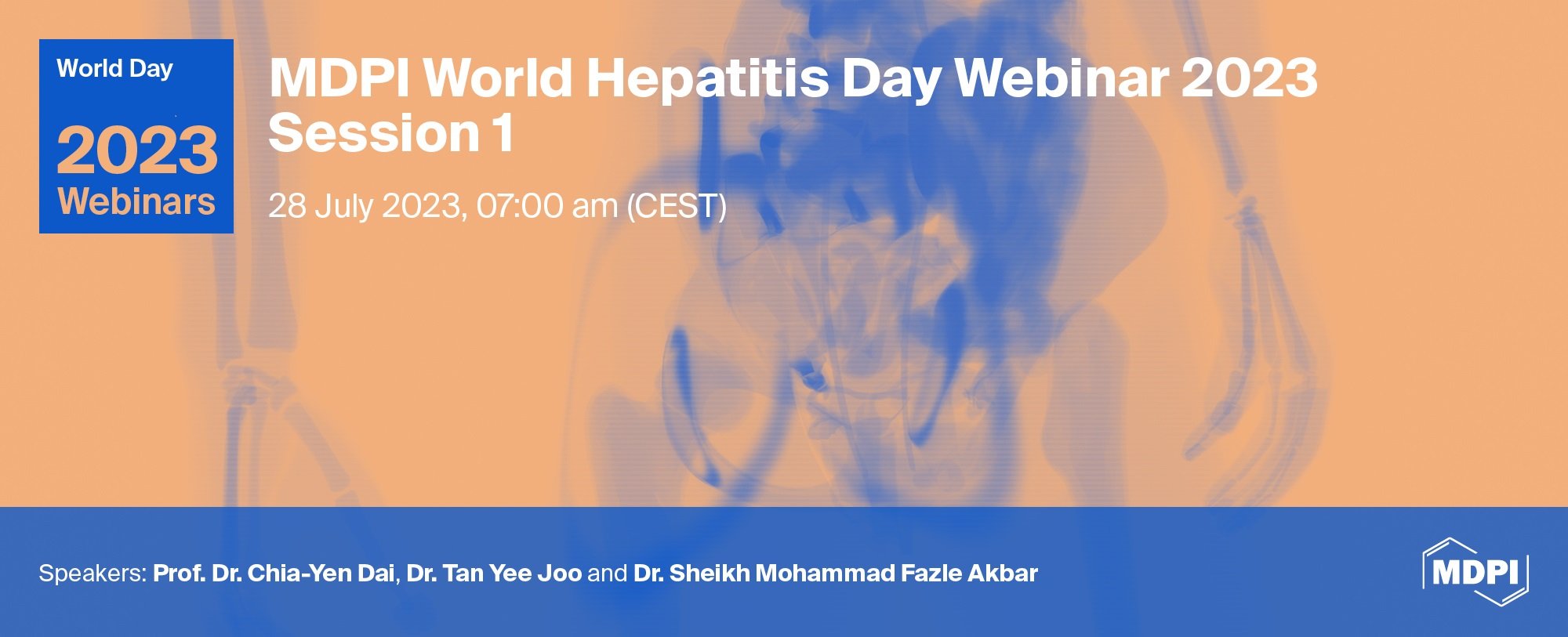
| Speaker/Presentation |
| Introduction |
| Prof. Dr. Chia-Yen Dai Achieving Elimination of Hepatitis C in Taiwan |
| Dr. Tan Yee Joo Understanding the Functions of Hepatitis B Viral Proteins and Targeting Them in Antiviral Drug Development |
| Dr. Sheikh Mohammad Fazle Akbar Standing at the Half-Way: An Analysis of “Elimination of Hepatitis by 2030” in Developed and Developing Countries |
| Q&A Session |
You can watch the recorded webinar below:
Session 2:
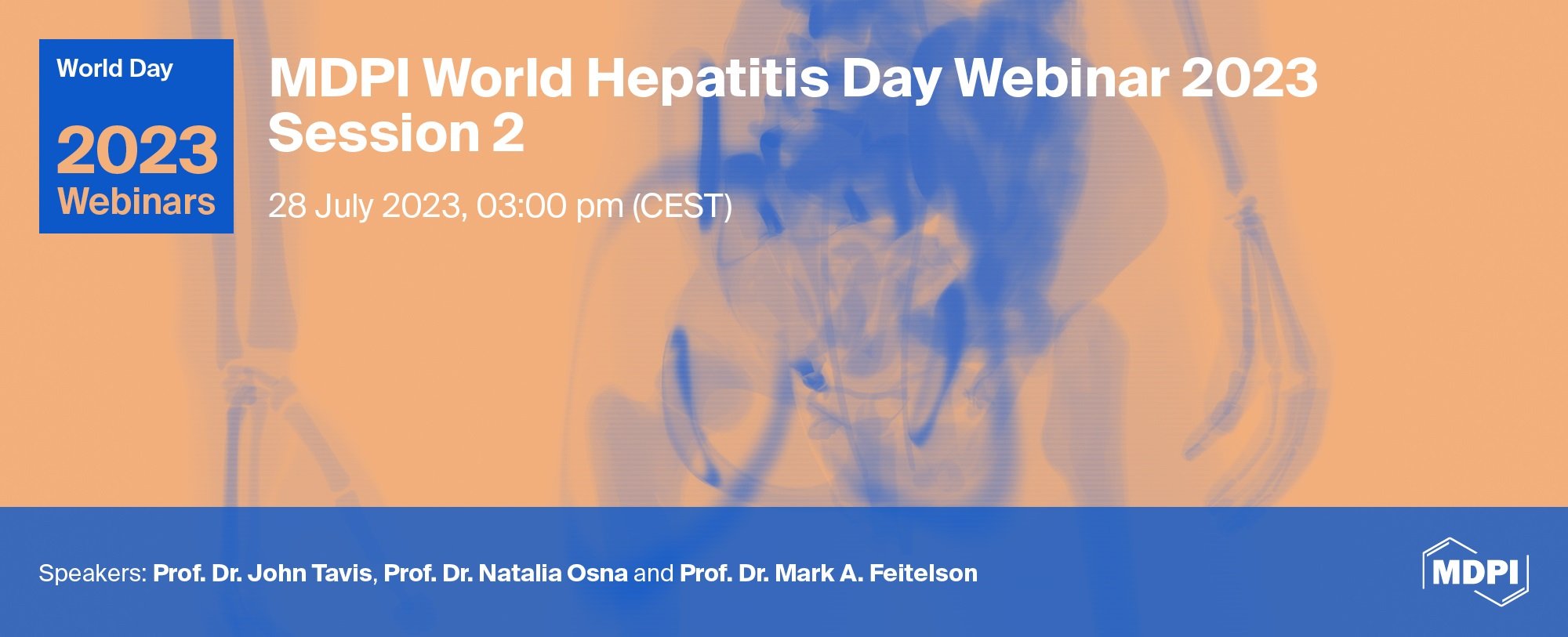
| Speaker/Presentation |
| Introduction |
| Prof. Dr. John Tavis The International Coalition to Eliminate HBV (ICE-HBV): Promoting Global Scientific Collaboration in HBV Cure Research |
| Prof. Dr. Mark A. Feitelson Microbial Metabolites that Attenuate the Pathogenesis of Cancer and Autoimmunity |
| Prof. Dr. Natalia Osna Hepatitis in HIV Infection |
| Q&A Session |
You can watch the recorded webinar below:
Relevant Special Issues:
Pathogens
“Research on Hepatitis B Virus: Past, Present, and Future”
Edited by: Hyung Joon Yim
Submission deadline: 31 August 2023
JPM
“Novel Challenges and Therapeutic Options for Liver Diseases”
Edited by: Guido Gerken
Submission deadline: 30 September 2023
Medicina
“Viral Hepatitis Research: Updates and Challenges”
Edited by: Endrit Shahini, Antonio Giovanni Solimando and Antonella Argentiero
Submission deadline: 15 October 2023
Cells
“Non-alcoholic Steatohepatitis (NASH) and Liver Fibrosis: Molecular and Multicellular Control of Evolving Diseased States”
Edited by: Jérôme Eeckhoute
Submission deadline: 15 February 2024
Diagnostics
“Diagnosis and Management of Liver Diseases—2nd Edition”
Edited by: Jeong-Ju Yoo
Submission deadline: 30 September 2023
Vaccines
“Vaccination and Treatments against Viral Hepatitis: Achievements, Challenges and Perspectives”
Edited by: Bárbara Vieira Do Lago and Vinicius M. Mello
Submission deadline: 15 October 2023
27 July 2023
MDPI Insights: The CEO’s Letter #2 - Open Peer-Review and IJERPH

Welcome to the MDPI Insights: The CEO's Letter.
In these monthly letters, I will showcase two key aspects of our work at MDPI: our commitment to empowering researchers and our determination to facilitating open scientific exchange.
Opening Thoughts

Open Peer Review Reports
Continuing the topic of openness from my inaugural monthly CEO letter, in these Opening Thoughts, I highlight the growth and importance of open peer-review reports at MDPI. Open peer reports align with the principles of open science, making the publishing process more transparent and facilitating rigorous peer review.
MDPI journals operate an open peer-review option by default, allowing authors to publish review reports and author responses (often referred to as open reports) together with the published paper. Publishing the reviewer reports and author responses together with the article provides greater transparency and trust for readers, as this allows them to track the editorial decision-making process. Open peer-review also encourages reviewers and editors to provide high-quality comments, as these will be made public if the article is accepted for publication.
Start and Growth of Open Peer Review at MDPI
The MDPI journal Life was a pioneer in offering this opportunity to its authors in 2014. The first MDPI article with peer-review reports openly published was a review by the Nobel Laureate Werner Arber, in which the review reports were published as supplementary material. By 2018, open peer-review was available across all MDPI journals. As such, MDPI authors have embraced the open peer-review model, providing a steady increase in the number of MDPI articles. As of 2023, approximately one-third (34.0%) of MDPI articles were published with open review reports.
As at July 2023, the percentage of MDPI articles published with open peer review has increased to 36.2% of the total papers published in 2023 so far, indicating ongoing growth in adoption.
Open peer review continues to play a critical role in the assessment of the peer-review process in Life. For further insights, please see the recent editorial by Dr. Pabulo Henrique Rampelotto, the former Editor-in-Chief of Life, who spearheaded the implementation of the open peer-review process.
Benefits of Open Peer Review
The benefits of open peer review include increased transparency, trust and constructive feedback. To promote open communication further and increase the robustness of the peer-review process, we encourage reviewers to sign their reports so that their name appears on the review report (this process is referred to as open identity). The default option is for reviewers to remain anonymous; however, by signing the reports, reviewers receive direct credit for their contribution to the peer-review process and show their commitment towards open science.
As the leading open access publisher, MDPI remains committed to promoting open peer-review and encourages authors to choose this approach. Our goal is to provide a rigorous and transparent peer-review process that benefits the scientific community, and we believe that open peer-review is a vital step in fostering openness and collaboration in scientific communication.
Impactful Research

MDPI Papers Cited in the News – IJERPH edition
Every month, our corporate marketing team compiles data from Altmetrics to create a list of MDPI papers that have been cited in the news. This list continues to grow as renowned news outlets regularly reference research published by MDPI in their articles.
During 2022, a total of 111,965 MDPI research papers were mentioned in prominent news outlets such as National Geographic, The Washington Post, Forbes, The Guardian, the BBC, CNN, Time, and Harvard Business Review.
Highly Cited Journal Publications
IJERPH, known for publishing impactful research, received the most news mentions among all MDPI journals in 2022, based on Altmetrics data:
- International Journal of Environmental Research and Public Health: 3509 mentions
- Nutrients: 2698 mentions
- International Journal of Molecular Sciences: 1701 mentions
- Journal of Clinical Medicine: 1131 mentions
- Viruses: 1111 mentions
These numbers show the recognition and impact of the articles published in IJERPH. For a more detailed view of the journal’s most cited and viewed papers, you can visit here. In total, IJERPH has garnered over 28,000 mentions in prominent news outlets, and as at July 2023, an impressive count of over 17,000 papers cited 10 times or more. These figures highlight the impactful contribution of IJERPH publications to the scientific community.
Example of Recent Mentions
During May and June 2023, a noteworthy selection of articles from IJERPH was cited in news articles, including:
The Washington Post: “Bringing nature inside can improve your health. Here’s how to do it.”
IJERPH paper: “Physiological Benefits of Viewing Nature: A Systematic Review of Indoor Experiments”
Harvard Business Review: “How to Take Better Breaks at Work, According to Research”
IJERPH paper: “Canine-Assisted Therapy Improves Well-Being in Nurses”
National Geographic: “Lyme disease is spreading fast—but a vaccine may be on the way”
IJERPH paper: “Range Expansion of Tick Disease Vectors in North America: Implications for Spread of Tick-Borne Disease”
Inside MDPI

MDPI Develops an Artificial Intelligence Tool to Enhance the Peer-Review Process
At MDPI, we believe that rigorous peer-review is the corner-stone of high-quality academic publishing. We are grateful to the scholars who generously dedicate their time to peer-review articles submitted to MDPI journals. Their contributions are invaluable to the advancement of science.
Peer-review is a critical part of the publication process, ensuring that MDPI upholds the highest quality standards for the papers we publish. Every manuscript submitted to our journals undergoes a comprehensive peer-review process conducted by subject-matter experts.
To further enhance our peer-review process, our Data Analytics team has developed an Artificial Intelligence (AI) tool designed to support the selection of reviewers. This proprietary tool utilizes Natural Language Processing (NLP), a specially designed AI language model, to extract information from the title and abstract of submitted papers. It then searches our database for similar manuscripts and suggests potential reviewers based on this analysis. Integrated with MDPI's submission system (SuSy), the AI tool cross-references the suggested candidates with our reviewer database to verify their invitation status and availability.
The goal of this tool is to provide better targeted peer-review invitations, reducing the number of emails sent for each paper and increasing the efficiency of our editorial staff.
In the near future, our Data Analytics team plans to deploy similar AI projects to improve other critical aspects of our services, offering an enhanced experience to our authors and readers.
Click here to learn about MDPI’s review process, including procedures, responsibilities, and benefits.
Read more:
Coming Together for Science
The Future of IJERPH

On 5 July 2023, Prof. Dr. Paul B. Tchounwou, the founding Editor-in-Chief of IJERPH, along with five Section Editors in Chief (Prof. Dr. Germán Vicente-Rodríguez, Prof. Dr. Karl Goodkin, Prof. Dr. William A. Toscano, Prof. Dr. Jimmy T. Efird, and Prof. Dr. William Douglas Evans), gathered in Basel to discuss the future of the journal. The meeting provided an opportunity to address the recent decision by The Web of Science to delist IJERPH due to the journal failing the Content Relevance criterion, and propose best strategies that will ensure high scientific rigor as well as a clear scope and aim of IJERPH, going forward.
While the delisting is disappointing for IJERPH, as well as for our authors, academic editors, and the entire scientific community supporting our journal, we see it as an opportunity to reflect and prepare for the future direction of the journal.
Since its launch in 2004, IJERPH’s vision and mission have evolved to be more complete and comprehensive in engaging scientific communities. In light of this, we will refresh the journal’s aims and scope, ensuring they align with the organic expansion of IJERPH. Additionally, we will restructure the journal sections into broader categories, encouraging collaborative research and transdisciplinary approaches for authors. This is designed to foster collaboration and knowledge exchange among diverse fields, contributing to a holistic understanding of health promotion and disease prevention. We are confident that these next steps will enhance the scientific strength and societal impact of our journal.

Journal Achievements
In addition to the productive discussions, we took the time to celebrate some of the remarkable achievements of IJERPH, which I highlight below:
- Founded by Prof. Dr. Paul B. Tchounwou in 2004
- Indexed in PubMed in 2008
- Received its first Impact Factor in 2012
- Published its 5000th paper in 2017
- Over 60,000 papers published as at June 30, 2023
- 131,628,173 paper views in 2018–2022
- Over 28,000 mentions in prominent news outlets
- 17,000 papers cited 10 times or more as at June 30, 2023
- No.1 journal in the 2022 Google Scholar Metrics in the category of Public Health
- Awarded several editions of Young Investigator Awards, Travel Awards, and Outstanding Reviewer Awards since 2018.
These achievements showcase the journal’s significant contributions to the field and its impact on global health. We are proud of the exceptional work accomplished by the IJERPH team and look forward to building upon this success in the years to come.
Closing Thoughts
MDPI’s Impact in Spain

During the past month, I had the opportunity to visit our new office building in Barcelona, where I met with our local colleagues to discuss the ways we serve the scholarly community, particularly in Spain. The multi-functional office plays a vital role in supporting various business needs, including editorial, design, conference management, data analytics, journal relationship management, publishing partnerships, and collaborations with societies.
Spain holds a significant position in MDPI’s global market, ranking as the fourth-largest contributor to the total number of papers published by MDPI as at July 2023, ranking next to Italy, the USA, and China, with Germany completing the top five.
The Numbers
Out of the 1,680,000 total MDPI articles published as at 25 July, almost 80,000 articles are contributed by Spanish authors, representing nearly 40,000 unique authors affiliated with Spanish institutions. Remarkably, over 6,300 of these authors hold editorial board member (EBM) positions within MDPI journals, with 30 of them serving as Editors-in-Chief (EiCs).
Our commitment to working with institutions is very evident in Spain, where we have successfully established over 40 Institutional Open Access Programs (IOAP) with esteemed institutions such as the University of Barcelona, the Autonomous University of Barcelona, Pompeu Fabra University, the University of Navarre, and Complutense University of Madrid.
Over the past five years, we have successfully organized eight in-person conferences in Barcelona, attracting over 1,150 registrations, with two forthcoming events scheduled for 2024. Barcelona's excellent connectivity to international airports makes it easily accessible to participants from around the world. Its welcoming atmosphere provides us with the perfect environment for knowledge-sharing, networking, and contributing to the local economy.
Our growth and presence in Spain are a true testament to the incredible service we provide to the scholarly community and the relationships we foster through responsive and collaborative communication. We look forward to continuing to support Spanish scholars, providing them a valuable and trusted experience with MDPI, the leader in open access publishing.
Testimonials
I close this letter as I did in the first edition, by sharing testimonials from our stakeholders. Here are a few IJERPH testimonials from a Spanish guest editor and an author:
Guest Editor
“I want to thank the kindness, attention and professionalism of the MDPI team throughout the editorial process of the Special Issue. I believe that it is a very professional and quality editorial process.”
- Professor Víctor Arufe-Giráldez, University of A Coruña
Special Issue in International Journal of Environmental Research and Public Health: Physical Activity in Childhood and Adolescence
Special Issue in International Journal of Environmental Research and Public Health: Physical Education: Present and Future
__
Author
“I want to thank the rigor of the revisions made to the manuscripts to improve their quality, the support to the authors for the editor assignment system they have and the follow-up they carry out, for the speed in answering and in carrying out the entire process of the revision, and for doing all this at an affordable price.”
- Dr. María Paz García-Caro, University of Granada
Article in International Journal of Environmental Research and Public Health: Factors Associated with Suicide Attempts and Suicides in the General Population of Andalusia (Spain)
Chief Executive Officer
MDPI AG
26 July 2023
Meet Us at the 45th Congress of the Spanish Society of Biochemistry and Molecular Biology (SEBBM 2023), 5–8 September 2023, Zaragoza, Spain
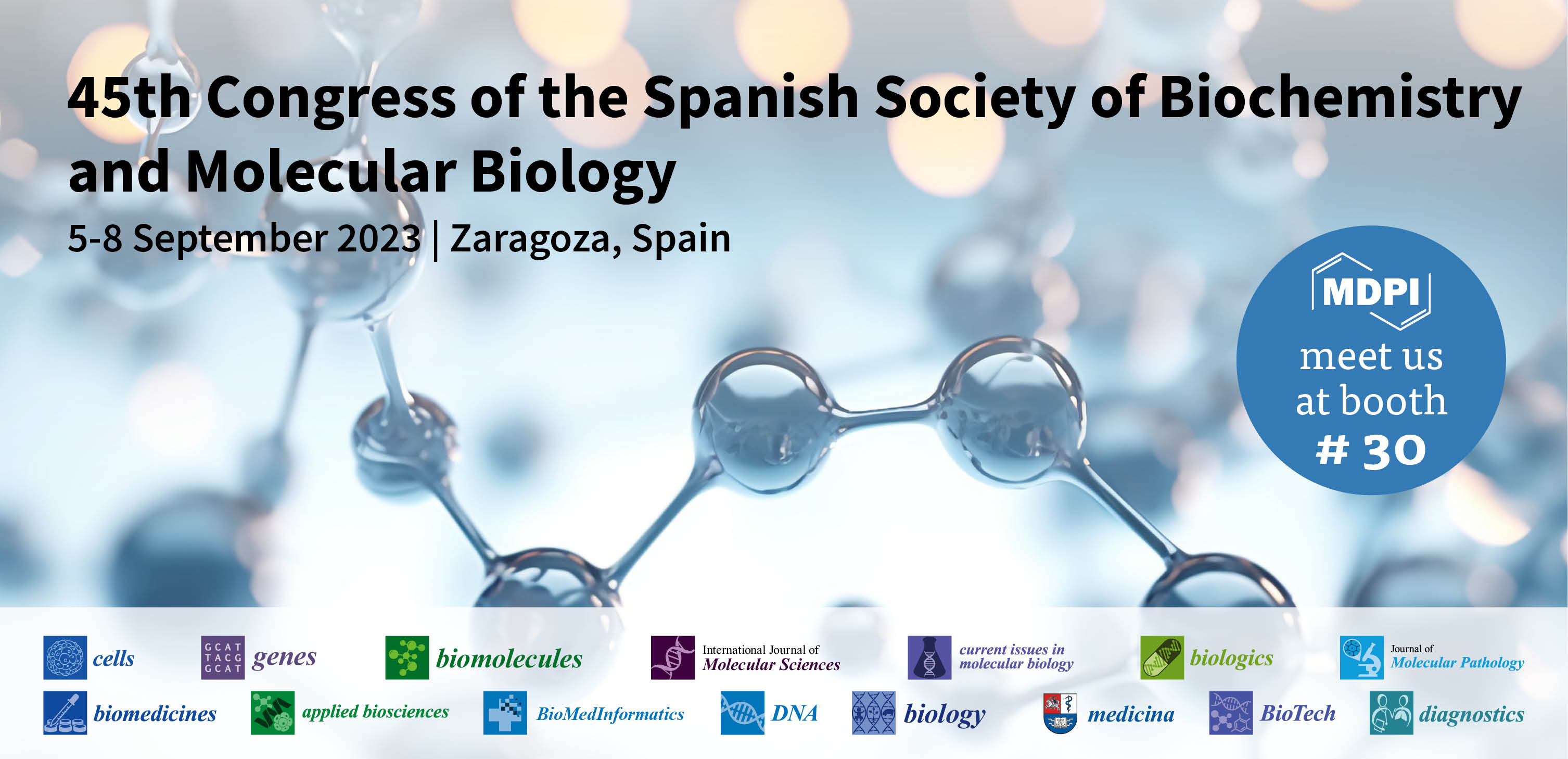
Conference: The 45th Congress of the Spanish Society of Biochemistry and Molecular Biology (SEBBM 2023)
Date: 5–8 September 2023
Place: University of Zaragoza Faculty of Medicine, Zaragoza, Spain
Booth: #30
MDPI journals will be attending the 45th Congress of the Spanish Society of Biochemistry and Molecular Biology (SEBBM 2023) as an exhibitor. This meeting will be held in Zaragoza, Spain, from 5 to 8 September 2023.
SEBBM contributed significantly to the creation of the Federation of European Biochemical Societies (FEBS) in 1964, represents Spain in the International Union of Biochemistry and Molecular Biology (IUBMB), is one of the founding members of the Confederation of Spanish Scientific Societies (COSCE) and belongs to the Spanish Association of Biocompanies (ASEBIO), which develops activities in the field of biotechnology in Spain.
The following MDPI journals will be represented:
- Genes;
- Cells;
- Biomolecules;
- IJMS;
- Biomedicines;
- Applied Biosciences;
- CIMB;
- Biomedinformatics;
- DNA;
- Biology;
- Medicina;
- BioTech;
- Biologics;
- Diagnostics;
- JMP.
If you are attending this conference, please feel free to start a conversation with us. Our delegates look forward to meeting you in person and answering any questions you may have. For more information about the conference, please visit the following website: https://www.acs.org/meetings/acs-meetings/fall-2023.html.
19 July 2023
Meet Us at Behaviour 2023, 14–20 August 2023, Bielefeld, Germany
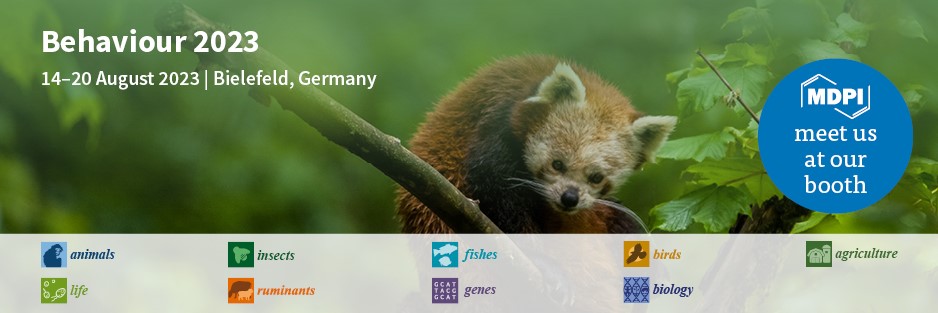
Conference: Behaviour 2023
Date: 14–20 August 2023
Location: Bielefeld, Germany
MDPI will be attending Behaviour 2023 as an exhibitor; we welcome researchers from different backgrounds to visit and share their latest ideas with us.
This conference has been organized by the International Ethological Congress. Behaviour 2023 is a multi-disciplinary and international congress that focuses on animal behavior. Delegates will come from a wide range of backgrounds: from ethology to behavioral genetics and anthropology.
The following MDPI journals will be represented:
- Animals;
- Insects;
- Fishes;
- Birds;
- Agriculture;
- Life;
- Ruminants;
- Genes;
- Biology.
If you are planning to attend this conference, please do not hesitate to contact us online. Our delegates look forward to meeting you in person and answering any questions that you may have. For more information about the conference, please visit the following website: https://www.uni-bielefeld.de/fakultaeten/biologie/forschung/veranstaltungen/behaviour2023/index.xml.
18 July 2023
Meet Us at the MDPI World Hepatitis Day Webinar 2023, 28 July 2023
The low coverage of testing and treatment is the most important gap to be addressed to achieve the global elimination goals of hepatitis B virus (HBV) by 2030.
To commemorate the World Hepatitis Day 2023, MDPI is launching a special webinar to encourage researchers to come together, take action, and highlight how the exchange of findings facilitates efforts to raise awareness of hepatitis.
We are looking forward to seeing you at the MDPI World Hepatitis Day Webinar 2023.
Conference secretariat: Ms. Shun Li
Date and time: 28 July 2023, 7:00 a.m. and 3:00 p.m., CEST
This is a free webinar. After registering, you will receive a confirmation email containing information on how to join the webinar. Registrations with academic institutional email addresses will be prioritized.
Unable to attend? Register anyway and we will let you know when the recording is available to watch.
Session 1:

| Speaker/Presentation | Time in CEST |
| Introduction | 7:00 a.m.–7:10 a.m. |
| Prof. Dr. Chia-Yen Dai Achieving Elimination of Hepatitis C in Taiwan |
7:10 a.m.–7:40 a.m. |
| Dr. Tan Yee Joo Understanding the Functions of Hepatitis B Viral Proteins and Targeting Them in Antiviral Drug Development |
7:40 a.m.–8:10 a.m. |
| Dr. Sheikh Mohammad Fazle Akbar Standing at the Half-Way: An Analysis of “Elimination of Hepatitis by 2030” in Developed and Developing Countries |
8:10 a.m.–8:40 a.m. |
| Q&A Session | 8:40 a.m.–9:00 a.m. |
Register for Session 1 for free!
Session 2:

| Speaker/Presentation | Time in CEST |
| Introduction | 3:00 p.m.–3:10 p.m. |
| Prof. Dr. John Tavis The International Coalition to Eliminate HBV (ICE-HBV): Promoting Global Scientific Collaboration in HBV Cure Research |
3.10 p.m.–3:40 p.m. |
| Prof. Dr. Mark A. Feitelson Microbial Metabolites that Attenuate the Pathogenesis of Cancer and Autoimmunity |
3:40 p.m.–4:10 p.m. |
| Prof. Dr. Natalia Osna Hepatitis in HIV Infection |
4:10 p.m.–4:40 p.m. |
| Q&A Session | 4:40 p.m.–5:00 p.m. |
Register for Session 2 for free!
Relevant Special Issues:
Pathogens
"Research on Hepatitis B Virus: Past, Present, and Future"
Edited by: Hyung Joon Yim
Submission deadline: 31 August 2023
JPM
"Novel Challenges and Therapeutic Options for Liver Diseases"
Edited by: Guido Gerken
Submission deadline: 30 September 2023
Medicina
"Viral Hepatitis Research: Updates and Challenges"
Edited by: Endrit Shahini, Antonio Giovanni Solimando and Antonella Argentiero
Submission deadline: 15 October 2023
Cells
"Non-alcoholic Steatohepatitis (NASH) and Liver Fibrosis: Molecular and Multicellular Control of Evolving Diseased States"
Edited by: Jérôme Eeckhoute
Submission deadline: 15 February 2024
Diagnostics
"Diagnosis and Management of Liver Diseases—2nd Edition"
Edited by: Jeong-Ju Yoo
Submission deadline: 30 September 2023
Vaccines
"Vaccination and Treatments against Viral Hepatitis: Achievements, Challenges and Perspectives"
Edited by: Bárbara Vieira Do Lago and Vinicius M. Mello
Submission deadline: 15 October 2023
11 July 2023
MDPI’s Newly Launched Journals in June 2023
With the first issue released in June 2023, five new MDPI journals disseminating multi-disciplinary science are due to launch, which will cover the subjects of medicine & pharmacology, biology and physical sciences.
The newly launched journals will be overseen by professional Editorial Board Members and Editors to ensure an accurate and rapid publication, rigorous peer review and broad visibility.
Please feel free to browse and discover more about the new journals below.
| Journal | Founding Editor-in-Chief | Journal topics (selected) |
| Prof. Dr. Jun Ma, Peking University, China| Editorial | view inaugural issue | growth and development; diet and nutrients; school health promotion policies and practices; child health and care; adolescent health and wellbeing | view journal scope | submit an article |
|
| Prof. Dr. Bernd Rehm, Griffith University, Australia | Editorial | view inaugural issue | DNA and gene synthesis; synthetic transcription factors; protein engineering; viral engineering; metabolic engineering | view journal scope | submit an article | |
| Prof. Dr. Varsha Gandhi, University of Texas MD Anderson Cancer Center, USA | Editorial | view inaugural issue | lymphatics; cancers associated with lymphocytes and lymphoblasts; lymphatic tissues; lymphoma; lymphoid leukemia | view journal scope | submit an article | |
| Dr. Bradley Turner, University of Melbourne, Australia | Editorial | view inaugural issue | multiple sclerosis; amyotrophic lateral sclerosis; primary lateral sclerosis; atherosclerosis; systemic sclerosis | view journal scope | submit an article | |
 |
Prof. Dr. Clemens Burda, Case Western Reserve University, USA | Editorial | view inaugural issue | Gamma ray, X-ray, and UV–Vis spectroscopies; NIR/mid-infrared/Raman spectroscopy; microwave and THz spectroscopy; high-resolution gas-phase atomic, molecular, and cluster spectroscopy; MS, NMR, and EPR spectroscopy | view journal scope | submit an article |
We wish to thank everyone who has supported the development of open access publishing. You are welcome to submit an application to the New Journal Committee (newjournal-committee@mdpi.com) if you would like to create more new journals.
3 July 2023
MDPI Insights: The CEO’s Letter #1 - Open Access and Impactful Research

Welcome to the MDPI Insights: The CEO's Letter.
In these monthly letters, I will showcase two key aspects of our work at MDPI: our commitment to empowering researchers and our determination to facilitating open scientific exchange.
Opening Thoughts
The Future is Open, and MDPI is Leading the Way
I strongly believe in a future that embraces openness, where open source, open information, and open access (OA) take center stage. This belief that led me to join MDPI in 2020, and I am honored to have recently been appointed as Chief Executive Officer (CEO). In this capacity, and operating in close liaison with Dr. Lin and MDPI’s senior management, I shall work to build on Dr. Lin’s achievements of the past quarter-century. In this role, I will focus on communication initiatives to promote MDPI's remarkable work and continue to build our company as a trusted leader in OA publishing. For over two decades, MDPI has been at the forefront of reshaping the academic publishing landscape, with OA surpassing subscription-based publishing in 2020. This trajectory is deeply rooted in our history and reflects our unwavering commitment and vision for an open future.
1 Million Published Articles
2023 began with a remarkable achievement for MDPI, as we became the first OA publisher to reach the milestone of 1 million published articles. This represents 2.7 million unique authors who have trusted us with their work, or about a third of all researchers worldwide. As the world's most cited OA publisher, we are proud in sharing these significant milestones.
Our mission remains unchanged: to make science open and accessible to all. We understand the importance of knowledge access, empowering researchers to stay at the forefront of a rapidly changing world. Our diverse range of journals covers a wide spectrum of disciplines, offering cutting-edge insights, trusted tools, and crucial knowledge to address global challenges.
Liberating Science
As the world’s leading OA publisher, MDPI is actively liberating science. We are committed to eliminating the frustrations researchers and the general public face when accessing information, ensuring it is not locked behind paywalls. We firmly believe that everyone has a right to information, and our commitment to open access publishing drives our work.
In this inaugural edition of Insights: The CEO's Letter, I draw inspiration from the upcoming 20th anniversary of the Berlin Declaration on Open Access. Its stated mission reminds us that true impact is achieved when knowledge is widely and readily available to society:
"Our mission of disseminating knowledge is only half complete if the information is not made widely and readily available to society”
Impactful Research

MDPI Publishes Impactful Research: Recognized by Leading Indexing Databases
MDPI journals are indexed in every single top database in the world.
As of June 2023, we have 214 journals indexed within Web of Science, 223 indexed within Scopus, 87 indexed within PubMed and PMC, and 17 indexed within MEDLINE, and these numbers increase every month. We constantly strive to expand the coverage of our journals within leading multi-disciplinary and scope-specific databases, resulting in an incredibly broad range of journals that are indexed within a variety of databases. MDPI has active relationships with approximately 65 well-known databases around the world, and we continue to expand our portfolio every year so that your work can be found, cited, and referenced with ease.
Continued Growth of MDPI Journals
The 2022 Scopus and Web of Science journal citation metrics were officially released in June, and I am pleased to report that 31 MDPI journals received their first CiteScore, taking the total number of journals with a CiteScore to 216. The number of MDPI journals receiving an Impact Factor (IF) also continues to grow with 111 receiving their first, by being covered in the ESCI, bringing our total number of journals with an IF to 208 of which 41 journals received an IF above 4.0. Looking at 2022 CiteScores in the Scopus database, 80% of MDPI journals have a score that ranks them in Q1 or Q2 in at least one subject category.
Publishing impactful science would not be possible without all of our authors, editors and reviewers. Thank you for your contribution and continued support! Together we share the latest scientific insights faster and ensure that your work is accessible to all.
Read more
Inside MDPI

Preprints.org: Clarivate adds the Preprint Citation Index to the Web of Science
At MDPI, we are dedicated to driving the advancement of science. Through our initiative, Preprints.org, researchers can publish their work and gain valuable feedback from the broader research community, ensuring rapid progress in their respective fields. This is particularly crucial during times of health and climate challenges, where timely dissemination of findings is essential.
Increased Visibility for Preprints
I am pleased to share that Clarivate recognizes the significance of preprints and has taken a crucial step to enhance their visibility. Clarivate has added the Preprint Citation Index to the Web of Science, encompassing preprints published not only on Preprints.org but also on other reputable repositories.
Looking ahead, the future of preprints appears promising, bolstered by the recent indexing announcement from the Web of Science. As a result, preprints will receive increased visibility, serving as a valuable resource for staying informed about the latest research developments.
Read more
What are Preprints?
The Pros and Cons of Preprints
Preprints and COVID-19
Preprints—The Future of Open Access Publishing?
Coming Together for Science

The First International Conference on Antioxidants: Sources, Methods, Health Benefits and Industrial Applications
In this edition of ‘Coming Together for Science,’ I am pleased to highlight the First International Conference on Antioxidants organized by our conference team in the beautiful city of Barcelona, Spain. The conference attracted over 130 attendees, who engaged in 42 talks, and 89 poster presentations spread across several sessions.
Working Together
Under the leadership of Prof. Dr. Alessandra Napolitano (Department of Chemical Sciences, University of Naples ‘Federico II’, Naples, Italy) and Prof. Dr. Rosa M. Lamuela Raventos (Department of Nutrition, Food Sciences and Gastronomy, University of Barcelona, Spain) as chairs, and supported by the committee members, 10 invited keynote speakers, poster presenters, and all the attendees, this dedicated group of academics came together to discuss the natural sources, methodologies, health benefits, and industrial applications of antioxidants.
Especially noteworthy is the positive feedback received from attendees, with 94% rating the overall organization of the conference as good or excellent. I particularly love the picture above, capturing the gathering of some of the participants. You can browse through more photos in the event gallery located here.
Managing Events With Sciforum
If you are considering hosting your own academic event, I highly recommend checking out Sciforum, MDPI's event management platform. Sciforum simplifies the entire process, making it easy to host your own event by allowing you to focus on what really matters: Science!
Read more
Closing Thoughts
 Stefan Tochev, Dr. Shu-Kun Lin, Dr. Eric O. Freed, Peter Roth, Wynne Wang, Allison Yang
Stefan Tochev, Dr. Shu-Kun Lin, Dr. Eric O. Freed, Peter Roth, Wynne Wang, Allison Yang
Viruses and Editorial Quality: Acknowledging the Dedication of our Viruses Journal Team
During a June meeting with Dr. Eric O. Freed, the founding and current Editor-in-Chief of our journal Viruses, I was reminded of the exceptional dedication of our editorial board. Meeting with Eric is a pleasure, as he has a strong commitment and clear vision for the journal. Over the course of two days, we gained a deep understanding of the journal’s expectations and focus on strategic growth, editorial board representation, and engagement.
I am pleased to share that Viruses holds a CiteScore of 7.1 (an increase of 7.57% versus the 2021 metric) and an Impact Factor of 4.7. You can view the journal statistics here. Viruses publishes highly cited papers, and is indexed in renowned databases such as Scopus, SCIE (Web of Science), PubMed, and others, and maintains affiliations with prestigious societies. Moreover, the Viruses team has recently announced an exciting upcoming event titled ‘Viruses 2024 – A World of Viruses,’ scheduled to take place in Barcelona, Spain, from 14–16 February 2024.
Testimonials
If you notice my enthusiasm regarding our editorial service, it’s because the surveys and testimonials we receive speak volumes about the experiences of our authors, reviewers, and guest editors who collaborate with MDPI. The purpose of these letters is to highlight the exceptional work that we do and the experiences we create for the scholars – thus, let me end with this testimonial from an author:
“It was a great pleasure to publish in Viruses Special Issue [Emerging Viruses in Aquaculture]. The submission process was easy. Guest editors were very helpful and provided all the guidance and support as needed. The handling of the manuscript by the Editorial Team was very fast, efficient, and professional. The reviewer’s comments were insightful, and the publication processes were remarkably rapid.”
– Ms. Magdalena Stachnik, Państwowy Instytut Weterynaryjny | PIWet
Article in Viruses: Emerging Viral Pathogens in Sturgeon Aquaculture in Poland: Focus on Herpesviruses and Mimivirus Detection
Chief Executive Officer
MDPI AG
28 June 2023
2022 Impact Factors for MDPI Journals
The 2022 citation metrics have been released in the Journal Citation Reports (JCR), and we’re pleased to announce the following results for MDPI journals:

We are thrilled to announce that 90% of our ranked MDPI journals, specifically 86 out of 96 (captured in the table below), are performing above average in Q1 or Q2. This year, Clarivate has expanded its Impact Factor (IF) awards to include journals in the Emerging Sources Citation Index (ESCI) and the Arts and Humanities Citation Index (AHCI), providing greater transparency for the full set of journals indexed in the Web of Science Core Collection. As a result, 111 of MDPI journals have received their first IF in 2023, with 37 journals surpassing an IF of 3.0. In total, 208 MDPI journals have been honored with an IF.
Clarivate explains that by "expanding the coverage but holding to highly selective standards, the [Impact Factor] is now a reliable indicator of trustworthiness, as well as a measure of scholarly impact, at the journal level."
Please visit our blog post where we discuss the release of the latest citation metrics with our Indexing Manager, Dr. Constanze Schelhorn, to find out what's different this time around and how to make use of different metrics available.
| Journal | Impact Factor | Rank Quartile | Category |
| Vaccines | 7.8 | Q1 | Immunology |
| Medicine, Research & Experimental | |||
| Antioxidants | 7.0 | Q1 | Food Science & Technology |
| Biochemistry & Molecular Biology | |||
| Chemistry, Medicinal | |||
| Cells | 6.0 | Q2 | Cell Biology |
| Nutrients | 5.9 | Q1 | Nutrition & Dietetics |
| International Journal of Molecular Sciences | 5.6 | Q1 | Biochemistry & Molecular Biology |
| Q2 | Chemistry, Multidisciplinary | ||
| Journal of Theoretical and Applied Electronic Commerce Research | 5.6 | Q2 | Business |
| Biomolecules | 5.5 | Q1 | Biochemistry & Molecular Biology |
| Biosensors | 5.4 | Q1 | Chemistry, Analytical |
| Instruments & Instrumentation | |||
| Q2 | Nanoscience & Nanotechnology | ||
| Fractal and Fractional | 5.4 | Q1 | Mathematics, Interdisciplinary Applications |
| Marine Drugs | 5.4 | Q1 | Chemistry, Medicinal |
| Pharmacology & Pharmacy | |||
| Pharmaceutics | 5.4 | Q1 | Pharmacology & Pharmacy |
| Nanomaterials | 5.3 | Q1 | Physics, Applied |
| Q2 | Chemistry, Multidisciplinary | ||
| Materials Science, Multidisciplinary | |||
| Nanoscience & Nanotechnology | |||
| Cancers | 5.2 | Q2 | Oncology |
| Foods | 5.2 | Q1 | Food Science & Technology |
| Polymers | 5.0 | Q1 | Polymer Science |
| Remote Sensing | 5.0 | Q1 | Geosciences, Multidisciplinary |
| Q2 | Remote Sensing | ||
| Imaging Science & Photographic Technology | |||
| Environmental Sciences | |||
| Antibiotics | 4.8 | Q1 | Pharmacology & Pharmacy |
| Q2 | Infectious Diseases | ||
| Drones | 4.8 | Q2 | Remote Sensing |
| Journal of Functional Biomaterials | 4.8 | Q2 | Engineering, Biomedical |
| Materials Science, Biomaterials | |||
| Biomedicines | 4.7 | Q1 | Pharmacology & Pharmacy |
| Q2 | Biochemistry & Molecular Biology | ||
| Medicine, Research & Experimental | |||
| Journal of Fungi | 4.7 | Q2 | Mycology |
| Microbiology | |||
| Viruses | 4.7 | Q2 | Virology |
| Bioengineering | 4.6 | Q2 | Engineering, Biomedical |
| Gels | 4.6 | Q1 | Polymer Science |
| Molecules | 4.6 | Q2 | Chemistry, Multidisciplinary |
| Biochemistry & Molecular Biology | |||
| Pharmaceuticals | 4.6 | Q2 | Pharmacology & Pharmacy |
| Chemistry, Medicinal | |||
| Toxics | 4.6 | Q1 | Toxicology |
| Q2 | Environmental Sciences | ||
| Biomimetics | 4.5 | Q1 | Engineering, Multidisciplinary |
| Q2 | Materials Science, Biomaterials | ||
| Microorganisms | 4.5 | Q2 | Microbiology |
| Plants | 4.5 | Q1 | Plant Sciences |
| Biology | 4.2 | Q2 | Biology |
| Chemosensors | 4.2 | Q2 | Instruments & Instrumentation |
| Chemistry, Analytical | |||
| Electrochemistry | |||
| Membranes | 4.2 | Q2 | Engineering, Chemical |
| Materials Science, Multidisciplinary | |||
| Chemistry, Physical | |||
| Polymer Science | |||
| Toxins | 4.2 | Q1 | Toxicology |
| Q2 | Food Science & Technology | ||
| Metabolites | 4.2 | Q2 | Biochemistry & Molecular Biology |
| Batteries | 4.0 | Q2 | Electrochemistry |
| Materials Science, Multidisciplinary | |||
| Q3 | Energy & Fuels | ||
| Catalysts | 3.9 | Q2 | Chemistry, Physical |
| Journal of Clinical Medicine | 3.9 | Q2 | Medicine, General & Internal |
| Land | 3.9 | Q2 | Environmental Studies |
| Sensors | 3.9 | Q2 | Instruments & Instrumentation |
| Chemistry, Analytical | |||
| Engineering, Electrical & Electronic | |||
| Sustainability | 3.9 | Q2 | Environmental Sciences (SCIE) |
| Environmental Studies (SSCI) | |||
| Q3 | Green & Sustainable Science & Technology (SCIE) | ||
| Green & Sustainable Science & Technology (SSCI) | |||
| Buildings | 3.8 | Q2 | Construction & Building Technology |
| Engineering, Civil | |||
| Agronomy | 3.7 | Q1 | Agronomy |
| Q2 | Plant Sciences | ||
| Fermentation | 3.7 | Q2 | Biotechnology & Applied Microbiology |
| Pathogens | 3.7 | Q2 | Microbiology |
| Agriculture | 3.6 | Q1 | Agronomy |
| Diagnostics | 3.6 | Q2 | Medicine, General & Internal |
| Genes | 3.5 | Q2 | Genetics & Heredity |
| Journal of Intelligence | 3.5 | Q2 | Psychology, Multidisciplinary |
| Lubricants | 3.5 | Q2 | Engineering, Mechanical |
| Processes | 3.5 | Q2 | Engineering, Chemical |
| Coatings | 3.4 | Q2 | Materials Science, Coatings & Films |
| Physics, Applied | |||
| Q3 | Materials Science, Multidisciplinary | ||
| ISPRS International Journal of Geo-Information | 3.4 | Q2 | Geography, Physical |
| Q3 | Computer Science, Information Systems | ||
| Remote Sensing | |||
| Materials | 3.4 | Q2 | Metallurgy & Metallurgical Engineering |
| Physics, Applied | |||
| Physics, Condensed Matter | |||
| Q3 | Materials Science, Multidisciplinary | ||
| Chemistry, Physical | |||
| Micromachines | 3.4 | Q2 | Instruments & Instrumentation |
| Physics, Applied | |||
| Chemistry, Analytical | |||
| Q3 | Nanoscience & Nanotechnology | ||
| Water | 3.4 | Q2 | Water Resources |
| Environmental Sciences | |||
| Brain Sciences | 3.3 | Q3 | Neurosciences |
| Energies | 3.2 | Q3 | Energy & Fuels |
| Fire | 3.2 | Q1 | Forestry |
| Q2 | Ecology | ||
| Life | 3.2 | Q2 | Biology |
| Current Issues in Molecular Biology | 3.1 | Q3 | Biochemistry & Molecular Biology |
| Horticulturae | 3.1 | Q1 | Horticulture |
| Animals | 3.0 | Q1 | Agriculture, Dairy & Animal Science |
| Veterinary Sciences | |||
| Insects | 3.0 | Q1 | Entomology |
| Atmosphere | 2.9 | Q3 | Meteorology & Atmospheric Sciences |
| Environmental Sciences | |||
| Electronics | 2.9 | Q2 | Engineering, Electrical & Electronic |
| Physics, Applied | |||
| Q3 | Computer Science, Information Systems | ||
| Forests | 2.9 | Q1 | Forestry |
| Inorganics | 2.9 | Q2 | Chemistry, Inorganic & Nuclear |
| Journal of Marine Science and Engineering | 2.9 | Q1 | Engineering, Marine |
| Q2 | Oceanography | ||
| Engineering, Ocean | |||
| Metals | 2.9 | Q2 | Metallurgy & Metallurgical Engineering |
| Q3 | Materials Science, Multidisciplinary | ||
| Tropical Medicine and Infectious Disease | 2.9 | Q2 | Tropical Medicine |
| Parasitology | |||
| Q3 | Infectious Diseases | ||
| Universe | 2.9 | Q2 | Astronomy & Astrophysics |
| Physics, Particles & Fields | |||
| Healthcare | 2.8 | Q2 | Health Policy & Services (SSCI) |
| Q3 | Health Care Sciences & Services (SCIE) | ||
| Applied Sciences | 2.7 | Q2 | Engineering, Multidisciplinary |
| Physics, Applied | |||
| Q3 | Chemistry, Multidisciplinary | ||
| Materials Science, Multidisciplinary | |||
| Crystals | 2.7 | Q2 | Crystallography |
| Q3 | Materials Science, Multidisciplinary | ||
| Entropy | 2.7 | Q2 | Physics, Multidisciplinary |
| Magnetochemistry | 2.7 | Q2 | Chemistry, Inorganic & Nuclear |
| Q3 | Chemistry, Physical | ||
| Materials Science, Multidisciplinary | |||
| Symmetry | 2.7 | Q2 | Multidisciplinary Sciences |
| Actuators | 2.6 | Q2 | Instruments & Instrumentation |
| Engineering, Mechanical | |||
| Aerospace | 2.6 | Q1 | Engineering, Aerospace |
| Behavioral Sciences | 2.6 | Q2 | Psychology, Multidisciplinary |
| Current Oncology | 2.6 | Q3 | Oncology |
| Machines | 2.6 | Q2 | Engineering, Mechanical |
| Q3 | Engineering, Electrical & Electronic | ||
| Medicina | 2.6 | Q3 | Medicine, General & Internal |
| Separations | 2.6 | Q3 | Chemistry, Analytical |
| Minerals | 2.5 | Q2 | Mining & Mineral Processing |
| Mineralogy | |||
| Geochemistry & Geophysics | |||
| Children | 2.4 | Q2 | Pediatrics |
| Diversity | 2.4 | Q2 | Biodiversity Conservation |
| Q3 | Ecology | ||
| Journal of Cardiovascular Development and Disease | 2.4 | Q3 | Cardiac & Cardiovascular Systems |
| Mathematics | 2.4 | Q1 | Mathematics |
| Photonics | 2.4 | Q3 | Optics |
| Veterinary Sciences | 2.4 | Q1 | Veterinary Sciences |
| Fishes | 2.3 | Q2 | Marine & Freshwater Biology |
| Fisheries | |||
| Axioms | 2.0 | Q2 | Mathematics, Applied |
| Systems | 1.9 | Q2 | Social Sciences, Interdisciplinary |
| Tomography | 1.9 | Q3 | Radiology, Nuclear Medicine & Medical Imaging |
Note: The Journal of Personalized Medicine's Impact Factor was omitted in the original release and will be assigned separately. Please find the data on the journal webpage in due course.
Source: 2022 Journal Impact Factors, Journal Citation Reports TM (Clarivate, 2023)
27 June 2023
Biology | Top Cited Papers in 2021–2022
1. “The Unfolded Protein Response: An Overview”
by Adam Read and Martin Schröder
Biology 2021, 10(5), 384; https://doi.org/10.3390/biology10050384
Available online: https://www.mdpi.com/2079-7737/10/5/384
2. “Reactive Oxygen Species, Antioxidant Responses and Implications from a Microbial Modulation Perspective”
by Peiman Zandi and Ewald Schnug
Biology 2022, 11(2), 155; https://doi.org/10.3390/biology11020155
Available online: https://www.mdpi.com/2079-7737/11/2/155
3. “Genomic Selection for End-Use Quality and Processing Traits in Soft White Winter Wheat Breeding Program with Machine and Deep Learning Models”
by Karansher Singh Sandhu, Meriem Aoun, Craig F. Morris and Arron H. Carter
Biology 2021, 10(7), 689; https://doi.org/10.3390/biology10070689
Available online: https://www.mdpi.com/2079-7737/10/7/689
4. “Toward a Better Testing Paradigm for Developmental Neurotoxicity: OECD Efforts and Regulatory Considerations”
by Magdalini Sachana, Timothy J. Shafer and Andrea Terron
Biology 2021, 10(2), 86; https://doi.org/10.3390/biology10020086
Available online: https://www.mdpi.com/2079-7737/10/2/86
5. “A Layered View on Focal Adhesions”
by Karin Legerstee and Adriaan B. Houtsmuller
Biology 2021, 10(11), 1189; https://doi.org/10.3390/biology10111189
Available online: https://www.mdpi.com/2079-7737/10/11/1189
6. “Tomatoes: An Extensive Review of the Associated Health Impacts of Tomatoes and Factors That Can Affect Their Cultivation”
by Edward J. Collins, Cressida Bowyer, Audrey Tsouza and Mridula Chopra
Biology 2022, 11(2), 239; https://doi.org/10.3390/biology11020239
Available online: https://www.mdpi.com/2079-7737/11/2/239
7. “Overview and Update on Extracellular Vesicles: Considerations on Exosomes and Their Application in Modern Medicine”
by Maria Antonietta Di Bella
Biology 2022, 11(6), 804; https://doi.org/10.3390/biology11060804
Available online: https://www.mdpi.com/2079-7737/11/6/804
8. “Blood Performance: A New Formula for Fish Growth and Health”
by Moha Esmaeili
Biology 2021, 10(12), 1236; https://doi.org/10.3390/biology10121236
Available online: https://www.mdpi.com/2079-7737/10/12/1236
9. “Chronic Toxicity of Primary Metabolites of Chloroacetamide and Glyphosate to Early Life Stages of Marbled Crayfish Procambarus virginalis”
by Nikola Tresnakova, Jan Kubec, Alzbeta Stara, Eliska Zuskova, Caterina Faggio, Antonin Kouba and Josef Velisek
Biology 2022, 11(6), 927; https://doi.org/10.3390/biology11060927
Available online: https://www.mdpi.com/2079-7737/11/6/927
10. “The Role of TLR2 in Infectious Diseases Caused by Mycobacteria: From Cell Biology to Therapeutic Target”
by Wanbin Hu and Herman P. Spaink
Biology 2022, 11(2), 246; https://doi.org/10.3390/biology11020246
Available online: https://www.mdpi.com/2079-7737/11/2/246
7 June 2023
Welcoming New Editorial Board Members of Biology
We are pleased to announce that five new scholars were appointed Editorial Board Members (EBMs) of the journal Biology (ISSN: 2079-7737) in May 2023.
| Name | Section | Affiliation |
| Dr. Simona Panni | “Bioinformatics” | Università della Calabria, Italy |
| Dr. Olivier White | “Biophysics” | Université de Bourgogne, France |
| Dr. Carla Lintas | “Genetics and Genomics” | Università Campus Bio-Medico, Italy |
| Dr. Sven Würtz | “Conservation Biology and Biodiversity” | Leibniz Institute of Freshwater Ecology and Inland Fisheries, Germany |
| Dr. Nadine Lemaître | “Infection Biology” | Université de Picardie Jules Verne, France |
Further details about the Editorial Board can be found at the following link: https://www.mdpi.com/journal/biology/editors.
We wish our new members every success in both their research and the development of the journal.
Additionally, Biology is recruiting prestigious scholars worldwide to join our Editorial Board. To apply for this position, recommend potential candidates, or request further information, please contact the Biology Editorial Office (biology@mdpi.com) with the following two files attached:
- A full academic CV;
- A short cover letter that details your interest in and enthusiasm for the position.
Biology Editorial Office
19 May 2023
2023 International Day for Biological Diversity

The International Day for Biological Diversity will be celebrated on 22 May 2023, under the theme “From Agreement to Action: Build Back Biodiversity”, which aims to raise awareness and understanding of biodiversity issues. Biodiversity refers to the diversity of all life forms on Earth, including genetic, species, and ecosystem diversity. Biological diversity resources are the pillars upon which we build civilizations; however, the loss of biodiversity threatens everything, including our health. We hope that the established MDPI journals on life sciences and biology, including Biology, Diversity, Fishes, Birds, Insects, Water, Forests, Grasses, Life, Seeds, Agriculture, and Agronomy, will provide suitable communication platforms. The aim is to strengthen scientific cooperation in response to the International Day for Biological Diversity and to embrace the potential to promote sustainable development.


“Avifaunal Diversity and Abundance in the Proposed Sarasalai Mangrove Reserve, Jaffna, Sri Lanka”
by Nitharsan Aloysius, Shashi Madhushanka and Chathuri Chandrika
Birds 2023, 4(1), 103-116; https://doi.org/10.3390/birds4010009
“Perils of Underestimating Species Diversity: Revisiting Systematics of Psammocambeva Catfishes (Siluriformes: Trichomycteridae) from the Rio Paraíba do Sul Basin, South-Eastern Brazil”
by Wilson J. E. M. Costa, José Leonardo Mattos, Paulo J. Vilardo, Pedro F. Amorim and Axel M. Katz
Taxonomy 2022, 2(4), 491-523; https://doi.org/10.3390/taxonomy2040032
“Environmental DNA Metabarcoding: A Novel Contrivance for Documenting Terrestrial Biodiversity”
by Shahnawaz Hassan, Sabreena, Peter Poczai, Bashir Ah Ganai, Waleed Hassan Almalki, Abdul Gafur and R. Z. Sayyed
Biology 2022, 11(9), 1297; https://doi.org/10.3390/biology11091297
“Dam Construction Impacts Fish Biodiversity in a Subtropical River Network, China”
by Xiongjun Liu, Julian D. Olden, Ruiwen Wu, Shan Ouyang and Xiaoping Wu
Diversity 2022, 14(6), 476; https://doi.org/10.3390/d14060476
“Human Communities in Protected Natural Areas and Biodiversity Conservation”
by Elizabeth Olmos-Martínez, Heidi Leticia Romero-Schmidt, María del Carmen Blázquez, Camilo Arias-González and Alfredo Ortega-Rubio
Diversity 2022, 14(6), 441; https://doi.org/10.3390/d14060441
“Effects of Habitat Fragmentation on the Population Structure and Genetic Diversity of Erythroneurini in the Typical Karst Rocky Ecosystem, Southwest China”
by Chen Xiaoxiao, Jia Jiang, Ni Zhang, Xiao Yang, Yongkuan Chi and Yuehua Song
Insects 2022, 13(6), 499; https://doi.org/10.3390/insects13060499
“Application of Ecological Restoration Technologies for the Improvement of Biodiversity and Ecosystem in the River”
by Li Pushuang, Dan Li, Xiaoqing Sun, Zhaosheng Chu, Ting Xia and Binghui Zheng
Water 2022, 14(9), 1402; https://doi.org/10.3390/w14091402
“Conservation-Status Gaps for Marine Top-Fished Commercial Species”
by Imanol Miqueleiz, Rafael Miranda, Arturo Hugo Ariño and Elena Ojea
Fishes 2022, 7(1), 2; https://doi.org/10.3390/fishes7010002

| Special Issue: “Elasmobranch Biodiversity, Conservation and Management” Edited by: Dr. Fabrizio Serena and Dr. Fabio Fiorentino |
Special Issue: “Systematics, Evolution, and Diversity of Dance Flies (Diptera, Empidoidea)” Edited by: Dr. Christophe Daugeron |
||
| Special Issue: “Taxonomy, Biodiversity and Ecology of Mediterranean Plants” Edited by: Dr. Saverio Sciandrello, Dr. Carmelo Maria Musarella and Dr. Ricardo Quinto-Canas |
Special Issue: “Macro-Ecology, Macro-Evolution and Conservation of Animals and Plants” Edited by: Prof. Dr. Youhua Chen, Prof. Dr. Kaiwen Pan and Prof. Dr. Xiaohong Chen |
||

International Day for Biological Diversity
Date and time: 22 May 2023, 9–11 a.m. (CEST)
This is a free webinar. After registering, you will receive a confirmation email containing information on how to join the webinar.

15 May 2023
Meet Us at the 10th FEMS Congress of European Microbiologists, 9–13 July 2023, Hamburg, Germany
FEMS was established in 1974 and is now an active and diverse federation of 55 European learned societies that includes around 30,000 professionals who are committed to advancing microbiology for the benefit of society. Located in 38 European countries, around half of these professionals are early career researchers, and the remainder include industry scientists, established academics, educators and campaigners. The 10th FEMS Congress of European Microbiologists will take place in Hamburg, Germany, from 9 to 13 July 2023. This event is dedicated to showcasing the latest developments in microbiology and to connecting microbiologists from all over the world.
Main topics:
- Environmental Microbiology & Ecology;
- Biotechnology & Synthetic Microbiology;
- Food Microbiology;
- Infection Biology & Pathogens;
- Infectious Diseases;
- Taxonomy & Systematics;
- Genetics & Genomics;
- Virology;
- Microbiology Education & Profession;
- Molecular Microbiology & Biochemistry.
The following MDPI journals will be represented:
- Microorganisms;
- Veterinary Sciences;
- Foods;
- MPs;
- CIMB;
- Diversity;
- Biology;
- Fermentation;
- Microbiology Research;
- JoF;
- Pathogens;
- Antibiotics;
- Biomolecules.
If you are attending this conference, please feel free to start an online conversation with us. Our delegates look forward to meeting you at booth #B18 in person and answering any questions you may have. For more information about the conference and our virtual booth, please visit the following link: https://www.fems2023.org/.
11 May 2023
Welcoming New Editorial Board Members of Biology
We are pleased to announce that eight new scholars were appointed Editorial Board Members (EBMs) of the journal Biology (ISSN: 2079-7737) in April 2023. We wish our new members success in both their research and in the development of the journal.
| Name | Section | Affiliation |
| Dr. Bo Song | “Ecology” | Clemson University, USA |
| Dr. Alexander Lukeneder | “Evolutionary Biology” | Natural History Museum Vienna, Austria |
| Prof. Dr. Nir Yakoby | “Genetics and Genomics” | Rutgers University, USA |
| Dr. Edoardo Calizza | “Ecology” | Sapienza University of Rome, Italy |
| Dr. Chunping Zhang | “Reproductive Biology” | Nanchang University, China |
| Dr. Helen L. Fillmore | “Neuroscience” | University of Portsmouth, UK |
| Prof. Dr. Jing Li | “Conservation Biology and Biodiversity” | Sichuan University, China |
| Dr. Kristine E. Yoder | “Cancer Biology” | The Ohio State University, USA |
Further details about the Editorial Board can be found at the following link: https://www.mdpi.com/journal/biology/editors.
Additionally, Biology is recruiting prestigious scholars from around the world to join our Editorial Board. To apply for this position, recommend potential candidates, or request further information, please contact the Biology Editorial Office (biology@mdpi.com) with the following two files attached:
- A full academic CV;
- A short cover letter that details your interest in and enthusiasm for the position.
Biology Editorial Office
8 May 2023
Meet Us at the 31st European Biomass Conference & Exhibition (EUBCE 2023), 05–08 June 2023, Bologna, Italy
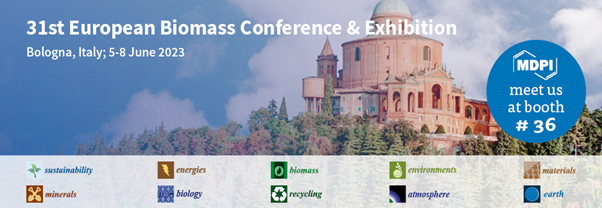
MDPI will attend the 31st European Biomass Conference & Exhibition (EUBCE 2023) as an exhibitor. This meeting will be held in Bologna, Italy, from 5 to 8 June 2023.
EUBCE is the largest biomass conference and exhibition in the world. Each year, EUBCE brings together the greatest minds and latest advancements in biomass, with the aim of accelerating research and market uptake across the globe. During the conference, over 2,000 experts from both academia and industry share and discuss groundbreaking ideas, technologies, applications, and solutions for the sourcing, production, and utility of biomass. The scientific program is coordinated by the Joint Research Centre of the European Commission. Since its 30th edition, the event has been complemented by the Circular Bio-Based Europe Joint Undertaking, aiming at identifying innovation, stimulating investment, and mobilizing the bio-based industry sector. This is an excellent opportunity to address even more stakeholders globally through the conference.
The following MDPI journals will be represented:
- Sustainability;
- Energies;
- Biomass;
- Environment;
- Materials;
- Minerals;
- Biology;
- Recycling;
- Atmosphere;
- Earth.
If you are attending this conference, please feel free to start a conversation with us at our booth #36. Our delegates look forward to meeting you in person and answering any questions that you may have.
For more information about the conference, please visit https://www.eubce.com/.
23 March 2023
Biology | Editor’s Choice Articles

Editor’s Choice Articles are based on recommendations by the scientific editors of MDPI journals from around the world. Editors select a small number of articles recently published in the journal that they believe will be particularly interesting to readers, or important in the respective research area. The aim is to provide a snapshot of some of the most exciting work published in the various research areas of the journal.
We are pleased to present the Editor’s Choice Articles published in Biology (ISSN 2079-7737), and we hope that these papers can help and provide a reference for your academic research. A carefully curated list of high-quality articles can be found below.
1. “Butterfly Wing Color Pattern Modification Inducers May Act on Chitin in the Apical Extracellular Site: Implications in Morphogenic Signals for Color Pattern Determination”
by Joji M. Otaki and Yugo Nakazato
Biology 2022, 11(11), 1620; https://doi.org/10.3390/biology11111620
Available online: https://www.mdpi.com/2079-7737/11/11/1620
2. “Visual Monitoring Strategies of Sentinels in a Cooperative Breeder”
by Guy Beauchamp and Reed Bowman
Biology 2022, 11(12), 1769; https://doi.org/10.3390/biology11121769
Available online: https://www.mdpi.com/2079-7737/11/12/1769
3. “Endophytic Pseudomonas sp. from Agave palmeri Participate in the Rhizophagy Cycle and Act as Biostimulants in Crop Plants”
by Qiuwei Zhang, Kathryn L. Kingsley and James F. White
Biology 2022, 11(12), 1790; https://doi.org/10.3390/biology11121790
Available online: https://www.mdpi.com/2079-7737/11/12/1790
4. “Linoleate-Enrichment of Mitochondrial Cardiolipin Molecular Species Is Developmentally Regulated and a Determinant of Metabolic Phenotype”
by Genevieve C. Sparagna, Raleigh L. Jonscher, Sydney R. Shuff, Elisabeth K. Phillips, Cortney E. Wilson, Kathleen C. Woulfe, Anastacia M. Garcia, Brian L. Stauffer and Kathryn C. Chatfield
Biology 2023, 12(1), 32; https://doi.org/10.3390/biology12010032
Available online: https://www.mdpi.com/2079-7737/12/1/32
5. “An Overview of D7 Protein Structure and Physiological Roles in Blood-Feeding Nematocera”
by Patricia H. Alvarenga and John F. Andersen
Biology 2023, 12(1), 39; https://doi.org/10.3390/biology12010039
Available online: https://www.mdpi.com/2079-7737/12/1/39
6. “Rapid Response to Experimental Warming of a Microbial Community Inhabiting High Arctic Patterned Ground Soil”
by Kevin K. Newsham, Birgitte Kortegaard Danielsen, Elisabeth Machteld Biersma, Bo Elberling, Guy Hillyard, Priyanka Kumari, Anders Priemé, Cheolwoon Woo and Naomichi Yamamoto
Biology 2022, 11(12), 1819; https://doi.org/10.3390/biology11121819
Available online: https://www.mdpi.com/2079-7737/11/12/1819
7. “A Biomarker Approach as Responses of Bioindicator Commercial Fish Species to Microplastic Ingestion: Assessing Tissue and Biochemical Relationships”
by Xavier Capó, Merce Morató, Carme Alomar, Beatriz Rios-Fuster, Maria Valls, Montserrat Compa and Salud Deudero
Biology 2022, 11(11), 1634; https://doi.org/10.3390/biology11111634
Available online: https://www.mdpi.com/2079-7737/11/11/1634
8. “Brain-Derived Estrogen and Neurological Disorders”
by Darrell W. Brann, Yujiao Lu, Jing Wang, Gangadhara R. Sareddy, Uday P. Pratap, Quanguang Zhang, Rajeshwar R. Tekmal and Ratna K. Vadlamudi
Biology 2022, 11(12), 1698; https://doi.org/10.3390/biology11121698
Available online: https://www.mdpi.com/2079-7737/11/12/1698
9. “Wide-Field Calcium Imaging of Neuronal Network Dynamics In Vivo”
by Angela K. Nietz, Laurentiu S. Popa, Martha L. Streng, Russell E. Carter, Suhasa B. Kodandaramaiah and Timothy J. Ebner
Biology 2022, 11(11), 1601; https://doi.org/10.3390/biology11111601
Available online: https://www.mdpi.com/2079-7737/11/11/1601
10. “Methionine Metabolism Is Down-Regulated in Heart of Long-Lived Mammals”
by Natalia Mota-Martorell, Mariona Jové, Rebeca Berdún, Èlia Òbis, Gustavo Barja and Reinald Pamplona
Biology 2022, 11(12), 1821; https://doi.org/10.3390/biology11121821
Available online: https://www.mdpi.com/2079-7737/11/12/1821
We would like to take this opportunity to thank all the research groups that submitted manuscripts to Biology.
13 March 2023
MDPI’s Newly Launched Journals in December 2022
As a leading open access publisher, MDPI provides scholars with a high-quality and rich academic exchange platform by continuously expanding into new and exciting research areas.
In December 2022, MDPI launched five new journals, covering multiple subjects such as life sciences, biology, medicine and pharmacology, social sciences and humanities. These new journals are being edited by established scholars across the world.
|
Journal |
Founding Editor-in-Chief |
Journal Topics (Selected) |
|
Prof. Dr. Fabio Gresta, University of Messina, Italy| Editorial | view inaugural issue |
grass/forage/turf production; grassland management; pasture monitoring; grazing and livestock; grass agro-ecosystems| view journal scope | submit an article |
|
|
Prof. Dr. Christos G. Athanassiou, University of Thessaly, Greece| Editorial | view inaugural issue |
pesticides; fungicides; herbicides; fertilizers; soil conditioners| view journal scope | submit an article |
|
|
Prof. Dr. Stephen H. Safe, Texas A&M University, USA| Editorial | view inaugural issue |
receptor structure; receptor function; receptor signaling; receptor expression and regulation; receptor interactions with drugs| view journal scope | submit an article |
|
|
Dr. Jean Jacques Vanden Eynde, University of Mons-UMONS, Belgium| Editorial | view inaugural issue |
drug discovery; medicinal chemistry; preclinical and clinical research; marketed drugs; intellectual property and regulatory affairs| view journal scope | submit an article |
|
|
Prof. Dr. Heather Kanuka, University of Alberta, Canada| Editorial | view inaugural issue |
higher education; tertiary education; policy and practice in higher education; educational leadership in higher education; educational administration and management in higher education| view journal scope | submit an article |
If you are interested in creating more open access journals with us to publish cutting-edge research, please send your journal proposal application to newjournal-committee@mdpi.com.
7 March 2023
Displaying Co-Authors’ Email Addresses on the Webpage of Published Papers
MDPI is pleased to announce that we now display the co-authors’ email addresses in addition to the corresponding author’s email address on the webpage of published papers, protected by Captcha. For more information about this change, please visit the journal’s instructions for authors page.
We believe this change will facilitate academic discussions and advance our cause of open science and research. The corresponding authors are responsible for communicating with their co-authors and indicating in our system (https://susy.mdpi.com/) if co-authors would prefer for their email addresses not to be displayed.
16 February 2023
Increasing Visibility for Preprints.org – Clarivate adds the Preprint Citation Index to the Web of Science
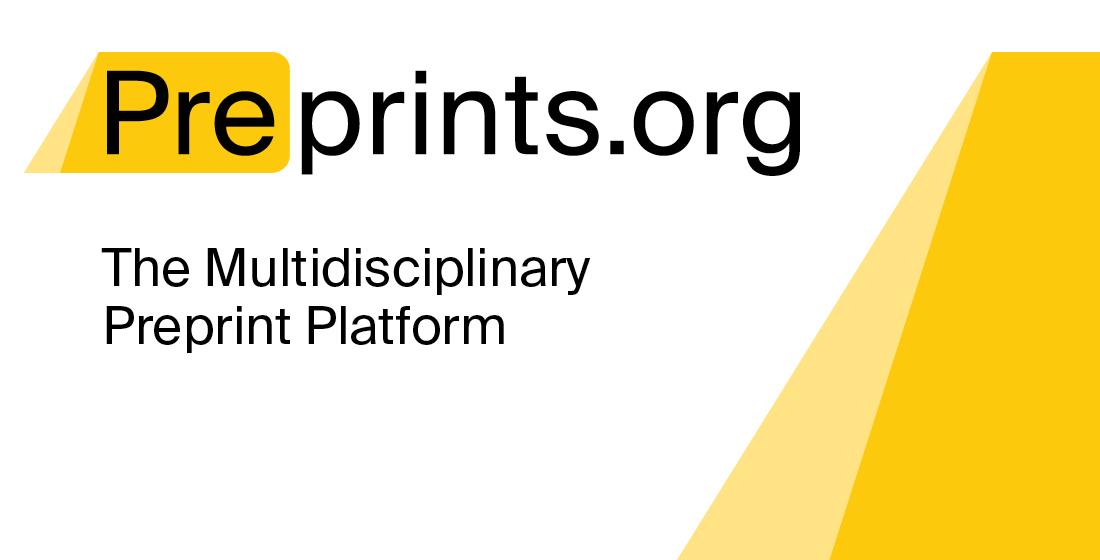
On 9 February 2023, Clarivate, a global leader in providing trusted insights and analytics, added the Preprint Citation Index to the Web of Science platform, streamlining the research process by allowing researchers to locate and link to preprints alongside other trusted content in the database.
The Preprint Citation Index will act as a bridge to connect cutting-edge preprints with peer-reviewed journal articles published within the Web of Science Core Collection. Alerts can be easily set to monitor new research across several repositories and authors will also be able to include preprints on their Web of Science Research Profile to more accurately display their various research outputs.
As of its launch, the Preprint Citation Index will provide nearly two million preprints from various repositories, including MDPI’s own Preprints.org.
MDPI's Preprints Platform – Preprints.org
To advance Open Science and the fast dissemination of research, MDPI offers researchers a free multidisciplinary preprint platform. Preprints.org accepts submissions from all research areas and offers authors high visibility, permanent archiving, article-level Metrics and immediately citable content by assigning a Digital Object Identifier (DOI) to all preprints.
During submission to any MDPI journal, authors have the option to share their research as a preprint. After an initial screening, the manuscript is available online in 48 hours or less. Once online, preprints can be downloaded, shared, commented on, and cited, providing authors maximum visibility.
We invite you to join the ranks of the over 100k researchers using Preprints.org and share your research.
For more information, please visit Preprints.org.
22 December 2022
Special Issue Mentor Program
We are pleased to announce the launch of a new initiative—the MDPI Special Issue Mentor Program.
This program will enable early career researchers (who must hold a Ph.D. in a related field) to experience editing a Special Issue in MDPI journals, under the mentorship of our experienced Editorial Board Members or other experienced scientists. The mentor program will provide an excellent opportunity for early career scientists to gain editorial experience, and to cultivate their ability to edit scientific research.
The mentee’s responsibilities include:
- Proposing a Special Issue title and assisting the mentor in preparing a summary (around 200–400 words) and 3–10 keywords describing the background, importance, and goal of the Issue;
- Writing a brief promotion plan for the Special Issue;
- Preparing a list of scholars who may be interested in the Issue and personally e-mailing invitations on behalf of Guest Editors;
- Writing an editorial for the online Special Issue together with the mentor.
The mentor’s responsibilities include:
- Conducting a final check before the Special Issue is published online;
- Performing editorial control of the Special Issue and quality control of the publications, both of which must be carried out in a timely manner;
- Providing suggestions to younger scholars if they have any doubts or concerns regarding submissions;
- Organizing video calls with young scholars and the Editorial Office regularly to discuss problems and improvement suggestions for the Special Issue;
- Making and submitting decisions regarding submissions with the assistance of mentees.
Certificates and awards:
After the Special Issue closes, the Editorial Office will provide official certificates for all the mentors and early career researchers.
If you are interested in this opportunity, please send your Special Issue proposal to the Editorial Office of a journal you choose, and we will discuss the process (i.e., mentor collaboration, Special Issue topic feasibility analysis, etc.) in further detail. The full list of MDPI journals is as follows: https://www.mdpi.com/about/journals.
In addition to the new Special Issue Mentor Program, we will continue to welcome all Special Issue proposals focusing on hot research topics.
14 December 2022
"Thanks a Million!" – One Million Articles Published in MDPI Journals
MDPI has just become the first open access (OA) publisher to reach the milestone of one million articles published. That is one million articles freely available to all, to circulate and build upon! We are proud to share this special moment with the global scientific community.
This landmark has been reached thanks to the immeasurable support of more than 600,000 expert reviewers, 66,000 editorial board members and 6700 hard-working colleagues across MDPI’s global offices.
Within more than 25 years of publishing, our journals received 2.1 million manuscripts and generated 4.6 million peer review reports to get to one million papers published.
Reaching the milestone of one million articles published reinforces our mission to remove any existing barriers and to make scientific research accessible to all. Since its inception, MDPI’s goal has been to create reliable processes to make science open. This is a path towards facilitating the dissemination of novel insights in scientific communities.
Regular feedback from authors and reviewers shows that our service is greatly appreciated and needed. At the same time, the feedback helps us identify areas for further improvement.
As it stands, a significant share of published research findings remain closed access. More than half of the content published with the most well-known legacy publishers stays behind a paywall, and that is not including articles published in hybrid OA journals, or made available months or years after publication.
A new policy announced by the US administration in August 2022 requires that, as of January 2026, all US federally funded research be made freely and immediately available after publication. While the new policy does not mandate articles be published under an open access license, it is aligned with the open access movement in removing all barriers to research. Similarly, some of the most advanced research institutions in the world intend to have all funded research articles published in open access by 2025.
MDPI is proud to be the leading agent of the transition to open access.
"Thanks a Million" to all the contributors!
13 December 2022
Prof. Dr. Panayiotis Dimitrakopoulos Appointed Section Editor-in-Chief of Section “Ecology” in Biology

We are pleased to announce that Prof. Dr. Panayiotis Dimitrakopoulos, from the University of the Aegean, has been appointed Section Editor-in-Chief of the Section “Ecology” in Biology (ISSN: 2079-7737).
Prof. Dr. Dimitrakopoulos’s research mainly focuses on biodiversity effects on ecosystem processes in Mediterranean ecosystems, plant community ecology, serpentine ecology, and nature conservation policy.
During his past tenure as a member of the Editorial Board, Prof. Dr. Panayiotis Dimitrakopoulos was actively involved in all aspects of the journal, including manuscript pre-checks, peer review and decision making, and he has edited several successful Special Issues. We look forward to further successful collaboration with Prof. Dr. Dimitrakopoulos in his new editorial role.
The following is a short Q&A with Prof. Dr. Panayiotis Dimitrakopoulos, who shared his vision for the journal with us, as well as his views of the research area and Open Access publishing:
1. What appealed to you about the journal that made you want to take the role as its Section Editor-in-Chief?
I am honored to be asked to contribute to the success of a new Section in one of the best journals in this particular scientific field and flattered to be invited. It's an opportunity to contribute to my wider research community and learn things at the same time.
2. What is your vision for the Section?
My vision is for “Ecology” to find its niche in this journal.
3. What does the future of this field of research look like?
Ecology is called upon to provide answers to major environmental problems of the 21st century. For this reason, the production of innovative knowledge by talented people is required.
4. What do you think of the development of Open Access in the publishing field?
Open Access is a useful tool, but it must ensure equality among all (both authors and readers).
We warmly welcome Prof. Dr. Panayiotis Dimitrakopoulos as he starts his new role as Section Editor-in-Chief, and we look forward to him leading Biology to achieve many more milestones.
8 December 2022
MDPI Sustainability Foundation: New Look and Nominations for the 2023 Sustainability Awards Now Open

We are pleased to announce that the website of the MDPI Sustainability Foundation has been revamped! For the past couple of months, our UX UI team and front-end developers have been working hard to launch the website in time for the opening of the Sustainability Awards nominations.
The website is not the only thing that has had a remodeling. Indeed, the format of the Emerging Sustainability Leader Award (ESLA) has been updated. ESLA is now a competition open to individual researchers or start-ups founded by researchers under the age of 35. Nominee applications will go through 2 rounds of selection until the final 3 are decided. The finalists will then be invited to give pitch presentations during the Award Ceremony to win either first place (10,000 USD) or runner-up (2 x 5000 USD).
The World Sustainability Award, on the other hand, remains the same: a total prize money of 100,000 USD is up for grabs by senior individual researchers or groups of researchers from the international research community.
Nominations for both the World Sustainability Award and the Emerging Sustainability Leader award are now open! Check out our new website for more information on how to nominate.
3 November 2022
Recruiting Editorial Board Members for Biology
Biology (ISSN: 2079-7737, IF: 5.168), a peer-reviewed, open access journal of biological science published monthly, is now recruiting Editorial Board Members (EBMs).
The responsibilities of Editorial Board Members are as follows:
- Pre-screening and making decisions on new submissions related to your research interests;
- Setting up at least one Special Issue during your term on a topic related to your research interests (or supervising Special Issues related to your research field);
- Providing input or feedback regarding journal policies;
- Helping to promote the journal among your peers or at conferences;
- Attending board meetings to suggest journal development strategies;
- Reviewing manuscripts.
For the full list of Editorial Board Members, please visit the following link: https://www.mdpi.com/journal/biology/editors.
If you are interested in becoming an Editorial Board Member of Biology, please send us your full academic CV and a short cover letter detailing your interest and suitability for the position. If you would like to recommend potential candidates or request further information, please contact the Biology Editorial Office at biology@mdpi.com. We look forward to working with you in the future.
21 October 2022
Recruiting Topical Advisory Panel Members for Biology
The Biology (ISSN: 2079-7737) Editorial Office is pleased to inform you that applications are open for the Topical Advisory Panel (TAP).
The following are the main responsibilities of new members of the Topical Advisory Panel:
- Providing support to the following tasks depending on their availability;
- Providing regular reviews of manuscripts;
- Setting up at least one Special Issue (SI) in partnership with a senior researcher within two years of the appointment. The topic of the proposal should be within the scope of Biology;
- Providing a strategy plan for the SI, including assisting in preparing the Special Issue’s/Topic’s title, aim and scope, summary, and keywords, as well as soliciting papers for and promoting the SI;
- Promoting our journal at conferences, social media, and other relevant platforms.
To qualify as a Topical Advisory Panel Member, applicants must:
- Have expertise and experience in the fields related to Biology (https://www.mdpi.com/journal/biology/about);
- Have completed their Ph.D. within approximately the last 10 years;
- Have published at least six papers in the last 5 years as a first author or corresponding author;
- Currently hold an independent research position in academia or a government institute;
- Each year, Members’ performance is evaluated, and outstanding Members are promoted to the Editorial Board by the Editor-in-Chief.
Please click on the following link to submit your application: https://www.mdpi.com/journal/biology/topical_advisory_panel_application, or send an email to biology@mdpi.com with your academic CV.
We look forward to hearing from you!
Biology Editorial Office
28 September 2022
Peer Review Week 2022 – Research Integrity: Creating and Supporting Trust in Research
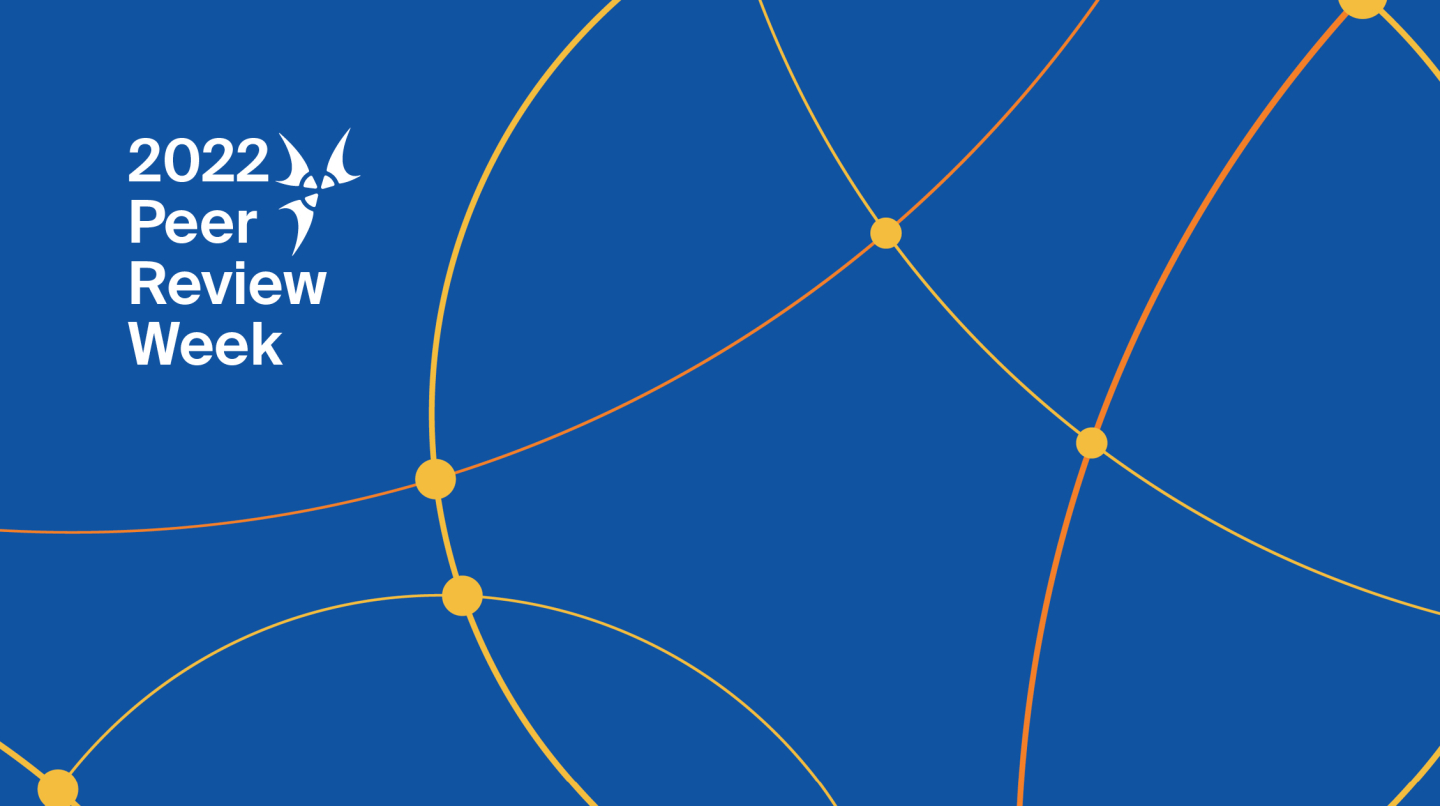
Peer Review Week began 19 September 2022 under the theme of “Research Integrity: Creating and Supporting Trust in Research”. Through various blog articles, podcast, and webinar, we discussed this crucial subject throughout the week, celebrating the essential role peer review plays in maintaining research quality.
To begin, we held a Webinar on the topic. Professor Peter W. Choate and Dr. Emmanuel Obeng-Gyasi joined Dr. Ioana Craciun, one of MDPI’s scientific officers, for an in-depth discussion.
We invite you to view the event recording:
During the week, the MDPI Blog in a series articles highlighted how good Peer Review safeguards research integrity. The following topics were covered:
- Peer Review Week 2022
- Research Integrity
- What We’ve Learned About Peer Review Reports
- 4 Steps to the Perfect Peer Review Report
- How to Write the Perfect Peer Review Report: An Interview
- Inviting Great Peer Reviewers
In a new edition of Insight Faster, an MDPI podcast, we were delighted to talk to the co-chairs of the Peer Review Week committee, Jayashree Rajagopalan (Senior Manager of Global Community Engagement for CACTUS) and Danielle Padula (Head of Marketing and Community Development at Scholastica) to get their take on this year’s event and its related topics.
You can find the Podcast here.
We hope you enjoy the contents!
27 September 2022
Meet Us at the 2022 Joint Annual Meeting, 13–16 November 2022, Vancouver, Canada

MDPI will be attending the 2022 Joint Annual Meeting, held in Vancouver, Canada, from 13 to 16 November 2022.
The 2022 Joint Annual Meeting will be hosted by the Entomological Society of America (ESA), Entomological Society of Canada (ESC), and the Entomological Society of British Columbia (ESBC). The theme for the Joint Meeting is “Entomology as Inspiration: Insects through Art, Science, and Culture”.
The following MDPI journals will be represented:
- Agriculture (leading journal);
- Insects (leading journal);
- Crops;
- Agronomy;
- Animals;
- Biology;
- JZBG.
If you are attending this conference, please feel free to start a conversation with us at our booth: #616. Our delegates look forward to meeting you in person and answering any questions that you may have. For more information about the conference, please visit https://www.entsoc.org/events/annual-meeting, or contact the Insects Editorial Office at insects@mdpi.com.
7 September 2022
Meet Us at the ASHG Annual Meeting 2022 (ASHG 2022), 25–29 October 2022, Los Angeles, USA

MDPI will be attending ASHG 2022, held in Los Angeles, USA, from 25 to 29 October 2022.
The following MDPI journals will be represented:
- Genes;
- JPM;
- Biomedicines;
- Biomolecules;
- Cardiogenetics;
- Cancers;
- Brain Science;
- Symmetry;
- Diagnostics;
- Metabolites;
- Cells;
- Biology;
- Humans;
- DNA.
If you plan on attending this conference, feel free to stop by our booth: #1844. Our delegates look forward to meeting you in person to answer any questions you may have.
For more information about the conference, please see the following link:
28 July 2022
Obituary—Prof. Dr. Chris G. Dealwis

It is with great sadness that we inform you of the passing of Biology Editorial Board Member Prof. Dr. Chris G. Dealwis in July 2022. Prof. Dr. Dealwis was an associate professor at the Department of Pharmacology and a member of the Case Comprehensive Cancer Center at Case Western Reserve University in Cleveland, OH, USA.
After earning his Ph.D. under Prof. Tom Blundell at Birkbeck College and subsequent training in industry and at Yale University, Prof. Dr. Dealwis started his career in the late 1990s. Over the following two decades, he led a remarkable research career in the fields of protein structure, function, and protein-based drug design. His research findings were used for the development of treatments for diseases such as cancer, Alzheimer’s disease, and microbial infections.
Over the years, Prof. Dr. Dealwis published more than 50 scientific papers in internationally peer-reviewed journals. He also led a Special Issue during his term serving as an Editorial Board Member in Biology: “Protein Drug Targets and Drug Design”.
His death is a significant loss to the academic community as well as anyone close to him. We offer our deepest condolences to his family, friends, and colleagues.
Biology Editorial Office
28 July 2022
Meet Us at EuroBioFilms 2022, 31 August–3 September 2022, Palma de Mallorca, Spain

MDPI will be attending EuroBioFilms 2022 (EBF), hosted by the ESCMID Study Group for Biofilms (ESGB), which will be held from 31 August to 3 September 2022 in Palma de Mallorca, Spain. The conference will be held at the Meliá Palma Marina Hotel, Av. de Gabriel Roca, 29, 07014 Palma, Balearic Islands.
The multidisciplinary program will cover many subjects and will be a mix of basic and clinical biofilm-related topics. Leading scientists in the field will be present as keynote speakers and/or chairpersons. Oral presentations will be presented during various parallel sessions. On 31st of August, several educational preconference workshops will be organized.
The following MDPI journals will be represented:
- Antibiotics (leading);
- Pathogens;
- Membranes;
- Biology;
- Journal of Personalized Medicine.
If you are attending this conference, please feel free to start a conversation with us. Our delegates look forward to meeting you in person and answering any questions that you may have. For more information about the conference and our booth, please visit the following link: https://eurobiofilms2022.com/, or contact the Antibiotics Editorial Office at antibiotics@mdpi.com.
28 June 2022
2021 Impact Factors - Released
The 2021 citation metrics have been released in the Journal Citation Reports (JCR), and we’re pleased to announce the following results for MDPI journals:

| Journal | Impact Factor | Rank | Category |
| Antioxidants | 7.675 | Q1 | Food Science & Technology |
| Biochemistry & Molecular Biology | |||
| Chemistry, Medicinal | |||
| Cells | 7.666 | Q2 | Cell Biology |
| Nutrients | 6.706 | Q1 | Nutrition & Dietetics |
| Cancers | 6.575 | Q1 | Oncology |
| Pharmaceutics | 6.525 | Q1 | Pharmacology & Pharmacy |
| International Journal of Molecular Sciences | 6.208 | Q1 | Biochemistry & Molecular Biology |
| Q2 | Chemistry, Multidisciplinary | ||
| Marine Drugs | 6.085 | Q1 | Chemistry, Medicinal |
| Pharmacology & Pharmacy | |||
| Biomolecules | 6.064 | Q2 | Biochemistry & Molecular Biology |
| Batteries * | 5.938 | Q2 | Electrochemistry |
| Energy & Fuels | |||
| Materials Science, Multidisciplinary | |||
| Viruses | 5.818 | Q2 | Virology |
| Biosensors | 5.743 | Q1 | Chemistry, Analytical |
| Instruments & Instrumentation | |||
| Q2 | Nanoscience & Nanotechnology | ||
| Journal of Fungi | 5.724 | Q1 | Mycology |
| Q2 | Microbiology | ||
| Nanomaterials | 5.719 | Q1 | Physics, Applied |
| Q2 | Chemistry, Multidisciplinary | ||
| Materials Science, Multidisciplinary | |||
| Nanoscience & Nanotechnology | |||
| Metabolites | 5.581 | Q2 | Biochemistry & Molecular Biology |
| Foods | 5.561 | Q1 | Food Science & Technology |
| Drones * | 5.532 | Q2 | Remote Sensing |
| Remote Sensing | 5.349 | Q1 | Geosciences, Multidisciplinary |
| Imaging Science & Photographic Technology | |||
| Q2 | Remote Sensing | ||
| Environmental Sciences | |||
| Journal of Theoretical and Applied Electronic Commerce Research | 5.318 | Q2 | Business |
| Antibiotics | 5.222 | Q1 | Pharmacology & Pharmacy |
| Q2 | Infectious Diseases | ||
| Pharmaceuticals | 5.215 | Q1 | Pharmacology & Pharmacy |
| Q2 | Chemistry, Medicinal | ||
| Biology | 5.168 | Q1 | Biology |
| Fermentation | 5.123 | Q2 | Biotechnology & Applied Microbiology |
| Toxins | 5.075 | Q1 | Toxicology |
| Q2 | Food Science & Technology | ||
| Bioengineering * | 5.046 | Q2 | Engineering, Biomedical |
| Polymers | 4.967 | Q1 | Polymer Science |
| Journal of Clinical Medicine | 4.964 | Q2 | Medicine, General & Internal |
| Vaccines | 4.961 | Q2 | Immunology |
| Medicine, Research & Experimental | |||
| Molecules | 4.927 | Q2 | Chemistry, Multidisciplinary |
| Biochemistry & Molecular Biology | |||
| Microorganisms | 4.926 | Q2 | Microbiology |
| Journal of Functional Biomaterials * | 4.901 | Q2 | Engineering, Biomedical |
| Materials Science, Biomaterials | |||
| Biomedicines | 4.757 | Q2 | Medicine, Research & Experimental |
| Pharmacology & Pharmacy | |||
| Biochemistry & Molecular Biology | |||
| Plants | 4.658 | Q1 | Plant Sciences |
| International Journal of Environmental Research and Public Health | 4.614 | Q1 | Public, Environmental & Occupational Health (SSCI) |
| Q2 | Public, Environmental & Occupational Health (SCIE) | ||
| Environmental Sciences (SCIE) | |||
| Membranes | 4.562 | Q1 | Polymer Science |
| Q2 | Engineering, Chemical | ||
| Materials Science, Multidisciplinary | |||
| Chemistry, Physical | |||
| Pathogens | 4.531 | Q2 | Microbiology |
| Catalysts | 4.501 | Q2 | Chemistry, Physical |
| Toxics | 4.472 | Q2 | Toxicology |
| Environmental Sciences | |||
| Gels | 4.432 | Q1 | Polymer Science |
| Journal of Cardiovascular Development and Disease | 4.415 | Q2 | Cardiac & Cardiovascular Systems |
| Chemosensors | 4.229 | Q1 | Instruments & Instrumentation |
| Q2 | Chemistry, Analytical | ||
| Q3 | Electrochemistry | ||
| Genes | 4.141 | Q2 | Genetics & Heredity |
| Diagnostics | 3.992 | Q2 | Medicine, General & Internal |
| Agronomy | 3.949 | Q1 | Agronomy |
| Plant Sciences | |||
| Land | 3.905 | Q2 | Environmental Studies |
| Sustainability | 3.889 | Q2 | Environmental Sciences (SCIE) |
| Environmental Studies (SSCI) | |||
| Q3 | Green & Sustainable Science & Technology (SCIE) | ||
| Q4 | Green & Sustainable Science & Technology (SSCI) | ||
| Sensors | 3.847 | Q2 | Instruments & Instrumentation |
| Chemistry, Analytical | |||
| Engineering, Electrical & Electronic | |||
| Materials | 3.748 | Q1 | Metallurgy & Metallurgical Engineering |
| Q2 | Physics, Applied | ||
| Physics, Condensed Matter | |||
| Q3 | Materials Science, Multidisciplinary | ||
| Chemistry, Physical | |||
| Biomimetics * | 3.743 | Q2 | Engineering, Multidisciplinary |
| Q3 | Materials Science, Biomaterials | ||
| Tropical Medicine and Infectious Disease * | 3.711 | Q1 | Tropical Medicine |
| Q2 | Parasitology | ||
| Q3 | Infectious Diseases | ||
| Lubricants * | 3.584 | Q2 | Engineering, Mechanical |
| Fractal and Fractional | 3.577 | Q1 | Mathematics, Interdisciplinary Applications |
| Water | 3.530 | Q2 | Water Resources |
| Q3 | Environmental Sciences | ||
| Micromachines | 3.523 | Q2 | Instruments & Instrumentation |
| Physics, Applied | |||
| Chemistry, Analytical | |||
| Q3 | Nanoscience & Nanotechnology | ||
| Journal of Personalized Medicine | 3.508 | Q2 | Medicine, General & Internal |
| Health Care Sciences & Services | |||
| Agriculture | 3.408 | Q1 | Agronomy |
| Processes | 3.352 | Q2 | Engineering, Chemical |
| Separations | 3.344 | Q2 | Chemistry, Analytical |
| Magnetochemistry | 3.336 | Q2 | Chemistry, Inorganic & Nuclear |
| Q3 | Chemistry, Physical | ||
| Materials Science, Multidisciplinary | |||
| Brain Sciences | 3.333 | Q3 | Neurosciences |
| Buildings | 3.324 | Q2 | Construction & Building Technology |
| Engineering, Civil | |||
| Forests | 3.282 | Q1 | Forestry |
| Energies | 3.252 | Q3 | Energy & Fuels |
| Life | 3.251 | Q2 | Biology |
| Coatings | 3.236 | Q2 | Materials Science, Coatings & Films |
| Physics, Applied | |||
| Q3 | Materials Science, Multidisciplinary | ||
| Animals | 3.231 | Q1 | Agriculture, Dairy & Animal Science |
| Veterinary Sciences | |||
| Journal of Intelligence * | 3.176 | Q2 | Psychology, Multidisciplinary |
| Fishes | 3.170 | Q1 | Marine & Freshwater Biology |
| Q2 | Fisheries | ||
| Healthcare | 3.160 | Q2 | Health Policy & Services (SSCI) |
| Health Care Sciences & Services (SCIE) | |||
| Inorganics * | 3.149 | Q2 | Chemistry, Inorganic & Nuclear |
| Insects | 3.139 | Q1 | Entomology |
| Atmosphere | 3.110 | Q3 | Meteorology & Atmospheric Sciences |
| Environmental Sciences | |||
| Current Oncology | 3.109 | Q3 | Oncology |
| ISPRS International Journal of Geo-Information | 3.099 | Q2 | Geography, Physical |
| Q3 | Computer Science, Information Systems | ||
| Remote Sensing | |||
| Diversity | 3.029 | Q2 | Biodiversity Conservation |
| Ecology | |||
| Tomography | 3.000 | Q3 | Radiology, Nuclear Medicine & Medical Imaging |
| Current Issues in Molecular Biology | 2.976 | Q3 | Biochemistry & Molecular Biology |
| Medicina | 2.948 | Q3 | Medicine, General & Internal |
| Symmetry | 2.940 | Q2 | Multidisciplinary Sciences |
| Horticulturae | 2.923 | Q1 | Horticulture |
| Machines | 2.899 | Q2 | Engineering, Mechanical |
| Engineering, Electrical & Electronic | |||
| Systems * | 2.895 | Q2 | Social Sciences, Interdisciplinary |
| Applied Sciences | 2.838 | Q2 | Engineering, Multidisciplinary |
| Physics, Applied | |||
| Q3 | Chemistry, Multidisciplinary | ||
| Materials Science, Multidisciplinary | |||
| Children | 2.835 | Q2 | Pediatrics |
| Minerals | 2.818 | Q2 | Mining & Mineral Processing |
| Mineralogy | |||
| Geochemistry & Geophysics | |||
| Universe | 2.813 | Q2 | Astronomy & Astrophysics |
| Q3 | Physics, Particles & Fields | ||
| Journal of Marine Science and Engineering | 2.744 | Q1 | Engineering, Marine |
| Q2 | Oceanography | ||
| Engineering, Ocean | |||
| Entropy | 2.738 | Q2 | Physics, Multidisciplinary |
| Fire * | 2.726 | Q2 | Forestry |
| Q3 | Ecology | ||
| Metals | 2.695 | Q2 | Metallurgy & Metallurgical Engineering |
| Q3 | Materials Science, Multidisciplinary | ||
| Electronics | 2.690 | Q3 | Engineering, Electrical & Electronic |
| Computer Science, Information Systems | |||
| Physics, Applied | |||
| Crystals | 2.670 | Q2 | Crystallography |
| Q3 | Materials Science, Multidisciplinary | ||
| Aerospace | 2.660 | Q1 | Engineering, Aerospace |
| Mathematics | 2.592 | Q1 | Mathematics |
| Photonics | 2.536 | Q3 | Optics |
| Actuators | 2.523 | Q2 | Instruments & Instrumentation |
| Q3 | Engineering, Mechanical | ||
| Veterinary Sciences | 2.518 | Q2 | Veterinary Sciences |
| Behavioral Sciences * | 2.286 | Q3 | Psychology, Multidisciplinary |
| Axioms * | 1.824 | Q2 | Mathematics, Applied |
For more information on Impact Factors and what it means to index academic journals, please visit our related blog posts.
* Journals given their first Impact Factor in 2022
Source: 2021 Journal Impact Factors, Journal Citation Reports TM (Clarivate, 2022)
21 June 2022
Dr. Hang Fai Kwok Appointed Section Editor-in-Chief of the Section “Pharmacology” in Biology
We are pleased to announce that Dr. Hang Fai Kwok, University of Macau, has been appointed the new Section Editor-in-Chief of the Section “Pharmacology” in Biology (ISSN: 2079-7737).
Dr. Kwok’s research mainly focuses on the development of novel monoclonal antibodies and natural biomolecules (including venom-based peptides, plant-derived molecules, etc.) as prototype drugs for anticancer and anti-inflammatory therapies. In addition, his research group’s research efforts and scientific knowledge have also expanded into the areas of existing and novel cancer biomarkers, such as matricellular protein (OPN), metalloproteinase (ADAM17, ADAMTS5 and ADAMTS8), DNA replication licensing factor (MCM) proteins, small GTP-binding protein (RAN and RCC1) and immunotherapy markers (e.g. PD-1/PD-L1), to identify and validate their prognostic and therapeutic values according to their roles as hallmarks of cancer and chronic diseases.
During his past tenure as a member of the Editorial Board, Dr. Kwok was actively involved in all aspects of the journal, including manuscript pre-checks, peer review and decision making, and he has edited several successful Special Issues. We look forward to further successful collaboration with Dr. Kwok in his new editorial role.
The following is a short Q&A with Dr. Hang Fai Kwok, who shared his vision for the journal with us, as well as his views of the research area and open access publishing:
1. What appealed to you about the journal that made you want to take the role as its Section Editor-in-Chief?
I was so excited about the journal's biological- and pharmaceutical- specific focus on providing a perfect venue for research across the areas, from basic biomedical science and pharmacology research to clinical studies.
2. What is your vision for the Section?
To provide an excellent platform for biologists, pharmacists and clinicians to present their latest and advanced pharmacology-focused work while expanding the field.
3. What does the future of this field of research look like?
Pharmacology research is incredibly dynamic, from understanding the insight of how prototype drugs act on biological systems to how the body responds to the drug. It encompasses the sources, biological effects, chemical properties, and diagnostic/therapeutic uses of drugs. It is a fascinating time to be involved in this field, and the journal provides a portal of communication for researchers across the world.
4. What do you think of the development of Open Access in the publishing field?
It is an important trend in the field of publication. We can continue working together through the Open Access platform to get our peer-reviewed research to serve the scientific community.
We warmly welcome Dr. Hang Fai Kwok as he starts his new role as Section Editor-in-Chief, and we look forward to him leading Biology to achieve many more milestones.
21 June 2022
Welcoming New Editorial Board Members of Biology
We are pleased to announce that the following Editorial Board Members joined Biology (ISSN 2079-7737) in the second quarter of 2022:
Name: Dr. Arnaud Chatonnet
Affiliation: DMEM, University of Montpellier, INRAE, 34060 Montpellier, France
Interests: biology; animal model; cholinesterase inhibitors; protein interaction and function; neuroscience and behaviour; Alzheimer's Disease
Name: Prof. Dr. Edward Taub
Affiliation: Department of Psychology, University of Alabama at Birmingham, Birmingham, AL 35294-1170, USA
Interests: behavioural neuroscience; behavioural medicine; neurorehabilitation; neural plasticity
Name: Dr. Fabrice Leclerc
Affiliation: RNA Sequence Structure & Function, Department of Genome Biology, Institute of for Integrative Biology of the Cell (I2BC), CNRS, CEA, University Paris Saclay, F-91198 Gif-sur-Yvette, France
Interests: computational biology and chemistry approaches; RNA–structure relationships; RNomics; small and non-coding RNAs identification and characterization; RNA 3D modelling; computational enzymology of catalytic RNAs and ribozymes; RNA/protein modelling; fragment-based RNA design
Name: Dr. Guy Warman
Affiliation: Department of Anaesthesiology, School of Medicine, The University of Auckland, Park Road, Grafton, Auckland 1023, New Zealand
Interests: chronobiology; circadian clocks; circadian biology; animal behaviour and navigation; time-compensated orientation; biological rhythms; honey bees; the effect of general anaesthesia on the circadian clock
Name: Prof. Dr. Hui Chen
Affiliation: Faculty of Science, University of Technology Sydney,2006 Sydney, Australia
Interests: oxidative stress; inflammation; PM; foetal programming; metabolic disorders
Name: Dr. Jianlong Xu
Affiliation: Institute of Crop Sciences, Chinese Academy of Agricultural Sciences, Beijing 100081, China
Interests: QTL mapping; favourable allele mining; designed QTL pyramiding (DQP); molecular rice breeding; disease resistance; salt tolerance; drought tolerance
Name: Prof. Dr. Jingfeng Tang
Affiliation: National "111" Center for Cellular Regulation and Molecular Pharmaceutics, Hubei University of Technology, Wuhan 430068, China
Interests: cell autophagy; cell signal transduction and signal pathway; cell proliferation and cell cycle; cell metabolism; stress and homeostasis regulation
Name: Dr. Margarida Matos
Affiliation: cE3c—Centre for Ecology, Evolution and Environmental Change & CHANGE—Global Change and Sustainability Institute, Faculdade de Ciências, Universidade de Lisboa , Campo Grande, 1749-016 Lisbon, Portugal
Interests: experimental evolution; historical contingencies; predictability of evolution; thermal adaptation; local adaptation; evolving and resequencing
Name: Prof. Dr. Nuria De Pedro
Affiliation: Fish Neuroendocrinology Group, Department of Genetics, Physiology and Microbiology, Faculty of Biology, Complutense University of Madrid, 28040 Madrid, Spain
Interests: fish; feeding regulation; food intake; endocrinology; chronobiology; circadian rhythms; stress; welfare
Name: Prof. Dr. Osamu Hisatomi
Affiliation: Department of Earth and Space Science, Graduate School of Science, Osaka University, Toyonaka, Osaka 560-0043, Japan
Interests: photoreceptor proteins; LOV domain; bZIP domain; DNA binding; biophysics
Name: Dr. Ranieri Bizzarri
Affiliation: Department of Surgical, Medical and Molecular Pathology and Critical Care Medicine, University of Pisa, Via Roma 65, 56126 Pisa, Italy
Interests: fluorescence microscopy; super-resolution microscopy; fluorescent proteins; epigenetics; polycomb proteins; nucleocytoplasmic shuttling
Name: Prof. Dr. Robert E. Dempski
Affiliation: Department of Chemistry and Biochemistry, Worcester Polytechnic Institute, Worcester, MA 01609, USA
Interests: ion channels; transporters; optogenetics; molecular neuroscience; transition-metal homeostasis; mixed reality programs
Name: Prof. Dr. Robert T. Gerlai
Affiliation: Department of Psychology, University of Toronto, Toronto, ON M5G 1L7, Canada
Interests: behaviour genetics; behavioural neuroscience; zebrafish; mouse, animal learning and memory; animal models of alcoholism; animal models of fear and anxiety; social behaviour; behavioural phenotyping
Name: Dr. Scott Horowitz
Affiliation: Department of Chemistry & Biochemistry and the Knoebel Institute for Healthy Aging, University of Denver, Denver, CO 80208, USA
Interests: chaperone RNA; RNA–protein interactions; chaperone mechanism; protein folding and aggregation; structural biology methods; biochemistry education
Name: Dr. Tesifón Parrón Carreño
Affiliation: Department of Nursing, Physiotherapy and Medicine, University of Almeria, 04120 Almeria, Spain
Interests: microbiology; biophysics and health promotion
Name: Prof. Dr. W. Scott McGraw
Affiliation: Department of Anthropology, Ohio State University, Columbus, OH 43210, USA
Interests: biological anthropology; evolutionary anthropology; primatology; behavioural ecology; functional morphology; social–ecological systems
We wish them every success in developing the journal.
9 June 2022
2021 CiteScores - Released
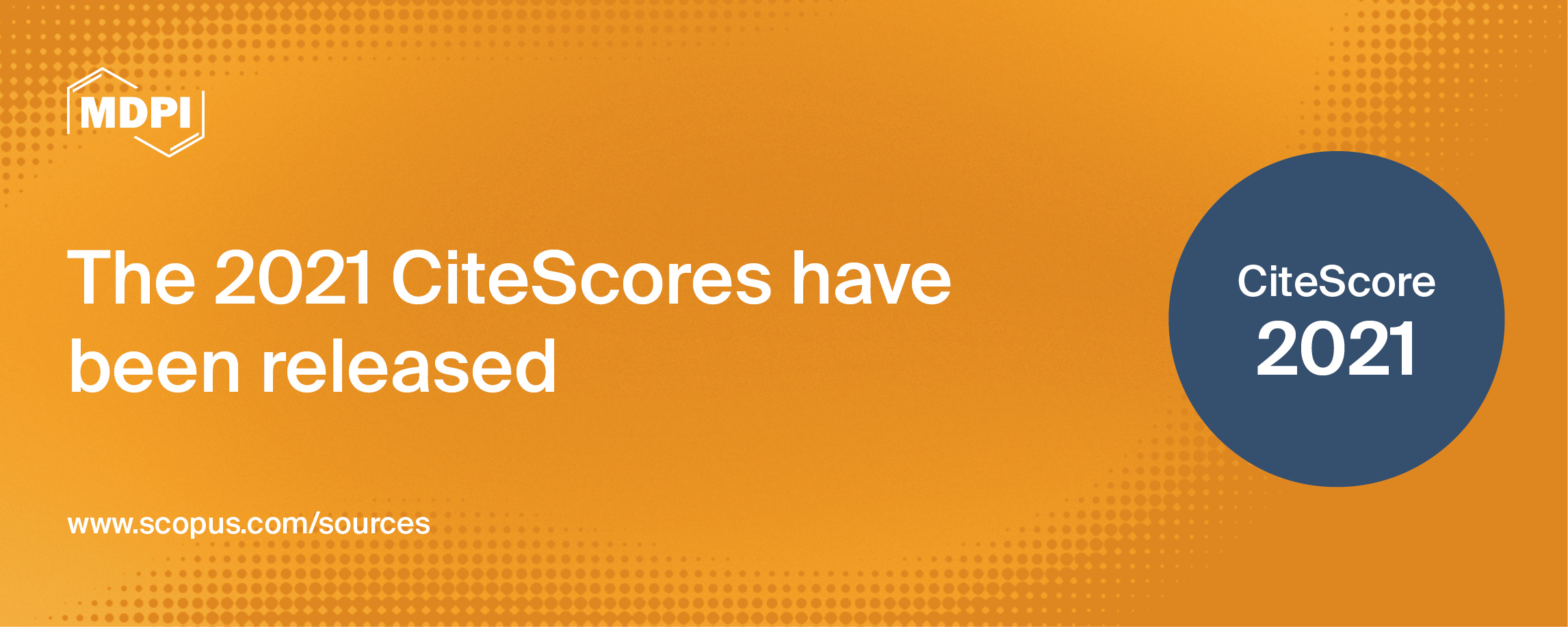
The 2021 citation metrics have been officially released in Scopus!
We are pleased to announce that 182 MDPI journals are included, of which:
● 21 journals received their first CiteScore.
● 85% of journals increased their CiteScore from 2020.
● 155 journals (85%) ranked above average, in at least one category.
The following 65 MDPI journals (36%) ranked among the top 25% of journals, in at least one category:
|
Journal |
CiteScore |
Quartile |
Category |
|
10.1 |
Q1 |
Genetics |
|
|
10.0 |
Q1 |
Biomedical Engineering |
|
|
8.1 |
Q1 |
Pharmacology, Toxicology and Pharmaceutics (miscellaneous) |
|
|
7.9 |
Q1 |
Electrical and Electronic Engineering |
|
|
7.9 |
Q1 |
Nutrition and Dietetics |
|
|
7.4 |
Q1 |
General Earth and Planetary Sciences |
|
|
7.2 |
Q1 |
Computer Science Applications |
|
|
6.9 |
Q1 |
Inorganic Chemistry |
|
|
6.9 |
Q1 |
Computer Networks and Communications |
|
|
6.7 |
Q1 |
General Biochemistry, Genetics and Molecular Biology |
|
|
6.6 |
Q1 |
General Chemical Engineering |
|
|
6.6 |
Q1 |
Health, Toxicology and Mutagenesis |
|
|
6.6 |
Q1 |
Infectious Diseases |
|
|
6.5 |
Q1 |
Food Science |
|
|
6.5 |
Q1 |
Civil and Structural Engineering |
|
|
6.4 |
Q1 |
Nature and Landscape Conservation |
|
|
6.4 |
Q1 |
Instrumentation |
|
|
6.1 |
Q1 |
Management Information Systems |
|
|
5.9 |
Q1 |
Chemistry (miscellaneous) |
|
|
5.7 |
Q1 |
Polymers and Plastics |
|
|
5.6 |
Q1 |
Engineering (miscellaneous) |
|
|
5.5 |
Q1 |
General Environmental Science |
|
|
5.5 |
Q1 |
Urban Studies |
|
|
5.4 |
Q2 |
Computer Networks and Communications |
|
|
5.3 |
Q1 |
Food Science |
|
|
5.3 |
Q1 |
Plant Science |
|
|
5.2 |
Q1 |
Ecology, Evolution, Behavior and Systematics |
|
|
5.2 |
Q1 |
General Engineering |
|
|
Journal of Open Innovation: Technology, Market, and Complexity |
5.1 |
Q1 |
Development |
|
5.0 |
Q1 |
Chemistry (miscellaneous) |
|
|
5.0 |
Q1 |
Control and Optimization |
|
|
5.0 |
Q1 |
Geography, Planning and Development |
|
|
5.0 |
Q1 |
Geography, Planning and Development |
|
|
4.9 |
Q1 |
Forestry |
|
|
4.9 |
Q1 |
Control and Optimization |
|
|
4.9 |
Q1 |
Soil Science |
|
|
4.8 |
Q1 |
General Earth and Planetary Sciences |
|
|
4.8 |
Q1 |
Mechanical Engineering |
|
|
4.8 |
Q1 |
Public Health, Environmental and Occupational Health |
|
|
4.8 |
Q1 |
Geography, Planning and Development |
|
|
International Journal of Environmental Research and Public Health |
4.5 |
Q1 |
Public Health, Environmental and Occupational Health |
|
4.5 |
Q1 |
Physical Therapy, Sports Therapy and Rehabilitation |
|
|
4.4 |
Q1 |
Mathematical Physics |
|
|
4.4 |
Q1 |
General Medicine |
|
|
4.3 |
Q1 |
General Mathematics |
|
|
4.2 |
Q1 |
Surgery |
|
|
4.1 |
Q1 |
Health Professions (miscellaneous) |
|
|
4.1 |
Q1 |
Plant Science |
|
|
4.0 |
Q1 |
General Engineering |
|
|
4.0 |
Q1 |
Forestry |
|
|
4.0 |
Q1 |
Education |
|
|
3.9 |
Q1 |
General Pharmacology, Toxicology and Pharmaceutics |
|
|
3.9 |
Q1 |
Applied Mathematics |
|
|
3.8 |
Q1 |
Development |
|
|
3.8 |
Q1 |
Architecture |
|
|
3.8 |
Q1 |
Metals and Alloys |
|
|
3.5 |
Q1 |
Communication |
|
|
3.4 |
Q1 |
General Social Sciences |
|
|
2.9 |
Q1 |
General Mathematics |
|
|
2.8 |
Q1 |
Analysis |
|
|
2.7 |
Q1 |
General Veterinary |
|
|
2.6 |
Q1 |
Algebra and Number Theory |
|
|
1.8 |
Q1 |
Conservation |
|
|
1.0 |
Q1 |
Religious Studies |
|
|
0.9 |
Q1 |
Philosophy |
Source: 2021 CiteScores™ (Elsevier)
7 June 2022
Biology | Special Issue Mentor Program
We are pleased to announce the launch of a new initiative—the Special Issue Mentor Program.
This program aims to provide an opportunity for early career scientists to enhance their editing, networking, and organizational skills and to work closely with our journal to gain more editorial experience. Early career scientists who have novel ideas for new Biology (ISSN: 2079-7737) Special Issues will act as Guest Editors under the mentorship of an experienced scientist; this mentor could be a member of the Editorial Board of Biology, or from other well-established research institutes or laboratories, etc.
If you are interested in this opportunity, please send your Special Issue proposal to the Biology Editorial Office (biology@mdpi.com), and we will discuss the process (i.e., mentor collaboration, Special Issue topic feasibility analysis, etc.) in further detail.
In addition to the new Special Issue Mentor Program, Biology continues to welcome all Special Issue proposals based on hot research topics as usual.
6 June 2022
Welcoming New Editorial Board Members of Biology
We are pleased to announce that the following Editorial Board Members have joined Biology (ISSN: 2079-7737) in the first quarter of 2022:
Name: Prof. Dr. Anat Barnea
Affiliation: Department of Natural and Life Sciences, The Open University of Israel, Ra'anana 43710, Israel
Interests: artificial light at night; behavioral neurobiology; birds; brain plasticity; ecology; neuroethology; urban ecology
Name: Prof. Dr. Zhifei Zhang
Affiliation: State Key Laboratory of Continental Dynamics, Shaanxi Key Laboratory of Early Life & Environments, Department of Geology, Northwest University, Xi’an 710069, China
Interests: systematics; phylogenetic analysis; taxonomy; stratigraphy; geology; environment; mapping; ecology and evolution
Name: Dr. Christian Kranjec
Affiliation: Faculty of Chemistry, Biotechnology and Food Science, The Norwegian University of Life Sciences, 1432 Ås, Norway
Interests: antibiotic resistance; biofilm; bacterial infection; bacteriology; MRSA; cell biology
Name: Dr. Andreas Flouris
Affiliation: Department of Physical Education and Sport Science, University of Thessaly, 42100 Trikala, Greece
Interests: behavioural thermoregulation; heat stress; cold stress; brown adipose tissue; homeostasis; temperature regulation; thermoeffectors; thermoregulatory thresholds
Name: Prof. Dr. Christian Cambillau
Affiliations:
1. Laboratoire d'Ingénierie des Systèmes Macromoléculaires, UMR7255, Institut de Microbiologie de la Méditerranée, CNRS-Aix-Marseille Université, 31 Chemin Joseph Aiguier, CS 70071, 13402 Marseille CEDEX 09, France
2. School of Microbiology, University College Cork, Cork T12, Ireland
Interests: structural biology; bacteriophage–host interactions; bacteriophage structure
Name: Prof. Dr. Cunrui Huang
Affiliation: Vanke School of Public Health, Tsinghua University, Beijing 100084, China
Interests: climate change; environmental epidemiology; global health
Name: Prof. Dr. Vincent L. Bels
Affiliation: Institute of Systematic Evolution Biodiversity, Sorbonne University, 75006 Paris, France
Interests: evolution; behavior; functional morphology; feeding; locomotion; lizards; turtles
Name: Prof. Dr. Mingxing Chu
Affiliation: Key Laboratory of Animal Genetics and Breeding and Reproduction of Ministry of Agriculture, Institute of Animal Science, Chinese Academy of Agricultural Sciences, Beijing 100193, China
Interests: animal genetics; animal molecular genetics; sheep and goat genetics and breeding
Name: Dr. Juan Arroyo
Affiliation: Department of Plant Biology and Ecology, University of Seville, 41004 Seville, Spain
Interests: plant reproductive ecology; flower polymorphisms; plant evolution and biogeography; plant–animal interactions; pollination
Name: Dr. José Armando L. da Silva
Affiliation: Centro de Química Estrutural, Instituto Superior Técnico (IST), Universidade de Lisboa, Av. Rovisco Pais 1, 1049-001 Lisboa, Portugal
Interests: bioinorganic chemistry; prebiotic chemistry
Name: Prof. Dr. Shucun Sun
Affiliation: School of Life Sciences, Nanjing University, Nanjing 210093, China
Interests: biodiversity and ecosystem function; plant–animal relationships; global change biology
Name: Dr. Angelo Fortunato
Affiliation: Biodesign Institute, Arizona State University, Tempe, AZ 85281, USA
Interests: cancer evolution; cancer biology; evolutionary biology; molecular genetics
Name: Prof. Dr. Zhe Zhao
Affiliation: Department of Marine Biology, College of Oceanography, Hohai University, Nanjing 210098, China
Interests: marine microbiology; fish immunology, especially in molecular immunology
Name: Dr. Wei Ma
Affiliation: School of Biological Sciences, Nanyang Technological University, 60 Nanyang Drive, SBS-02s-88e, Singapore 637551, Singapore
Interests: plant lipid biosynthesis; regulation of gene expression; intrinsically disordered proteins in plants; post-translational modifications; plant signal transduction
Name: Prof. Dr. Lin Wang
Affiliation: College of Animal Science and Veterinary Medicine, Shandong Agricultural University, Tai'an 271018, China
Interests: autophagy deficiency; nephrotoxicity; animal poisoning diseases; metabolism diseases
Name: Prof. Dr. Weizhen Zhang
Affiliations:
1. Department of Physiology and Pathophysiology, School of Basic Medical Sciences, Peking University Health Science Center, 100191 Beijing, China
2. Department of Surgery, University of Michigan Medical Center, Ann Arbor, MI 48109, USA
Interests: gut microbiota; gut hormones; obesity; diabetes; NAFLD
Name: Dr. Colin Adrain
Affiliation: Patrick G Johnston Centre for Cancer Research Queen’s University Belfast, Belfast BT7 1NN, Ireland
Interests: inflammation; metabolism; cell signalling; mouse models; membrane trafficking; endoplasmic reticulum; lipid droplets; ERAD (ER-associated degradation)
Name: Prof. Dr. Janis Eells
Affiliation: Department of Biomedical Sciences, University of Wisconsin-Milwaukee, Milwaukee, WI 53211, USA
Interests: retinal degenerative diseases; neurodegenerative diseases; pharmacology; molecular toxicology
Name: Prof. Dr. Eugénia Cunha
Affiliations:
1. National Institute of Legal Medicine and Forensic Sciences, 3004-531 Coimbra, Portugal
2. Laboratory of Forensic Anthropology, Centre for Functional Ecology, Department of Life Sciences, University of Coimbra, 3004-531 Coimbra, Portugal
Interests: forensic anthropology; forensic identification; skeletal biology; human evolution
Name: Prof. Dr. Donatella Paoli
Affiliation: Laboratory of Seminology—Sperm Bank “Loredana Gandini”, Department of Experimental Medicine, University of Rome “Sapienza”, 00161 Rome, Italy
Interests: human reproduction biotechnology; sperm motility evaluation; seminal fluid
Name: Dr. Praveen P. Nekkar Rao
Affiliation: School of Pharmacy, Health Sciences Campus, University of Waterloo, 200 University Avenue West, Waterloo, ON N2L 3G1, Canada
Interests: neurodegenerative diseases; chemical biology; protein misfolding; amyloid aggregation; bioassays; therapeutics
We wish them every success in developing the journal.
2 June 2022
MDPI’s 2021 Outstanding Reviewer Awards in “Biology & Life Sciences”—Winners Announced
In order to acknowledge our reviewers, who so generously dedicate their time to reviewing papers and demonstrate diligence, professionalism, and timeliness when reviewing manuscripts, MDPI journals regularly offer outstanding reviewer awards to scholars who participate in the peer-review process.
We are proud to recognize winners for the year 2021 in the “Biology & Life Sciences” category for their outstanding contributions among extensive competition by presenting them with an Outstanding Reviewer Award.
We would like to take this opportunity to congratulate all the winners on their achievement.
MDPI will continue to provide support and recognition to the academic community.
- Enrico Vito Perrino, CIHEAM, Mediterranean Agronomic Institute of Bari, Italy
- Dhirendra Kumar, National Institute of Environmental Health Sciences, Research Triangle Park, USA
- Carlos A. Viegas, Univesity of Trás-os-Montes e Alto Douro, Portugal
- Yuri Shavrukov, Flinders University, Australia
- Bipin Gaihre, Mayo Clinic, USA
- Craig D. Workman, University of Iowa, USA
- Vivian Ciaramitaro, University of Massachusetts Boston, USA
- Yang Zhang, University of Minnesota, USA
- Bonam Srinivasa Reddy, Université de Paris, France
- Homma Takujiro, Yamagata University, Japan
- Hwang, In Koo, Seoul National University, South Korea
- Kobeissy Firas, University of Florida, USA
- Rebelo, Sandra, University of Aveiro, Portugal
- Günter Gollmann, University of Vienna, Austria
- Stephan Koblmüller, University of Graz, Austria
- Emiliano Mori, Istituto di Ricerca sugli Ecosistemi Terrestri, Italy
- Joshua D. Klein, Agricultural Research Organization—The Volcani Center, Israel
- Ana Cristina S Figueiredo, Faculdade de Ciências da Universidade de Lisboa, Portugal
- Carmelo Peter Bonsignore, Università Mediterranea di Reggio Calabria, Italy
- Klaus H. Hoffmann, University of Bayreuth, Germany
- Ivan Milosavljević, University of California, USA
- Remigiusz Bachor, University of Wrocław, Poland
- Nguyen Phuoc Long, Inje University College of Medicine, South Korea
- Chi Chen, University of Minnesota, USA
- Jadwiga Hamułka, Warsaw University of Life Sciences, Poland
- Grace Campbell, University of Sydney, Australia
- Nicholas Norwitz, Harvard Medical School, USA
- Stefan Kabisch, Charité University Hospital Berlin, Germany
- Luis Rodrigo, University of Oviedo, Spain
- Carlos Viegas, Univesity of Trás-os-Montes e Alto Douro, Portugal
- Arvind Sharma, The University of Queensland, Australia
2 June 2022
MDPI’s 2021 Young Investigator Awards in “Biology & Life Sciences”—Winners Announced
MDPI’s Young Investigator Awards recognize promising junior researchers, acknowledge their contributions, and enhance communication among scientists. We are proud to present the 2021 winners in the “Biology & Life Sciences” category. The winners were selected by the journals’ editors.
We warmly congratulate the awarded young investigators for their outstanding contributions.
MDPI will continue to provide support and recognition to the academic community.
- Carlos Guzmán, University of Cordoba, Spain
- Katharina Hohlbaum, Freie Universität Berlin, Germany
- Uri Ben-David, Tel Aviv University, Israel
- Enrico Lunghi, Institute of Zoology Chinese Academy of Sciences in Beijing, China
- Guodong Zhang, University of Massachusetts Amherst, USA
- Luke Bell, Temperate Horticulture, University of Reading, UK
International Journal of Molecular Sciences:
- Alessandro D’Urso, University of Catania, Italy.
- Apostolos Zaravinos, University of Cyprus, Cyprus
- Cesar de la Fuente-Nunez, University of Pennsylvania, USA
- Maria Teresa Caccamo, Messina University, Italy
- Tiziana Bonifacino, University of Genoa, Italy
- Federico Baltar, University of Vienna, Austria
- Rebecca Drummond, University of Birmingham, UK
- Miriam Oses-Ruiz, Public University of Navarre, Spain
Life:
- João Pedro da Silva Machado Lobo, University of Porto, Portugal
- Vincenzo Russo, University of Campania Luigi Vanvitelli, Italy
- Gabriele Rocchetti, Catholic University of Sacred Heart, Italy
- Fiona Lavelle, Queen's University Belfast, UK
- Matthew Snelson, Monash University, Australia
- Si Ming Man, Australian National University, Australia
- Jasper Fuk-Woo Chan, University of Hong Kong, China
- Stefania Sut, University of Padova, Italy
- Mohamed Ahmed El-Esawi, Tanta University, Tanta, Egypt
- Nicholas M. Provine, University of Oxford, UK
- Nicholas S. Heaton, Duke University, USA
2 June 2022
MDPI’s 2021 Travel Awards in “Biology & Life Sciences”—Winners Announced
We are proud to recognize the winners of MDPI’s 2021 Travel Awards in the “Biology & Life Sciences” category for their outstanding presentations and to present them with the prize.
MDPI journals regularly offer travel awards to encourage talented junior scientists to present their latest research at academic conferences in specific fields, which helps to increase their influence.
The winners mentioned below were carefully selected by the journal editors based on an outline of their research and the work to be presented at an academic conference.
We would like to warmly congratulate the winners of 2021 Travel Awards and wish them the greatest success with their future research endeavors. MDPI will continue to enhance communication among scientists.
- Zahra Bitarafan, Norwegian Institute of Bioeconomy Research (NIBIO), Norway
- Nikolaos Tsoulias, Leibniz Institute for Agricultural Engineering and Bioeconomy (ATB), Germany
- Michela Verni, University of Bari, Italy
- Philipp Demling, RWTH Aachen University, Germany
- Jagveer Singh, Punjab Agricultural University, India
- Ibrar Hussain, State University of Londrina, Brazil
- Francis Muchaamba, University of Zurich, Switzerland
- Tanja Eisemann, SBP Medical Discovery Institute, USA
- Mrinalini Dey, National Institute for Health Research, UK
- Ben Kirk, University of Melbourne, Australia
- Kirrilly Pursey, University of Newcastle, Australia
- Dieuwertje Kok, Wageningen University, the Netherlands
- Hanna Huber, University of Bonn, Germany
- Marlene Lages, University of Porto, Portugal
- Zohra S. Lassi, University of Adelaide, Australia
- Rik Olde Engberink, Amsterdam University Medicial Center, the Netherlands
- Sarah Warkentin, University of Porto (ISPUP), Portugal
- Álvaro Hernáez, Norwegian Institute of Public Health, Norway
- Leila Abdelhamid, Virginia-Maryland College of Veterinary Medicine, Virginia Tech, USA
- Maria Michela Cesare, University of Siena, Italy
- Kaisa Hiippala, University of Helsinki, Finland
- Vanessa Silva, University of Trás-os-Montes and Alto Douro, Portugal
- Hejun Liu, Scripps Research Institute, USA
- Tomokazu Tamura, Princeton University, USA
- Cecilie Knudsen, Technical University of Denmark, Denmark
- Laura Biessy, Cawthron Institute, New Zealand
- Marcelo Mendes Rabelo, University of Florida, USA
- Hee Chun Chung, Seoul National University, South Korea
- Alejandro Marin Lopez, Yale University, USA
2 June 2022
MDPI’s 2021 Best Paper Awards in “Biology & Life Sciences”—Winners Announced
The purpose of our Best Paper Awards is to promote and recognize the most impactful contributions published within MDPI journals.
The editors of each journal carefully selected reviews and research papers through a rigorous judging process based on criteria such as the scientific merit, overall impact, and the quality of presentation of the papers published in the journal last year.
We are honored to present the winners in the subject areas of “Biology & Life Sciences”, who were selected amongst extensive competition, and congratulate the authors for their outstanding scientific publications.
MDPI will continue to provide support and recognition to the academic community.
by Wenchao Liu, Yilin Yuan, Chenyu Sun, Balamuralikrishnan Balasubramanian, Zhihui Zhao and Lilong An
Animals 2019, 9(8), 506, doi 10.3390/ani9080506
by Peter Coals, Dawn Burnham, Andrew Loveridge, David W. Macdonald, Michael ’t Sas-Rolfes, Vivienne L. Williams and John A. Vucetich
Animals 2019, 9(2), 52; doi 10.3390/ani9020052
by Giovanni Sogari, Mario Amato, Ilaria Biasato, Silvana Chiesa and Laura Gasco
Animals 2019, 9(4), 119; doi 10.3390/ani9040119
by Mark L. Chiu; Dennis R. Goulet; Alexey Teplyakov and Gary L. Gilliland
Antibodies 2019, 8(4), 55; doi 10.3390/antib8040055
by Luca Frattaruolo, Gabriele Carullo, Matteo Brindisi, Sarah Mazzotta, Luca Bellissimo, Vittoria Rago, Rosita Curcio, Vincenza Dolce, Francesca Aiello and Anna Rita Cappello
Antioxidants 2019, 8(6), 186; doi 10.3390/antiox8060186
by Chunhe Gu, Kate Howell, Frank R. Dunshea and Hafiz A. R. Suleria
Antioxidants 2019, 8(9), 405; doi 10.3390/antiox8090405
by Spyridon A. Petropoulos, Ângela Fernandes, Maria Inês Dias, Ioannis B. Vasilakoglou, Konstantinos Petrotos, Lillian Barros and Isabel C. F. R. Ferreira
Antioxidants 2019, 8(8), 293; doi 10.3390/antiox8080293
by Rubén Domínguez, Mirian Pateiro, Mohammed Gagaoua, Francisco J. Barba, Wangang Zhang and José M. Lorenzo
Antioxidants 2019, 8(10), 429; doi 10.3390/antiox8100429
by Michael H. Hastings, Elizabeth S. Maywood and Marco Brancaccio
Biology 2019, 8(1), 13; doi 10.3390/biology8010013
by Gail D. Schwieterman, Daniel P. Crear, Brooke N. Anderson, Danielle R. Lavoie, James A. Sulikowski, Peter G. Bushnell and Richard W. Brill
Biology 2019, 8(3), 56; doi 10.3390/biology8030056
by Shuichi Nakamura and Tohru Minamino
Biomolecules 2019, 9(7), 279; doi 10.3390/biom9070279
by Dmitrii Usoltsev, Vera Sitnikovaandrey Kajava and Mayya Uspenskaya
Biomolecules 2019, 9(8), 359; doi 10.3390/biom9080359
by Gerhard Liebisch, Josef Ecker, Sebastian Roth, Sabine Schweizer, Veronika Öttl, Hans-Frieder Schött, Hongsup Yoon, Dirk Haller, Ernst Holler, Ralph Burkhardt and Silke Matysik
Biomolecules 2019, 9(4), 121; doi 10.3390/biom9040121
by Anna Janaszewska, Joanna Lazniewska, Przemysław Trzepiński, Monika Marcinkowska and Barbara Klajnert-Maculewicz
Biomolecules 2019, 9(8), 330; doi 10.3390/biom9080330
by Heng Sheng Sow, Jiang Ren, Marcel Camps, Ferry Ossendorp and Peter ten Dijke
Cells 2019, 8(4), 320; doi 10.3390/cells8040320
by Dinender K. Singla, Taylor A. Johnson and Zahra Tavakoli Dargani
Cells 2019, 8(10), 1224; doi 10.3390/cells8101224
by Laura M. Doyle and Michael Zhuo Wang
Cells 2019, 8(7), 727; doi 10.3390/cells8070727
by Yu Han, Xuezhou Li, Yanbo Zhang, Yuping Han, Fei Chang and Jianxun Ding
Cells 2019, 8(8), 886; doi 10.3390/cells8080886
by Sarah B. Kingan, Haynes Heaton, Juliana Cudini, Christine C. Lambert, Primo Baybayan, Brendan D. Galvin, Richard Durbin, Jonas Korlach and Mara K. N. Lawniczak
Genes 2019, 10(1), 62; doi 10.3390/genes10010062
by Katherine E Bohnsack, Claudia Höbartner and Markus T Bohnsack
Genes 2019, 10(2), 102; doi 10.3390/genes10020102
by Laura M. Boykin, Peter Sseruwagi, Titus Alicai, Elijah Ateka, Ibrahim Umar Mohammed, Jo-Ann L. Stanton, Charles Kayuki, Deogratius Mark, Tarcisius Fute, Joel Erasto, Hilda Bachwenkizi, Brenda Muga, Naomi Mumo, Jenniffer Mwangi, Phillip Abidrabo, Geoffrey Okao-Okuja, Geresemu Omuut, Jacinta Akol, Hellen B. Apio, Francis Osingada, Monica A. Kehoe, David Eccles, Anders Savill, Stephen Lamb, Tonny Kinene, Christopher B. Rawle, Abishek Muralidhar, Kirsty Mayall, Fred Tairo and Joseph Ndunguru
Genes 2019, 10(9), 632; doi 10.3390/genes10090632
by Elamin Hafiz Baillo, Roy Njoroge Kimotho, Zhengbin Zhang and Ping Xu
Genes 2019, 10(10), 771; doi 10.3390/genes10100771
by Lida Fuentes, Carlos R. Figueroa and Monika Valdenegro
Horticulturae 2019, 5(2), 45; doi 10.3390/horticulturae5020045
by Marta Guarise, Gigliola Borgonovo, Angela Bassoli and Antonio Ferrante
Horticulturae 2019, 5(1), 13; doi 10.3390/horticulturae5010013
by Rik Clymans, Vincent Van Kerckvoorde, Eva Bangels, Wannes Akkermans, Ammar Alhmedi, Patrick De Clercq, Tim Beliën and Dany bylemans
Insects 2019, 10(7), 200; doi 10.3390/insects10070200
by Marc Kenis, Hannalene du Plessis, Johnnie Van den Berg, Malick Niango Ba, Georg Goergen, Koffi Eric Kwadjo, Ibrahim Baoua, Tadele Tefera, Alan Buddie, Giovanni Cafà, Lisa Offord, Ivan Rwomushana and Andrew Polaszek
Insects 2019, 10(4), 92; doi 10.3390/insects10040092
by Rafael R. da Costa, Haofu Hu, Hongjie Li and Michael Poulsen
Insects 2019, 10(4), 87; doi 10.3390/insects10040087
International Journal of Molecular Sciences:
by Rüdiger Hardeland
Int. J. Mol. Sci. 2019, 20(5), 1223; doi 10.3390/ijms20051223
by Elise Lévy, Nadine El Banna, Dorothée Baïlle, Amélie Heneman-Masurel, Sandrine Truchet, Human Rezaei, Meng-Er Huang, Vincent Béringue, Davy Martin and Laurence Vernis
Int. J. Mol. Sci. 2019, 20(16), 3896; doi 10.3390/ijms20163896
by Beatriz Herrero-Fernandez, Raquel Gomez-Bris, Beatriz Somovilla-Crespo and Jose Maria Gonzalez-Granado
Int. J. Mol. Sci. 2019, 20(21), 5293; doi 10.3390/ijms20215293
by Claudia Beaurivage, Elena Naumovska, Yee Xiang Chang, Edo D. Elstak, Arnaud Nicolas, Heidi Wouters, Guido van Moolenbroek, Henriëtte L. Lanz, Sebastiaan J. Trietsch, Jos Joore, Paul Vulto, Richard A.J. Janssen, Kai S. Erdmann, Jan Stallen and Dorota Kurek
Int. J. Mol. Sci. 2019, 20(22), 5661; doi 10.3390/ijms20225661
by Maiko Okano, Masanori Oshi, Ali Linsk Butash, Eriko Katsuta, Kazunoshin Tachibana, Katsuharu Saito, Hirokazu Okayama, Xuan Peng, Li Yan, Koji Kono, Toru Ohtake and Kazuaki Takabe
Int. J. Mol. Sci. 2019, 20(17), 4197; doi 10.3390/ijms20174197
by Shaista Afroz, Rieko Arakaki, Takuma Iwasa, Masamitsu Oshima, Maki Hosoki, Miho Inoue, Otto Baba, Yoshihiro Okayama and Yoshizo Matsuka
Int. J. Mol. Sci. 2019, 20(3), 711; doi 10.3390/ijms20030711
Life:
by Márió Gajdács, Zoltán Bátori, Marianna Ábrók, Andrea Lázár and Katalin Burián
Life 2020, 10(2), 16; doi 10.3390/life10020016
by Carla Ferreira, Catarina Almeida, Sandra Tenreiro and Alexandre Quintas
Life 2020, 10(6), 86; doi 10.3390/life10060086
by Ronald D. Hills, Benjamin A. Pontefract, Hillary R. Mishcon, Cody A. Black, Steven C. Sutton and Cory R. Theberge
Nutrients 2019, 11(7), 1613; doi 10.3390/nu11071613
by Harri Hemilä and Elizabeth Chalker
Nutrients 2019, 11(4), 708; doi 10.3390/nu11040708
by Humaira Jamshed, Robbie A. Beyl, Deborah L. Della Manna, Eddy S. Yang, Eric Ravussin and Courtney M. Peterson
Nutrients 2019, 11(6), 1234; doi 10.3390/nu11061234
by Israr Kha, Naeem Ullah, Lajia Zha, Yanrui Bai, Ashiq Khan, Tang Zhao, Tuanjie Che and Chunjiang Zhang
Pathogens 2019, 8(3), 126; doi 10.3390/pathogens8030126
by Spyridoula-Angeliki Nikou,Nessim Kichik, Rhys Brown, Nicole O. Ponde, Jemima Ho, Julian R. Naglik and Jonathan P. Richardson
Pathogens 2019, 8(2), 53; doi 10.3390/pathogens8020053
by Steven Batinovic, Flavia Wassef, Sarah A. Knowler, Daniel T.F. Rice, Cassandra R. Stanton, Jayson Rose, Joseph Tucci, Tadashi Nittami, Antony Vinh, Grant R. Drummond, Christopher G. Sobey, Hiu Tat Chan, Robert J. Seviour, Steve Petrovski and Ashley E. Franks
Pathogens 2019, 8(3), 100; doi 10.3390/pathogens8030100
by Muhammad Hammad Saleem, Johan Potgieter and Khalid Mahmood Arif
Plants 2019, 8(11), 468; doi 10.3390/plants8110468
by Ida Linić, Dunja Šamec, Jiří Grúz, Valerija Vujčić Bok, Miroslav Strnad and Branka Salopek-Sondi
Plants 2019, 8(6), 155; doi 10.3390/plants8060155
by Marie Agatha Mohn, Besarta Thaqi and Katrin Fischer-Schrader
Plants 2019, 8(3), 67; doi 10.3390/plants8030067
by Chiara Biselliandrea Volante, Francesca Desiderio, Alessandro Tondelli, Alberto Gianinetti, Franca Finocchiaro, Federica Taddei, Laura Gazza, Daniela Sgrulletta, Luigi Cattivelli and Giampiero Valè
Plants 2019, 8(8), 292; doi 10.3390/plants8080292
13 December 2021
Welcoming New Editorial Board Members of Biology
We are pleased to announce that 11 new scholars were recently appointed as Editorial Board Members for the journal Biology (ISSN 2079-7737).
Prof. Dr. Antonio Carvajal;
Prof. Dr. Francis J. Castellino;
Prof. Dr. Inon Scharf;
Prof. Dr. Ji Wu;
Prof. Dr. Jingfa Xiao;
Dr. José María Conde Porcuna;
Dr. Kenji K. Kojima;
Dr. Ligen Yu;
Prof. Dr. Tianwei Yu;
Prof. Dr. Xiaoli Li;
Prof. Dr. Yanbin Hao.
We wish them every success in developing the journal.
Further details about the Editorial Board can be found at https://www.mdpi.com/journal/biology/editors.
22 November 2021
722 MDPI Editorial Board Members Receiving "2021 Highly Cited Researchers" Distinction
It is our great honor to congratulate the Editorial Board Members and Editors in MDPI's journals who have been distinguished as 2021 Highly Cited Researchers by Clarivate, according to Web of Science data. We herewith express our gratitude for the immense impact the named researchers continue to make on scientific progress and on our journals' development.
Clarivate's annual list of Highly Cited ResearchersTM identifies the most highly cited scientists for the past decade. Their impactful papers are among the top 1 per cent in the citation distribution of one or more of 22 fields analyzed in the "Essential Science Indicators", distinguishing them as hugely influential among their peers.
| Abate, Antonio Abatzoglou, John T. Abbaszadeh, Mostafa Acharya, U. Rajendra Acharya, Viral V. Agarwal, Ravi P. Ahn, Myung-Ju Airoldi, Laura Ali, Imran Allakhverdiev, Suleyman I. Aluko, Rotimi E. Anasori, Babak Andersson, Dan I. Andes, David Anker, Stefan D. Apergis, Nicholas Ariga, Katsuhiko Arqub, Omar Abu Aschner, Michael Assaraf, Yehuda G. Astruc, Didier Atala, Anthony Atanasov, Atanas G. Atangana, Abdon Bahram, Mohammad Bakris, George L. Balandin, Alexander A. Baleanu, Dumitru Balsamo, Gianpaolo Bando, Yoshio Banks, William A. Bansal-Travers, Maansi Barba, Francisco J. Barros, Lillian Basit, Abdul W. Baskonus, Haci Mehmet Bassetti, Matteo Battino, Maurizio Bell, Jordana T. Bellomo, Nicola Benediktsson, Jon Atli Benelli, Giovanni Benjakul, Soottawat Bhatnagar, Amit Biddle, Stuart J. H. Biondi, Antonio Biondi-Zoccai, Giuseppe Bjarnsholt, Thomas Blaabjerg, Frede Blaschke, Thomas Blay, Jean-Yves Blumwald, Eduardo Blunt, John W. Boffetta, Paolo Bogers, Marcel Bonomo, Robert A. Bowman, David M.J.S. Boyer, Cyrille Brestic, Marian Brevik, Eric C. Buhalis, Dimitrios Burdick, Jason A. Byrd, John C. Cabeza, Luisa F. Cai, Xingjuan Cai, Jianchao Calhoun, Vince D. Calin, George Cao, Jinde Cao, Guozhong Carvalho, Andre F. Castellanos-Gomez, Andres Cerqueira, Miguel Ângelo Parente Ribeiro Chang, Jo-Shu Chang, Chih-Hao Chastin, Sebastien Chau, Kwok-wing Chemat, Farid Chen, Xiaobo Chen, YangQuan Chen, Jianmin Chen, Chaoji Chen, Min Chen, Qi Chen, Jun Chen, Xi Chen, Peng Chen, Yulin Chen, Bo Chen, Chen Chen, Zhi-Gang Chen, Wei-Hsin Chen, Gang Chen, Yongsheng Chen, Xiang Chen, Yimin Chen, Runsheng Chen, Lidong Chen, Shaowei Chen, Qian Chen, Yu Chen, Shuangming Chiclana, Francisco Cho, Sun Young Choi, Wonyong Chowdhary, Anuradha Choyke, Peter L. Cichocki, Andrzej Corella, Dolores Corma, Avelino Cortes, Javier Cortes, Jorge Costanza, Robert Crommie, Michael F. Cui, Yi Cui, Haiying Cui, Qinghua Cummings, Kenneth Michael Dai, Shifeng Dai, Sheng Daiber, Andreas Davis, Steven J. Dawson, Ted M. de la Fuente-Nunez, Cesar Decker, Eric Andrew Dekel, Avishai Demaria, Marco Deng, Yong Deng, Xiangzheng DePinho, Ronald A. Desneux, Nicolas Dimopoulos, Meletios-Athanasios Ding, Aijun Dionysiou, Dionysios D. Dokmeci, Mehmet Remzi Dolgui, Alexandre Dong, Fan Dou, Shi Xue Dou, Letian Du, Qian Du, Bo Dube, Shanta Rishi Dufresne, Alain Dummer, Reinhard Dupont, Didier Edwards, David Elaissari, Abdelhamid Elhoseny, Mohamed Ellahi, Rahmat Ellis, Erle C. ElMasry, Gamal Esteller, Manel Estévez, Mario Fabbro, Doriano Facchetti, Antonio Fan, Zhanxi Fang, Chuanglin Fasano, Alessio Fečkan, Michal Felser, Claudia Feng, Liangzhu Fensholt, Rasmus Ferdinandy, Péter Fernandez-Lafuente, Roberto Ferreira, Isabel C. F. R. Filippi, Massimo Fisher, Helen Fortino, Giancarlo Fosso Wamba, Samuel Franceschi, Claudio Fujita, Hamido Fujita, Masayuki Gai, Francesco Gaisford, Simon Galanakis, Charis M. Galluzzi, Lorenzo Galvano, Fabio Gan, Ren-You Gan, Lihua Gandomi, Amir H. Gao, Bin Gao, Feng Gao, Minrui Gao, Huijun Gao, Wei Gao, Huile Garbe, Claus Garcia, Hermenegildo Gasbarrini, Antonio Gasco, Laura Gautret, Philippe Geng, Yong Gerdts, Gunnar Geschwind, Daniel H. Ghadimi, Noradin Ghaffari, Roozbeh Ghamisi, Pedram Giampieri, Francesca Glick, Bernard R. Gnant, Michael Goel, Ajay Gogotsi, Yury Goldewijk, Kees Klein Gong, Jinlong Gong, Yongji Govindan, Kannan Granato, Daniel Grancini, Giulia Green, Douglas R. Grosso, Giuseppe Gu, Ke Guan, Cao Guastella, Adam J. Guerrero, Josep M. Gui, Guan Guizani, Mohsen Guo, Zaiping Gupta, Rangan Gutzmer, Ralf Haase, Dagmar Habibi-Yangjeh, Aziz Hagemann, Stefan Hagger, Martin Hamblin, Michael R. Hammoudeh, Shawkat Han, Heesup Hanes, Justin Harrison, Roy M. Hartung, Hans-Peter Hasanuzzaman, Mirza He, Jr-Hau He, Hongwen He, Jiaqing He, Debiao Henseler, Jörg Herrera, Francisco Herrera-Viedma, Enrique Hetz, Claudio Ho Kim, Jung Holmes, Elaine Hossain, Ekram Hsueh, Po-Ren Hu, Xiaosong Hu, Wenbin Huang, Jianping Huang, Hongwei Huang, Yu Huang, Jianying Huang, Peng Huang, Baibiao Huang, Shaoming Hubacek, Klaus |
Iqbal, Hafiz M. N. |
Saad, Fred |
The full list of 2021 Highly Cited Researchers can be accessed at the following webpage in the Web of ScienceTM https://recognition.webofscience.com/awards/highly-cited/2021/.
--- Highly Cited Researchers (HCR) is a Clarivate product.
16 November 2021
Topical Advisory Panel Established to Support Editorial Board
Academic editors play a crucial role in leading our journals and ensuring that each article undergoes a robust and timely peer-review. With the launch of Topics this year and addition of Topic Editors to our family of academic editors, we decided it would be a good time to restructure our academic boards, thus providing more clarity and support for each role. MDPI is pleased to announce the launch of a new position—Topical Advisory Panel Member, that will replace the previous position of Topics Board Member. The Topical Advisory Panel will be comprised of early career researchers eager to gain experience in editorial work.
The main responsibility of the new members of the Topical Advisory Panel is to regularly provide support to Guest Editors, Topic Editors, and Section Board Members. The responsibilities of the Topical Advisory Panel are available here: https://www.mdpi.com/editors.
Each year, the members’ performances are evaluated, and outstanding members are promoted to the Editorial Board by the Editor-in-Chief.
To qualify as a Topical Advisory Panel Member, applicants must:
- Have expertise and experience in the field related to the journal;
- Have received a Ph.D. in the last 10 years, approximately;
- Have at least 6-8 published papers in the last 5 years as first author or corresponding author;
- Currently hold an independent research position in academia or a government institute.
If you are interested in this role, please contact the editorial office by email.
We look forward to hearing from you soon.
25 October 2021
Open Access Week 2021 | It Matters How We Open Knowledge: Building Structural Equity, 25–31 October

Founded in 1996, MDPI was one of the first fully Open Access publisher. Over 25 years MDPI has grown to become the largest Open Access publisher globally, publishing over 160,000 articles across more than 350 journals in 2020. At the core, MDPI was founded in response to a pressing need of fast publication and inclusion. The scholar was set at the centre of the publication process for the first time. Acting as a service provider, rather than a product provider, MDPI exists to help scientists achive their objective to disseminate research results. At MDPI, we believe scientists deserve a better service from the publishing world.
The International Open Access Week (Open Access Week), founded by the SPARC (the Scholarly Publishing and Academic Resources Coalition) Alliance and student partners in 2008, has been successfully running for 13 years. As an advocate and pioneer of open access publishing, MDPI actively responds to the call of International Open Access Week. This year’s theme of “It Matters How We Open Knowledge: Building Structural Equity” highlights the Recommendation’s call for equitable participation from all authors and readers.
For the last 25 years, MDPI has been committed to disseminating open research. Here is a video showing MDPI’s Commitment to Equity, Inclusion and Diversity for More than 25 Years.
International Open Access Week is an important opportunity to catalyze new conversations, create connections across and between communities that can facilitate this co-design, and advance progress in the building of more equitable foundations for opening knowledge—discussions and actions that need to be continued, year in and year out. MDPI has always aimed to provide professional and efficient publishing services to scholars around the world.
Our mission is to make scientific research accessible to everyone; this year, we interview and hold discussions with open science ambassadors on how to build an equal and inclusive environment for open science. Academic editors help us collaborate with more institutions to advocate for open access ideas.
Besides this, our scientific community is a key driver of our success and MDPI’s remarkable growth. Despite the pandemic, we have prepared online conferences and workshops to gather scholars from different communities.
The Basel Sustainable Publishing online forum provides an equal opportunity for stakeholders and researchers from multi-cultural environments to exchange ideas and eliminate barriers to participation.
Conference date: 25 October 2021, online
Conference website: https://bspf2021.sciforum.net/
Main topics: MDPI discusses the current dilemma of open access science from various perspectives such as governments, libraries, and publishers, and related measures on how to change the status quo of discrimination from a global perspective.
We aim to support equality, inclusion, diversity, and accessibility in scholarly communications. We collaborate with universities and key laboratories and have scholarly communications with researchers, teachers, and students on open access workshops.

- 25 October 2021
Energies journal and Institute of Mechanics, Chinese Academy of Sciences
- 28 October 2021
Machines journal and State Key Laboratory of Traction Power, Southwest Jiaotong University
- 29 October 2021
Processes journal and Beijing Institute of Technology
- 29 October 2021
Coatings journal and Wuhan University of Technology
MDPI is committed to providing open access and high-quality publishing services for scholars and promoting rapid dissemination of academic achievements. We hope to promote the practices and policies of open access publishing and diversify the dissemination of academic achievements.
23 September 2021
2020 MDPI Top Reviewer Award—Winners Announced
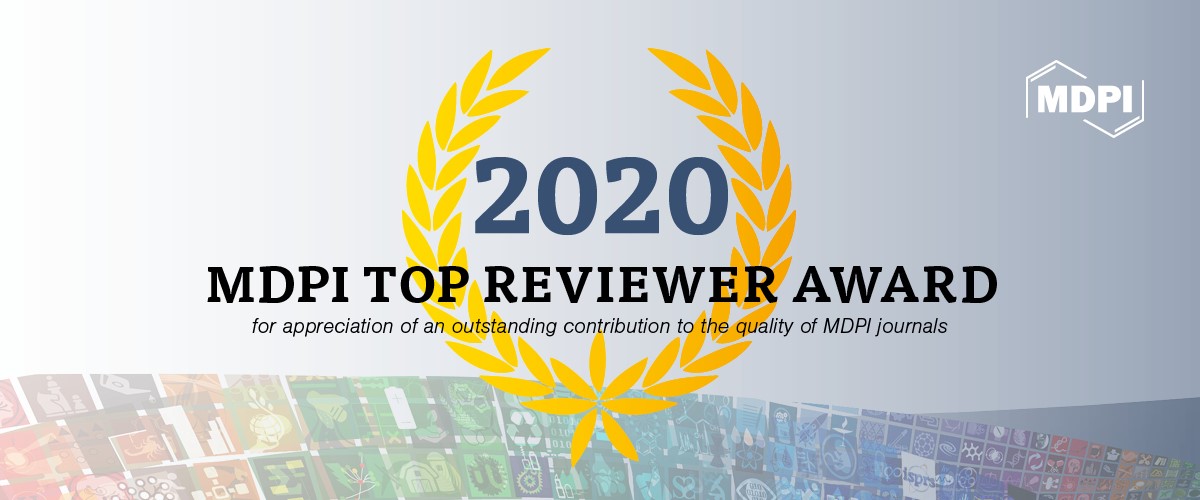
Rigorous peer-review is the cornerstone of high-quality academic publishing. Over 369,916 scholars served as reviewers for MDPI journals in 2020. We are extremely appreciative of all those who made a contribution to the editorial process in this capacity. At the beginning of every year, journal editorial offices publish a list of all reviewers’ names to express our gratitude. In addition, this year, the MDPI Top Reviewer Award was announced, to recognize the very best reviewers for their expertise and dedication, and their high-quality, and timely review reports. We are pleased to announce the following winners of the 2020 MDPI Top Reviewer Award:
- Adriana Burlea-Schiopoiu;
- Alban Kuriqi;
- Álvaro González-Vila;
- Alessandro Alaimo;
- Alexey Beskopylny;
- Alexander Yu Churyumov;
- Alberto Fernández-Isabel;
- Andrea Mastinu;
- Antonios N. Papadopoulos;
- Anton Rassõlkin;
- Antonio Humberto Hamad Minervino;
- Arkadiusz Matwijczuk;
- Artur Słomka;
- Baojie He;
- Bartłomiej Potaniec;
- Bojan Đurin;
- Camilo Arturo Rodriguez Diaz;
- Carmelo Maria Musarella;
- Chiachung Chen;
- Chiman Kwan;
- Cristian Busu;
- Danil Pimenov;
- Dan-Cristian Dabija;
- Delfín Ortega-Sánchez;
- Demetrio Antonio Zema;
- Denis Butusov;
- Elena Lucchi;
- Gaurab Dutta;
- Livia Anastasiu;
- M. R. Safaei.
For more information about how to become a reviewer of MDPI journals, please see: www.mdpi.com/reviewers.
22 September 2021
MDPI Joins SDG Publishers Compact

UN's 17 Sustainable Development Goals (SDGs) are the blueprint to achieve a better and more sustainable future for all. In 2020 the SDG Publishers Compact was launched, aimed to inspire publishers and accelerate progress to achieve the 17 goals by 2030. Members of the programme are committed to support the publication of materials that will promote and inspire actions towards SDGs.
MDPI is an eager advocate of SDGs and has already been supporting the programme by creating Special Issues and publishing a series of books on SDGs prior to joining the Compact in 2021. MDPI's Sustainability Foundation initiated the World Sustainability Awards in 2016. We fully support UN's goals to promote sustainable actions that make the world a better place for all and, as part of its commitment, we will focus our actions on SDG10: Reduced Inequalities whilst promoting all 17 SDGs. For more details, please visit the programme’s website: https://www.un.org/sustainabledevelopment/sdg-publishers-compact/.
Joining this initiative was a unanimous decision. MDPI has in its core values the dissemination of science for all, breaking the wall between research access and under-represented members of the scientific community and the general population. To support this initiative further and continue to support under-represented scientists, MDPI will take a series of actions that will be announced once ready.
The first action MDPI takes is to nominate Dr. Liliane Auwerter as the coordinator of the programme. Dr. Auwerter studied Environmental Process Technology (UTFPR, Brazil), obtained her MSc degree in Water and Environmental Engineering (University of Surrey, UK) and in 2020 completed her PhD in self-healing low-friction materials for water transport (Imperial College London, UK), always focusing on diverse scientific projects that would potentially bring sustainability to industrial processes. As a student in Brazil, she engaged in volunteering activities focused on environmental education and took part in the Millennial Development Goals meetings held at the university.
For more information, please contact:
Dr. Liliane Auwerter
Scientific Officer
liliane.auwerter@mdpi.com
3 August 2021
Announcement on Japanese Consumption Tax (JCT)
This serves to announce to our valued authors based in Japan that value-added tax, or consumption tax will now be imposed on article processing fees and other service fees for all papers submitted, or resubmitted (assigned new paper IDs), effective from 15 August 2021. The change is in accordance with the Japanese "Act for Partial Revision of the Income Tax Act and Other Acts" (Act No. 9 of 2015), which includes a revision of consumption taxation on cross-border supplies of services such as digital content distribution.
For additional information from the National Tax Agency please see here ("Cross-border supplies of electronic services").
Contact: Setsuko Nishihara, MDPI Tokyo
30 June 2021
2020 Impact Factors - Released
The 2020 citation metrics have been officially released in the Journal Citation Reports (JCR)!
We are pleased to announce that 85 MDPI journals are included, of which:
- 10 journals received their first impact factor
- 96% of journals increased their impact factor from 2019
- 32 journals (38%) ranked among the top 25% of journals, in at least one category
| Journal | Impact Factor | Rank | Category |
| Cancers | 6.639 | Q1 | • Oncology |
| Cells | 6.600 | Q2 | • Cell Biology |
| Pharmaceutics | 6.321 | Q1 | • Pharmacology & Pharmacy |
| Antioxidants | 6.313 | Q1 | • Food Science & Technology |
| • Biochemistry & Molecular Biology | |||
| • Chemistry, Medicinal | |||
| Biomedicines | 6.081 | Q1 | • Medicine, Research & Experimental |
| • Pharmacology & Pharmacy | |||
| • Biochemistry & Molecular Biology | |||
| International Journal of Molecular Sciences | 5.924 | Q1 | • Biochemistry & Molecular Biology |
| Q2 | • Chemistry, Multidisciplinary | ||
| Pharmaceuticals | 5.863 | Q1 | • Pharmacology & Pharmacy |
| • Chemistry, Medicinal | |||
| Journal of Fungi | 5.816 | Q1 | • Mycology |
| • Microbiology | |||
| Nutrients | 5.719 | Q1 | • Nutrition & Dietetics |
| Biosensors | 5.519 | Q1 | • Chemistry, Analytical |
| • Instruments & Instrumentation | |||
| Q2 | • Nanoscience & Nanotechnology | ||
| Marine Drugs | 5.118 | Q1 | • Chemistry, Medicinal |
| • Pharmacology & Pharmacy | |||
| Biology | 5.079 | Q1 | • Biology |
| Nanomaterials | 5.076 | Q1 | • Physics, Applied |
| Q2 | • Chemistry, Multidisciplinary | ||
| • Materials Science, Multidisciplinary | |||
| • Nanoscience & Nanotechnology | |||
| Viruses | 5.048 | Q2 | • Virology |
| Journal of Personalized Medicine | 4.945 | Q1 | • Medicine, General & Internal |
| • Health Care Sciences & Services | |||
| Metabolites | 4.932 | Q2 | • Biochemistry & Molecular Biology |
| Biomolecules | 4.879 | Q2 | • Biochemistry & Molecular Biology |
| Remote Sensing | 4.848 | Q1 | • Geosciences, Multidisciplinary |
| Q2 | • Remote Sensing | ||
| • Imaging Science & Photographic Technology | |||
| • Environmental Sciences | |||
| Gels * | 4.702 | Q1 | • Polymer Science |
| Antibiotics | 4.639 | Q2 | • Infectious Diseases |
| • Pharmacology & Pharmacy | |||
| Toxins | 4.546 | Q1 | • Toxicology |
| • Food Science & Technology | |||
| Vaccines | 4.422 | Q2 | • Immunology |
| • Medicine, Research & Experimental | |||
| Molecules | 4.412 | Q2 | • Chemistry, Multidisciplinary |
| • Biochemistry & Molecular Biology | |||
| Foods | 4.350 | Q2 | • Food Science & Technology |
| Polymers | 4.329 | Q1 | • Polymer Science |
| Journal of Clinical Medicine | 4.242 | Q1 | • Medicine, General & Internal |
| Toxics | 4.146 | Q2 | • Toxicology |
| • Environmental Sciences | |||
| Catalysts | 4.146 | Q2 | • Chemistry, Physical |
| Microorganisms | 4.128 | Q2 | • Microbiology |
| Membranes | 4.106 | Q1 | • Polymer Science |
| Q2 | • Engineering, Chemical | ||
| • Materials Science, Multidisciplinary | |||
| • Chemistry, Physical | |||
| Genes | 4.096 | Q2 | • Genetics & Heredity |
| Fermentation * | 3.975 | Q2 | • Biotechnology & Applied Microbiology |
| Journal of Cardiovascular Development and Disease * | 3.948 | Q2 | • Cardiac & Cardiovascular Systems |
| Plants | 3.935 | Q1 | • Plant Sciences |
| Life | 3.817 | Q2 | • Biology |
| Diagnostics | 3.706 | Q2 | • Medicine, General & Internal |
| Current Oncology | 3.677 | Q3 | • Oncology |
| Materials | 3.623 | Q1 | • Metallurgy & Metallurgical Engineering |
| Q2 | • Materials Science, Multidisciplinary | ||
| • Chemistry, Physical | |||
| • Physics, Applied | |||
| • Physics, Condensed Matter | |||
| Sensors | 3.576 | Q1 | • Instruments & Instrumentation |
| Q2 | • Chemistry, Analytical | ||
| • Engineering, Electrical & Electronic | |||
| Pathogens | 3.492 | Q2 | • Microbiology |
| Agronomy | 3.417 | Q1 | • Agronomy |
| • Plant Sciences | |||
| Chemosensors | 3.398 | Q2 | • Instruments & Instrumentation |
| • Chemistry, Analytical | |||
| Q3 | • Electrochemistry | ||
| Land | 3.398 | Q2 | • Environmental Studies |
| Brain Sciences | 3.394 | Q3 | • Neurosciences |
| International Journal of Environmental Research and Public Health | 3.390 | Q1 | • Public, Environmental & Occupational Health (SSCI) |
| Q2 | • Public, Environmental & Occupational Health (SCIE) | ||
| • Environmental Sciences (SCIE) | |||
| Tomography | 3.358 | Q2 | • Radiology, Nuclear Medicine & Medical Imaging |
| Fractal and Fractional * | 3.313 | Q1 | • Mathematics, Interdisciplinary Applications |
| Sustainability | 3.251 | Q2 | • Environmental Sciences (SCIE) |
| • Environmental Studies (SSCI) | |||
| Q3 | • Green & Sustainable Science & Technology (SCIE) | ||
| • Green & Sustainable Science & Technology (SSCI) | |||
| Water | 3.103 | Q2 | • Water Resources |
| • Environmental Sciences | |||
| Journal of Theoretical and Applied Electronic Commerce Research | 3.049 | Q3 | • Business |
| Energies | 3.004 | Q3 | • Energy & Fuels |
| Agriculture | 2.925 | Q1 | • Agronomy |
| ISPRS International Journal of Geo-Information | 2.899 | Q2 | • Geography, Physical |
| • Computer Science, Information Systems | |||
| Q3 | • Remote Sensing | ||
| Micromachines | 2.891 | Q2 | • Instruments & Instrumentation |
| • Physics, Applied | |||
| Q3 | • Chemistry, Analytical | ||
| • Nanoscience & Nanotechnology | |||
| Coatings | 2.881 | Q2 | • Materials Science, Coatings & Films |
| • Physics, Applied | |||
| Q3 | • Materials Science, Multidisciplinary | ||
| Children | 2.863 | Q2 | • Pediatrics |
| Processes | 2.847 | Q3 | • Engineering, Chemical |
| Separations | 2.777 | Q3 | • Chemistry, Analytical |
| Insects | 2.769 | Q1 | • Entomology |
| Animals | 2.752 | Q1 | • Agriculture, Dairy & Animal Science |
| • Veterinary Sciences | |||
| Symmetry | 2.713 | Q2 | • Multidisciplinary Sciences |
| Atmosphere | 2.686 | Q3 | • Meteorology & Atmospheric Sciences |
| • Environmental Sciences | |||
| Applied Sciences | 2.679 | Q2 | • Engineering, Multidisciplinary |
| • Physics, Applied | |||
| Q3 | • Chemistry, Multidisciplinary | ||
| • Materials Science, Multidisciplinary | |||
| Photonics | 2.676 | Q2 | • Optics |
| Buildings * | 2.648 | Q2 | • Construction & Building Technology |
| • Engineering, Civil | |||
| Healthcare | 2.645 | Q2 | • Health Policy & Services (SSCI) |
| Q3 | • Health Care Sciences & Services (SCIE) | ||
| Minerals | 2.644 | Q2 | • Mining & Mineral Processing |
| • Mineralogy | |||
| • Geochemistry & Geophysics | |||
| Forests | 2.634 | Q1 | • Forestry |
| Crystals | 2.589 | Q2 | • Crystallography |
| Q3 | • Materials Science, Multidisciplinary | ||
| Entropy | 2.524 | Q2 | • Physics, Multidisciplinary |
| Diversity | 2.465 | Q2 | • Biodiversity Conservation |
| Q3 | • Ecology | ||
| Journal of Marine Science and Engineering | 2.458 | Q2 | • Oceanography |
| • Engineering, Marine | |||
| • Engineering, Ocean | |||
| Medicina | 2.430 | Q2 | • Medicine, General & Internal |
| Machines * | 2.428 | Q2 | • Engineering, Mechanical |
| Q3 | • Engineering, Electrical & Electronic | ||
| Electronics | 2.397 | Q3 | • Engineering, Electrical & Electronic |
| • Computer Science, Information Systems | |||
| • Physics, Applied | |||
| Fishes * | 2.385 | Q2 | • Fisheries |
| • Marine & Freshwater Biology | |||
| Metals | 2.351 | Q2 | • Metallurgy & Metallurgical Engineering |
| Q3 | • Materials Science, Multidisciplinary | ||
| Horticulturae * | 2.331 | Q1 | • Horticulture |
| Veterinary Sciences * | 2.304 | Q1 | • Veterinary Sciences |
| Universe | 2.278 | Q3 | • Physics, Particles & Fields |
| • Astronomy & Astrophysics | |||
| Mathematics | 2.258 | Q1 | • Mathematics |
| Magnetochemistry | 2.193 | Q3 | • Chemistry, Inorganic & Nuclear |
| • Chemistry, Physical | |||
| • Materials Science, Multidisciplinary | |||
| Current Issues in Molecular Biology | 2.081 | Q4 | • Biochemistry & Molecular Biology |
| Actuators | 1.994 | Q3 | • Instruments & Instrumentation |
| • Engineering, Mechanical | |||
| Aerospace * | 1.659 | Q2 | • Engineering, Aerospace |
* Journals given their first Impact Factor in 2021
Source: 2020 Journal Impact Factors, Journal Citation Reports ® (Clarivate, 2021)
23 June 2021
Welcoming New Editorial Board Members of Biology
We are pleased to announce that 92 new scholars were recently appointed as Editorial Board Members for the journal Biology.
Dr. Jiang Liu (Marshall University, USA);
Prof. Dr. Fang-Xiang Wu (University of Saskatchewan, Canada);
Prof. Dr. Charalambos Kyriacou (University of Leicester, UK);
Prof. Dr. Takatoshi Tanisaka (Kibi International University);
Dr. Alper Kucukural (University of Massachusetts Medical School, USA);
Prof. Dr. Matteo Bertini (University of Ferrara, Italy);
Dr. Huizhong Chen (U.S. Food and Drug Administration, USA);
Prof. Dr. Weiguo Cao (Clemson University, USA);
Dr. Fabien Aubret (Centre National de la Recherche Scientifique, France);
Prof. Dr. Yin Hua Zhang (Seoul National University, Korea);
Dr. Zipei Zhang (Harvard Medical School, USA);
Prof. Dr. Lorenzo Peruzzi (University of Pisa, Italy);
Prof. Dr. Hiromitsu Tanaka (Nagasaki International University, Japan);
Prof. Dr. Chengguo Xing (University of Florida, USA);
Prof. Dr. Gabriella Nicolini (University of Milano-Bicocca, Italy);
Dr. Xu Peng (Texas A&M University College of Medicine, USA);
Dr. David C. Plachetzki (University of New Hampshire, USA);
Prof. Dr. Harri Piitulainen (University of Jyväskylä, Finland);
Prof. Dr. Olivier Oudar (Université Paris 13, France) ;
Dr. Xinhua Shu (Glasgow Caledonian University, UK);
Dr. Ian Blaby (Lawrence Berkeley National Laboratory, USA);
Dr. Katsumi Kitagawa (Texas A&M Health Science Center, USA);
Dr. Tigst Demeke (Canadian Grain Commission, Canada);
Dr. Mark Bond (University of Bristol, UK);
Prof. Dr. Lars Muckli (University of Glasgow, UK);
Prof. Dr. Jing Xu (Nankai University, China);
Dr. Dina Visca (University of Insubria, Italy);
Prof. Dr. William H. Konigsberg (Yale University, USA);
Prof. Dr. Honglong (James) Ji (University of Texas Health Science Center at Tyler, USA);
Dr. Qi Chen (University of Auckland, New Zealand);
Dr. Natraj Krishnan (Mississippi State University, USA);
Dr. Lei Ye (National Heart Centre Singapore, Singapore);
Prof. Dr. Hiroyoshi Inoue (Keio University School of Medicine, Japan);
Prof. Dr. Dirk Rades (University of Lübeck, Germany);
Dr. Yuval Cinnamon (Agricultural Research Organization, Israel);
Dr. Sunita Ramesh (Flinders University, Australia);
Dr. Oswaldo Palenzuela (Spanish National Research Council, Spain);
Prof. Dr. Shuren Li (Medical University of Vienna, Austria);
Dr. Je-Hyun Yoon (Medical University of South Carolina, USA);
Dr. Youngshim Choi (University of Maryland School of Medicine, USA);
Dr. Cheng Wang (Massachusetts General Hospital, USA);
Dr. Lourdes A. Fortepiani (University of the Incarnate Word, USA);
Dr. Mi Li (University of Tennessee, USA);
Dr. Athar Ansari (Wayne State University, USA);
Dr. Patrick Y. Sips (Ghent University, Belgium);
Prof. Dr. Jijun Tang (University of South Carolina, USA);
Dr. Zhongjian Cheng (Temple University, USA);
Prof. Dr. Carol A. Brenner (University of New England, USA);
Dr. Sylvia L.F. Pender (University of Southampton, UK);
Dr. Tomas Majtan (University of Colorado Anschutz Medical Campus, USA);
Dr. Joseph Kwong (Keele University, UK);
Dr. Zhaogang Yang (The University of Texas Southwestern Medical Center, USA);
Prof. Dr. Melanie L. Hart (Medical Center—Albert-Ludwigs-University of Freiburg, Germany);
Dr. Kwang Mook Jung (University of California-Irvine, USA);
Dr. Marie‑Lise Maddelein (Université de Toulouse, France);
Dr. Alfons Lawen (Monash University, Australia);
Prof. Dr. Yi Zhao (Chinese Academy of Sciences, China);
Prof. Dr. Qingbin Lu (University of Waterloo, Canada);
Dr. Lin Lu (Columbia University, USA);
Prof. Dr. Hua Xiang (Chinese Academy of Sciences, China);
Prof. Dr. Cheng Cameron Yin (The University of Texas MD Anderson Cancer Center, USA);
Dr. Obul Reddy Bandapalli (University of Heidelberg, Germany);
Prof. Dr. Charles D. Rice (Clemson University, USA);
Prof. Dr. Hiroetsu Suzuki (Nippon Veterinary and Life Science University, Japan);
Prof. Dr. Hengming Ke (The University of North Carolina at Chapel Hill, USA);
Prof. Dr. Haiming Dai (Mayo Clinic, USA);
Prof. Dr. Ronaldo Ichiyama (University of Leeds, UK);
Prof. Dr. Éric Crubézy (Université Paul Sabatier, France);
Dr. Arianna Bellucci (University of Brescia, Italy);
Dr. Guo-Hao Lin (University of California San Francisco, USA);
Dr. Gilles Fischer (Sorbonne Université, France);
Prof. Dr. Luis Gandía (Universidad Autónoma de Madrid, Spain);
Prof. Dr. Takuya Furuichi (Nagoya University of Economics, Japan);
Dr. Wenzhong Xiao (Massachusetts General Hospital and Harvard Medical School, USA);
Dr. Youlian Pan (National Research Council Canada, Canada);
Dr. Martin Barr (Trinity Centre for Health Sciences, Ireland);
Dr. Mridula Chopra (University of Portsmouth, UK);
Dr. Huaxin Sheng (Duke University School of Medicine, USA);
Prof. Dr. Martine Meunier (Lyon Neuroscience Research Center, France);
Prof. Dr. Naoki Yamamoto (Fujita Health University, Japan);
Dr. Claus Nielsen (University of Copenhagen, Denmark);
Dr. Toshihiro Kushibiki (National Defense Medical College, Japan);
Prof. Dr. Qiwei Yang (Georgia Regents University, USA);
Prof. Dr. Andrea Casadei Gardini (Vita e Salute San Raffaele University, Italy);
Dr. De-Li Shi (Sorbonne University, France);
Dr. Simone Tambaro (Karolinska Institutet, Sweden);
Prof. Dr. Annemiek Van Spriel (Radboud University Medical Center, The Netherlands);
Dr. Michele Cea (University of Genoa and IRCCS Ospedale Policlinico San Martino, Italy);
Dr. Barak Rotblat (Ben-Gurion University of the Negev, Israel);
Prof. Dr. Paul D. Terry (University of Tennessee, USA);
Prof. Dr. Adrian Leuchtmann (ETH Zürich, Switzerland);
Dr. Georg Damm (Leipzig University, Germany);
We wish them every success in developing the journal.
Further details about the Editorial Board can be found at: https://www.mdpi.com/journal/biology/editors.
28 April 2021
Book Builder—Compile a Customized E-Book from Your Favorite MDPI Open Access Content
MDPI Books recently released Book Builder, a new online tool to conveniently arrange, design and produce an eBook from any content published in MDPI journals. Book Builder offers two functions: on the one hand (1) Selections, available to every registered user of MDPI; on the other hand (2) Special Issue Reprints, which can be used exclusively by Guest Editors of Special Issues.
Selections
In just a matter of a few clicks, all users are now able to assemble books from MDPI articles and receive instantaneous feedback in the form of a fully produced and compiled book (PDF), which can be downloaded or ordered as print copy. Selections can include any paper published with MDPI, picking and combining content from different journals and special issues.
This way, the user may for example choose to compile an ebook focusing around a particular topic, or assemble articles from a group of others.
We invite you to make yourself familiar with the new tool! The Book Builder can be found here: https://www.mdpi.com/books/book_builder.
Special Issue Reprints
The Book Builder allows Guest Editors of MDPI journals to create a reprint from a successfully completed Special Issue or Topical Collection in book format. If you are a Guest Editor for an MDPI journal, you can use the new tool to create an PDF document which includes all articles published in the Special Issue as well as a book cover and table of contents.
For Special Issues containing a minimum of 5 articles, the Guest Editor can request its publication on the MDPI Book platform. Published reprints are assigned an ISBN and DOI.
In addition to the PDF copy of the Reprint Book, as a token of our gratitude, MDPI offers every Guest Editor one (1) complimentary print copy (via print-on-demand). All contributors benefit from a discount on orders of any additional print copies, to share with colleagues or libraries or others.
In line with our organization's values, MDPI Books publishes all content in open access, promoting the exchange of ideas and knowledge in a globalized world. MDPI Books encompasses all the benefits of open access—high availability and visibility, as well as wide and rapid dissemination. MDPI Books are distributed under the terms and conditions of the Creative Commons Attribution License, meaning as an author you retain the copyright for your work. In addition, with MDPI Books you can complement the digital version of your work with a high-quality printed counterpart.
If you are interested in editing a book volume or series, or have a monograph manuscript to be considered for publication, please submit your proposal online and look at our Information for Authors.
Contact: Laura Wagner, MDPI Books Manager (email)
15 April 2021
MDPI Celebrates Company Milestone With 25th Anniversary Page
"We exist to help scientists achieve their own objectives"

In June of this year, MDPI will celebrate the 25th anniversary of its foundation. To mark this significant milestone, we have created a 25th Anniversary page on our website that evokes the development of our company over the past quarter-century.
MDPI has been a pioneer of Open Access publishing ever since the concept was first created.
In a wide-ranging interview, our CEO Delia Mihaila reflects on the company’s 25th anniversary and its contribution to the world of scientific publishing.
Delia considers how MDPI has evolved since starting life in 1996 as a visionary ‘project’ run out of an apartment in Basel, Switzerland, by Dr. Shu-Kun Lin. A chemist who was passionate about the long-term preservation of rare chemical sample, Dr. Lin was determined to help scholars publish their findings as quickly as possible and make their research results available to as wide a readership as possible worldwide. That determination remains unchanged 25 years later.
Today, MDPI is an international organization with over 4,000 employees based on three continents and in ten countries, and ranks among the world's top four academic publishers.
MDPI's mission is to accelerate access to new scientific research, delivering insight faster for researchers worldwide. Read more here about the company's remarkable success story and what the Open Access publishing model can offer the global scientific community.
10 March 2021
Journal Selector: Helping to Find the Right MDPI Journal for Your Article
At MDPI, we strive to make your online publication process seamless and efficient. To achieve this, our team is continuously developing tools and features to make the user experience useful and convenient.
As the number of academic papers continues to grow, so does the need to analyze and work with them on a large scale. This prompted us to design a new feature aimed at helping researchers find journals that are relevant to their publication by matching their abstract topic. In this regard, we designed a similarity model that automatically identifies the most suitable academic journals for your paper.
We are pleased to introduce Journal Selector, a new feature that measures similarity in academic contexts. By simply entering the title and/or abstract into our Journal Selector, the author will see a list of the most related scientific journals published by MDPI. This method helps authors select the correct journals for their papers, highlighting the time of publication and citability.
The methodology is known as representation learning, where words are represented as vectors in hyperspace. Representation helps us differentiate between different concepts within articles, and in turn, helps us identify similarities between them.
We used an advanced machine learning model to better capture the semantic meanings of words. This helps the algorithm make better predictions by leveraging scientific text representation. In turn, this ensures high precision, helping authors decide which journal they should submit their paper to.
The goal is to support authors to publish their work in the most suitable journal for their research, as fast as possible, accelerating their career progress.
Contact: Andrea Perlato, Head of Data Analytics, MDPI (email)
15 December 2020
MDPI adopts C4DISC principles to improve diversity and inclusion in scholarly communications
MDPI is proud to adopt the principles of the Coalition for Diversity & Inclusion in Scholarly Communications (C4DISC) to support building equity, inclusion, diversity, and accessibility in scholarly communications.
The C4DISC represents organizations and individuals working in scholarly communications and is focused on addressing issues of diversity and inclusion within the publishing industry.
MDPI’s Managing Editors encourage the Editors-in-Chief and Associate Editors to appoint diverse expert Editorial Boards. This is also reflective in our multi-national and inclusive workplace. We are proud to create equal opportunities without regard to gender, ethnicity, geographic location, sexual orientation, age, disability, political beliefs, religion, or socio-economic status. There is no place for discrimination in our workplace and editors of MDPI journals are to uphold these principles in high regard.
Representatives from C4DISC meet monthly, and have started to implement initiatives to shed light and improve on the lack of diversity in scholarly communications. Some of the initiatives include developing a joint statement of principles; conducting market research; providing training resources, best practices, toolkits, and documentation for our collective memberships; and establishing outreach programs, curricula, events, and publications.
The Coalition is committed to:
- eliminating barriers to participation, extending equitable opportunities across all stakeholders, and ensuring that our practices and policies promote equitable treatment and do not allow, condone, or result in discrimination;
- creating and maintaining an environment that respects diverse traditions, heritages, and experiences;
- promoting diversity in all staff, volunteers, and audiences, including full participation in programs, policy formulation, and decision-making;
- raising awareness about career opportunities in our industries to groups who are currently underrepresented in the workforce;
- supporting our members in achieving diversity and inclusion within their organizations.
14 December 2020
Article Layout and Templates Revised for Future Volumes
At MDPI we have slightly revised the layout for articles to be published in the 2021 Volume, starting at the end of December 2020. As of today, the article templates available for download on ‘Instructions for Authors’ pages have been updated.
The most noticeable change can be found on the first page of the article, where a left-hand column has been created to include the following front matter elements: (i) the recommended citation style for the article, (ii) the publishing history, (iii) as well as the Creative Commons Attribution license used (iv) a standard note regarding affiliations. At the same time, the extra spacing on the left means the authors’ affiliations are now more clearly set apart than before. Other front matter key elements such as journal logo, article type, article title, authors, abstract and keywords remain unchanged.
The blank column on the left runs through all pages in an article; as a result, the main text is slightly more condensed, which improve reader friendliness for smaller screens. Small figures/tables are aligned on the left with standard indenture, while large figures/tables are centered and covering the full width of the page. The revised layout was applied in the article pictured below, to serve as an example:

1) Information is displayed in the left information bar.

2) In the main text, there is a blank column on the left.

3) Small tables/figures are aligned on the left, large tables/figures are centered.
11 December 2020
2020 "Highly Cited Researchers" on MDPI Journal's Editorial Boards
We are pleased to acknowledge that many academic editors who have made an impact on MDPI journals as editorial board members, editors-in-chief, or section editors, are recognized as 2020 Highly Cited Researchers by Clarivate.
Highly Cited Researchers highlights the top 1% of researchers, by citations, in one or more of the 22 fields used in Clarivate Analytics Essential Science Indicators. We offer our congratulations to 279 academic editors of MDPI journals who were recognized as the most influential scholars in their fields in 2020.
Adams, Dave Agarwal, Ravi P. Ahn, Choon Ki Ahn, Myung-Ju Albrecht, Randy A. Andersson, Dan I. Anker, Stefan D. Apergis, Nicholas Ariga, Katsuhiko Artaxo, Paulo Balsamo, Gianpaolo Barba, Francisco J. Benediktsson, Jon Atli Benelli, Giovanni Bhatnagar, Amit Bialystok, Ellen Blaabjerg, Frede Blay, Jean-Yves Bogers, Marcel Bolton, Declan J. Boyer, Cyrille Brocca, Luca Bruix, Jordi Buhalis, Dimitrios Burdick, Jason A. Byrd, John C. Cabeza, Luisa F. Cabrerizo-Lorite, Francisco Javier Cai, Jianchao Calhoun, Vince D. Cantu, Robert C. Cerqueira, Miguel Chang, Jo-Shu Chau, Kwok-wing Chemat, Farid Chen, Jianmin Chen, Jun Chen, Min Chen, Shaowei Chen, Wei Chen, Wei-Hsin Chen, Xiaofeng Chen, Yangkang Chen, Zhi-Gang Chiclana, Francisco Corella, Dolores Cortes, Javier Cortes, Jorge Cummings, Kenneth Michael Dai, Shifeng Decker, Eric A. DePinho, Ronald A. Dimopoulos, Meletios-Athanasios Dincer, Ibrahim Du, Yihong Dupont, Didier Edwards, David Ellahi, Rahmat Ellis, Erle C. ElMasry, Gamal Esteller, Manel Estruch, Ramón Fang, Chuanglin Fasano, Alessio Fernandez-Lafuente, Roberto Ferreira, Isabel Fortino, Giancarlo Galluzzi, Lorenzo Galvano, Fabio Gandomi, Amir H. Gandomi, Amir H. Gao, Bin Gao, Feng Gao, Wei Garbe, Claus García, Hermenegildo Geschwind, Daniel H. Giampieri, Francesca Giralt, Sergio A. Glanz, Karen Goldewijk, Kees Klein Gössling, Stefan Govindan, Kannan Granato, Daniel Grosso, Giuseppe Grosso, Giuseppe Guerrero, Josep M. Haase, Dagmar Hagger, Martin S. Hamblin, Michael R. Han, Heesup Jankovic, Joseph Janotti, Anderson |
Jiang, Hai-Long Kalaji, Hazem M. Kalantar-Zadeh, Kourosh Kaner, Richard B. Karimi, Hamid Reza Kataoka, Kazunori Keesstra, Saskia Kepp, Oliver Kerminen, Veli-Matti Keyzers, Robert A. Khademhosseini, Ali Khan, Nafees A. Kim, Ki-Hyun Klemeš, Jiří Jaromír Klenk, Hans-Peter Konopleva, Marina Y. Krammer, Florian Krebs, Frederik C. Kroemer, Guido Kudo, Masatoshi Kurths, Juergen Kurzrock, Razelle Kuznetsov, Nikolay V. Kyrpides, Nikos C. La Vecchia, Carlo Lai, Yuekun Lam, James Lancellotti, Patrizio Lee, Sangmoon Leung, Victor C. M. Li, Jinghong Li, Yurui Lindahl, José M. Merigó Lip, Gregory Y. H. Loh, Xian Jun Long, Hualou Lund, Henrik Luo, Jingshan Luque, Rafael Lyons, Timothy W. Ma, Jun Ma, Wen-Xiu Ma, Yanming Maeda, Keisuke Makarova, Kira Mantovani, Alberto Martín-Belloso, Olga Martinoia, Enrico Marzband, Mousa Masclaux-Daubresse, Celine Masson, Patrick Mateos, María Victoria Mathiesen, Brian Vad Matyjaszewski, Krzysztof McArthur, Grant A. McCauley, Darren Medlock, Jolyon M. Melero, Ignacio Mezzetti, Bruno Miroshnichenko, Andrey E. Moran, Daniel Mueller, Lukas A. Mueller-Roeber, Bernd Naushad, Mu Nemeroff, Charles B. Nieto, Juan J. O'Donnell, Colm Ogino, Shuji Olabi, Abdul-Ghani O'Regan, Donal Orsini, Nicola Oswald, Isabelle P. Ozcan, Aydogan Pahl-Wostl, Claudia Pang, Huan Payne, James E. Peng, Shushi Perc, Matjaz Perez-Alvarez, Jose Angel Piquero, Alex R. Ploss, Alexander Postolache, Mihai Pradhan, Biswajeet Prinsep, Michele R. Qian, Dong Qu, Xiaogang Reiter, Russel J. Riahi, Keywan Richter, Andreas Rignot, Eric Robert, Caroline Ros, Emilio Rosell, Rafael |
Rosen, Marc A. |
The full list of 2020 Highly Cited Researchers can be accessed on https://recognition.webofsciencegroup.com/awards/highly-cited/2020/
--- Highly Cited Researchers (HCR) is a Clarivate product.
9 July 2020
Open Access Agreement Between Jisc Collections and MDPI
We are delighted to announce the establishment of our Open Access agreement with Jisc Collections, which will allow UK institutions to benefit from access to article processing charge (APC) discounts and streamlined payment workflows.
All institutions participating in the agreement will also gain access to the MDPI online submission system where they can find full article metadata and pricing information for easy identification and additional transparency.
Eligible authors affiliated with the participating institutions are prompted to choose the corresponding Institutional Open Access Program (IOAP) when they submit an article via our online submission system.
About Jisc
Jisc's vision is for the UK to be the most digitally advanced education and research nation in the world. At its heart is the super-fast national research and education network, Janet, with built-in cyber security protection. Jisc also provides technology solutions for its members (colleges, universities and research centres) and customers (public sector bodies), helps members save time and money by negotiating sector-wide deals and provides advice and practical assistance on digital technology. Jisc is funded by the UK higher and further education and research funding bodies and member institutions.
For more information, contact helen.dobson@jisc.ac.uk.
About MDPI
MDPI is a publisher of fully peer-reviewed, Open Access journals with a focus on thorough and rapid editorial processing. Its aim is to ensure that high-quality research is verified and made available to the research community as quickly as possible. MDPI stands at the forefront of the Open Access movement, having launched its first online journal Molecules in 1996. Today, MDPI is a leader in Open Access publishing with over 250 journals across all research disciplines, and all content published under a Creative Commons Attribution License (CC BY).
For any questions about this agreement, please contact the MDPI IOAP team at ioap@mdpi.com.
29 June 2020
Biology Receives First Journal Impact Factor of 3.796
The editors are pleased to inform that Biology has received a first Impact Factor of 3.796, as published in the 2019 Edition of the Journal Citation Reports® (Clarivate), released just now. Biology ranks 19th out of 93 (Q1) titles in the 'Biology' category.
Thank you to the authors, editorial board members and reviewers for their contribution in achieving this milestone for Biology.
13 May 2020
COVID-19 Academic Resources Center

Since 1996, MDPI has been committed to supporting the research community by providing the latest research freely available and making relevant and useful research available as quickly as possible. The world is current experiencing a pandemic of COVID-19, and researchers are working extremely hard to understand it and find a cure.
The values MDPI holds strongly are particularly important at the moment, and we will continue to publish relevant, peer-reviewed research as quickly as possible in open access format. This means that it will immediately be available for researchers, health professionals, and the general public to read, distribute, and reuse. We believe that scientific advancements will be crucial to overcoming this pandemic, and will do everything we can to support researchers working looking for solutions.
COVID-19 Academic Resources Center contains a variety of information related to COVID-19 available from MDPI, including journal articles, special issues, and preprints, among others.
For more information, please visit: https://www.mdpi.com/covid-19
9 April 2020
Free Open Platforms to Support Academics During the COVID-19 Pandemic

As a leading Open Access publisher, MDPI is committed to fostering open scientific exchange in all forms across all disciplines. Due to the outbreak of COVID-19, many researchers have to stay at home and many academic conferences have been cancelled or postponed. In light of these changes, MDPI has adopted numerous initiatives that may help accelerate scientific exchange and provide support to the academics during this period.
Scholarly Community—Encyclopedia
Encyclopedia is an online reference created and curated by active scholars. It aims to highlight the latest research results as well as providing benchmark information for researchers and the general public interested in accurate and advanced knowledge on specific topics.
Comprehensive and Free Literature Database—Scilit
Scilit is a comprehensive, free database for scientists that uses a new method to collate data and index scientific material. Our crawlers extract the latest data from CrossRef and PubMed on a daily basis. This means that newly published articles are immediately added to Scilit.
Display Academic Achievements—SciProfiles
SciProfiles is an innovative social network for researchers and scholars that is developed by MDPI. In line with our broad mission, the purpose of SciProfiles is to accelerate discovery and innovation by facilitating immediate access to research results and providing opportunities for academic networking.
Organize and Participate in Conferences Online—Sciforum
Sciforum is an event planning platform that supports open science by offering the opportunity to host and participate in academic conferences. It provides an environment for scholarly exchange, discussion of topics of current interest, building of networks, and establishing collaborations.
Post Early Versions of Research Outputs—Preprints
Preprints is a platform dedicated to making early versions of research outputs permanently available and citable. We post original research articles and comprehensive reviews, and papers can be updated by authors at any time. Content on Preprints is not peer-reviewed, and feedback can be received from readers.
***
MDPI remains committed to open science and open data and has signed a statement, along with more than thirty scholarly publishers, showing our intention to facilitate sharing of new research findings as early on as possible. The initiative sees publishers collectively removing barriers to new research, in the face of a global healthcare crisis.
25 March 2020
MDPI Comment on the COVID-19 Virus
The world is currently suffering from a global pandemic of the corona virus COVID-19. MDPI expresses its sympathies for all of those affected by the virus and stands in solidarity with medical staff and researchers treating patients and searching for scientific solutions.
MDPI has previously published papers covering corona viruses in addition to new papers on the current outbreak, see all papers here. In particular, Viruses has published a number of Special Issues and papers on the topic (see here, here, and here) as well as a forthcoming Special Issue.
Alongside journal articles, MDPI has been a strong supporter of preprints, which are increasingly being used to rapidly disseminate the latest research, and we run the preprint server Preprints.org. Our database of research articles, Scilit, is free to use and covers all publishers including preprint servers. New papers are often in search results within hours of publication and users can set up alerts for new papers.
Our main priority during this period has been the health and safety of staff, and we continue to allow staff to work at home and closely monitor the situation in all locations in which we work. Despite the restrictions, we continue to provide a full publication service and, by close collaboration with our editorial boards and making use our in-house teams, ensure that there are no unnecessary delays in publishing vital research. Fast and open publication has always been at the core of MDPI values and is now more important than ever.
We hope that a solution to the current situation will emerge soon. In the meantime, we will do our best to continue communicating vital research in all fields.
20 March 2020
Meet us at the 43rd Annual Meeting of the Spanish Society of Biochemistry & Molecular Biology (SEBBM 2020) in Barcelona, Spain, 20–23 July 2020
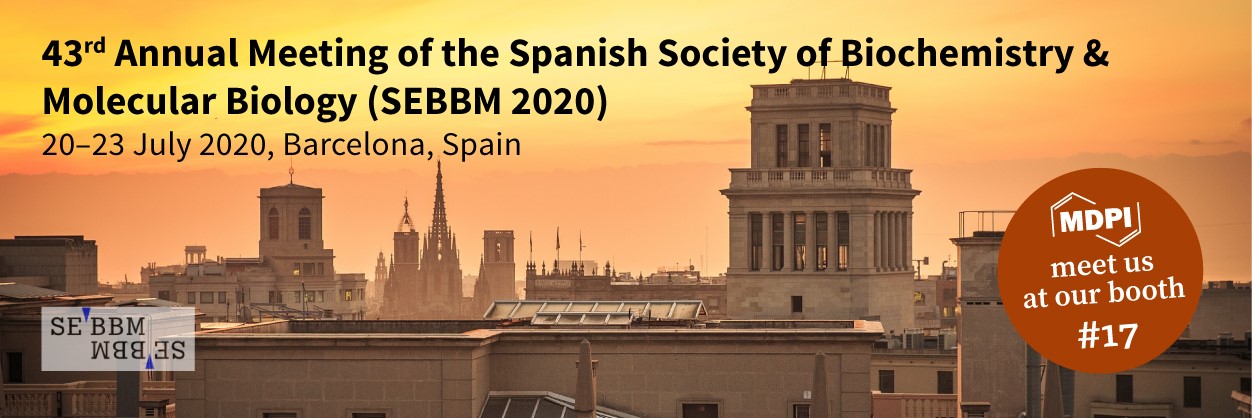
MDPI will be attending SEBBM 2020, held in Barcelona, Spain, 20th–23rd July 2020.
La Sociedad Española de Bioquímica y Biología Molecular (SEBBM) is committed to promoting research links, encouraging years of study, promoting the dissemination of knowledge, improving teaching, and promoting young scientists among Spanish researchers for the international development of Spanish science and to contribute to scientific aspects of the public interest.
The following MDPI journals will be represented:
- Genes (Leading journal)
- Biomolecules (co-leading)
- Brain Sciences
- Biology
- IJMS
- Applied Sciences
- Antibiotics
- Cancers
- Cells
If you are also attending this conference, feel free to stop by our booth (Booth #17). Our delegates look forward to meeting you in person to answer any questions you may have. For more information about the conference, please see the following link:
https://www.sebbm.es/web/es/congresos/congresos-de-la-sebbm/3311-43-congreso-de-la-sebbm-barcelona-2020
18 March 2020
MDPI Co-Signed Position Statement on Transformative Agreements
The advantages of the open access model of scientific publishing are being increasingly recognized in the scientific community. It allows new scientific evidence to be accessed from the moment of publication for free by anyone around the globe, boosting the impact of new research. In response, many funders, libraries and universities have been adopting new principles to accelerate the transition to open access.
Recently, “transformative agreements” have been negotiated between traditional publishers and various institutions. While increasing the number of open access papers, these agreements lack binding commitments to a full transition to open access, their conditions vary across different regions, and access is still limited for many users.
MDPI is a co-signatory of the recent position statement raising concerns about potential downsides of transformative agreements and how they may delay a full transition to open access. The statement highlights that these models “risk perpetuating current limitations on access, transparency and market competitiveness, while simultaneously facilitating excessive charges on the public purse”.
As a pioneering open access journal publisher, MDPI is the first to promote the importance of science being made available to everyone. Our peer-reviewed journals, covering diverse academic disciplines, are fully accessible to the public free of charge under a Creative Commons Attribution License (CC BY). This is why, along with other open access publishers, MDPI is a proud signatory of the position paper and is committed to contributing to the replacement of weak transitional agreements with “agreements with publishers that are already fully committed to open science and who offer full, immediate and transparent Open Access”.
Read the position paper here
16 March 2020
Encyclopedia Outstanding Contributor Awards 2020 - Open for Application
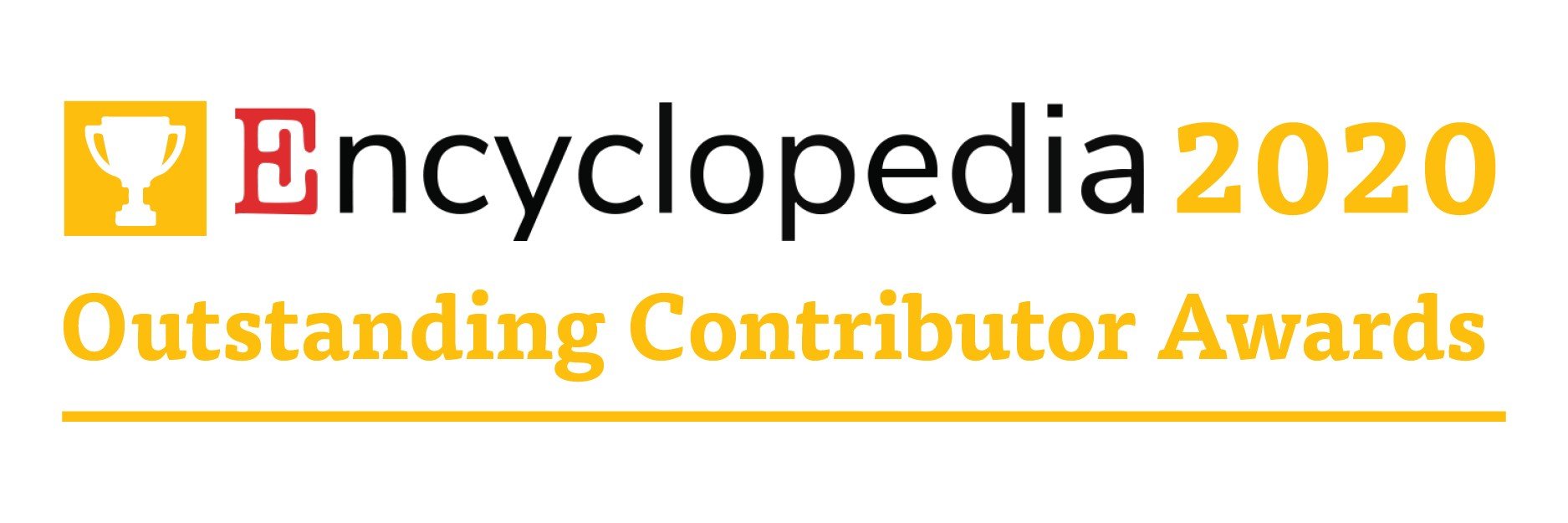
We are pleased to announce that Encyclopedia will be awarding five Outstanding Contributor Awards for researchers in 2020. The nominations and applications will be assessed by an Evaluation Committee consisting of senior scholars from the Encyclopedia Editorial Board.
Prize for Winners
- An official certificate;
- A cash award of 500 CHF or an MDPI discount voucher of 800 CHF.
Application Deadline
31 December, 2020 (Please send your application email with a list of all entries you contributed to our office before the deadline: office@encyclopedia.pub)
Candidate Requirements
- Have a Ph.D. degree;
- Have more than three qualified entries published in Encyclopedia in 2020.
Evaluation Standards
- Number of entries published in Encyclopedia in 2020;
- Quality of entries online (including length, figure quality, and novelty);
- Impact of entries (including the number of likes, discussion contents, views, and downloads).
If you are a researcher and have not yet contribute entries to Encyclopedia, please do not miss this chance to highlight your research results.
16 December 2019
Meet Us at SFFRI in Taoyuan, Taiwan, 17–20 March 2020
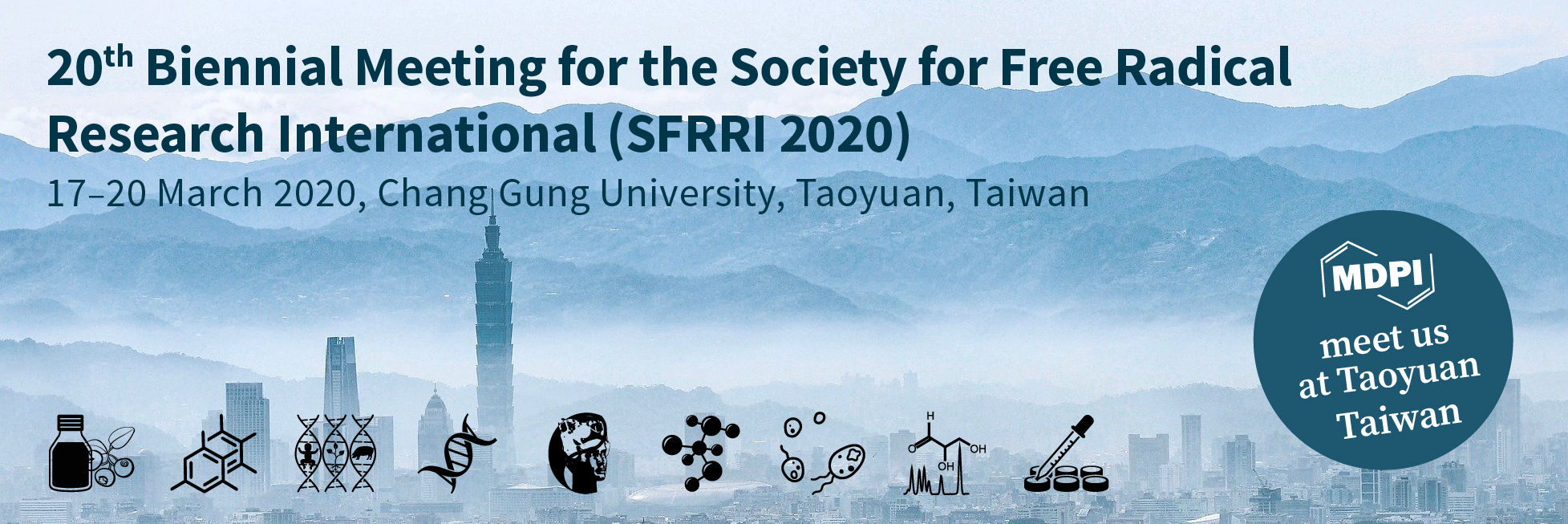
MDPI will be attending the 20th Biennial Meeting for the Society for Free Radical Research International (SFRRI 2020), Taoyuan, Taiwan, 17-20 March 2020.
The Society for Free Radical Research, founded in the United Kingdom in 1982, is an International Society and operates as a charitable voluntary, non-profit institution. The aims and objectives of the International Society are to advance education in free radical processes with particular reference to their industrial and medical importance, informing education for the benefit of the public. The Society promotes interest in all aspects of research into the reactions and properties of free radicals and into their physical, chemical, biological, medical, and industrial roles. Founded in 1982, and now with over 2500 members worldwide, the Society consists of five autonomous regional groups: SFRR Asia, SFRR Europe, SFRR Australasia, Society for Free Radical Biology and Medicine (SFRR Americas), and SFRR Africa. A number of regional groups have also been established within these areas.
The following MDPI journals will be represented:
- Antioxidants
- Molecules
- Biology
- International Journal of Molecular Sciences (IJMS)
- Medicines
- Biomolecules
- Life
- Metabolites
- Biomedicines
If you are also attending this conference, please feel free to stop by our booth. Our delegates look forward to meeting you in person and answering any questions you may have. For more information about the conference, please visit the website: http://www.sfrri2020.org/.
11 October 2019
Introducing SciProfiles, an Academic Social Network
MDPI is pleased to announce the release of SciProfiles, its social network platform for researchers and scholars.
The purpose of SciProfiles is aligned with MDPI’s broad mission to accelerate discovery and innovation by facilitating immediate access to research results and to serve scholars and communities by providing opportunities for academic networking.
SciProfiles also ambitions to serve as a sustainable, transparent and community-driven research evaluation system aligned with the DORA principles (https://sfdora.org/). Through their scientific profiles, academics can highlight their contribution to research communities, and measure their impact on their field, beyond publication numbers and impact factors. SciProfiles is currently a beta version and will enrich to give researchers the possibility to highlight all of their contributions to science and their scientific communities as authors, reviewers, editors, conference organizers, conference panelists, conference keynote speakers, or even as lecturers or student mentors at their University.
The classic components of popular community social networks, including follower/following, classical metrics, endorsements and recommendations (https://www.mdpi.com/about/announcements/1690), comments (https://www.mdpi.com/about/announcements/1397) are or will be very soon highlighted in SciProfiles as open science contributions.
To help increase the impact and visibility of articles and their authors to an appropriate audience, the platform offers a NewsFeed that includes recommendations of relevant content based on interests, publication history, saved searches or colleagues’ recommendations.
SciProfiles’ avatars are now being integrated on several MDPI platforms, meaning that you will directly access researchers’ profiles from any of the MDPI platforms:
MDPI's journal publishing website: www.mdpi.com
MDPI's conference hosting and management website: www.sciforum.net
MDPI's pre-print website : www.preprints.org
MDPI's knowledge sharing website : www.encyclopedia.pub
MDPI's books store: www.mdpi.com/books
MDPI's literature database : www.scilit.net
SciProfiles aims to serve scientific communities at large. It can be embedded into third-party websites and also welcomes integration of data from third-parties.
Dr. Shu-Kun Lin: https://sciprofiles.com/profile/2
Dr. Franck Vazquez: https://sciprofiles.com/profile/FranckVazquez
Dr. Martyn Rittman: https://sciprofiles.com/profile/martynrittman
2 October 2019
Winners of the 2019 MDPI Writing Prize
We are delighted to announce the winners of the 2019 MDPI Writing Prize. Entrants were asked to write on the theme "Judging research: How should research and researchers be evaluated and rewarded?" We received a large number of excellent essays from PhD students and postdocs, and the process of shortlisting and choosing winners was not an easy one. The winners demonstrated excellent writing skills alongside interesting and thought-provoking ideas.
As last year, we will begin the process of collating all entries into a book that will be available in open access format. Alongside promoting good writing skills, we see the prize as a way to promote the voices of early career researchers within broader debates and policy discussions.
Congratulations to all of the participants and especially the winners. The winners are:
1st Prize (500 CHF):
Albin Nilsson (National Centre for Nuclear Research, Warsaw, Poland)
[Read here]
2nd Prize (250 CHF):
Qi Zhang (Shandong University, Jinan, China)
[Read here]
Igor Ogashawara (Indiana University, Indianapolis, US)
[Read here]
3rd Prize (100 CHF):
Margaret Sivapragasam (Universiti Teknologi Petronas, Perak, Malaysia)
[Read here]
Arvind Sharma (The University of Queensland, Gatton, Australia)
[Read here]
Jose Flores-Guerrero (University Medical Center Groningen, Groningen, The Netherlands)
[Read here]
The MDPI Writing Prize is an annual award supported by MDPI Author Services, which provides services including language editing, reformatting, plagiarism checks, and image editing.
20 September 2019
MDPI Now Gives Scholars the Possibility to Endorse and Recommend Articles

MDPI is pleased to announce the release of a new functionality giving the possibility for researchers and scholars to endorse, and formally recommend articles to their colleagues.
MDPI was an early signatory of the San Francisco Declaration on Research Assessment (https://sfdora.org/read/) which calls for improvement in how quality and impact of scholarly research outputs are evaluated, especially in moving beyond journal-based citation metrics (journal Impact Factor, Scopus Citescore, etc.).
MDPI supports the establishment of article-level impact metrics, including citations, views, downloads, and Altmetric scores. These measures serve as an impact indicator for research articles on a case–by-case basis, assessing paper on its own merit. However, these metrics are also subjective and can give a biased picture of the article impact: they do not directly reflect the quality or the intrinsic scientific value of the article.
In our view, community engagement with publications based on community-driven metrics can help to overcome this limitation. We have therefore launched an option for scholars to endorse articles, indicating their own assessment of its content and making a recommendation to their community. This follows our implementation of the open source Hypothesis commenting tool, which has been available for all articles published by MDPI for over a year (https://www.mdpi.com/about/announcements/1397). Both endorsement and commenting are available for all previously published and forthcoming MDPI articles.
In addition to potentially serving as a sustainable solution to article assessment, endorsements will help scientific communities to identify the most relevant articles, independently of the journal in which it was published.
The code for the endorsing functionality, which relies on DOIs and ORCIDs, will be made available on GitHub with an open source license.
Dr. Shu-Kun Lin, President and Founder
Dr. Franck Vazquez, Chief Scientific Officer
Dr. Martyn Rittman, Publishing Director
11 September 2019
Meet Us at ASCB|EMBO 2019 in Washington DC, 7–11 December 2019
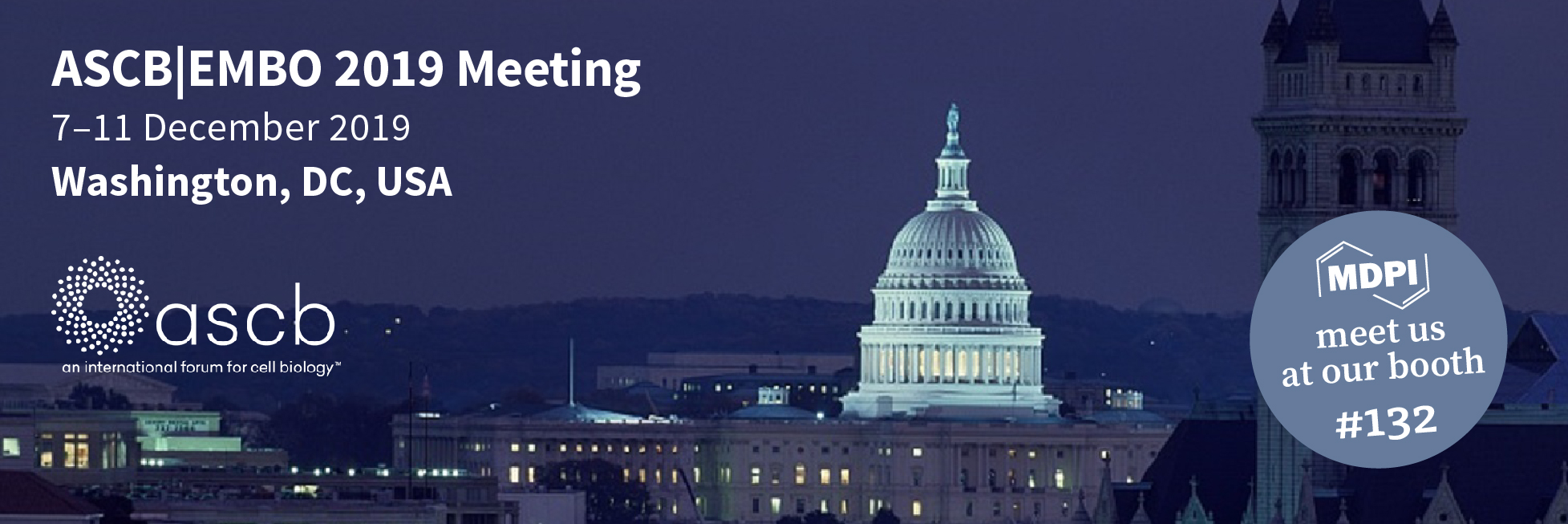
We are glad to inform you that MDPI will be attending the 2019 joint meeting of the American Society for Cell Biology (ASCB) and European Molecular Biology Organization (EMBO). The 2019 joint meeting of the American Society for Cell Biology (ASCB) and European Molecular Biology Organization (EMBO) will focus on cell biology as the fundamental basis of biology, and will offer sessions on emerging topics such as nontraditional model organisms, and the use of computational modeling and biophysics to "Build the Cell from the Ground Up".
Representatives of the following open-access journals will attend:
Biology
Biomolecules
Brain Sciences
Cancers
Cells
Genes
Healthcare
IJMS
Metabolites
Pathogens
Plants
Processes
Vaccines
If you are also attending this conference, please feel free to stop by our booth (Booth #132). Our delegates look forward to meeting you in person to answer any questions you may have.
11 September 2019
Create an Entry in Encyclopedia to Get a 100 CHF Voucher in Publishing in MDPI Journals
Encyclopedia is a free online reference created and curated by active scholars. It aims to highlight the latest research results as well as provide a comprehensive record of scientific development. If you have any suggestions or questions, please feel free to contact us via office@encyclopedia.pub.

6 August 2019
Preprints Reaches 10,000 Posted Articles Milestone
We are pleased to announce that Preprints has passed the milestone of 10,000 posted preprints. We are delighted to have reached this after just over three years of operation. Our congratulations and thanks go to our authors and advisory board who have supported growth of the platform and been crucial to its operation.
You can find further details at https://www.preprints.org/announcement/show/37.
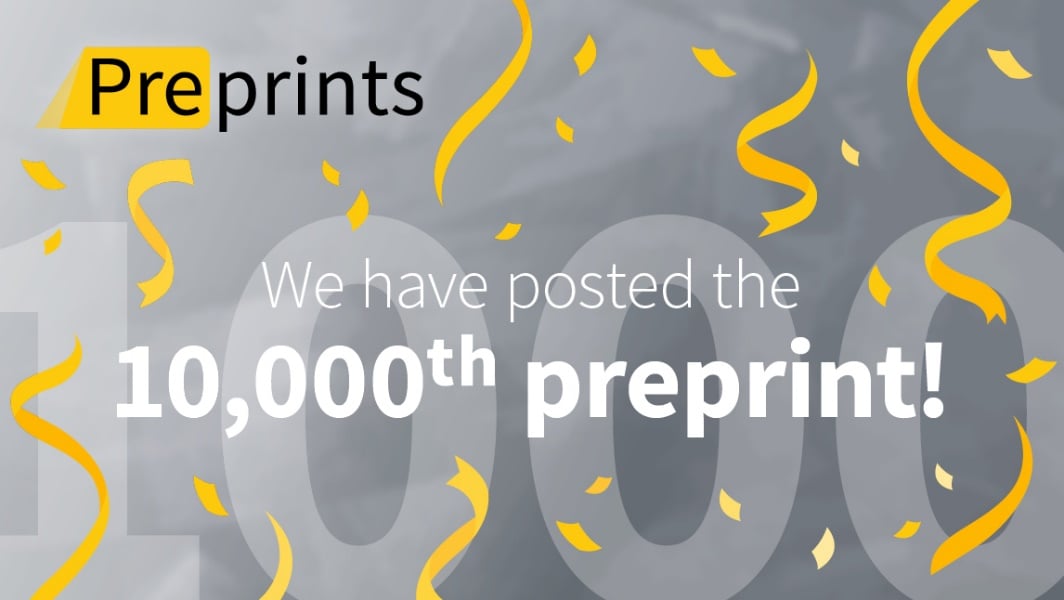
2 August 2019
DeepGreen Partnering with Publishers and Universities in Distributing Open Access Content to Institutional Repositories
Last week, the DeepGreen initiative in Germany started into an advanced test phase with the publishing partners S. Karger AG, SAGE Publishing, MDPI, Frontiers and De Gruyter, as well as 27 universities from all over Germany, from Hamburg University of Applied Sciences to University of Konstanz.
DeepGreen aims at lowering the barriers for open access publishing by automatically delivering metadata and full text publications from participating publishers to authorized repositories at German universities.
In preparation for a later live operation, the advanced test phase serves to gain experience with extensive data deliveries from publishers and also handling different repository software (including OPUS4, DSpace, EPrints, MyCoRe). DeepGreen thereby acts as a sophisticated platform, receiving articles published by authors affiliated with German universities and depositing these articles to respective university repositories, based on the affiliation metadata. For more information about DeepGreen: https://deepgreen.kobv.de
Karger AG has been a close cooperation partner of the DeepGreen consortium since 2016. S. Karger has more than 80 subscription-based and around 20 open access journals covering a wide spectrum in health science. DeepGreen will assign S. Karger articles to authorized institutions on the legal basis of German alliance and national licenses.
SAGE Publishing was founded by Sara Miller McCune in 1965 to support the dissemination of usable knowledge and educate a global community. SAGE publishes more than 1,000 journals and over 600 new books each year, spanning a wide range of subject areas. Our growing selection of library products includes archives, data, case studies and video. SAGE remains majority owned by our founder and after her lifetime will become owned by a charitable trust that secures the company’s continued independence. Principal offices are located in Los Angeles, London, New Delhi, Singapore, Washington DC and Melbourne. SAGE Publishing has been a close cooperation partner of DeepGreen since 2016.
MDPI is a scientific open access publisher and has been a partner of DeepGreen since 2017. MDPI comprises 205 peer-reviewed journals of various disciplines. All articles are published under a CC-BY license and are freely available without embargo period.
Frontiers is a scientific open access publisher with 61 journals of over 600 academic disciplines. All articles are peer-reviewed and published freely available under CC-BY license.
De Gruyter is an academic publisher with more than 700 subscription-based and open access journals of 29 disciplines. Articles provided by De Gruyter will be assigned to institutions with German alliance and national licenses.
There is promising communication with other publishers.
DeepGreen is funded by the German Research Foundation (DFG) and the consortium comprises six institutions: the Cooperative Library Network Berlin-Brandenburg, Bavarian State Library, Bavarian Library Network, University Library of the Technische Universität Berlin, University Library of Erlangen-Nuremberg and the Helmholtz Open Science Coordination Office at the GFZ German Research Centre for Geosciences.
If you would like to know in more detail which institutions take part in the advanced test phase of DeepGreen, you can find more information here.
17 July 2019
First Basel Sustainable Publishing Forum
The University of Basel and the MDPI Sustainability Foundation are organizing the First Basel Sustainable Publishing Forum on 9th September 2019.
The aim of this event is to provide background and perspectives on Plan S to Learned Societies, which have to make well-informed decisions to transition their journals to Open Access (OA).
The BSPF will bring together several representatives of Learned societies, Plan S architects as well as representatives from various publishers and publishing platforms. After getting the big picture from cOAlition S, panel discussions will allow to better understand the diverse challenges that Learned societies are facing to transition their journals to OA as well as to identify sustainable, implementable and scalable solutions for successful Open Access transition.
For program details and registration, please follow the link below:
https://sciforum.net/conference/SustainableSolutionsToOpenAccess
20 March 2019
Fostering Open Access Publishing Worldwide: New IOAP Participants in February and March 2019
We are pleased to welcome more universities from Poland, Italy, Germany, Brazil and other parts of the world to MDPI's Institutional Open Access Program (IOAP). A warm welcome to the institutions listed below, who have joined the Program in February and March this year.
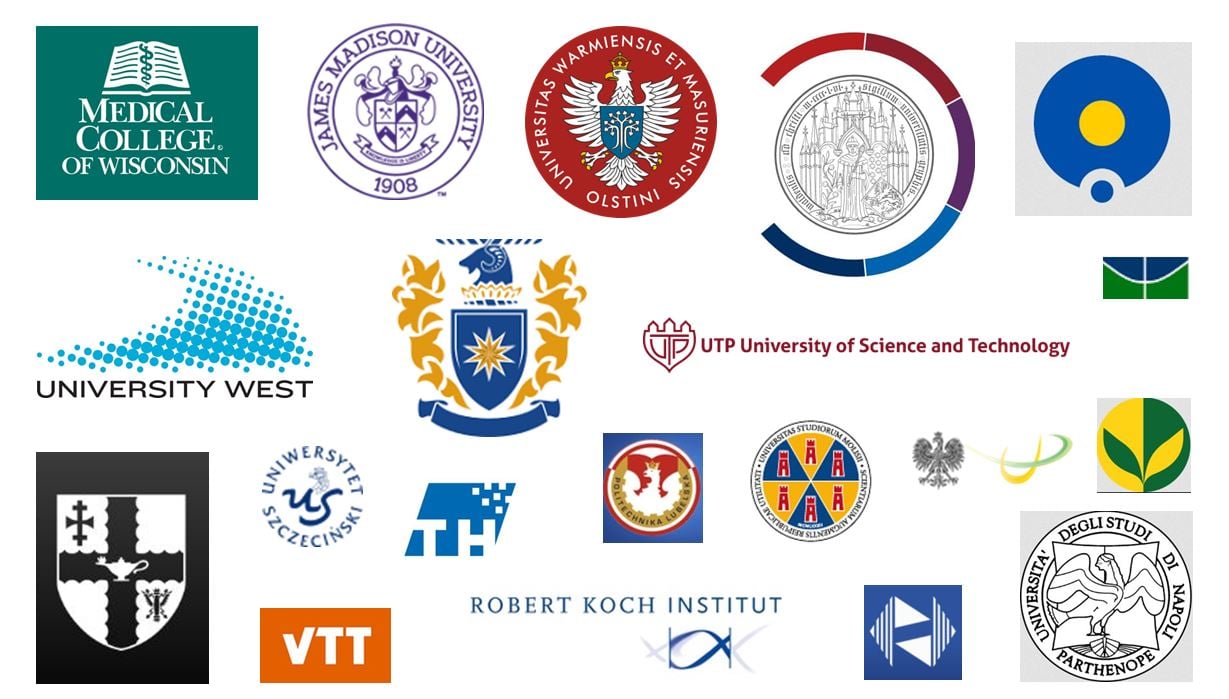
Authors affiliated with these institutions can now enjoy a discount on the APC for papers accepted for publication in any MDPI journal. If you would like to learn more about our program, please visit: https://www.mdpi.com/about/ioap or email us at ioap@mdpi.com.
5 March 2019
MDPI Joins Jisc’s Publications Router Service
We are delighted to announce our participation in Jisc’s Publication Router project, as of March 2019.
Publications Router is a Jisc service that automatically sends notifications about research articles to institutions' systems such as their repositories or CRISs, since May 2015. Through this agreement, MDPI will provide Jisc with daily feeds and information regarding published articles, which will be gathered by their system and delivered to institutions also registered to this service. Nearly all of our articles are published within 15 days of acceptance, so institutions will receive them quite promptly.
The feed will include the full text of the published version of record, with no embargo, so the articles can be exposed immediately for public view. They are accompanied by rich metadata, including confirmation of the immediate CC BY licence, minimising the need for any manual intervention or checking.
For more information about Publications Router, you may contact Jisc’s central helpdesk at help@jisc.ac.uk. For any queries about MDPI’s institutional agreements and collaborations, you may get in touch with MDPI’s Institutional Engagement team at ioap@mdpi.com, which would be very happy to hear from further UK institutions.
1 February 2019
2018 MDPI Top Reviewer Award—Winners Announced
Rigorous peer-review is the cornerstone of high quality academic publishing. Over 97,000 scholars served as reviewers for MDPI journals in 2018. We are extremely appreciative of all those who made a contribution to the editorial process in this capacity. At the beginning of every year, journal editorial offices publish a list all reviewers’ names to express our gratitude. In addition, this year the “MDPI Top Reviewer Awards” are announced, to recognize the very best reviewers for their expertise, dedication, high quality, and timely review reports. We are pleased to announce the following winners of the 2018 MDPI Top Reviewer Awards:
- Ali Behnood
- Andrea Pezzuolo
- Angela Gorgoglione
- Anna D'Auria
- Antonio D'Andrea
- Azhar Abbas
- Bogdan Zagajewski
- Chunhui Chen
- Dominika Głąbska
- Dominika Guzek
- Dragan Pamucar
- Francisco J. G. Silva
- Frank Li
- Gianluca Serafini
- Gyorgy Szekely
- Haozhi Pan
- Helvi Heinonen-Tanski
- José Manuel Gómez-Soberón
- Kathy Lewis
- Klara Kosova
- Luis N. López De Lacalle
- M. Z. Naser
- Malwina Tytła
- Masoume Amirkhani
- Matteo Ghidelli
- Moretti Laura
- Petra Schneider
- Roberto Cerchione
- Spyros Papaefthymiou
- Ştefan Cristian Gherghina
24 January 2019
JAMS Journals: A Low-Cost Publishing Platform

Since 2010, MDPI has run its own online submission system. More recently, we have made the software, with accompanying publishing services, available to other publishers as JAMS (Journal and Article Management System). We are now delighted to announce the launch of JAMS Journals, a standardized platform for operating open access journals at low cost.
JAMS Journals provides a comprehensive service, including a shared submission website, journal websites hosted at a URL provided by the publisher, and a full production service. There is a small setup fee and the cost for each published paper is just a few hundred Swiss francs.
The platform demonstrates that running an open access journal can be straightforward and affordable. The JAMS Journals platform is suitable for
- small publishers or groups of scholars looking to launch their own journal;
- existing publishers or societies seeking to explore open access options;
- publishers looking to convert an existing subscription journal to open access.
JAMS journals launches with two journals from Canadian-based publisher Etcetera Publications:
- Canadian Journal of Pesticides & Pest Management (http://www.cjppm.ca)
- Nanotechnology in Agriculture, Food & Environment (http://www.nanoafe.ca)
Dr AJ Al-Rajab (President of Etcetera Publications) comments:
“In the past few months, we were working on our project to launch new open access scientific journals in the field of agricultural and environmental sciences. We decided to go with JAMS for this venture because of the high quality of their services, reasonable prices, professionalism and easy communication. Our portfolio is expected to grow rapidly during 2019 to include more titles covering different areas in agriculture and environment. MDPI earned already our complete satisfaction and we are looking for a long term cooperation.”
Alongside the new platform, we continue to provide flexible, tailored journal management solutions for existing publishers. For any questions or to request a quotation, contact Dr. Constanze Schelhorn (constanze.schelhorn@mdpi.com).
24 January 2019
Popularity of Preprints Continues to Grow

2018 was a great year for preprints, with increasing numbers of authors looking to make their papers available online before peer review. Along with other preprint servers, our platform Preprints.org saw an increase in the uptake from authors, and more than double the number of announced papers compared to 2017. In fact, we recently passed two important milestones: 8000 preprints online and 30,000 authors.
We believe that the whole research community has the opportunity to benefit from work being available online as early as possible. We thank and congratulate our authors for supporting us to make this goal a reality.
In 2019, we will be looking carefully at how to provide better value for authors, maintain efficiency while growing in size, and make sure we remain well-connected with the research community.
If you want to participate, you can consider screening preprints or joining our advisory board. And, of course, posting your own work.
9 January 2019
Open Access Agreement between the Austrian Academic Library Consortium (KEMÖ), the Austrian Science Fund (FWF), and MDPI

We are delighted to announce the establishment of our national Open Access agreement with the Austrian Academic Library Consortium (KEMÖ) and the Austrian Science Fund (FWF). Through this national agreement, the Austrian institutions listed below as well as FWF will cover the Article Processing Charges (APC) of manuscripts published by eligible corresponding or funded authors in MDPI journals as long as central funds are available.
All participating institutions have gained access to the MDPI online submission system where they can find full article metadata and pricing information as well as Funder and Grant ID details for easy identification and additional transparency. At the same time eligible authors are benefited from an APC discount which comes at no cost for the institutions.
Eligible corresponding authors affiliated with the participating institutions are prompted to choose the corresponding Institutional Open Access Program (IOAP) when they submit an article via our online submission system. The program will be selected automatically if authors submit their papers using their institutional email address. To claim their discount, FWF funded authors should choose the particular funder and add their Grant ID upon online submission of their manuscript. The institutions will then crosscheck the information and confirm the APC funding.
Eligible authors that have their APC covered by their institution or funder are advised to include the following sentence in their acknowledgments: "Open Access Funding by the [name of the institution/funder]".
The full text of the agreement is openly available online at: http://doi.org/10.5281/zenodo.2536007
For any questions about the agreement, please contact the KEMÖ Consortium at emedien@obvsg.at, FWF at Katharina.Rieck@fwf.ac.at, or the MDPI IOAP team at ioap@mdpi.com.
The Austrian institutions participating in this agreement are:
- Austrian Science Fund (FWF)
- University for Continuing Education Krems
- University of Applied Sciences BFI Vienna
- University of Applied Sciences Upper Austria
- University of Applied Sciences Technikum Wien
- Vorarlberg University of Applied Sciences
- International Institute for Applied Systems Analysis (IIASA)
- Institute of Science and Technology Austria
- MCI Management Center Innsbruck
- University of Graz
- University of Linz
- University of Salzburg
- Graz University of Technology
- TU Wien
- University of Veterinary Medicine Vienna
- University of Vienna
This is our first collective agreement with a national library consortium, while the individual institutions around the world participating in our IOAP are now more than 500 - see details here: https://www.mdpi.com/about/ioap. We would be mostly interested in discussing about possible collaborations with other consortia, funders, and institutions in our mutual efforts to accelerate Open Access.
2 January 2019
Encyclopedia—the Scholarly Community Encyclopedia

We are pleased to announce the new platform Encyclopedia, which is an online reference created and curated by active scholars. It aims to highlight the latest research results as well as providing benchmark information for researchers and the general public interested in accurate and advanced knowledge on specific topics.
We encourage authors of review articles to quote and adapt the content of their published papers to create Encyclopedia entries. You can create completely new entries on topics in which you have knowledge and expertise. There is no limit on the topics or research fields. All of science and the humanities are included. Each entry will be published directly after submission.
We also have prepared a DOI application function in Encyclopedia. Once a DOI application is approved, the entry website will announce the DOI number and a pdf version with DOI information will be automatically created.
We look forward to your contributions and hope you will make use of this service. Find more about the service at: https://encyclopedia.pub/
30 October 2018
Institutional Open Access Agreement between Bill and Melinda Gates Foundation and MDPI

We are delighted to announce that the Bill and Melinda Gates Foundation (BMGF) is now a participant of our Institutional Open Access Program (IOAP). Authors funded by the BMGF can enjoy discounts on the APC, while the funder covers the costs of eligible articles centrally. BMGF also has access to the MDPI online submission system where they can find full article metadata and pricing information as well as Grant ID details for easy identification and additional transparency.
We hope that funded authors find the programme beneficial and we are happy to offer our IOAP to other funders that need a streamlined workflow of compliance checking and APC coverage.
To claim their discount, BMGF funded authors should choose the particular funder and add their Grant ID upon online submission of their manuscript.
For any questions about the BMGF agreement, please contact the funder at support@chronos-oa.com or the MDPI IOAP team at ioap@mdpi.com.
2 October 2018
MDPI Welcomes Plan S
Recently, it was announced that a group of European funders supported 10 principles that will help to expand open access, known as Plan S. MDPI warmly welcomes this move as a step towards achieving more open and accessible communication of research across all disciplines. Some aspects remain to be clarified, however the details given so far match the aims and values that MDPI has held over the past two decades.

We believe that open access publishers should be active participants in discussions around Plan S, particularly regarding potential new business models and practical aspects of implementation. MDPI supports APCs as a transparent unit of payment for article publishing, however we are committed to exploring other measures and recently signed the Jussieu Call. Sustainability is a key value for MDPI, and future funding models should have at their heart the sustainability of knowledge and research dissemination. Plan S provides an opportunity for funders and publishers to directly discuss funding of open access journals in ways that are beneficial to all parties involved.
30 August 2018
MDPI establishes Open Access agreement with Qatar National Library

We are happy to announce the establishment of an Open Access (OA) agreement with Qatar National Library (QNL). QNL is committed to supporting and helping Qatar authors publish OA at no cost. Through this national agreement, QNL will cover the Article Processing Charges (APC) of manuscripts published by Qatar-based corresponding authors in MDPI journals.
Eligible corresponding authors affiliated with Qatar research centers and universities are prompted to choose QNL as part of our Institutional Open Access Program (IOAP) when they submit an article via our online submission system. The program will be selected automatically if authors submit their papers using their institutional email and/or a computer registered with the institution’s IP range. QNL will then crosscheck the information and confirm the APC funding.
Qatar authors that have their APC covered by QNL are advised to include the following sentence in their acknowledgments: "The publication of this article was funded by Qatar National Library".
For more information, please visit Open Access at QNL or email the QNL Open Access team at openaccess@qnl.qa.
31 May 2018
Biology 2017 CiteScore™ Announced - 3.48
We are pleased to report Biology received a CiteScore of 3.48 for 2017. The metric reflects citation activity in 2017 in Scopus for papers published in the period 2014‒2016.
For the full details in the current CiteScore release, please see the journal's Source profile. To check the full list of MDPI journals receiving CiteScores, please see here.
31 May 2018
2017 CiteScore™ Metrics Released
The 2017 CiteScore™ data is available now, based on citation data in the Scopus® database. The current CiteScore reflects citation activity in 2017 for articles published in 2014‒2016. Please note that the list below includes journals assigned a CiteScore in this year’s release. For a full list of journals indexed in Scopus, please see our journal list.
Thirteen of our journals received a CiteScore which is in the top 10% of the distribution in at least one of the categories (marked with * in the table below), while a further 32 journals exhibit scores that are in the first quartile of the respective categories.
To access the full data for MDPI journals, please see here. More data can also be found in SJR Scimago Journal & Country Rank.
Unlike CiteScores and the widely used Journal Impact Factors, the Source Normalized Impact per Paper (SNIP) metrics are normalized in order to correct for differences in citation practices between scientific fields. Therefore, the SNIP allows direct comparison between journals specialized in different fields.
According to 2017 data, MDPI publishes six journals with an average citation impact, or SNIP, in excess of 1.500. These journals are Biomolecules, Cancers, Journal of Clinical Medicine (JCM), Marine Drugs, Remote Sensing and Sensors (see the last column in the table below).
CiteScore Data for MDPI Journals
| Journal | Rank (Quartile) |
Category | Link | CiteScore 2017 | 2016 |
2015 |
SNIP 2017 |
| Aerospace | 43/116 (Q2) | • Aerospace Engineering | Link | 1.23 | - | - | 1.152 |
| Agriculture | 69/309 (Q1) 91/398 (Q1) 78/255 (Q2) |
• Agronomy and Crop Science • Plant Science • Food Science |
Link | 1.93 | - | - | 1.133 |
| Agronomy | 46/309 (Q1) | • Agronomy and Crop Science | Link | 2.38 | - | - | 1.115 |
| Algorithms | 22/46 (Q2) 61/125 (Q2) 60/107 (Q3) 64/114 (Q3) |
• Numerical Analysis • Computational Mathematics • Computational Theory and Mathematics • Theoretical Computer Science |
Link | 1.03 | 1.15 | 1.07 | 0.749 |
| Animals | 12/154 (Q1) * 48/367 (Q1) |
• General Veterinary • Animal Science and Zoology |
Link | 2.02 | 1.46 | 1.66 | 1.099 |
| Antibiotics | 6/68 (Q1) * 62/263 (Q1) 55/230 (Q1) 31/108 (Q2) 47/134 (Q2) 139/398 (Q2) |
• General Pharmacology, Toxicology and Pharmaceutics • Infectious Diseases • Pharmacology (medical) • Microbiology (medical) • Microbiology • Biochemistry |
Link | 2.85 | 1.65 | - | 0.975 |
| Antibodies | 43/143 (Q2) 61/164 (Q2) 85/189 (Q2) |
• Drug Discovery • Immunology and Allergy • Immunology |
Link | 2.85 | - | - | 0.844 |
| Antioxidants | 23/119 (Q1) 35/169 (Q2) 100/398 (Q2) 119/367 (Q2) 102/264 (Q2) |
• Clinical Biochemistry • Physiology • Biochemistry • Molecular Biology • Cell Biology |
Link | 3.42 | - | - | 1.361 |
| Applied Sciences | 48/270 (Q1) 15/66 (Q1) 31/116 (Q2) 18/53 (Q2) 151/434 (Q2) 186/535 (Q2) |
• General Engineering • Fluid Flow and Transfer Processes • Instrumentation • Process Chemistry and Technology • General Materials Science • Computer Science Applications |
Link | 1.90 | - | - | 0.801 |
| Biology | 12/177 (Q1)* 32/186 (Q1) 10/40 (Q1) |
• General Agricultural and Biological Sciences • General Biochemistry, Genetics and Molecular Biology • General Immunology and Microbiology |
Link | 3.48 | 3.02 | 2.78 | 0.961 |
| Biomolecules | 31/398 (Q1) * 41/367 (Q1) |
• Biochemistry • Molecular Biology |
Link | 5.72 | 1.67 | 3.08 | 1.542 |
| Biosensors | 20/119 (Q1) | • Clinical Biochemistry | Link | 3.59 | 2.83 | 2.37 | 1.122 |
| Brain Sciences | 47/111 (Q2) | • General Neuroscience | Link | 2.56 | - | - | 0.695 |
| Cancers | 26/323 (Q1) * 23/191 (Q1) |
• Oncology • Cancer Research |
Link | 5.82 | 5.02 | 4.07 | 1.567 |
| Catalysts | 32/151 (Q1) 21/46 (Q2) |
• Physical and Theoretical Chemistry • Catalysis |
Link | 3.23 | 3.44 | 3.45 | 0.954 |
| Crystals | 76/272 (Q2) 140/434 (Q2) 127/398 (Q2) 26/64 (Q2) |
• General Chemical Engineering • General Materials Science • Condensed Matter Physics • Inorganic Chemistry |
Link | 1.97 | 1.89 | 1.47 | 0.745 |
| Diagnostics | 49/119 (Q2) | • Clinical Biochemistry | Link | 2.43 | - | - | 0.788 |
| Diversity | 30/124 (Q1) 14/52 (Q2) 83/306 (Q2) 11/29 (Q2) |
• Nature and Landscape Conservation • Agricultural and Biological Sciences (miscellaneous) • Ecology • Ecological Modelling |
Link | 2.15 | 2.03 | 1.96 | 1.300 |
| Electronics | 109/644 (Q1) 26/148 (Q1) 42/224 (Q1) 50/259 (Q1) 23/96 (Q1) |
• Electrical and Electronic Engineering • Hardware and Architecture • Control and Systems Engineering • Computer Networks and Communications • Signal Processing |
Link | 2.97 | - | - | 1.227 |
| Energies | 6/73 (Q1) * 31/192 (Q1) 103/644 (Q1) 4/16 (Q1) 47/140 (Q2) |
• Control and Optimization • Energy Engineering and Power Technology • Electrical and Electronic Engineering • Energy (miscellaneous) • Renewable Energy, Sustainability and the Environment |
Link | 3.11 | 2.50 | 2.87 | 1.340 |
| Entropy | 35/202 (Q1) | • General Physics and Astronomy | Link | 2.41 | 1.87 | 1.99 | 1.189 |
| Forests | 17/129 (Q1) | • Forestry | Link | 2.31 | 2.06 | 1.76 | 0.990 |
| Future Internet | 132/259 (Q3) | • Computer Networks and Communications | Link | 1.25 | - | - | - |
| Games | 132/187 (Q3) 78/110 (Q3) 305/418 (Q3) |
• Statistics and Probability • Statistics, Probability and Uncertainty • Applied Mathematics |
Link | 0.61 | 0.87 | 0.57 | 1.038 |
| Genes | 21/91 (Q1) 74/311 (Q1) |
• Genetics (clinical) • Genetics |
Link | 3.49 | 3.62 | 3.18 | 0.374 |
| Geosciences | 32/182 (Q1) |
• General Earth and Planetary Sciences | Link | 1.97 | 1.67 | 1.29 | 0.856 |
| Information | 143/251 (Q3) | • Information Systems | Link | 1.16 | 0.78 | 0.94 | 1.146 |
| Insects | 27/135 (Q1) | • Insect Science | Link | 1.85 | 1.81 | 1.38 | 0.719 |
| International Journal of Environmental Research and Public Health (IJERPH) | 80/478 (Q1) 34/106 (Q2) |
• Public Health, Environmental and Occupational Health • Health, Toxicology and Mutagenesis |
Link | 2.41 | 2.38 | 2.42 | 0.931 |
| International Journal of Molecular Sciences (IJMS) | 7/69 (Q1) * 61/535 (Q1) 20/163 (Q1) 9/64 (Q1) 26/151 (Q1) 89/367 (Q2) 17/46 (Q2) |
• Spectroscopy • Computer Science Applications • Organic Chemistry • Inorganic Chemistry • Physical and Theoretical Chemistry • Molecular Biology • Catalysis |
Link | 3.86 | 3.73 | 3.37 | 0.998 |
| ISPRS International Journal of Geo-Information (IJGI) | 79/605 (Q1) 22/82 (Q2) 13/36 (Q2) |
• Geography, Planning and Development • Earth and Planetary Sciences (miscellaneous) • Computers in Earth Sciences |
Link | 2.10 | 1.62 | 1.52 | 1.062 |
| Journal of Clinical Medicine (JCM) | 10/841 (Q1) * | • General Medicine | Link | 7.07 | - | - | 1.535 |
| Journal of Functional Biomaterials (JFB) | 43/199 (Q1) 23/77 (Q2) |
• Biomedical Engineering • Biomaterials |
Link | 3.47 | - | - | 1.344 |
| Journal of Low Po- wer Electronics and Applications (JLPEA) |
301/644 (Q2) | • Electrical and Electronic Engineering | Link | 1.12 | 0.98 | 0.83 | 0.367 |
| Journal of Personalized Medicine (JPM) | 54/189 (Q2) | • Medicine (miscellaneous) | Link | 2.61 | - | - | 0.944 |
| Land | 50/124 (Q2) 129/306 (Q2) 36/65 (Q3) |
• Nature and Landscape Conservation • Ecology • Global and Planetary Change |
Link | 1.44 | - | - | 0.658 |
| Life | 4/94 (Q1) * 70/561 (Q1) 40/186 (Q1) 20/80 (Q2) |
• Palaeontology • Ecology, Evolution, Behavior and Systematics • General Biochemistry, Genetics and Molecular Biology • Space and Planetary Science |
Link | 3.16 | 2.95 | 1.68 | 0.935 |
| Marine Drugs | 17/146 (Q1) | • Drug Discovery | Link | 4.58 | 3.83 | 3.66 | 1.537 |
| Materials | 83/434 (Q1) | • General Materials Science | Link | 3.02 | 3.26 | 3.11 | 1.285 |
| Membranes | 5/18 (Q2) 15/53 (Q2) 4/10 (Q2) |
• Chemical Engineering (miscellaneous) • Process Chemistry and Technology • Filtration and Separation |
Link | 2.69 | 2.19 | 2.95 | 0.880 |
| Metabolites | 47/209 (Q1) 103/398 (Q2) 127/367 (Q2) |
• Endocrinology, Diabetes and Metabolism • Biochemistry • Molecular Biology |
Link | 3.35 | - | - | 0.925 |
| Metals | 155/434 (Q2) | • General Materials Science | Link | 1.87 | - | - | 0.955 |
| Micromachines | 105/554 (Q1) 154/644 (Q1) 64/224 (Q2) |
• Mechanical Engineering • Electrical and Electronic Engineering • Control and Systems Engineering |
Link | 2.31 | 1.83 | 1.78 | 0.987 |
| Minerals | 33/175 (Q1) 45/208 (Q1) |
• Geotechnical Engineering and Engineering Geology • Geology |
Link | 2.21 | 2.13 | 1.77 | 1.149 |
| Molecules | 4/25 (Q1) 25/172 (Q1) 18/104 (Q1) 31/163 (Q1) 30/151 (Q1) 31/146 (Q1) 55/160 (Q2) |
• Chemistry (miscellaneous) • Pharmaceutical Science • Analytical Chemistry • Organic Chemistry • Physical and Theoretical Chemistry • Drug Discovery • Molecular Medicine |
Link | 3.27 | 3.09 | 2.65 | 1.146 |
| Nutrients | 11/255 (Q1) * 9/112 (Q1) * |
• Food Science • Nutrition and Dietetics |
Link | 4.35 | 4.29 | 4.07 | 1.403 |
| Pathogens | 38/263 (Q1) 20/108 (Q1) 9/40 (Q1) 40/164 (Q1) 110/367 (Q2) |
• Infectious Diseases • Microbiology (medical) • General Immunology and Microbiology • Immunology and Allergy • Molecular Biology |
Link | 3.52 | - | - | 1.166 |
| Pharmaceuticals | 14/172 (Q1) * 33/160 (Q1) |
• Pharmaceutical Science • Molecular Medicine |
Link | 4.12 | 4.90 | 3.64 | 1.370 |
| Pharmaceutics | 21/172 (Q1) | • Pharmaceutical Science | Link | 3.68 | 3.83 | 2.68 | 1.092 |
| Photonics | 30/116 (Q1) 80/270 (Q2) 53/160 (Q2) |
• Instrumentation • Radiology Nuclear Medicine and Imaging • Atomic and Molecular Physics, and Optics |
Link | 1.96 | - | - | 0.817 |
| Plants | 73/561 (Q1) 48/389 (Q1) 44/306 (Q1) |
• Ecology, Evolution, Behavior and Systematics • Plant Science • Ecology |
Link | 3.13 | - | - | 0.969 |
| Polymers | 17/142 (Q1) 63/359 (Q1) |
• Polymers and Plastics • General Chemistry |
Link | 3.30 | 3.74 | 3.37 | 1.213 |
| Religions | 26/389 (Q1) * | • Religious Studies | Link | 0.56 | - | - | 0.676 |
| Remote Sensing | 13/182 (Q1) * | • General Earth and Planetary Sciences | Link | 4.03 | 3.56 | 3.76 | 1.559 |
| Resources | 19/142 (Q1) 39/261 (Q1) |
• Nature and Landscape Conservation • Management, Monitoring, Policy and Law |
Link | 2.69 | - | - | 1.387 |
| Scientia Pharmaceutica | 92/172 (Q3) | • Pharmaceutical Science | Link | 0.86 | - | - | 0.513 |
| Sensors | 9/116 (Q1) * 25/160 (Q1) 100/644 (Q1) 19/104 (Q1) 113/398 (Q2) |
• Instrumentation • Atomic and Molecular Physics, and Optics • Electrical and Electronic Engineering • Analytical Chemistry • Biochemistry |
Link | 3.23 | 2.78 | 2.21 | 1.550 |
| Social Sciences | 81/213 (Q2) | • General Social Sciences | Link | 0.60 | - | - | 0.445 |
| Sustainability | 61/605 (Q1) * 55/261 (Q1) 60/140 (Q2) |
• Geography, Planning and Development • Management, Monitoring, Policy and Law • Renewable Energy, Sustainability and the Environment |
Link | 2.37 | 1.96 | 1.78 | 1.030 |
| Symmetry | 44/327 (Q1) 17/45 (Q2) 16/40 (Q2) 14/25 (Q2) |
• General Mathematics • Computer Science (miscellaneous) • Physics and Astronomy (miscellaneous) • Chemistry (miscellaneous) |
Link | 1.32 | 1.12 | 0.95 | 0.802 |
| Toxins | 18/106 (Q1) 21/111 (Q1) |
• Health, Toxicology and Mutagenesis • Toxicology |
Link | 3.32 | 3.34 | 3.76 | 1.136 |
| Vaccines | 5/230 (Q1) * 13/263 (Q1) * 18/302 (Q1) * 11/146 (Q1) * 32/189 (Q1) |
• Pharmacology (medical) • Infectious Diseases • Pharmacology • Drug Discovery • Immunology |
Link | 4.88 | 1.23 | 3.76 | 1.255 |
| Viruses | 29/263 (Q1) 16/68 (Q1) |
• Virology • Infectious Diseases |
Link | 3.88 | 3.60 | 3.74 | 1.130 |
| Water | 66/605 (Q1) 37/191 (Q1) 43/199 (Q1) 193/398 (Q2) |
• Geography, Planning and Development • Water Science and Technology • Aquatic Science • Biochemistry |
Link | 2.29 | 2.05 | 1.96 | 1.007 |
30 April 2018
Winners of the First MDPI Writing Prize
We are pleased to announce the results of the first MDPI Writing Prize. We received a large number of entries from across the globe on the theme of “The Global Benefits of Open Research”. It was a pleasure to read so many original, well-researched and well-presented ideas, and the final choice was not an easy one. We are pleased to announce that the winners are as follows:
1st prize (500 CHF, Swiss knife and certificate)
Edmond Sanganyado, Shantou University, China
2nd prizes (250 CHF, Swiss knife and certificate)
Kamala T. Rajahgopal, Asia e University, Malaysia
Yin Zhixuan, Qingdao University of Technology, China
3rd prizes (100 CHF, Swiss knife and certificate)
Alexandra Ticea, Carol Davila University of Medicine and Pharmacy, Romania
Ankur Sarker, University of Virginia, USA
Daniel Attoye, United Arab Emirates University, UAE
Congratulations to all of them! The winning entries can be downloaded by clicking on the names above. A compilation of all entries will soon be available as an open access book.
The writing prize is sponsored by the MDPI English editing service.
27 April 2018
Meet Us at the 2018 ESA, ESC, and ESBC Joint Annual Meeting

Location: Vancouver Convention Center, Vancouver, Canada
Date: 11–14 November 2018
We will be attending the 2018 ESA, ESC, and ESBC Joint Annual Meeting (Entomology 2018) in Vancouver, Canada from November 11 to 14, 2018. The Entomological Society of America (ESA) is the largest organization serving the professional and scientific needs of entomologists and individuals in related disciplines from around the world. This Annual Meeting offers unique opportunities to share your research, gain exposure, and collaborate across border and across these three Societies. Connect with over 3,000 scientists and researchers from around the globe over the four science-filled days. Representatives of the following MDPI open access journals will attend:
Insects (https://www.mdpi.com/journal/insects)
Agriculture (https://www.mdpi.com/journal/agriculture)
Agronomy (https://www.mdpi.com/journal/agronomy)
Biology (https://www.mdpi.com/journal/biology)
Diversity (https://www.mdpi.com/journal/diversity)
Forests (https://www.mdpi.com/journal/forests)
If you are attending this conference, please stop by our booth (Booth #407). Our delegates look forward to meeting you in person and answering any questions you may have concerning open access publishing and our journals.
For more information about the conference, please visit:
23 March 2018
Check for Updates: A New Function in the Article PDF Version

At MDPI, we always want to keep you up to date. Even for already published articles, some corrections or minor changes may occur. To prevent you from missing any updates, from now on you will be able to access the latest version of any manuscript by clicking on the “check for updates” logo that you can find in the PDF file, even if you have saved the file on your computer.
13 March 2018
MDPI Becoming a Member of UKSG
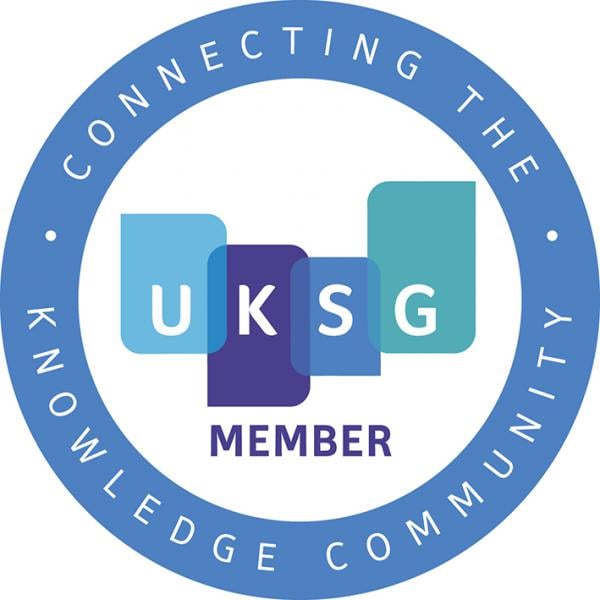
We are proud to announce that MDPI is now a member of UKSG, the UK´s largest scholarly communications community. Through UKSG, different stakeholders share their knowledge and experience in order to improve the knowledge and information environment for researchers. UKSG´s members include universities, publishers, content providers, intermediaries, and other similar organisations. Members participate in discussions and events on issues around scholarly communications.
The UKSG Annual Conference and Exhibition is a flagship initiative from the UKSG and one of the most stimulating events in the scholarly communications calendar. It is held annually and attracts a large number of delegates. More information is available at https://www.uksg.org/events/annualconference
MDPI is delighted to be a part of this active community and we look forward to making our own contribution. We will continue to support organisations and initiatives that boost collaboration and vision within scholarly communication.
More information about UKSG can be found at https://www.uksg.org/. The full membership list is available at: https://www.uksg.org/members.
1 February 2018
MDPI Signed the San Francisco Declaration on Research Assessment (DORA)

The DORA initiative addresses the need for advanced approaches in the evaluation and measurement of the quality of scientific research outputs. It is a worldwide initiative covering all scholarly disciplines. MDPI proudly joins a list of more than 400 organizations around the world which support DORA’s recommendations for improving the way the quality of research results is evaluated.
More info can be found at http://www.ascb.org/dora/
22 January 2018
Meet Us at the Experimental Biology 2018 (21–25 April 2018) in San Diego, CA, USA

MDPI will be attending the Experimental Biology 2018 annual meeting in San Diego, CA, USA from 21 to 25 April 2018, representing the following open access journals:
Antibiotics
Antioxidants
Behavioral Sciences
Bioengineering
Biology
Biomedicines
Brain Sciences
Cancers
Cells
Dentistry Journal
Diagnostics
Diseases
Epigenomes
Fermentation
Genes
High-Throughput
International Journal of Molecular Sciences (IJMS)
International Journal of Environmental Research and Public Health (IJERPH)
Journal of Clinical Medicine (JCM)
Journal of Developmental Biology (JDB)
Journal of Functional Morphology and Kinesiology (JFMK)
Metabolites
Methods and Protocols
Microorganisms
Non-Coding RNA
Nutrients
Pharmaceuticals
Pharmaceutics
Proteomes
Sports
Veterinary Sciences
Viruses
Experimental Biology is the annual meeting of five societies comprised of more than 14,000 scientists and 25 guest societies.
The areas of primary focus include anatomy; biochemistry and molecular biology; investigative pathology; nutrition; pharmacology; physiology. Attendees represent scientists from academic institutions, government agencies, non-profit organizations and industry.
Conference details:
San Diego Convention Center
San Diego CA
USA
21–25 April 2018
Do you want to learn more about MDPI open access journals? Don’t miss this opportunity to discuss them with our editors and MDPI delegates. If you are at Experimental Biology 2018, just come visit our booth for a moment to have a chat. We have some gifts for you to take home and will answer any questions that you have about the open access journal (booth # 1034).
For more information, please visit:
http://experimentalbiology.org/2018/Home.aspx
19 December 2017
Announcing the MDPI English Writing Prize
The competition is still open until end of March! Please check out the banner for more details: https://mdpi-res.com/data/english-prize.pdf
15 December 2017
UCL Press Adopts the MDPI Editorial Platform JAMS
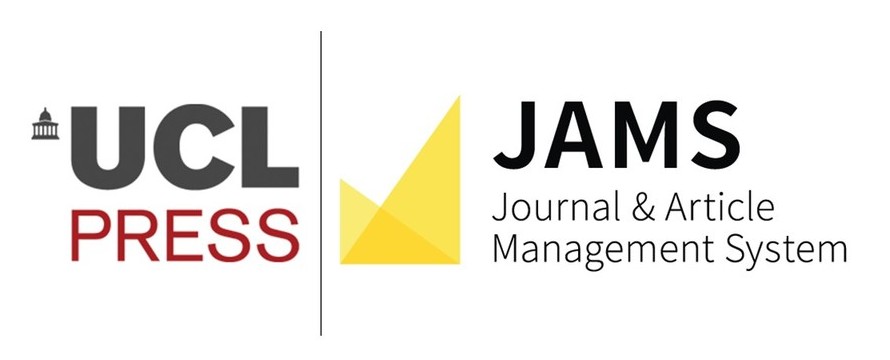
We are delighted to announce that UCL Press has adopted MDPI's Journal Article & Management System, JAMS, including production services. JAMS is a modular, integrated editorial platform for academic publishers. It offers flexibility, ease-of-use, and is a fully integrated solution for the end-to-end management of scholarly journals. JAMS is based on the software used to publish MDPI’s portfolio of journals.
Ian Caswell, UCL Press Journals Manager, says he is "excited to see UCL Press and MDPI partner together to implement the JAMS submission system for all UCL Press journals. The system offered a flexible, efficient and straightforward solution for our processes from author submission to ready for publication. I am grateful for the valuable experience and support MDPI have offered and look forward to developing our programme with an effective submission system in place.” Dr Martyn Rittman, MDPI’s Publishing Services Manager, adds, “We are proud to support one of the UK’s premier university presses in their publishing operation. This is an excellent way for us at MDPI to share our experience and knowledge, and benefit the research community beyond our own journals.”
JAMS combines services that are kept separate for many publishers. The entire editorial process, production and invoicing (e.g. for open access article processing charges) are fully integrated into a single platform. This allows for efficient, fast manuscript processing. For further information about JAMS, see https://www.mdpi.com/publishing_services.
23 November 2017
New Participants in the Institutional Open Access Program (IOAP)
We are pleased to welcome new participants to MDPI's Institutional Open Access Program (IOAP), designed to help institutions manage the transition to the Open Access publishing model. Researchers affiliated with participating universites benefit from a 10% discount on the Article Processing Charges (APC) for any paper published in an MDPI journal, while the participating library or university incurs no basic fee for participating in the program.
The IOAP set of free services, provided by MDPI to institutions that sign up, include:- No fee for participants and no obligation to prolong after the initial 12 months. The participants may withdraw from the programme at any time, and we will also keep it free for the library for as long as they continue in the programme.
- Authors affiliated with the university will receive a 10% discount on the APC.
- The institution is granted free access to the MDPI submission system and can receive free alerts of new submissions to our journals.
- By default, authors from the institution will continue to be invoiced directly unless the institution opts for central billing.
- Auto-archiving of papers into the institutions´ repository as long as it supports SWORD 1.3.
More details about the programme and a list of our current participant institutions can be found at: https://www.mdpi.com/about/ioap
Institutions which are interested to participate may do so online at: https://www.mdpi.com/ioap-form
The following North American universities have signed up to the IOAP program recently:
Connecticut College, USA
Emory University, USA
Florida International University, USA
Johns Hopkins University, USA
Mississippi State University, USA
Northeastern University, USA
Rice University, USA
University of Ontario Institute of Technology, Canada
University of Rhode Island, USA
University of Texas Southwestern Medical Center, USA
University of Toronto, Canada
University of Windsor, Canada
University of Wisconsin–Madison, USA
Wellesley College, USA
West Virginia University, USA
Many prestigious institutions from Europe and Asia have joined as well:
Asia Pacific University of Technology & Innovation, Malaysia
Czech Technical University in Prague, Czech Republic
Gdansk University of Technology, Poland
Martin-Luther-Universität Halle-Wittenberg, Germany
National Chung Hsing University, Taiwan
Newcastle University, UK
Northumbria University, UK
Southwest University, China
Technical University of Crete, Greece
University Malaya, Malaysia
University of Antwerp, Belgium
University of Cyprus, Cyprus
University of Manchester, UK
University of Reading, UK
University of Sussex, UK
University of Warwick, UK
West Pomeranian University of Technology Szczecin, Poland
We offer a warm welcome to the new participants!
10 November 2017
Available Journal Awards at MDPI
In order to reward the academic community, especially young researchers, and enhance communication among scientists, MDPI journals regularly offer various awards to researchers in specific fields, for example, Young Investigator Awards, Travel Awards, Best Paper Awards, and Best Poster Awards, etc. The awardees range from PhD students to junior scientists.
Currently, the following 44 awards given by MDPI journals are accepting applications. Please click on the award title below to check whether you are eligible for it and start the application process.
|
Subject |
Journal |
Award |
Intended Awardee |
|
Biology & Life Sciences |
Animals |
PhD students or postdoctoral researchers |
|
|
Antioxidants |
Postdoctoral researchers or PhD students |
||
|
Biology |
PhD or postdoctoral fellows |
||
|
Forests |
Postdocs or PhD students |
||
|
International Journal of Molecular Sciences (IJMS) |
Ground-breaking contribution in the fields of Molecular Biology, and Molecular Pathology |
||
|
Journal of Fungi (JoF) |
Travel Awards 2018 |
PhD graduate students, and postdoctoral fellows |
|
|
Life |
Travel Award 2018 |
PhD students or postdoctoral fellows |
|
|
Metabolites |
PhD students |
||
|
Pharmaceuticals |
PhD students |
||
|
Toxins |
Postdoctoral fellows |
||
|
Viruses |
Viruses 2018 participants |
||
|
Viruses |
Viruses 2018 participants |
||
|
Water |
2018 Young Investigator Award |
Young investigators |
|
|
Chemistry & Materials Science |
Biomimetics
|
Graduate Student or Postdoctoral Trainee / Research Associate |
|
|
Catalysts |
PhD students |
||
|
Chemosensors |
PhD or postdoctoral fellows |
||
|
Entropy |
Young investigators |
||
|
Fibers |
2018 Travel award |
Postdocs or PhD students |
|
|
Magnetochemistry |
Postdocs |
||
|
Materials |
PhD or postdoctoral fellows |
||
|
Metals |
PhD or postdoctoral fellows |
||
|
Minerals |
PhD or postdoctoral fellows |
||
|
Sensors |
Travel Award 2018 |
PhD or postdoctoral fellows |
|
|
Sensors |
Sensors' reviewers in 2017 |
||
|
Sensors |
Young investigators |
||
|
Technologies |
PhD students |
||
|
Computer Science & Mathematics |
Multimodal Technologies and Interaction (MTI) |
Postdoctoral researchers or PhD students |
|
|
ISPRS International Journal of Geo-Information(IJGI) |
Postdocs |
||
|
Journal of Sensor and Actuator Networks (JSAN) |
Postdoctoral fellows and PhD students |
||
|
Journal of Imaging |
Postdoctoral fellows and PhD students |
||
|
Engineering |
Actuators |
PhD or postdoctoral fellows |
|
|
Remote Sensing |
Authors |
||
|
Machines |
PhD or postdoctoral fellows |
||
|
Micromachines |
PhD or postdoctoral fellows |
||
|
Fluids |
Postdoctoral fellows and PhD students |
||
|
ChemEngineering |
Postdoctoral researchers and PhD students |
||
|
Environmental & Earth Sciences |
Diversity |
Travel Awards 2018 |
Postdoctoral fellows |
|
International Journal of Environmental Research and Public Health (IJERPH) |
Authors who submit from 1 Nov 2017 to 31 Oct 2018 |
||
|
Resources |
Postdocs or PhD students |
||
|
Geosciences |
Postdoctoral fellows and PhD students |
||
|
Physical Sciences & Astronomy |
Galaxies |
Ph.D. students, postdoctoral fellows, or lecturers in cosmology or galaxies physics |
|
|
Applied Science |
Postdocs |
||
|
Medicine & Pharmacology; Public Health & Healthcare |
Journal of Clinical Medicine (JCM) |
PhD or postdoctoral fellows |
|
|
Medicines |
Postdocs |
7 November 2017
MDPI has signed the Jussieu Call for Open Science and Bibliodiversity
The Jussieu Call aims to develop and implement alternative models to meet the aims of open science while promoting bibliodiversity. In particular it wishes to promote new business models for funding open access publication. It was drafted on the Jussieu campus in Paris by a group of French researchers and scientific publishing professionals.
MDPI supports scholarly communities and initiatives that innovate and further promote Open Access publishing. There is a need to explore different frameworks to fund open access in ways that ensure that excessive funds are not diverted from research towards publishing. Many fair funding models already exist, and they can be further developed and extended. These include institutional support, library contributions or subsidies, premium services, participatory funding, etc. For this reason, MDPI has signed up to the Jussieu call and welcomes its aims.
More information can be found at http://jussieucall.org/ (archived here)
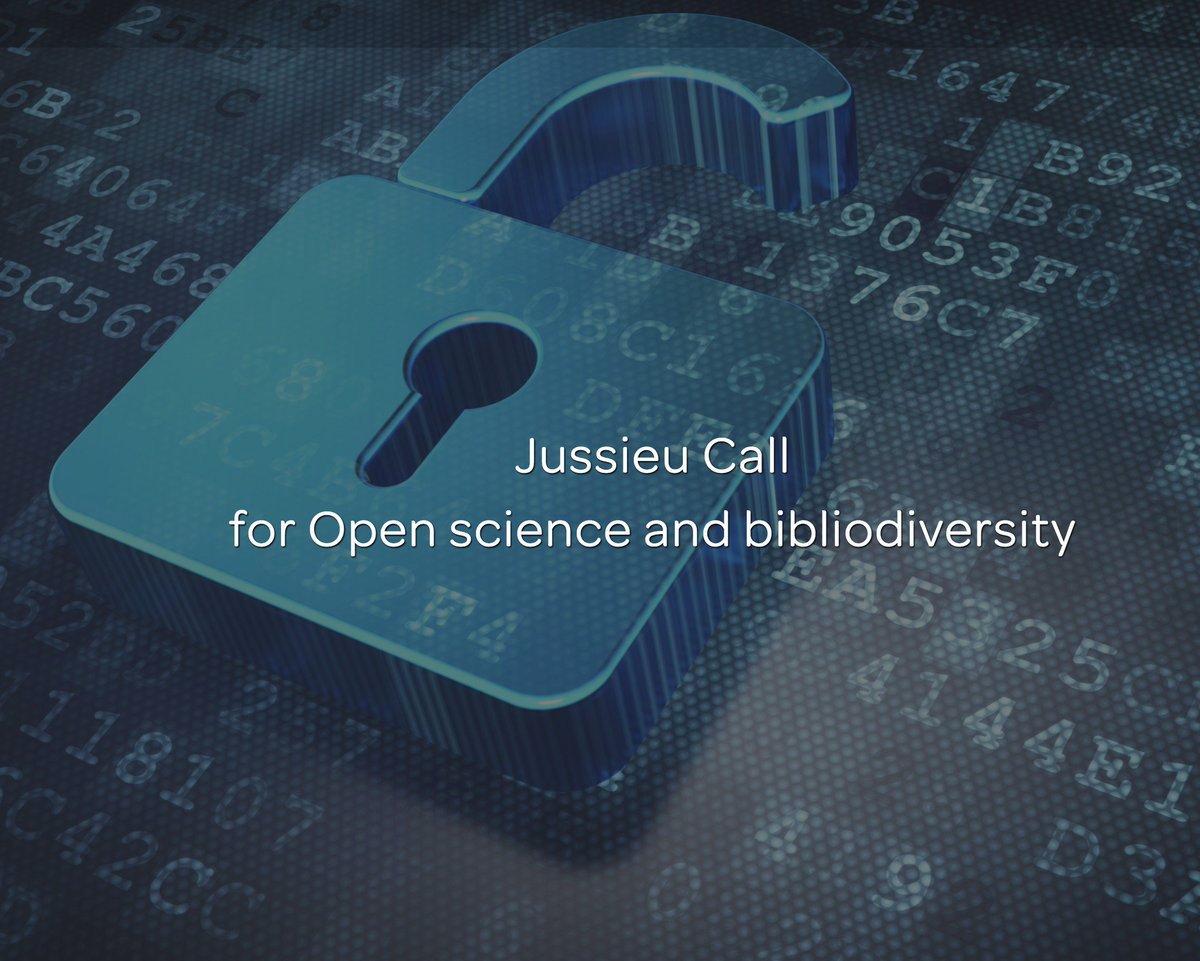
6 October 2017
Dr. Franck Vazquez, MDPI CEO, Interviewed by Scholarly Kitchen
The Society for Scholarly Publishing’s popular blog about topics in academic publishing, Scholarly Kitchen, recently interviewed MDPI’s CEO, Dr. Franck Vazquez. He shared some thoughts and information on the past and future of MDPI and open access publishing in general:
“In the long run, we aim to anchor MDPI in research communities. We recently developed and launched the preprint platform Preprints, revamped our free-to-use conference hosting platform Sciforum, and are working on other projects, such as Scilit, our bibliographic database.”
Read the full interview here.
19 September 2017
A Warm Welcome to the New IOAP Participants
We are delighted to have welcomed 24 new participants to our Institutional Open Access Programme (IOAP) since the beginning of September this year. These are University libraries and Research Institutions located around the world; from the USA and Canada to the UK, and from Norway and Spain to Greece. Well respected Universities, such as the University of Denver, the University of Colorado Boulder, and the University of Arizona in the US, have signed up, while their researchers can now benefit from a 10% discount on the Article Processing Charges (APC) for any papers they publish in MDPI journals, at no cost for the library or the University.
We are more than happy to see the Open Access movement growing stronger and wider every day and we appreciate the vital role which librarians, repository managers, and other scholarly communications professionals play in the field. Our communication with and service to this community is, therefore, one of our principal priorities. The IOAP is our way to support academic and scientific Institutions as well as their scholars in managing, administrating, and publishing research in an Open Access world.
The IOAP set of free services, provided by MDPI to institutions that sign up, include:
- No fee for participants and no obligation to prolong after the initial 12 months. The participants may withdraw from the programme at any time, and we will also keep it free for the library for as long as they continue in the programme.
- Authors affiliated with the university will receive a discount on the article processing charge (APC).
- The institution is granted free access to the MDPI submission system and can receive free alerts of new submissions to our journals.
- By default, authors from the institution will continue to be invoiced directly unless the institution opts for central billing.
- Auto-archiving of papers into the institutions´ repository as long as it supports SWORD 1.3.
More details about the programme and a list of our current participant institutions can be found at: https://www.mdpi.com/about/ioap
Institutions which are interested to participate may do so online at: https://www.mdpi.com/ioap-form
The full list of the Institutions that signed up in September is as follows:
- University of Denver, USA
- University of Colorado Boulder, USA
- University of Arizona, USA
- Institute of Metrology of Bosnia and Herzegovina, Bosnia and Herzegovina
- Middlebury College, USA
- Touro College, USA
- University of New Orleans, USA
- University of Leicester, UK
- Indiana University-Purdue University Indianapolis, USA
- University of Strathclyde, UK
- Cranfield University, UK
- Hope College, USA
- Oregon State University, USA
- Drew University, USA
- Swansea University, UK
- University of South Florida, USA
- University of Georgia, USA
- Arizona State University, USA
- University of Southern Mississippi, USA
- Université du Québec à Chicoutimi, Canada
- Grinnell College, USA
- Norwegian University of Science and Technology, Norway
- University of Patras, Greece
- Public University of Navarre, Spain
19 September 2017
Find Us at ConBio2017: Consortium of Biological Sciences 2017, Kobe Port Island, Japan, 6–9 December 2017
MDPI will be attending the ConBio 2017: Consortium of Biological Sciences 2017 in Kobe, Japan, from 6 to 9 December 2017 representing the open access journals:
International Journal of Molecular Sciences (IJMS)
Biomedicines
Fermentation
Biology
Do you want to learn more about IJMS and other MDPI open access journals? Don’t miss this opportunity to discuss them with our editors such as Masatoshi Maki, Michihiro Mutoh, Hideyuki Yamawaki, Hideaki Itoh, Hitoshi Shimano, Toshiyuki Fukada as well as MDPI delegates. If you are at ConBio2018, just come visit our booth for a moment to have a chat. We have some gifts for you to take home and will answer any questions that you have about the open access journal. Our booth number is B07, located in Building No. 1.
Conference details:
Kobe Port Island
Japan
6–9 December 2017
http://www.aeplan.co.jp/conbio2017/english/index.html
23 June 2017
Congratulations for Publishing the 100,000th Peer-Reviewed Article
Congratulations to the authors Javier Monroy and Javier Gonzalez-Jimenez from Universidad de Malaga, Spain, Victor Hernandez-Bennets, Han Fan and Achim Lilienthal from Örebro University, Sweden for publishing the 100,000th peer-reviewed article.
The article is published in the Chemical Sensors section of Sensors.
GADEN: A 3D Gas Dispersion Simulator for Mobile Robot Olfaction in Realistic Environments
Evermore pressing environmental concerns have led global actors and decision-makers to search for stricter emission monitoring approaches. As part of novel monitoring systems, robots with gas and environmental sensors are a promising solution. However, validation of such robotic inspectors is expensive, time consuming, and plagued by repeatability issues. In this article, we present GADEN (the short form for Gas Dispersion Simulator for Mobile Robot Olfaction in Realistic Environments), which combines gas dispersion and robotics simulation in a common framework. Developed under the widely used Robot Operating System (ROS), GADEN enables validation of sensing strategies with gas dispersion being simulated using computational fluid dynamics and filament dispersion theory. GADEN allows simulating complex, realistic, 3D environments for reproducible testing of robotic gas sensing algorithms. Through qualitative and quantitative evaluations, we show that GADEN is a versatile and user-friendly evaluation tool and emphasize its enormous potential for the mobile robot olfaction community.
Read the full article here: https://www.mdpi.com/1424-8220/17/7/1479/htm
12 June 2017
Meet us at ETOX 18: The European Workshop on Bacterial Protein Toxins, Paris, 26-30 June 2017
Toxins
Pathogens
IJMS
Vaccines
Biomedicines
Biology
Please come along to our booth to talk to our delegates concerning the above journals and the travel awards that you might be interested in. The Editorial Board Members of Toxins, Professors Holger Barth, Emmanuel Lemichez, Cesare Montecucco and Michel R. Popoff will also be there to answer your questions about the journal and publishing. We look forward to meeting you in person to answer any questions you may have. For more information about the conference, please visit http://www.etox18.org/.
6 June 2017
CiteScore™ Metrics Released for Scopus Journals
The CiteScore, the new citation metric for journals covered in the Scopus® database, was released on 1 June 2017, reflecting the citation activity in 2016 for articles published during the three previous years. Please note that the list below does not contain all MDPI journals covered in Scopus. For the CiteScore to serve as a reliable metric at least three volumes of articles need to be indexed in Scopus; journals which have not met this criterion have been omitted here.
Ten MDPI journals received a CiteScore which is in the Top 10% of scores in at least one of the categories, while a further 21 journals exhibit scores that are in the first quartile of the respective categories.
CiteScore Data for MDPI Journals
| Journal | Rank | Category | Link | CiteScore 2016 | 2015 |
2014 |
| Algorithms | 44/112 (Q2) 49/111 (Q2) 19/42 (Q2) 52/113 (Q2) |
• Numerical Analysis • Computational Mathematics • Computational Theory and Mathematics • Theoretical Computer Science |
Link | 1.15 | 1.07 | 1.06 |
| Animals | 69/343 (Q1) 21/146 (Q1) |
• Animal Science and Zoology • General Veterinary |
Link | 1.46 | 1.66 | 0.74 |
| Biology | 13/92 (Q1) 34/81 (Q1) 10/75 (Q1) |
• General Agricultural and Biological Sciences • General Biochemistry, Gene- tics and Molecular Biology • General Immunology and Microbiology |
Link | 3.02 | 2.78 | 1.74 |
| Biomolecules | 234/382 (Q3) 260/353 (Q3) |
• Biochemistry • Molecular Biology |
Link | 1.67 | 3.08 | 1.00 |
| Biosensors | 36/118 (Q2) 209/2156 (Q1) |
• Clinical Biochemistry • General Medicine |
Link | 2.83 | 2.37 | 2.04 |
| Cancers | 29/196 (Q1) 27/321 (Q1) |
• Cancer Research • Oncology |
Link | 5.02 | 4.07 | 2.31 |
| Catalysts | 18/44 (Q2) 27/144 (Q1) |
• Catalysis • Physical and Theoretical Chemistry |
Link | 3.44 | 3.45 | 2.17 |
| Crystals | 70/270 (Q2) 25/64 (Q2) 118/398 (Q2) 131/424 (Q2) |
• General Chemical Engineering • Inorganic Chemistry • Condensed Matter Physics • General Materials Science |
Link | 1.89 | 1.47 | 1.03 |
| Diversity | 10/41 (Q1) 9/25 (Q2) 76/291 (Q2) 24/109 (Q1) |
• Agricultural and Biological Sciences (miscellaneous) • Ecological Modelling • Ecology • Nature and Landscape Conservation |
Link | 2.03 | 1.96 | 1.82 |
| Energies | - | - | Link | 2.50 | 2.87 | 2.66 |
| Entropy | 51/198 (Q2) | • General Physics and Astronomy | Link | 1.87 | 1.99 | 1.69 |
| Forests | 17/127 (Q1) | • Forestry | Link | 2.06 | 1.76 | 1.84 |
| Games | 204/398 (Q3) 83/181 (Q2) 48/105 (Q2) |
• Applied Mathematics • Statistics and Probability • Statistics, Probability and Uncertainty |
Link | 0.87 | 0.57 | 0.64 |
| Genes | 62/300 (Q1) 18/90 (Q1) |
• Genetics • Genetics (clinical) |
Link | 3.62 | 3.18 | 1.33 |
| Geosciences | 36/169 (Q1) |
• General Earth and Planetary Sciences | Link | 1.67 | 1.29 | 1.13 |
| Information | 156/237 (Q3) | • Information Systems | Link | 0.78 | 0.94 | 0.74 |
| Insects | 28/131 (Q1) | • Insect Science | Link | 1.81 | 1.38 | 1.23 |
| International Journal of Environmental Research and Public Health (IJERPH) | 67/446 (Q1) 31/102 (Q2) |
• Public Health, Environmental and Occupational Health • Health, Toxicology and Mutagenesis |
Link | 2.38 | 2.42 | 2.47 |
| International Journal of Molecular Sciences (IJMS) | 23/157 (Q1) 8/64 (Q1) 90/353 (Q1) 22/144 (Q1) 16/44 (Q1) 8/62 (Q1) |
• Organic Chemistry • Inorganic Chemistry • Molecular Biology • Physical and Theoretical Chemistry • Catalysis • Spectroscopy |
Link | 3.73 | 3.37 | 3.06 |
| ISPRS International Journal of Geo-Information | 12/29 (Q2) 28/79 (Q2) 96/587 (Q1) |
• Computers in Earth Sciences • Earth and Planetary Sciences (miscellaneous) • Geography, Planning and Development |
Link | 1.62 | 1.52 | - |
| Journal of Low Power Electronic Applications (JLPEA) | 301/645 (Q2) | • Electrical and Electronic Engineering | Link | 0.98 | 0.83 | 0.83 |
| Life | 65/525 (Q1) 36/186 (Q1) 5/92 (Q1) 20/80 (Q2) |
• Ecology, Evolution, Behavior and Systematics • General Biochemistry, Gene- tics and Molecular Biology • Palaeontology • Space and Planetary Science |
Link | 2.95 | 1.68 | 1.20 |
| Marine Drugs | 18/145 (Q1) | • Drug Discovery | Link | 3.83 | 3.66 | 3.59 |
| Materials | 63/424 (Q1) | • General Materials Science | Link | 3.26 | 3.11 | 2.69 |
| Membranes | 103/424 (Q1) | • Materials Science | Link | 2.19 | 2.95 | 2.42 |
| Micromachines | 173/645 (Q2) 69/211 (Q2) 113/526 (Q1) |
• Electrical and Electronic Engineering • Control and Systems Engineering • Mechanical Engineering |
Link | 1.83 | 1.78 | 2.10 |
| Minerals | 45/206 (Q1) 29/167 (Q1) |
• Geology • Geotechnical Engineering and Engineering Geology |
Link | 2.13 | 1.77 | - |
| Molecules | 32/157 (Q1) | • Organic Chemistry | Link | 3.09 | 2.65 | 2.62 |
| Nutrients | 12/247 (Q1) | • Food Science | Link | 4.29 | 4.07 | 3.78 |
| Pharmaceuticals | 8/168 (Q1) 21/158 (Q1) |
• Pharmaceutical Science • Molecular Medicine |
Link | 4.90 | 3.64 | 1.92 |
| Pharmaceutics | 19/168 (Q1) | • Pharmaceutical Science | Link | 3.83 | 2.68 | 2.46 |
| Polymers | 13/138 (Q1) 44/354 (Q1) |
• Polymers and Plastics • General Chemistry |
Link | 3.74 | 3.37 | 4.10 |
| Remote Sensing | 13/169 (Q1) | • General Earth and Planetary Sciences | Link | 3.56 | 3.76 | 3.23 |
| Sensors | 25/96 (Q2) 25/159 (Q1) 124/382 (Q2) 103/645 (Q1) |
• Analytical Chemistry • Atomic and Molecular Physics, and Optics • Biochemistry • Electrical and Electronic Engineering |
Link | 2.78 | 2.21 | 2.40 |
| Sustainability | 49/129 (Q2) 68/587 (Q1) 56/236 (Q1) |
• Renewable Energy, Sustai-nability and the Environment • Geography, Planning and Development • Management, Monitoring, Policy and Law |
Link | 1.96 | 1.78 | 1.52 |
| Symmetry | 17/42 (Q2) 49/111 (Q2) |
• Numerical Analysis • Computational Mathematics |
Link | 1.12 | 0.95 | 1.02 |
| Toxins | 16/102 (Q1) 16/108 (Q1) |
• Health, Toxicology and Mutagenesis • Toxicology |
Link | 3.34 | 3.76 | 2.85 |
| Vaccines | 146/184 (Q4) 151/250 (Q3) 93/145 (Q3) 186/299 (Q3) 130/232 (Q3) |
• Immunology • Infectious Diseases • Drug Discovery • Pharmacology • Pharmacology (medical) |
Link | 1.23 | 3.76 | 2.85 |
| Viruses | 15/68 (Q1) 34/250 (Q1) |
• Virology • Infectious Diseases |
Link | 3.60 | 3.74 | 3.80 |
| Water | 33/184 (Q1) 48/195 (Q1) 62/587 (Q1) 198/382 (Q3) |
• Water Science and Technology • Aquatic Science • Geography, Planning and Development • Biochemistry |
Link | 2.05 | 1.96 | 1.45 |
17 May 2017
Three New Institutional Memberships Established
We are pleased to announce that the Goethe University of Frankfurt, the Technical University of Hamburg (TU Hamburg-Harburg), as well as the Humboldt University of Berlin, in Germany, have joined MDPI's institutional membership program: Primary authors from these instititions will benefit from a 10% discount on the article processing charges.
Additional details can be found on our institutional membership page.
4 May 2017
MDPI Supports the Initiative for Open Citations (I4OC)
As an open access publisher, we are keen to support openness and transparency in the research process. Citation data is very important for assessing the value of individual papers and the contribution of researchers. As such, we support the recently launched Initiative for Open Citations (I4OC). The initiative recognizes that citations should be freely available and machine-readable. By doing so, authors gain the maximum benefit from having their work cited.
MDPI now uploads citation data with metadata uploaded to Crossref when registering digital object identifiers (DOIs) for published papers. We are delighted to take this step to support a truly open research environment.
2 May 2017
Publons Peer Review Academy Goes Live
Getting high quality review reports is critical for any journal’s editorial process. At MDPI we have put in place several measures to motivate reviewers and reward them for their work. We are proud of the quality of reviewer reports we receive and grateful for the hours put in by active researchers from across the globe.
Reviewers of MDPI’s largest journals can get recognition via Publons, a website dedicated to rewarding peer reviewers. They have now taken this one step further and launched the Publons Reviewer Academy to help train reviewers to provide useful feedback. Through the academy, researchers can be trained and tutored in various aspects of how to provide structured feedback that will be of genuine help to editors and authors. We support this initiative and recommend it to potential MDPI reviewers, especially early career researchers. See the Publons announcement for further information.
More information on reviewing for MDPI, including how to volunteer as a reviewer, can be found here.
24 April 2017
Two New Institutional Memberships Established
We are pleased to announce that the following universities have joined MDPI's institutional membership program: Trinity University, San Antonio, Texas, USA and the University of New South Wales (UNSW), Sydney, Australia. Primary authors from these instititions will benefit from a 10% discount on the article processing charges.
Additional details can be found on our institutional membership page.
30 March 2017
Credit for Preprints Comments via Publons
Preprints.org is a platform run by MDPI that allows authors to make early versions of manuscripts available before peer review has been completed.
One of the major benefits of putting a preprint online is to get feedback before journal submission. Until now, however, the feedback has been on a voluntary basis. Preprints is delighted to be the first preprint server to collaborate with Publons to acknowledge substantial comments as reviews and give commentators the opportunity to receive credit for their efforts.
When you add a comment to any article, there is a check box to click for it to appear on Publons. If you have already linked your account it will be passed on automatically. If you don't already have a Publons account, you will be contacted soon afterwards with instructions on how to create one.
We appreciate the enthusiasm and cooperation of Publons in this project and expect it to be of great benefit to authors and commenters alike.
20 March 2017
MDPI 2016 Annual Report Released
We are pleased to announce that our annual report for the year 2016 has now been published.
It contains information regarding company and journal performance, conferences and other publishing services that we provided throughout 2016.
To read the report in full or download a copy, please click here.
15 March 2017
Our 100,000th Article Could be Yours!
After the 20th anniversary of MDPI in 2016, we will reach another milestone this year and will publish the 100,000th peer-reviewed article in one of our 170+ open access journals.
We would like you to be part of this great achievement and so are offering to publish the 100,000th accepted paper free of charge.
To be in with a chance, select a journal in one of our 10 scientific subject areas and submit your paper.
Access the live tracker on published articles here.
![]()
3 March 2017
1000 Preprints Online
We are delighted that Preprints now has 1000 papers online since its launch on 3 May 2016.
For more information, see the editorial here.
9 February 2017
Minister and State Secretaries Visit MDPI Office at STP, Belgrade, Serbia
Earlier this week the Science Technology Park in Belgrade, Serbia was visited by Swiss Secretary of State Dr. Mauro Dell’Ambrogio, as well as Serbian Minister of Public Administration and Local Self-Government Ana Brnabic, State Secretary Dr. Vladimir Popovic and Mayor of Belgrade Mr. Siniša Mali.
During the visit to the STP they had a short presentation from MDPI’s CEO Dr. Franck Vazquez and IT Manager Mr. Miloš Čučulović, and further discussed important issues such as Open Access and Open education. Dr. Dell'Ambrogio said he was impressed with the potential for development and ideas for business.
For more information please see:
http://bit.ly/2kpIu7k and http://bit.ly/2kpUQfz
7 February 2017
The 6th World Sustainability Forum: Final Press Release
Basel, 29 January 2017
The 6th World Sustainability Forum #WSF2017SA: African universities critical to achieving the Sustainable Development Goals
Jeffrey and Sonia Sachs win first World Sustainability Award.
Universities need to take the lead in solving the greatest challenges the world faces today, particularly in Africa. They need to do this not only through education – teaching the next generation to think critically and creatively to find sustainable solutions – but also through research that cuts across a range of disciplines. To ensure these solutions are implemented, they need to partner with the private sector and with government.
This was the key message from the 6th World Sustainability Forum (WSF2017), which took place in Cape Town on 27 and 28 January 2017. Sponsored by MDPI and the journal Sustainability under the patronage of the Universities of the Western Cape (UWC), Cape Town (UCT), University of Basel and the National Research Foundation (NRF) of South Africa, the conference was attended by key national and international speakers, including world-leading economist Professor Jeffrey D. Sachs, senior United Nations (UN) advisor and director of the Earth Institute at Columbia University.
The WSF is an annual sustainability conference which addresses research in a range of areas related to sustainable development and sustainability globally. This was the first WSF to take place on the African continent. Discussions at the 2017 conference were driven by the 17 sustainable development goals (SDGs) adopted as part of the 2030 Agenda for Sustainable Development by the UN in September 2015.
Achieving the SDGs “is the moonshot for our generation,” said Sachs. “Like the moonshot [moon landing] of the 1960s, these are tough, bold and achievable objectives.”
“This is a nasty, tough world we live in, and our world agrees on very little. So when 193 governments agree on something, that is important. And when they agree on something as important as sustainable development, that is really something for us to grab hold of – that is a lifeline.”
There was agreement at the WSF that the SDGs are particularly important for Africa, and that African universities in particular have a role to play in achieving them.
Said Professor Tyrone Pretorius, vice-chancellor of UWC: “The quest for sustainable development can only be met through education. Universities today are the oil that fuels the knowledge economy.”
As part of the drive to develop academic capacity to provide the knowledge needed to meet the SDGs, WSF2017 was preceded by the 1st Postgraduate Forum on Sustainability. “A series of workshops for postgraduate education linked to WSF are important, in order to equip postgraduates with the skills necessary to promote sustainability,” said Professor Thandi Mgwebi, director for research at UWC. A second postgraduate forum will take place alongside the WSF2018 in Beijing.
This capacity development is particularly critical to Africa. Said Sachs: “African universities need to do research to find solutions to Africa’s development challenges, because no other university will.”
The UN set a target of achieving the SDGs by 2030: “I regard this as the breakthrough period to end extreme poverty on the continent,” said Sachs, “and for Africa to become one of the most dynamic centres of the world economy.”
It is a critical time for South African universities, said Professor Mamokgethi Phakeng, deputy vice-chancellor for research and internationalisation at UCT: “Higher education is at a crossroads, and there is much polarisation. We need to think carefully about how this sustainable development agenda is owned by all so that it is inclusionary.”
There was also strong emphasis on public–private partnerships – for universities, business and government to work together to achieve the goals.
Said Professor Francis Petersen, deputy vice-chancellor at UCT and vice-chancellor designate at the University of the Free State: “Business sustainability has become critical, because there is increasing demand and complexity of demand on business from the natural, social and economic environment. Sustainability cannot be a standalone issue, divorced from business as usual. Sustainability needs to be embedded into business.”
Environmental crises and climate change was also high on the WSF agenda. In his keynote address, Sachs noted the irreversibility of the climate- and environmental-related challenges.
“If we don’t get our act together, we lose the chance of safety,” he said.
Said Professor Mark New, pro vice-chancellor and director of the African Climate and Development Initiative at UCT: “We have a fundamental challenge in responding to climate change, and we must go further than just putting a plaster on a wound. We need to address the deep structural issues, to move from our current model of development into climate-compatible development.”
“This requires researchers to find the evidence for the correct development pathways to take, and then support the ability of policymakers at all levels to enable the shift to climate-compatible development planning.”
Said Dr. Aldo Stroebel, executive director of international relations and cooperation at the NRF, in closing: “We have seen over the past two days an urgency towards the next step of thinking, that critical type of framework that we all must engage with, not only from an academic perspective, but further up into the policy environment and into rural-based environments where one can clearly see the links and effectiveness of the work.”
World Sustainability Awards
The first World Sustainability Award and the first Emerging Sustainability Leader Awards were presented by Prof. Thandi Mgwebi, Director of Research at UWC, and Dr. Franck Vazquez, CEO of MDPI, during the ceremony on 27 January 2017 as part of the gala dinner of the 6th World Sustainability Forum in South Africa.after day one of proceedings of the 2017 World Sustainability Forum South Africa.
Professor Jeffrey D. Sachs and Dr. Sonia Ehrlich Sachs are the joint recipients of the first World Sustainability Award. Jeffrey Sachs is a world-renowned economist and senior United Nations (UN) advisor and director of the Earth Institute at Columbia University. Sonia Sachs is a paediatrician and public health specialist, and director of the Health Centre at the Centre for Sustainable Development, also at Columbia University.
The joint recipients of the first Emerging Sustainability Leader Award are Dr. Esther Ngumbi and Dr. Xiaosong Hu. Esther Ngumbi is a postdoctoral researcher at Auburn University in Alabama USA and serves as a 2015 Clinton Global University Mentor for agriculture. Xiaosong Hu is a professor at the Chongqing University in China and specialises in automotive control systems and mechanical engineering.
The World Sustainability Award and the Emerging Sustainability Leader Awards are funded to encourage new initiatives and developments in sustainability with the ultimate aim of fostering the transition to sustainable practices and societies.
The World Sustainability Award is funded by the MDPI Sustainability Foundation, and included a monetary prize of USD 100,000 to Jeffrey and Sonia Sachs. The Emerging Sustainability Leader Award is funded by the journal Sustainability, awarded to researchers under 40, and included a monetary prize of USD10,000.
Issued jointly by: UCT Global Strategy and Visibility, Research Office, UWC Communications & Media and MDPI AG
Conference photos are free available at: https://sciforum.net/conference/wsf-6/page/175 Photo credit: Matthias Burkhalter
|
Carla Bernardo |
Luthando Tyhalibongo |
Matthias Burkhalter |
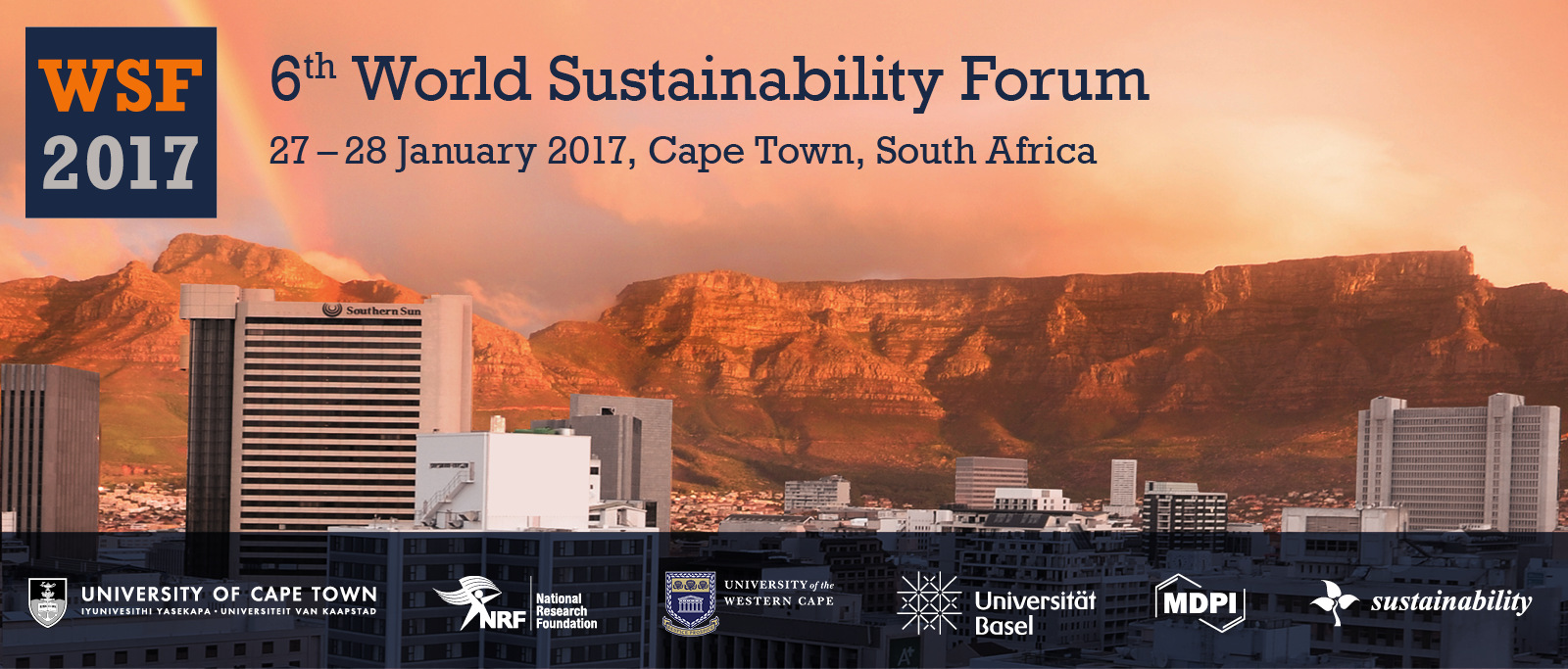
31 January 2017
Three New Institutional Memberships Established
We are pleased to announce that the Chalmers University of Technology, Sweden, the University of Manitoba, Canada and the Technical University of Cartagena, Spain, have joined MDPI's institutional membership program: Primary authors from these institutions will benefit from a 10% discount on the article processing charges.
Additional details can be found on our institutional membership page.
27 January 2017
6th World Sustainability Forum under way in South Africa
The 6th World Sustainability Forum is currently being held at the Cape Sun Hotel until 28 January 2017.
The Forum will showcase the work of internationally renowned researchers and include more than 150 presentations. During the conference dinner, the World Sustainability Award, associated with a US$ 100,000 prize, will be announced, as well as the Emerging Sustainability Leader Award, associated with a US$ 10,000 prize. The prizes are sponsored by the MDPI Sustainability Foundation and Sustainability, an academic open access journal by MDPI.
Here are some pictures from the forum so far:
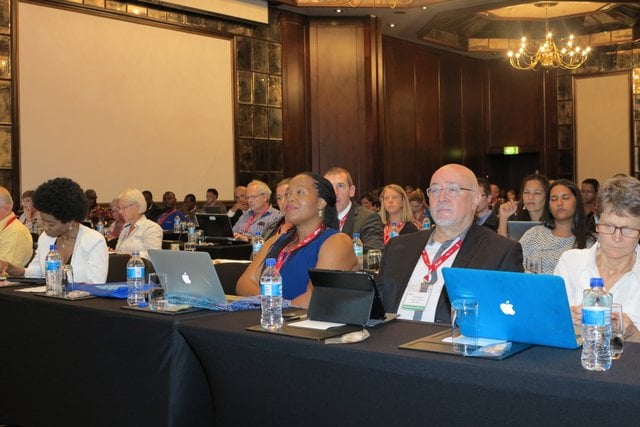
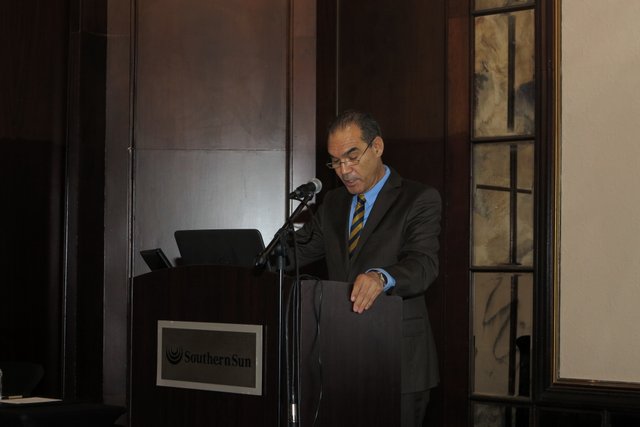
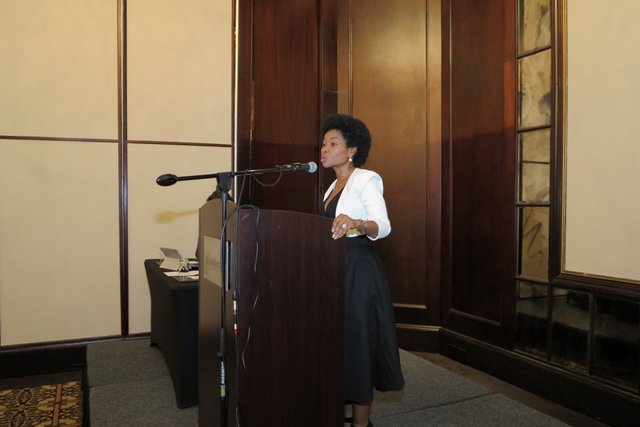
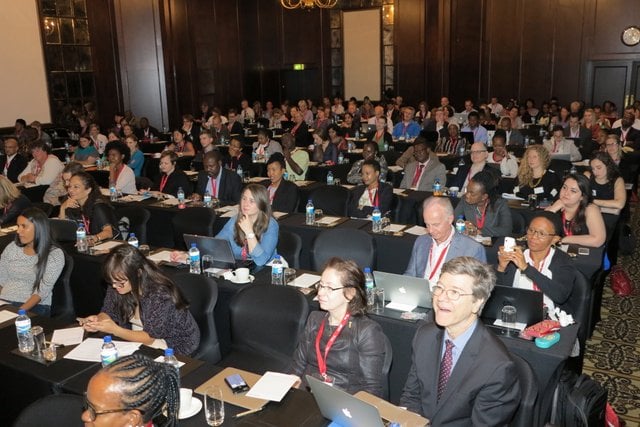
To see the full WSF2017 program and schedule, please see here: https://sciforum.net/conference/wsf-6/page/schedule
19 January 2017
Cape Town to Host the 6th World Sustainability Forum
Cape Town will host the 6th World Sustainability Forum at the Cape Sun Hotel on 27 and 28 January 2017. This prominent event, held for the first time in Africa, will include many illustrious South African and international experts, such as Her Excellency Graça Machel (Sustainable Development Advocate for the United Nations, Mozambique), Joyene Isaacs (HoD Agriculture Western Cape Government), Jeffrey Sachs (Columbia University, USA), Max Bergman (SRaM, University of Basel), Mark New (Pro Vice-Chancellor, University of Cape Town), Frans Swanepoel (FutureAfrica, University of Pretoria) and Francis Petersen (Vice-Chancellor-designate, University of the Free State). The Forum will provide a stage for national and international debates on sustainability in South Africa, the African continent, and about international perspectives on sustainability. It brings together researchers and representatives from government and the business sector to discuss a wide-ranging set of issues associated with sustainability, including food security, water and energy scarcity, mining, poverty reduction, climate change, and urbanisation.
The next few decades will be marked by profound changes in the relationships between global economics, national societies, and the environment. We have entered what some call the Anthropocene, an age in which human activity dominates the climate and the environment. These changes will have numerous consequences on societies around the globe. South Africa and Africa will play a central role, for better or worse, in creating opportunities and risks during these changing times as Africa is profoundly influencing and being influenced by global developments.
The adoption of the 17 United Nations Sustainable Development Goals and the 2030 Agenda for Sustainable Development in September 2015 was accompanied by what insiders considered an optimism they have not experienced in relation to UN resolutions before. The relative efficiency in the drafting, the lack of trenches between East and West, or between North and South, and the unanimity of support of the 193 countries speak volumes. In stark contrast, sustainability seems to go against a changing economic and political tide, where waves of nationalism and protectionism from some of the most powerful countries risk the wellbeing of the rest of the world. The 6th World Sustainability Forum will enable fruitful exchanges, which sensitise South African and international communities to the global urgency and specifics of sustainability.
The Forum will showcase the work of internationally renowned researchers and include more than 150 presentations. During the conference dinner, the World Sustainability Award, associated with a US$ 100 000 prize, will be announced, as well as the Emerging Sustainability Leader Award, associated with a US$ 10 000 prize. The prizes are sponsored by the MDPI Sustainability Foundation and Sustainability, an academic open access journal by MDPI. The World Sustainability Forum is preceded by the Postgraduate Forum on Sustainability, which will introduce more than 100 young scholars from South Africa and the African continent to sustainability research. Both events are organized and sponsored by the University of Cape Town, the University of the Western Cape, the University of Basel, MDPI, and by the National Research Foundation of South Africa.
Contacts:
Scientific Matters: Prof Manfred Max Bergman, Social Research and Methodology Group (SRaM), University of Basel, Switzerland; Email: max.bergman@unibas.ch
Press Accreditation and General Enquiries: Mr Matthias Burkhalter, MDPI AG, Basel, Switzerland; Email: burkhalter@mdpi.com; Tel. +41 61 683 77 34
Follow us on Twitter
#WSF2017SA
6 January 2017
MDPI Supports the OA2020 Initiative
MDPI is now a proud supporter of the OA2020 Initiative.
Open Access 2020 is an international initiative that aims to induce the swift, smooth and scholarly-oriented transformation of today’s scholarly journals from subscription to open access publishing.
MDPI is participating in the upcoming Berlin13 conference in March 2017, where we are contributing to the initiative by aiding in the design of the roadmap which will make OA the default publishing model.
For more information please see here.
5 January 2017
Three New Institutional Memberships Established
We are pleased to announce that the University of Texas at Arlington, USA, the Harbin Institute of Technology, China and TU Darmstadt, Germany, have joined MDPI's institutional membership program: Primary authors from these institutions will benefit from a 10% discount on the article processing charges.
Additional details can be found on our institutional membership page.
22 December 2016
Two New Institutional Memberships Established
We are pleased to announce that the Otto-von-Guericke-Universität Magdeburg, Germany and the University of California, Berkeley, USA, have joined MDPI's institutional membership program: Primary authors from these instititions will benefit from a 10% discount on the article processing charges.
Additional details can be found on our institutional membership page.
19 December 2016
MDPI and Wellcome Trust Compliance
The Wellcome Trust has, for a number of years, required that the results of its funded projects are published in open access format. Recently it announced criteria that publishers must fulfil for publication fees to be paid by the Trust. MDPI is pleased to have been added to the list of compliant publishers.
Only publishers who have confirmed their compliance by 16 December 2016 will be eligible to receive payment of APCs by the Wellcome Trust as of 1 April 2017. For more information on the criteria and a full list of publishers that meet them, see here.
13 December 2016
Meet MDPI at the 2016 AGU Fall Meeting
 MDPI is currently attending the 2016 AGU Fall Meeting (12–16 December, 2016)
MDPI is currently attending the 2016 AGU Fall Meeting (12–16 December, 2016)
If you are also attending the conference, please feel free to stop by our booth (Booth #1147) and meet the representative editors.
Conference details:
2016 AGU Fall Meeting
12–16 December 2016
Moscone Center
747 Howard St
San Francisco, CA 94103, USA
8 December 2016
Three New Institutional Memberships Established
We are pleased to announce that Purdue University, USA, the Universitat Politécnica de Valencia, Spain and the Queensland University of Technology, Australia, have joined MDPI's institutional membership program: Primary authors from these instititions will benefit from a 10% discount on the article processing charges.
Additional details can be found on our institutional membership page.
16 November 2016
World Sustainability Award - Final Extension
The deadline for the World Sustainability Award has been extended for one last time! You now have one more month to nominate an individual researcher, group or project! The final deadline for nominations will be December 15, 2016.
For full details, please visit here.
11 November 2016
Three New Institutional Memberships Established
We are pleased to announce that the University of Minnesota, USA, the Universidad Politécnica de Madrid, Spain and Shanghai Jiao Tong University, China, have joined MDPI's institutional membership program: Primary authors from these instititions will benefit from a 10% discount on the article processing charges.
Additional details can be found on our institutional membership page.
4 November 2016
MDPI Joins the United Nations Global Compact
MDPI has become a member of the United Nations Global Compact to support corporate sustainability and have committed ourselves to the ten principles associated with the Compact.
Sustainability has always been at the core of MDPI’s values, starting with the collection and preservation of rare chemical samples that started in 1996 and led to the first journal, Molecules. Sustainability has become one of our flagship journals and we have supported and organized several conferences and events based on Sustainability, including the upcoming 6th World Sustainability Forum. As a global enterprise, we see it as our duty to promote responsible practices that will ensure a bright future for our planet. Given this, the choice to join the Global Compact was an easy one and we will do our utmost to fully implement it.
3 November 2016
MDPI Now a Member of SPARC Europe
We are delighted to announce that MDPI has become a member of SPARC Europe, an organization that works for open scholarship in Europe, including support of open access publication.
As one of the few publishers to join SPARC Europe to date, MDPI looks forward to making a contribution that puts open scholarship on a positive and sustainable path. We fully support the goals of open scholarship that allow the largest number of people possible to benefit from work of researchers in all disciplines. We hope that our membership will enable us to work with other stakeholders to find the best possible solution.
2 November 2016
World Sustainability Award Deadline Extension
The deadline for the World Sustainability Award has been extended! You now have until November 15, 2016 to nominate an individual researcher, group or project!
For full details, please visit here.
26 October 2016
Four New Institutional Memberships Established
We are pleased to announce that the Wuppertal Institut, Germany, the University of Girona, Spain and Central South University and Huazhong University of Science and Technology, China, have joined MDPI's institutional membership program: Primary authors from these instititions will benefit from a 10% discount on the article processing charges.
Additional details can be found on our institutional membership page.
24 October 2016
International Open Access Week 2016
Meet us during International Open Access Week 2016! We will be presenting at various locations in Europe and China.
To get involved and for full details see the complete list of events organised by MDPI here.
18 October 2016
Institutional Membership established with Universitat Pompeu Fabra, Spain and Aalto University, Finland
We are pleased to announce that the Universitat Pompeu Fabra, Spain and Aalto University, Finland, have joined MDPI's institutional membership program: Primary authors from these universities will benefit from a 10% discount on the article processing charges.
Additional details can be found on our institutional membership page.
12 October 2016
Institutional Membership Established with Iowa State University and the University of North Texas, USA
We are pleased to announce that the Iowa State University and the University of North Texas, USA, have joined MDPI's institutional membership program: Primary authors from these universities will benefit from a 10% discount on the article processing charges.
Additional details can be found on our institutional membership page.
7 October 2016
MDPI at Open Access Days in Munich, 10-11 October 2016
Meet MDPI during the Open Access Days held from 10-11 October 2016 at Ludwig Maximilian University of Munich, Germany.
The two-day event will feature experts from the open access sector, scientists from all disciplines, publishing representatives and supporters of scientific research and communication from libraries as well as research institutes and funding institutions. Join us!
For more information about the event and to see the program, visit the event webpage.
7 October 2016
Institutional Membership Established with the University of Sevilla and the University of Alicante, Spain
We are pleased to announce that the University of Sevilla and the University of Alicante, Spain have joined MDPI's institutional membership program: Primary authors from these universities will benefit from a 10% discount on the article processing charges.
Additional details can be found on our institutional membership page.
29 September 2016
Institutional Membership Established with the University of Delaware
We are pleased to announce that the University of Delaware, USA, has joined MDPI's institutional membership program: Primary authors from this university will benefit from a 10% discount on the article processing charges.
Additional details can be found on our institutional membership page.
19 September 2016
Peer Review Week 2016
As an open access publisher indebted to the work of our peer reviewers, we are proud to support Peer Review Week 2016. As part of the week's activities and to celebrate this year's theme "Recognition for Review", MDPI will host two webinars that anyone can join.
These webinars will explore the role and value of reviewers and the recognition they receive from a publishers perspective, with examples from MDPI's experience in publishing nearly 80,000 peer reviewed papers, along with evidence from reviewer surveys. It will also touch upon potential changes in how review is carried out and tips for early career researchers who want to be involved in the review process.
Details and links to join can be found below:
Wednesday September 21, 08:00 (CEST)
Friday September 23, 16:00 (CEST)
For more information about all the activites taking place, please visit the Peer Review Week website.
6 September 2016
Institutional Membership established with Kansas State University and Northwestern University, USA
We are pleased to announce that Kansas State University and Northwestern Universty, USE, have joined MDPI's institutional membership program: Primary authors from these universities will benefit from a 10% discount on the article processing charges.
Additional details can be found on our institutional membership page.
5 September 2016
Institutional Membership Established with University College Cork
We are pleased to announce that University College Cork, Ireland, has joined MDPI's institutional membership program: Primary authors from this university will benefit from a 10% discount on the article processing charges.
Additional details can be found on our institutional membership page.
22 August 2016
MDPI New Office Location
We are pleased to announce that MDPI has now moved to a new permanent address:
MDPI AG
St. Alban Anlage 66
CH-4052 Basel
Postfach, CH-4020 Basel
Switzerland
Telephone and fax numbers remain unchanged.
10 August 2016
Institutional Membership established with the University of Texas at Austin, USA, the Wroclaw University of Science and Technology, Poland and the University of Granada and the Compultense University of Madrid, Spain
We are pleased to announce that the following institutions have joined MDPI's institutional membership program in August 2016:
- University of Texas at Austin, USA
- Wroclaw University of Science and Technology, Poland
- University of Granada, Spain
- Compultense University of Madrid, Spain
Authors affiliated with these institutions will benefit from a 10% discount on the article processing charges.
Additional details can be found on our institutional membership page.
18 July 2016
Institutional Membership established with Louisiana State University and Florida State University, USA, Royal College of Surgeons, Ireland, University of Rostock, Germany, AGH University of Science and Technology, Poland and Southeast University, China
We are pleased to announce that the following institutions have joined MDPI's institutional membership program in July 2016:
- Louisiana State University, USA
- Florida State University, USA
- Royal College of Surgeons, Ireland
- University of Rostock, Germany
- AGH University of Science and Technology, Poland
- Southeast University, China
Authors affiliated with these institutions will benefit from a 10% discount on the article processing charges.
Additional details can be found on our institutional membership page.
12 July 2016
MDPI Moving to New Office Location in Basel (Switzerland) in August 2016
As of 20 August 2016, MDPI's new address in Basel will be:
MDPI AG
St. Alban-Anlage 66
CH-4052 Basel
Switzerland
Telephone and fax numbers remain unchanged.
St. Alban-Anlage 66 was built from 1947 to 1948 and initially the home of the "Bühler AG", a book printing business.


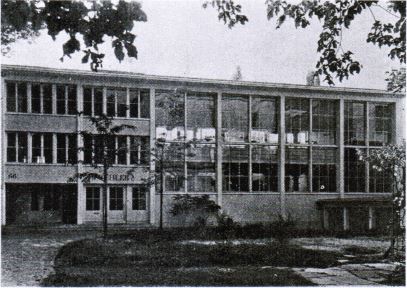

For more information about this building, see: https://www.mdpi.com/about/headquarters
21 June 2016
"Behind the Scenes of Academic Publishing—A Publisher's Perspective" - MDPI's Lecture at the University of Basel
From the 15-16 September, 2016, MDPI will run a course on Academic Publishing at the University of Basel.
In this two day workshop, MDPI will look in detail at the role performed by academic journal publishers and how they interact with academics. Ethical dimensions, what happens when problems occur and how the publisher coordinates all aspects of the submission process will also be covered.
For more detailed information about the program, trainers and registration please visit the course webpage.
14 June 2016
2015 Impact Factors Released
We are pleased to report the 2015 Journal Impact Factors in the latest Journal Citation Reports® Science Edition, published by Thomson Reuters in June 2016. Twenty out of 25 journals have seen an increase in their Impact Factor and two journals (Crystals and IJGI) received a first Impact Factor. Coatings was recently added to SCIE and will receive its first Impact Factor in next year’s JCR.
Updated Impact Factors for Journals in the Science Citation Index Expanded (SCIE)
| Journal | 2015 Impact Factor | Details | Category Rank |
| Applied Sciences | 1.726 | Link | 83/163 (Q3) in ‘Chemistry, Multidisciplinary’; 129/271 (Q2) in ‘Materials Science, Multidisciplinary’; 64/145 (Q2) in ‘Physics, Applied’ |
| Atmosphere | 1.221 | Link | 66/84 (Q4) in ‘Meteorology & Atmospheric Sciences’ |
| Catalysts | 2.964 | Link | 53/144 (Q2) in ‘Chemistry, Physical’ |
| Energies | 2.077 | Link | 43/88 (Q2) in ‘Energy & Fuels’ |
| Entropy | 1.743 | Link | 25/79 (Q2) in ‘Physics, Multidisciplinary’ |
| Forests | 1.583 | Link | 19/66 (Q2) in ‘Forestry’ |
| Genes | 3.242 | Link | 60/165 (Q2) in ‘Genetics & Heredity’ |
| International Journal of Environmental Research and Public Health (IJERPH) | 2.035 | Link | 101/225 (Q2) in ‘Environmental Sciences’ |
| International Journal of Molecular Sciences (IJMS) | 3.257 | Link | 110/289 (Q2) in ‘Biochemistry & Molecular Biology’; 51/163 (Q2) in ‘Chemistry, Multidisciplinary’ |
| Marine Drugs | 3.345 | Link | 13/59 (Q1) in ‘Chemistry, Medicinal’ |
| Materials | 2.728 | Link | 63/271 (Q1) in ‘Materials Science, Multidisciplinary’ |
| Metals | 1.574 | Link | 18/73 (Q1) in ‘Metallurgy & Metallurgical Engineering’; 145/271 (Q3) in ‘Materials Science, Multidisciplinary’ |
| Micromachines | 1.295 | Link | 30/56 (Q3) in ‘Instruments & Instrumentation’ 63/83 (Q4) in ‘Nanoscience & Nanotechnology’ |
| Minerals | 1.468 | Link | 9/21 (Q2) in ‘Mining & Mineral Processing; 14/29 (Q2) in ‘Mineralogy’ |
| Molecules | 2.465 | Link | 24/59 (Q2) in ‘Chemistry, Organic’ |
| Nanomaterials | 2.690 | Link | 64/271 (Q1) in ‘Materials Science, Multidisciplinary’; 36/83 (Q2) in ‘Nanoscience & Nanotechnology’ |
| Nutrients | 3.759 | Link | 16/78 (Q1) in ‘Nutrition & Dietetics’ |
| Polymers | 2.944 | Link | 20/85 (Q1) in ‘Polymer Science’ |
| Remote Sensing | 3.036 | Link | 5/28 (Q1) in ‘Remote Sensing’ |
| Sensors | 2.033 | Link | 36/75 (Q2) in ‘Chemistry, Analytical’; 16/27 (Q3) in ‘Electrochemistry’; 12/56 (Q1) in ‘Instruments & Instrumentation’ |
| Sustainability | 1.343 | Link | 146/225 (Q3) in ‘Environmental Sciences’; 22/29 (Q4) in ‘Green & Sustainable Science & Technology’ |
| Symmetry | 0.841 | Link | 31/63 (Q2) in ‘Multidisciplinary Sciences’ |
| Toxins | 3.571 | Link | 16/89 (Q1) in ‘Toxicology’ |
| Viruses | 3.042 | Link | 14/33 (Q2) in ‘Virology’ |
| Water | 1.687 | Link | 33/85 (Q2) in ‘Water Resources’ |
Journals with First Impact Factors
| Journal | 2015 Impact Factor | Details | Category Rank |
| Crystals | 2.075 | Link | 13/26 (Q2) in ‘Crystallography’ |
| ISPRS International Journal of Geo-Information | 0.651 | Link | 45/49 (Q4) in ‘Geography, Physical’; 26/28 (Q4) in ‘Remote Sensing’. |
26 May 2016
Institutional Membership established with University of Bremen, Germany, Koç University, Turkey, IIASA, Austria and Jilin University and Kunming Institute of Botany, CAS, China
We are pleased to announce that the following institutions have joined MDPI's institutional membership program in May 2016:
- Unversity of Bremen, Germany
- Koç University, Turkey
- International Institute for Applied Systems Analysis (IIASA), Austria
- Jilin University, China
- Kunming Institute of Botany, Chinese Academy of Sciences, China
Authors affiliated with these institutions will benefit from a 10% discount on the article processing charges.
Additional details can be found on our institutional membership page.
23 May 2016
Institutional Membership Established with the KTH Royal Institute of Technology, Sweden and the South China University of Technology, Beijing University of Technology and Southern Medical University, China
We are pleased to announce that the following institutions have joined MDPI's institutional membership program in April and May 2016:
- KTH Royal Institute of Technology, Sweden
- South China University of Technology, China
- Beijing University of Technology, China
- Southern Medical University, China
Authors affiliated with these institutions will benefit from a 10% discount on the article processing charges.
Additional details can be found on our institutional membership page.
26 April 2016
New Section on www.mdpi.com - Latest Books
You may have noticed a new section that is now visible on our home page. This section is called "Latest Books" and showcases recent publications from MDPI Books, our book publishing service.
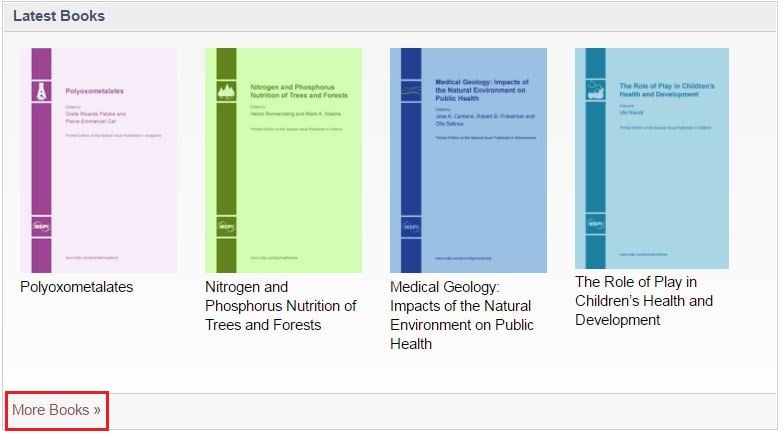
By clicking on the hyperlink "More Books" you will be taken to the MDPI Books Home Page. There you will find more information about the service, as well as the "Recent Publications" list.
Clicking on any of the book images in this list will take you to detailed information about that book (shown below). Here you can also download a PDF version of the book, or order a hardcover printed copy.
For further information about the MDPI Books service, please visit the webpage or contact books@mdpi.com.
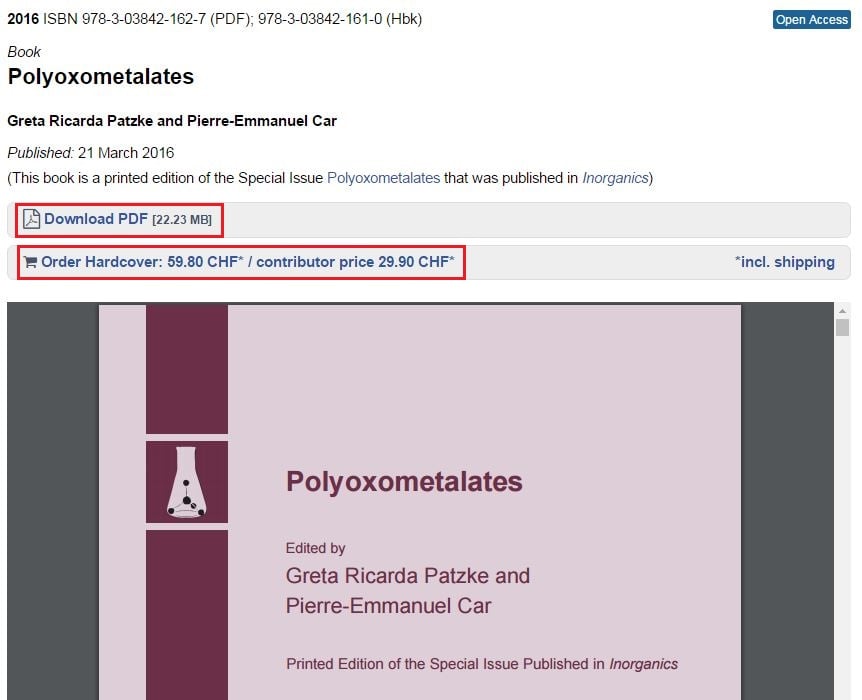
31 March 2016
Axioms, Behavioral Sciences, Photonics, Separations and Toxics added to the Emerging Sources Citation Index in Web of Science
We are pleased to announce that the journals Axioms, Behavioral Sciences, Photonics, Separations and Toxics were recently accepted for inclusion in the newly launched Emerging Sources Citation Index (ESCI) in Web of Science.
ESCI serves to highlight promising journals which are still under consideration for the Science Citation Index Expanded (SCIE) or the Social Sciences Citation Index (SSCI).
The Emerging Sources Citation Index (ESCI), Science Citation Index Expanded (SCIE), Social Sciences Citation Index
(SSCI), and Web of Science™ (WoS) are Thomson Reuters products.
30 March 2016
Institutional Membership established with the University of Winchester, UK, Silesian University of Technology, Poland and Beijing Jiaotong University and Zhejiang University, China
We are pleased to announce that the University of Winchester, UK, the Silesian University of Technology, Poland and Beijing Jiaotong University and Zhejiang University, China, have joined our Institutional Membership program. Primary authors from these universities will benefit from a 10% discount on article processing charges.
Additional details can be found on our institutional membership page.
24 March 2016
New Editorial Office in Barcelona, Spain
We are excited to announce the opening of our new editorial office in Barcelona, Spain. The launch team is led by a Senior Editor and comprises further staff holding doctoral degrees with several years of research experience. The new editorial team will help us to get closer to European research communities and progress Sciforum, the platform to support the scientific community via conference hosting and other functions. They will also help spread the word about Open Access and meet academics at scientific events.
We are in the process of hiring more doctoral and masters graduates to join the editorial team and welcome applications via jobs@mdpi.com. For contact details about the office, see our contact page.

22 February 2016
Membership Established with the Max Planck Society
We are pleased to announce that the Max Planck Digital Library (MPDL) has signed an agreement with MDPI to support authors associated with the Max Planck Society (Max-Planck-Gesellschaft). As of 22 February 2016, corresponding authors will receive full funding from the MPDL for articles published in MDPI journals, with a 10% discount applied to the Article Processing Charges. Additional details can be found at our institutional membership page.
Founded in 1948, The Max Planck Society is one of Germany’s leading research organizations, and is currently made up of 83 institutes conducting basic research in natural sciences, life sciences, social sciences and humanities. 18 Nobel laureates have emerged from its ranks of scientists and the society has more than 15,000 publications in scientific journals each year.
5 February 2016
Institutional Membership Extension: Wageningen University, CSIC, University of Zürich, ETH Zürich, University of Tübingen and Osnabrück University
We are pleased to announce that Wageningen University, the Netherlands, the Spanish National Research Council (CSIC), Spain, the University of Zürich and ETH Zürich, Switzerland, and the University of Tübingen and Osnabrück University, Germany, have not only renewed their institutional memberships with MDPI after two years of successful cooperation, but have also increased the reduction of the article processing charges (APCs) for affiliated authors to 25%.
Additional details can be found on our institutional membership page.
5 February 2016
Institutional Membership established with Brock University, Canada and the University of Pisa, Italy
We are pleased to announce that Brock University, Cananda, and the University of Pisa, Italy, have joined MDPI's institutional membership program: Primary authors from these universities will benefit from a 10% discount on the article processing charges as of 01 February 2016.
Additional details can be found on our institutional membership page.
25 January 2016
MDPI Sponsors diss:kurs with the University of Basel
MDPI is pleased to announce its newly established sponsorship of diss:kurs, an event coordinated by the University of Basel to support their doctorate program. For more information about the event and how to register, please visit the diss:kurs webpage.
7 January 2016
New Institutional Memberships Established with Tsinghua University, the Chinese Society of Micro-Nano Technology, Ruhr University Bochum and the University of Ulm
We are pleased to announce that the following institutions have joined MDPI's institutional membership program as of 1 January 2016:
- Tsinghua University, China
- Chinese Society of Micro-Nano Technology (CSMNT)
- Ruhr University Bochum, Germany
- University of Ulm, Germany
Authors affiliated with these institutions will benefit from a 10% discount on the article processing charges.
Additional details can be found on our institutional membership page.
5 January 2016
Safety, Fermentation, C-Journal of Carbon Research, Magnetochemistry, Batteries and Horticulturae Released Their First Issue in December 2015
We are pleased to announce that MDPI's open access journals Safety, Journal of Imaging, Fermentation, C-Journal of Carbon Research, Magnetochemistry, Batteries and Horticulturae released their first issue at the end of December 2015.
17 December 2015
Institutional Membership Extension: University of Bern, Switzerland
We are pleased to announce that the University of Bern, Switzerland has not only renewed their institutional membership with MDPI after two years of successful cooperation, but also increased the reduction of the article processing charges (APCs) for affiliated authors to 25%.
17 December 2015
Institutional Membership with the University of Ulm and Helmholtz Zentrum Munich
We are pleased to announce that University of Ulm, Germany and Helmholtz Zentrum Munich, Germany has joined MDPI's institutional membership program:
Primary authors from the University of Ulm and Helmholtz Zentrum Munich will benefit from a 10% discount on the article processing charges as of 1 January 2016. Additional details can be found on our institutional membership page.
9 December 2015
Membership Established with the Virginia Polytechnic Institute and State University (Virginia Tech)
We are pleased to announce that Virginia Tech has joined MDPI's institutional membership program. Authors from Virginia Tech will benefit from a 10% discount on the article processing charges as of 1 December 2015. Additional details can be found on our institutional membership page.
1 December 2015
Membership Established with the Technical University of Denmark and the University of North Florida
We are pleased to announce that the following universities have joined MDPI's institutional membership program:
- Technical University of Denmark (as of 1 November 2015)
- University of North Florida, USA (as of 15 November 2015)
Primary authors from the Technical University of Denmark and the University of North Florida will benefit from a 10% discount on the article processing charges.
Additional details can be found on our institutional membership page.
2 October 2015
Membership Established with the University of Freiburg and the University of Regensburg
We are pleased to announce that the following universities have joined MDPI's institutional membership program:
University of Freiburg, Germany
University of Regensburg, Germany
Primary authors from the University of Freiburg and the University of Regensburg will benefit from a 10% discount on the article processing charges as of 1 October 2015 and 1 November 2015.
Additional details can be found on our institutional membership page.
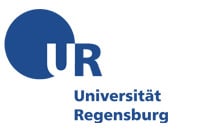







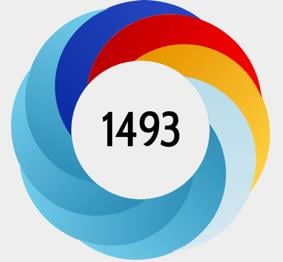
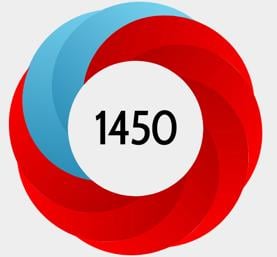






















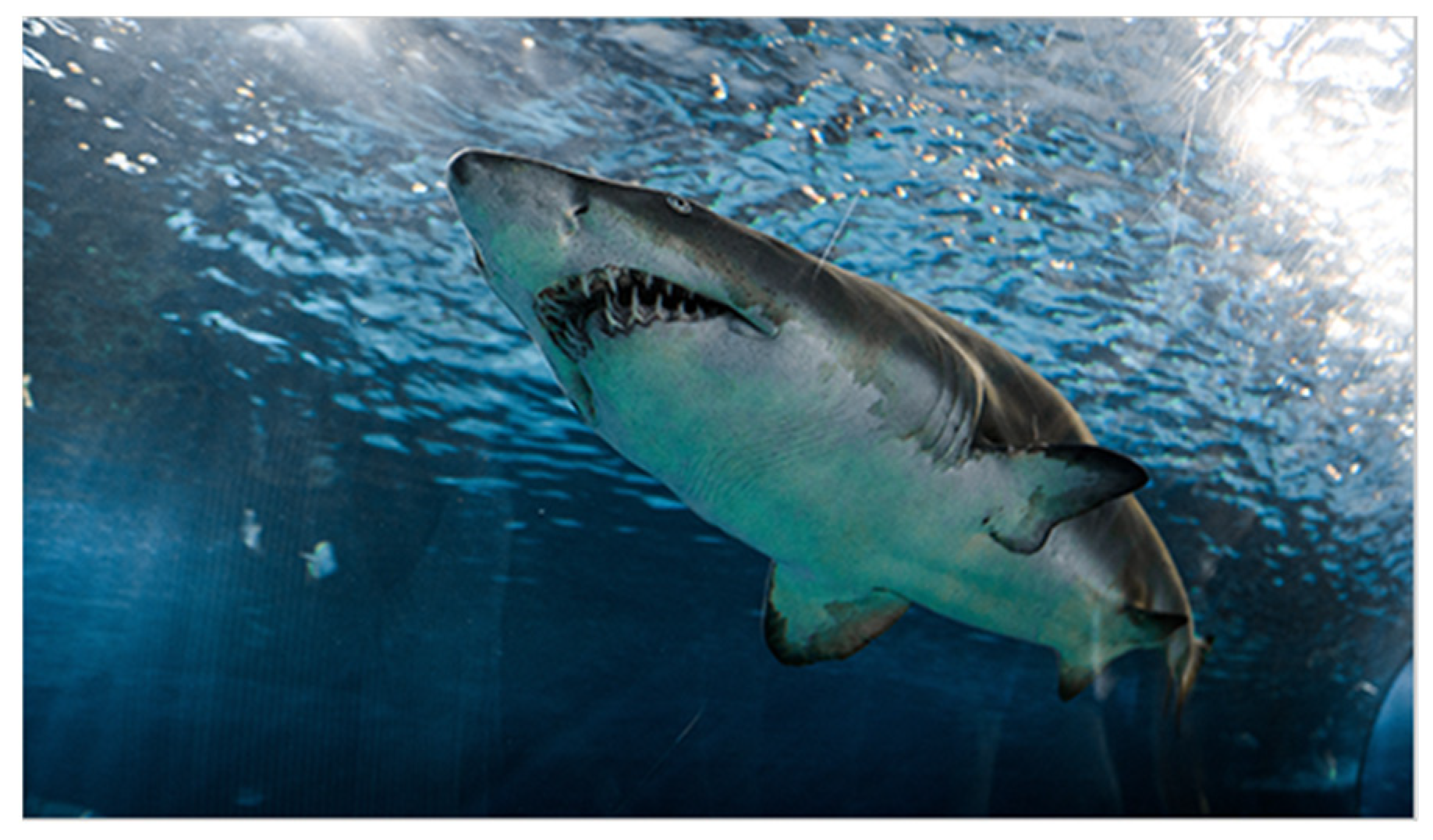
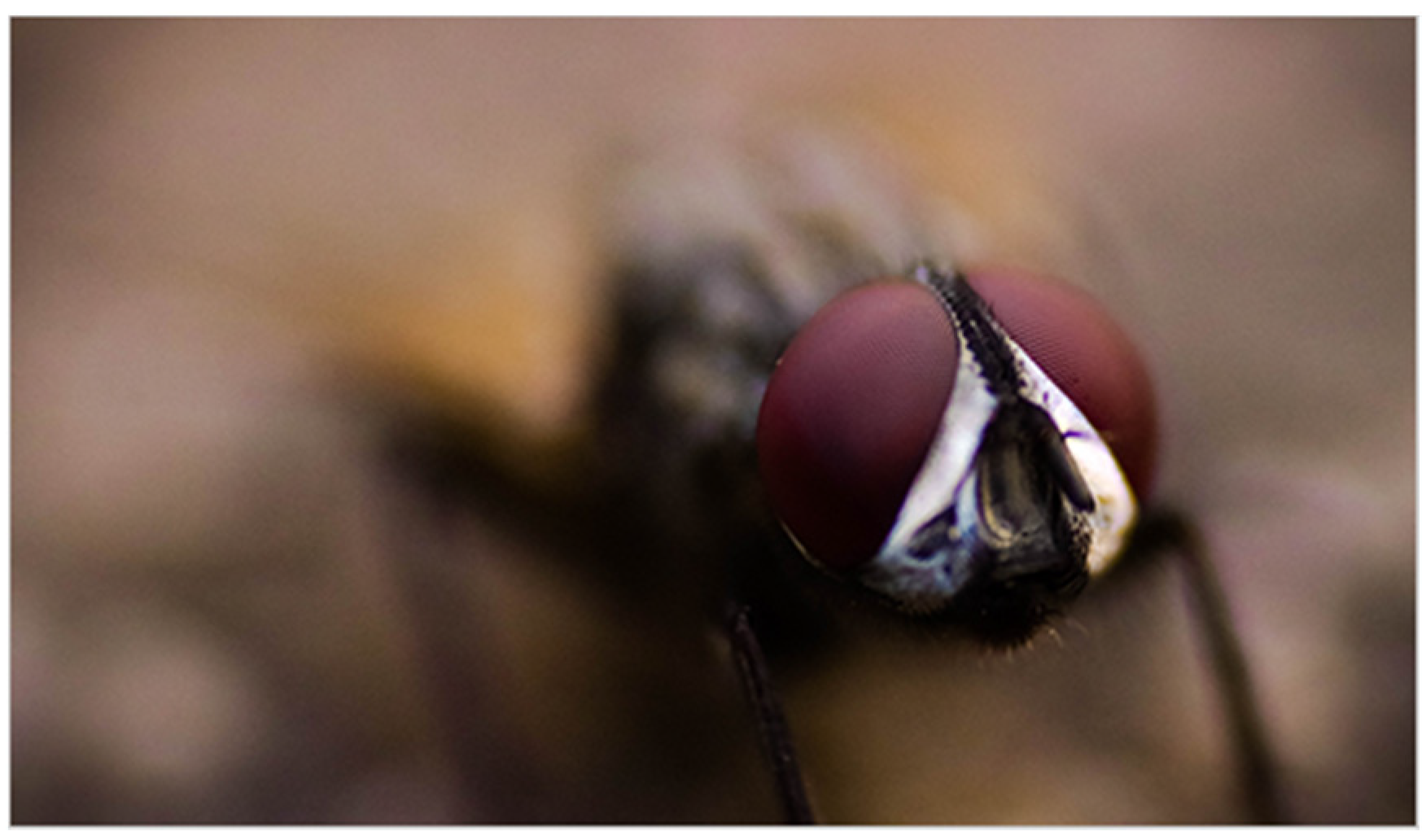
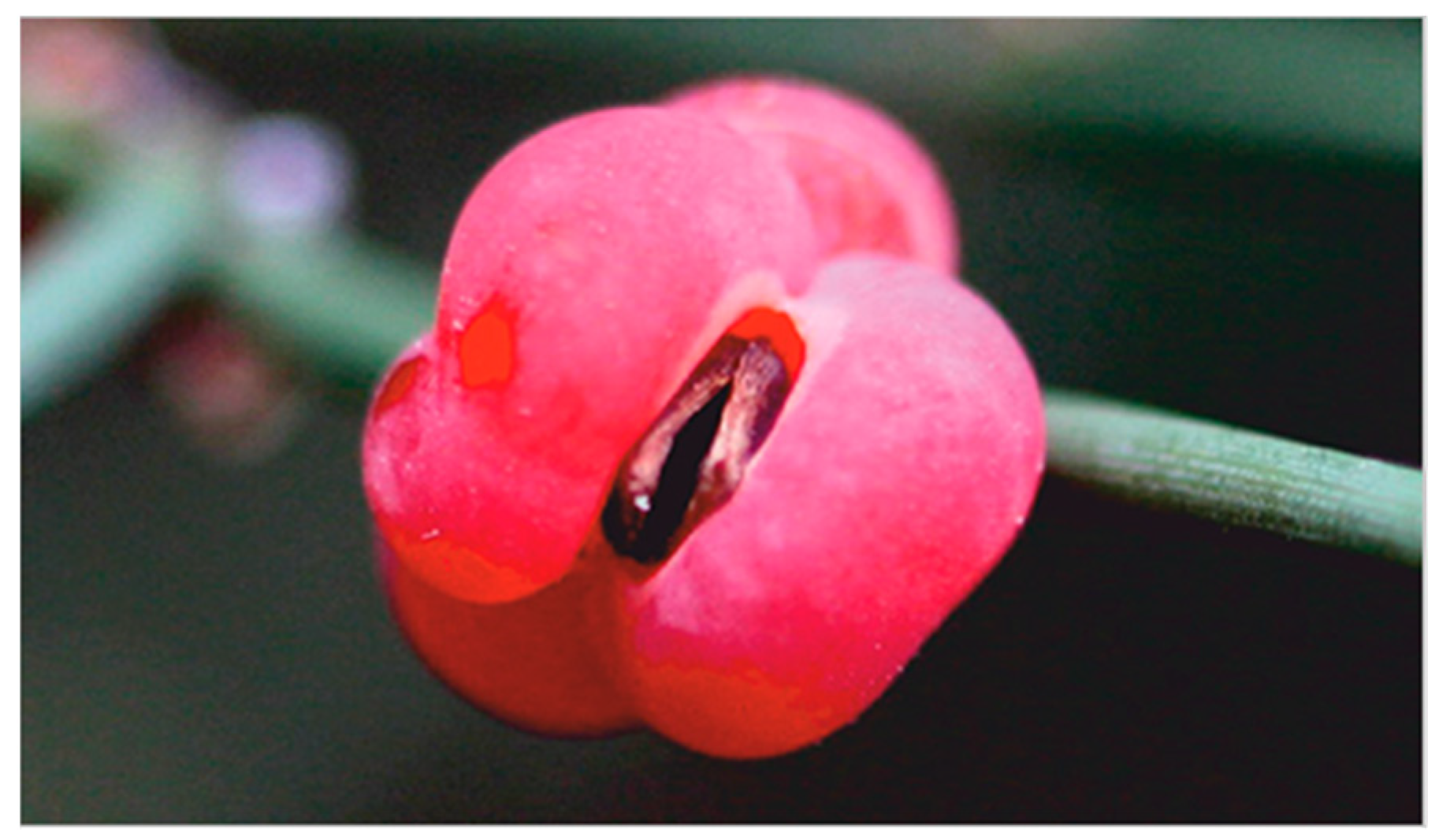
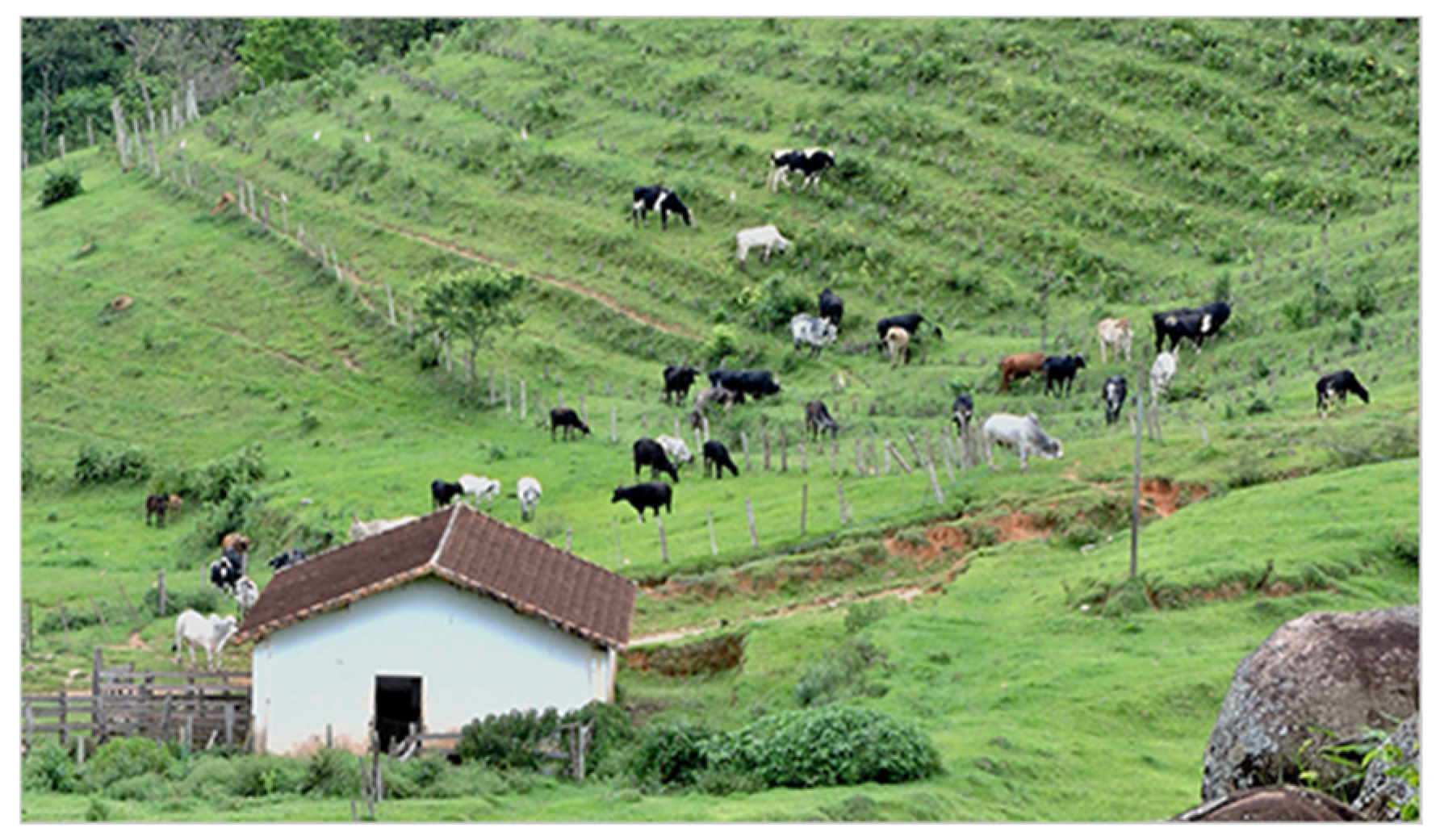
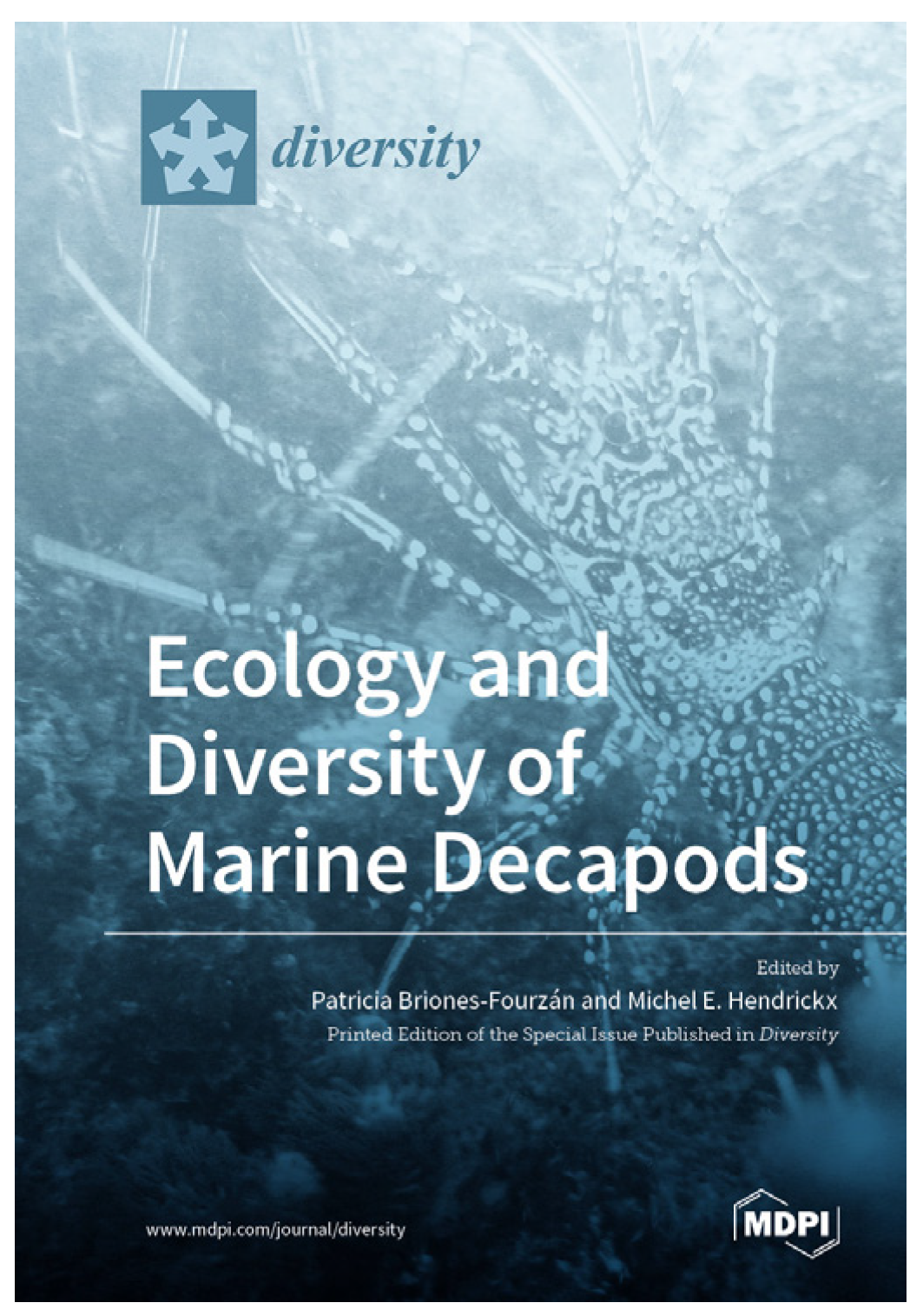
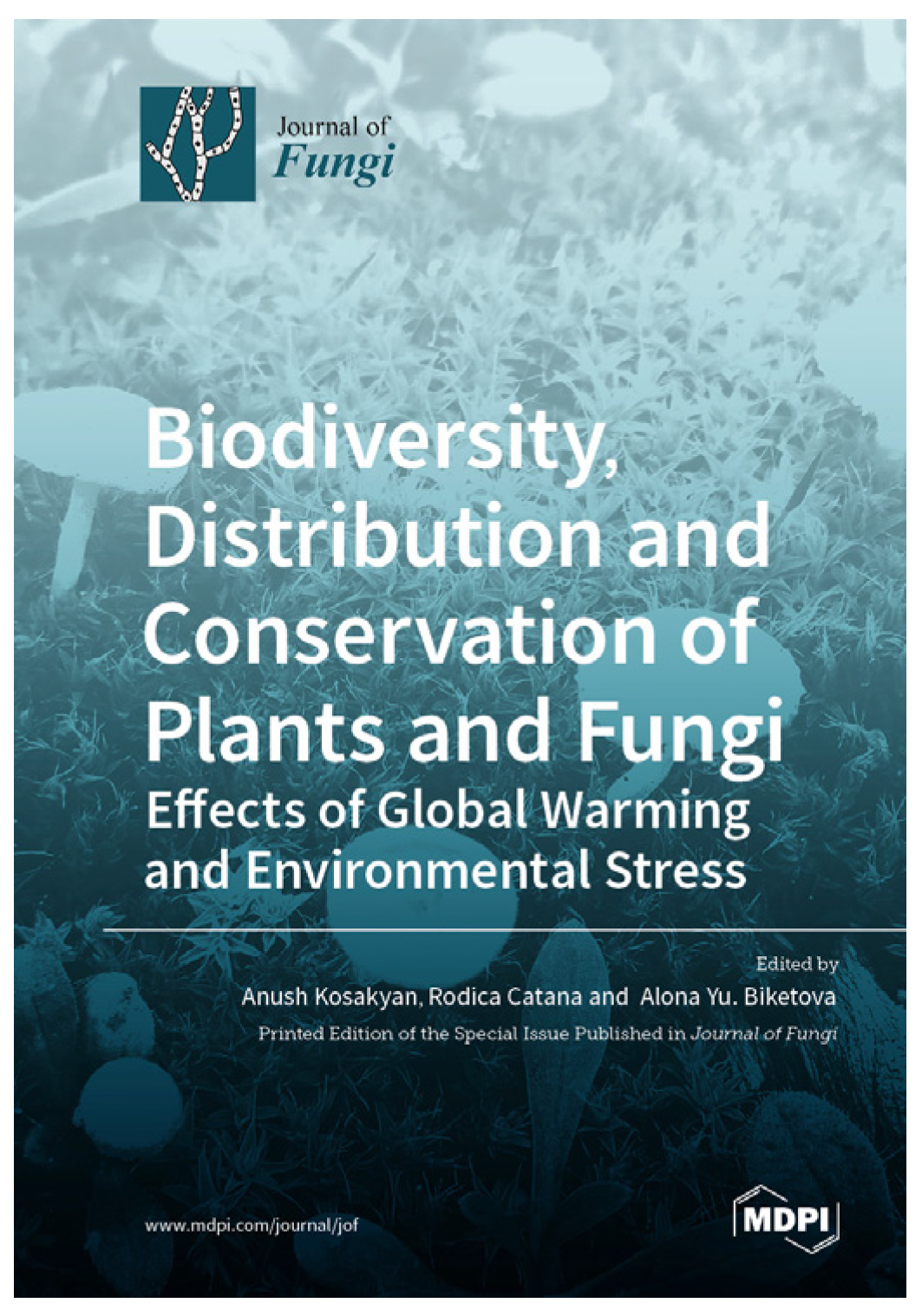
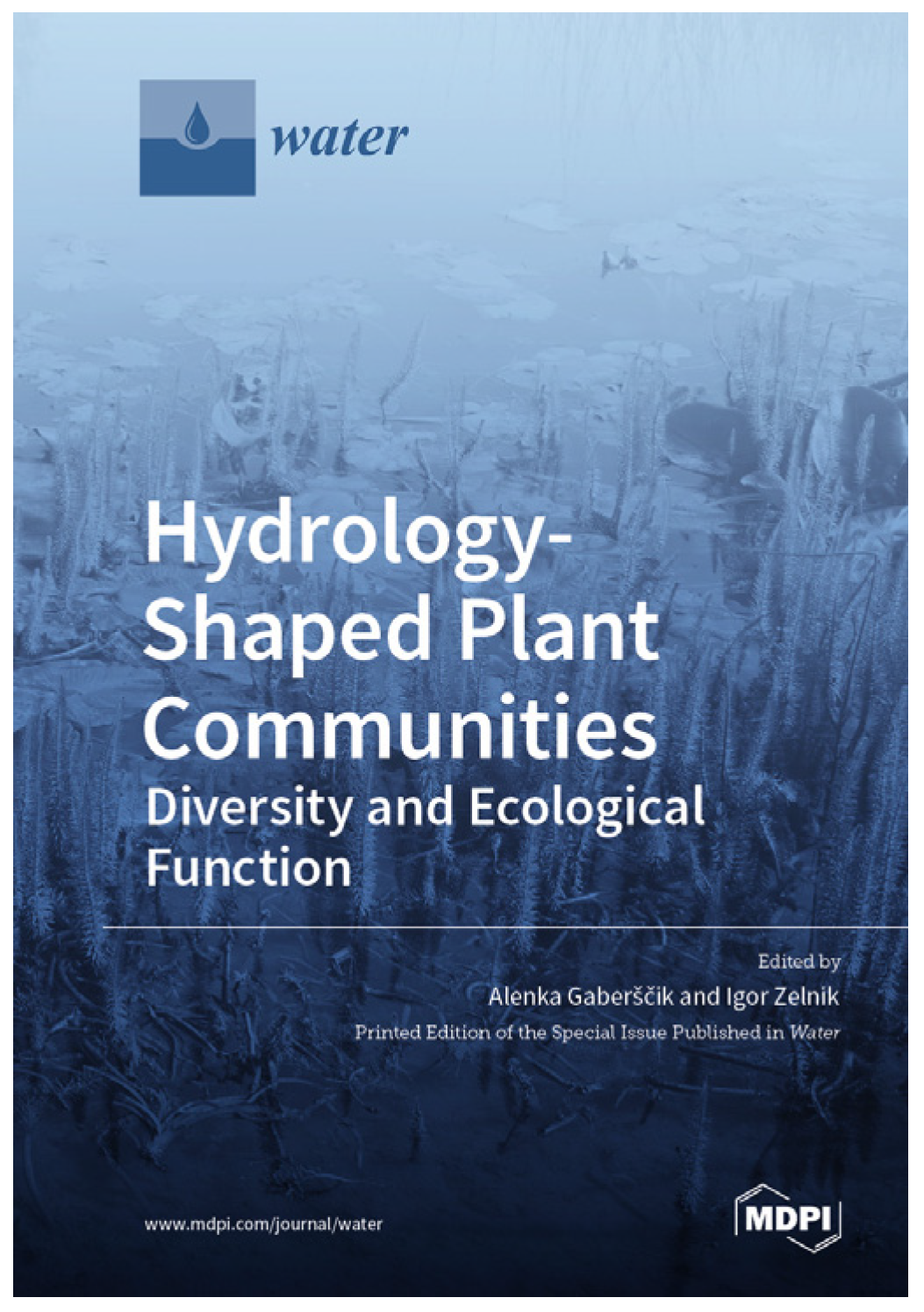
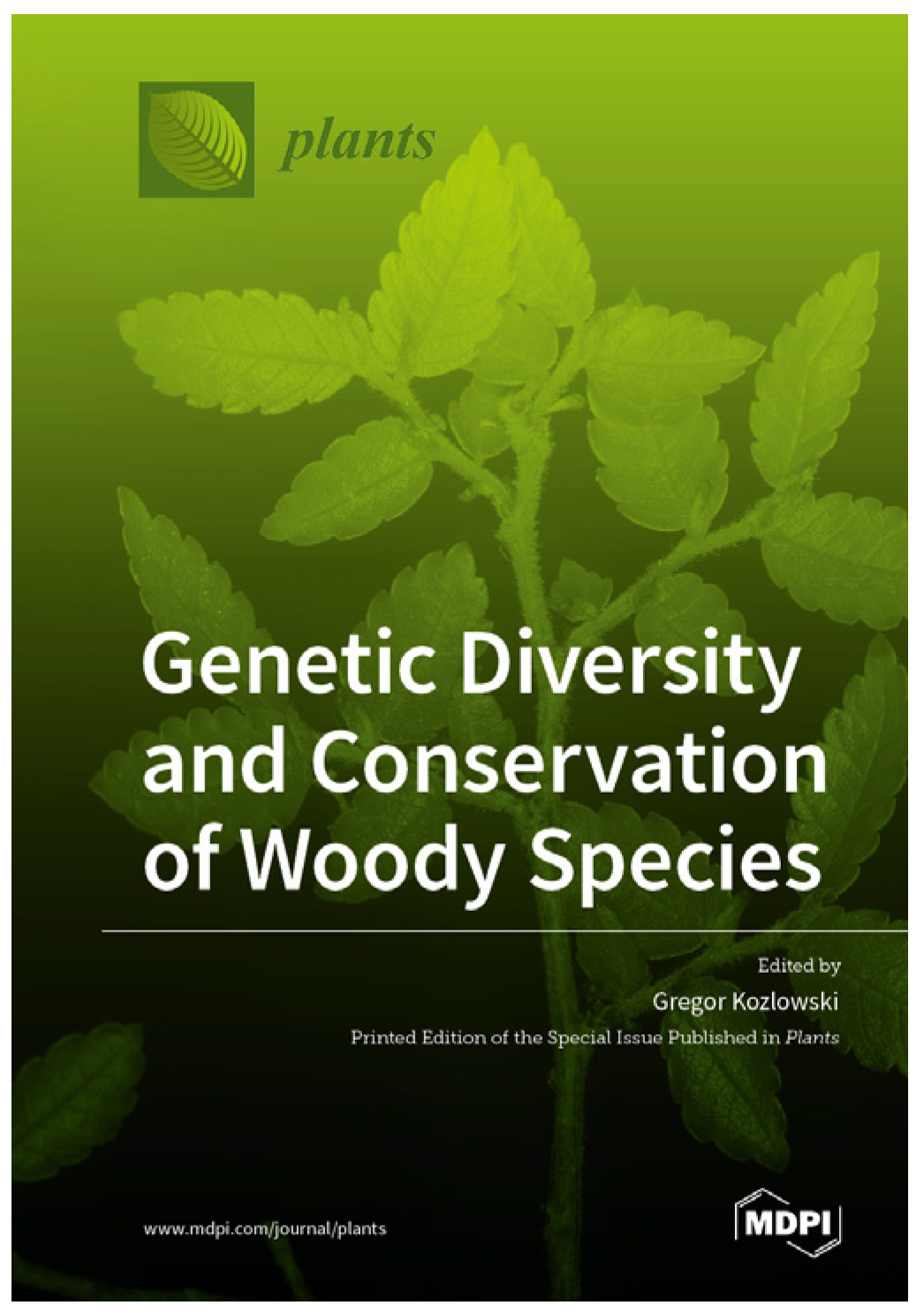





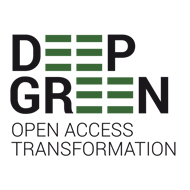


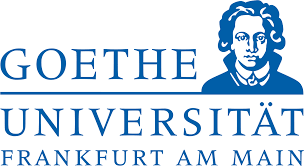
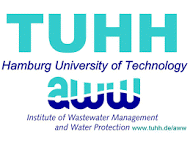




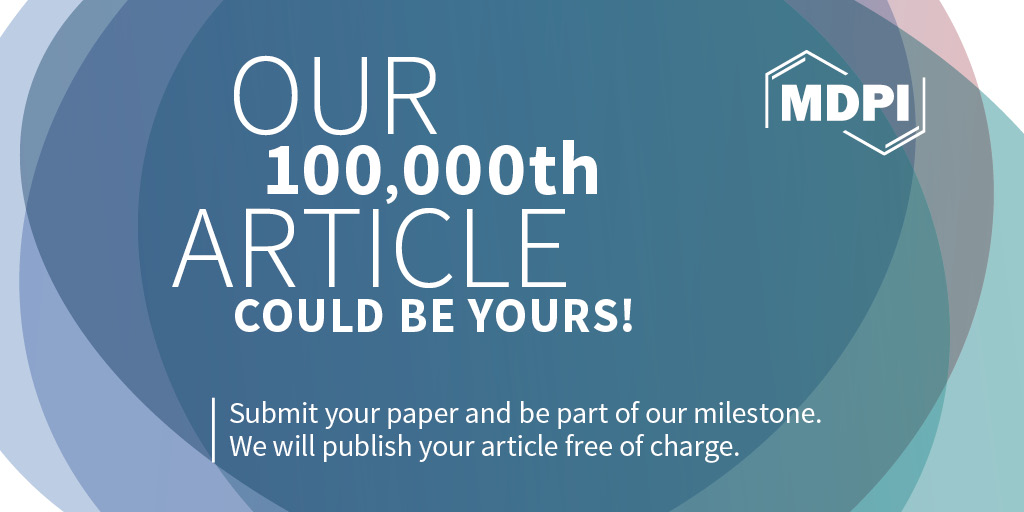

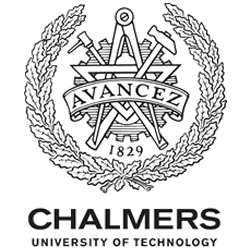

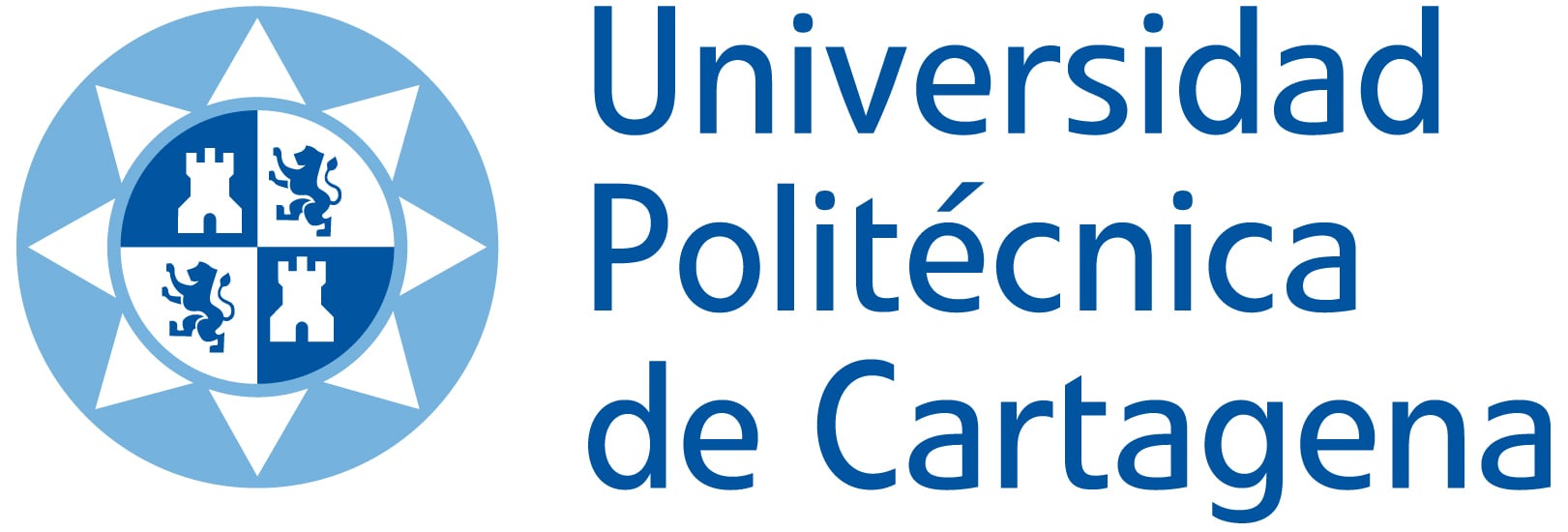
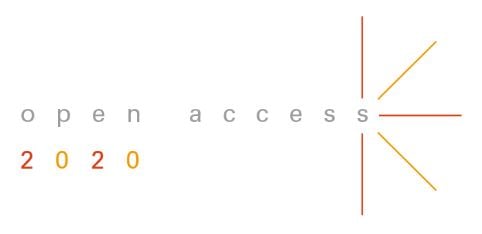



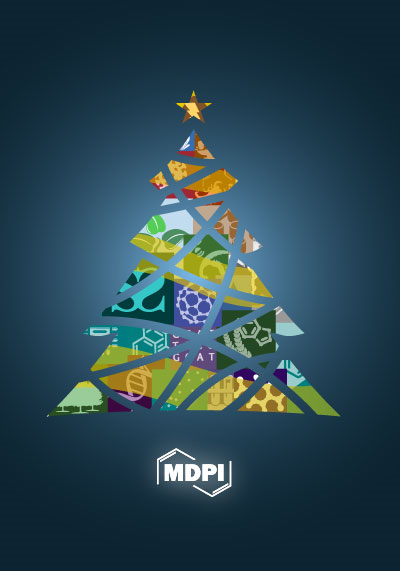





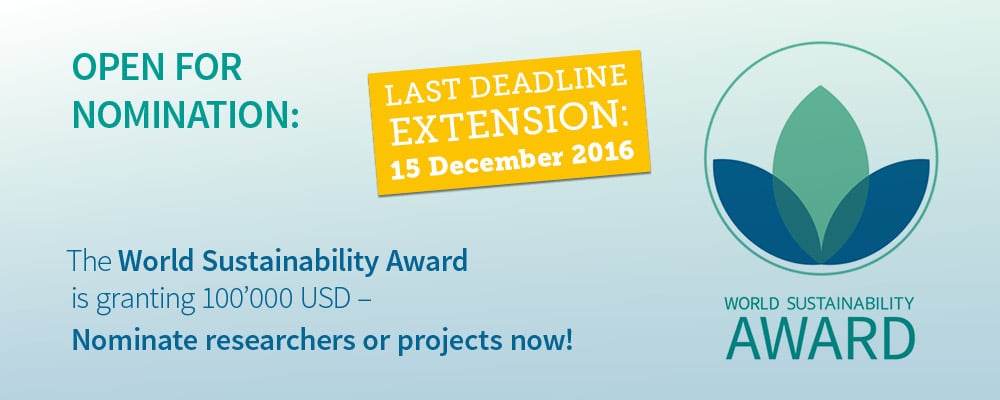



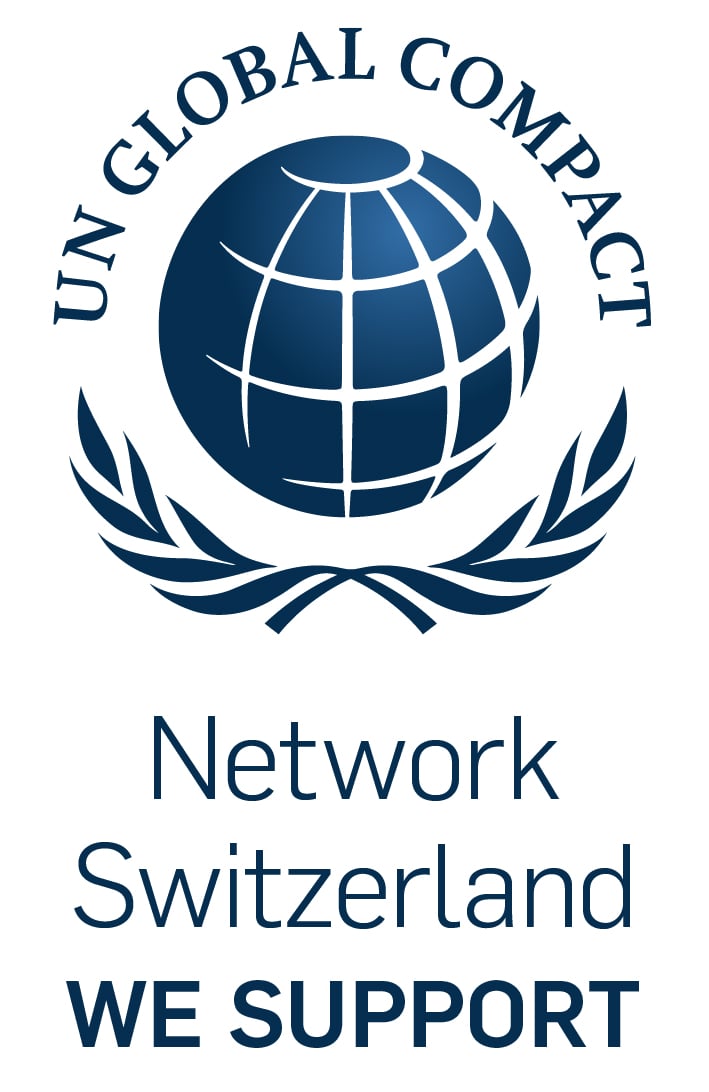
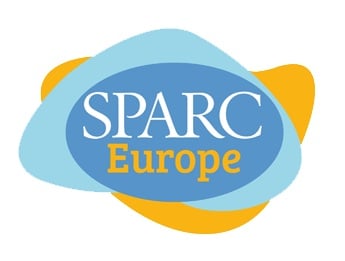
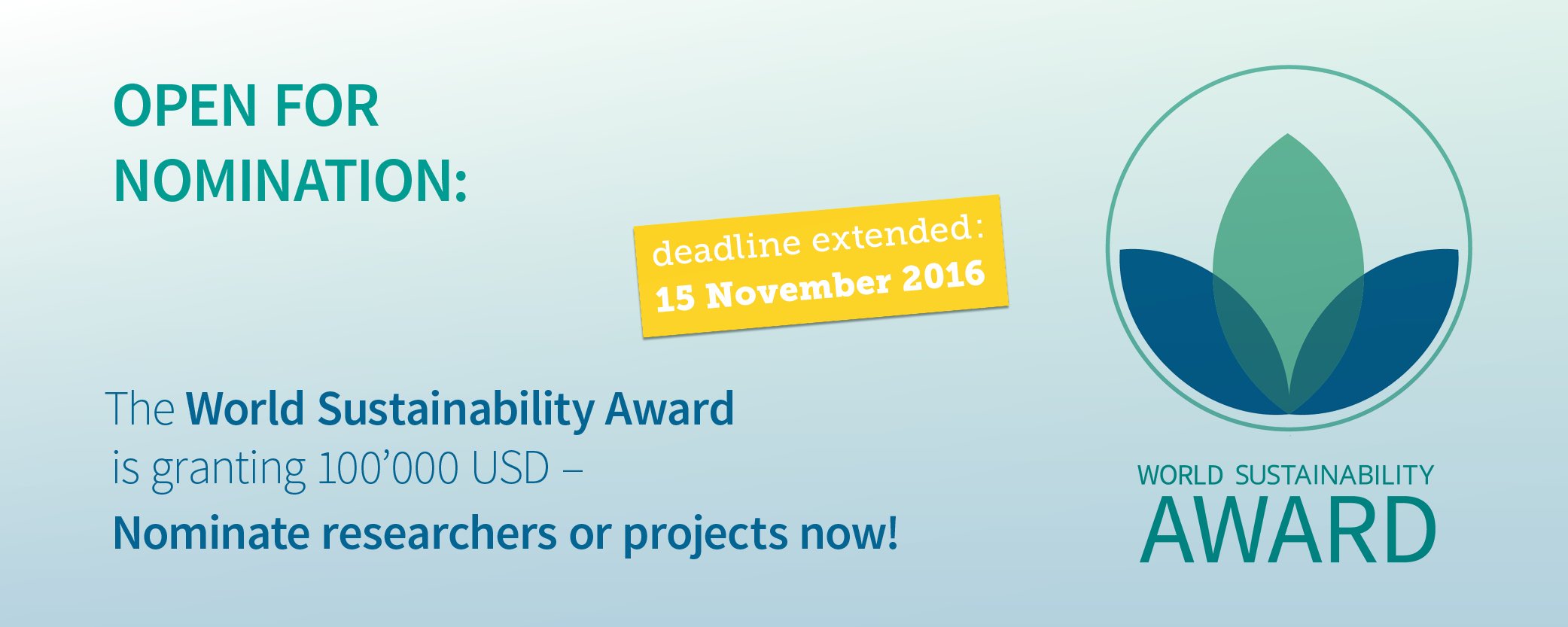 .
.